|
| Belgrade to get Centre for Fourth Industrial Revolution |
|
7 February 2022 Prime Minister Ana Brnabic attended today in Geneva the signing of the Agreement on the Establishment of the World Economic Forum Centre for the Fourth Industrial Revolution in Serbia, the first of its kind in the Western Balkans.
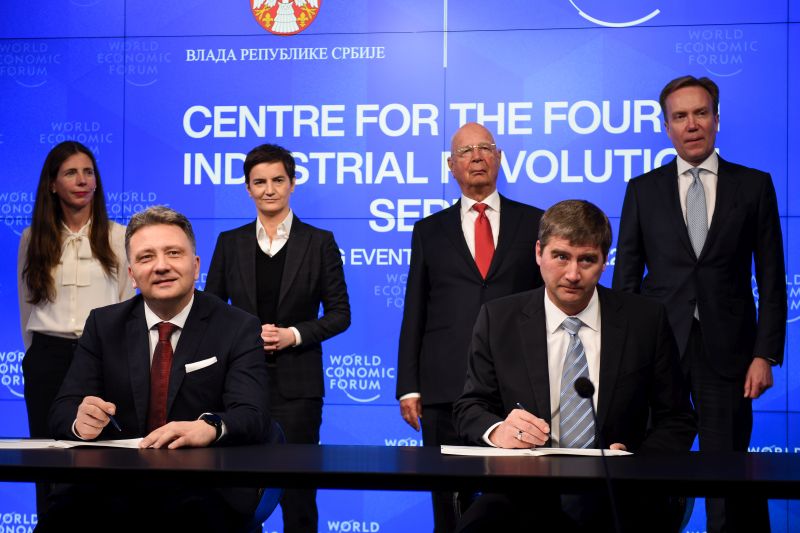
The agreement was signed at the headquarters of that forum by Director of the Office for Information Technologies and eGovernment Mihailo Jovanovic and Managing Director and Head of the Forum's Centre for the Fourth Industrial Revolution Jeremy Jurgens.
The centre in Serbia will be the 16th in the network of centres of the World Economic Forum in the world and the first in the region of the Western Balkans.
The new centre will start operating on 1 March and will function as a non-profit organisation and a platform for public-private partnership and cooperation for the Fourth Industrial Revolution, while the focus of work will be on artificial intelligence and bioengineering.
This centre will work within the Serbian government’s Office for Information Technologies and eGovernment and will cooperate with scientific institutes, state institutions and the private sector.
The signing of this document was also attended by founder and Executive Director of the World Economic Forum Klaus Schwab and President of the World Economic Forum Borge Brende, with whom Brnabic had previously met.
Addressing the press, Brnabic pointed out that this agreement is the result of many years of joint work between Serbia and the World Economic Forum.
We started talking in 2018, signed a Memorandum of Understanding, then 2020 hampered us a bit, but we continued to plan in 2021 and here we are today, she said.
According to her, the centre will be focused on the development of artificial intelligence, biomedicine and biotechnology, and on the ways in which digitalisation can raise the productivity of companies and the entire economy.
This is what further leads to higher salaries, a better standard of living, as well as to an economy that is mainly based on knowledge, creativity and innovation, Brnabic emphasised.
Today, we have received great recognition for everything that Serbia has done in the field of digitalisation, development of high technologies and paradigm shift – from an economy that was based on labour-intensive investments to digital development.
That is why this agreement shows that Serbia has been recognised as one of the leaders in the economy and IT industry in the last six years, the Prime Minister pointed out and assessed that this is the announcement of the beginning of an even closer cooperation between Serbia and WEF.
She added that they will have a joint meeting with the 16 WEF centres for the fourth industrial revolution in the world every month, at which they will talk about what each of them is doing, since each has a different focus.
That is how we will hear what everyone is doing every month, learn from each other and I am sure that the centre in Belgrade will be one of the best, the Prime Minister said.
According to her, this gives us visibility, the opportunity to further establish Serbia as an investment destination, a country good for living and investing in new technologies and knowledge.
Jovanovic said that the ecosystem formed around the centre will use the infrastructure of the National Platform for the Development of Artificial Intelligence, the Centre for Genome Sequencing and the future bioeconomic centre – BIO4 Campus.
Izvor/Foto: Tanjug |
|
|
| Meeting with the Serbian member of the Presidency of Bosnia and Herzegovina |
|
14.01.2022.
President of the Republic of Serbia Aleksandar Vučić met today with the Serbian member of the Presidency of Bosnia and Herzegovina, Milorad Dodik. The two interlocutors assessed that peace and stability are of critical importance for the entire region.
President Dodik pointed out that an unprecedented political and media campaign is being waged against the Republic of Srpska and the Serb people in Bosnia and Herzegovina, not only in Sarajevo but also in numerous Western power centres.
Giving an example, Milorad Dodik highlighted the celebration of the Republic of Srpska Day, followed by the most heinous insults from Sarajevo and the mouths of many Western politicians, who presented an ordinary event attended by regular and legal police forces of the Republic of Srpska as a threat to peace, whereas the genuine threat to peace by Muslim paramilitary units, the Green Berets, and their gathering in Sarajevo and Bužim, was not even mentioned.
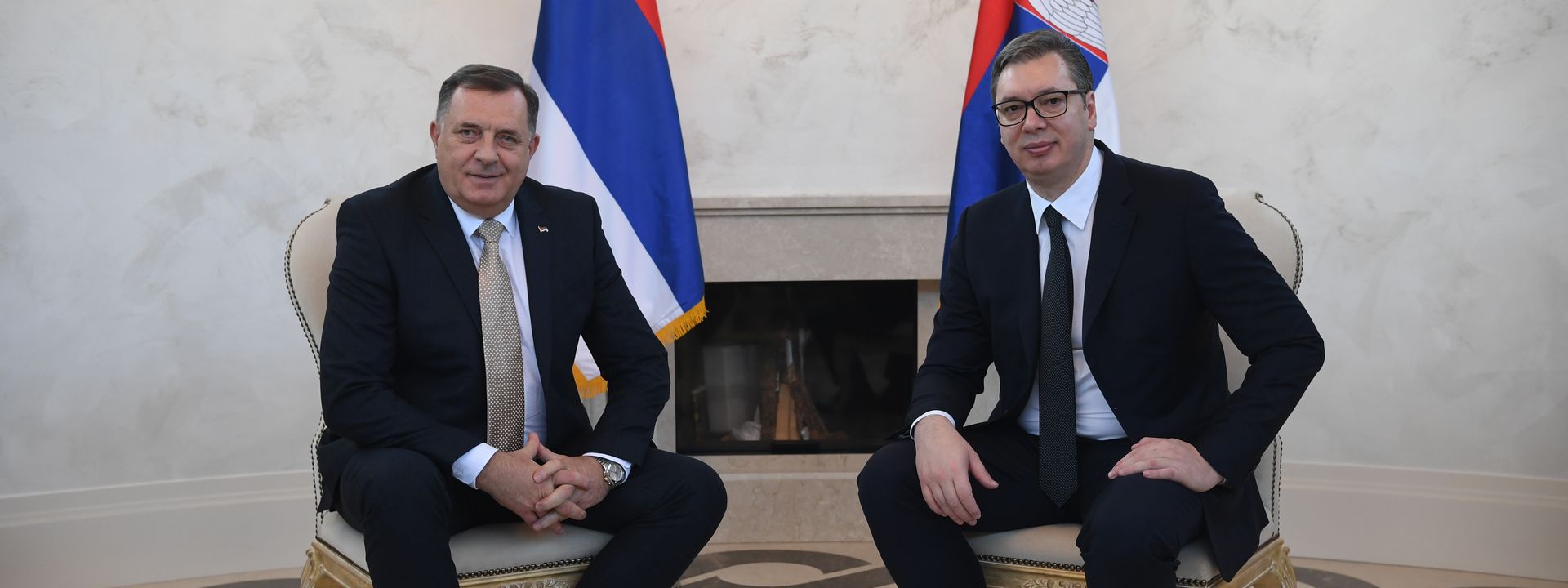
President Dodik underlined that it is nearly impossible for the Serbian people to fight for justice and consistent implementation of the Dayton Agreement due to the unilateral and biased approach, primarily that of the United States of America.
President Vučić assessed that the US sanctions against Milorad Dodik and other officials of the Republic of Srpska represent a dreadful precedent and that they can only produce catastrophic consequences for the development of relations between the three nations and two entities in Bosnia and Herzegovina and beyond, in the entire region.
"Sanctions have always brought only a problem, and never a solution," President Vučić added.
Considering the weight of the position of the entire Serbian nation, and particularly the inappropriate and unjust pressures on the Republic of Srpska and its leadership, President Vučić asked President Dodik and all political forces in the Republic of Srpska to participate in the work of joint institutions in Bosnia and Herzegovina and to protect the interests of the Serbian people and the Republic of Srpska in the best manner.
President Vučić pointed out that every decision is up to the Republic of Srpska leadership, but that he also invites President Dodik and all political representatives in the Republic of Srpska to consider his suggestion, as it is clear that some political factors that substantially jeopardise the stability of the entire region through untruths and insinuations are endeavouring to assign the fault for that to the Serbian people and the Republic of Srpska.
"My request to President Dodik and all political factors in the Republic of Srpska is not a request to agree with anything or to vote for anything. On the contrary, my request is that the table where the Republic of Srpska representatives should sit should not be vacant and that they should fight in the best possible way for the interests of the entities and the Serbian people," Vučić emphasised.
President Vučić offered to present his proposal to President Dodik and all institutions and political representatives in Banja Luka.
President Vučić and President Dodik also discussed the significant financial support the Republic of Serbia plans for the Republic of Srpska, and that the teams of the two presidents and the two governments will speed up talks and inform the public as soon as possible.
Vučić and Dodik also consented to hold a grand assembly of the Republic of Serbia and the Republic of Srpska, including a joint session of the two governments on January 27, when strategic economic projects and further improvement of cooperation in all areas between Serbia and the Republic of Srpska will be decided. www.predsednik.rs |
|
|
| Serbia continues to work on strengthening ties with Republika Srpska |
|
8.1.2022.
Prime Minister Ana Brnabic stated today that Republika Srpska was created on genocide, but on genocide against the Serbian people, which was planned and carried out in detail in the 1940s, with a clear intention to continue and end it 50 years later.
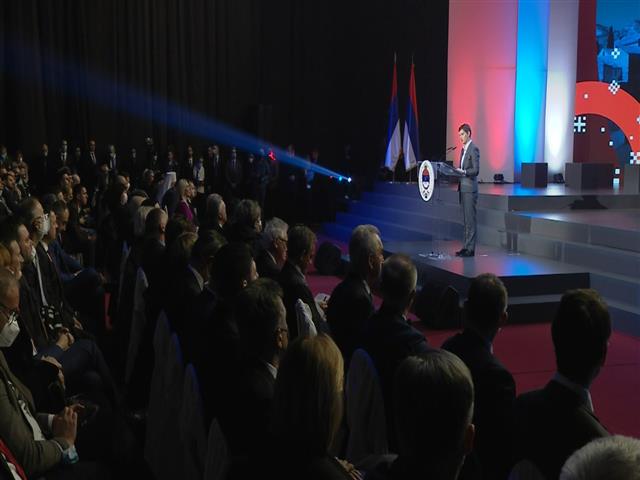
If there was no suffering of the Serbian people from 1941 to 1945 and if there was no salute "Za dom spremni" again in 1991, there would be no Republika Srpska, Brnabic pointed out, speaking at the Ceremonial Academy on the occasion of Republika Srpska Day in the Borik Sports Hall in Banja Luka.
I believe that they would complete the "job" that they started 50 years earlier and complete the "job" of extermination of the Serbian people and the Orthodox faith, the Prime Minister stressed, adding that Republika Srpska is, above all, an indicator of how much the Serbian people were determined to prevent a recurrence of World War II atrocities.
Republika Srpska is the fruit of the desire for peace, for freedom, for the safe upbringing of children, the desire that crimes against the Serbian people do not continue and do not repeat. Both we Serbs and we in Serbia must be the first to know that, and we must be the first to defend Srpska, said Brnabic.
She pointed out that she is extremely honoured to be in Banja Luka today, to take part in marking an important date such as Republika Srpska Day, and to have the opportunity to convey congratulations and greetings to Serbian President Aleksandar Vucic and Serbian citizens.
The Prime Minister said that, as the Prime Minister of the country that is the guarantor of the Dayton Agreement, she is extremely concerned about the challenges and problems Republika Srpska is facing, its leadership and the representatives of the Serbian people in Bosnia and Herzegovina.
I am deeply concerned about the decision of the United States, as well as the manner and explanation of the imposition of sanctions on Milorad Dodik. That requires us to behave rationally, responsibly and seriously, without making hasty decisions, she pointed out.
The fact is that sanctions have never been the solution to any problems. That is why, I want to say again what President Vucic said: Serbia will never impose sanctions against members of its people and representatives of the Serbian people in Bosnia and Herzegovina and Republika Srpska, Brnabic emphasised.
She stated that the policy of Serbia “Open Balkans” is cooperation, and not conflicts.
It is a policy that wants to create conditions in the Balkans for a different future from the past I talked about. The policy of economic and infrastructural connections, deepened cooperation, prosperity and economic revival of all peoples in the Balkans. Not borders and restrictions, but the free flow of people, goods, capital and services, the Prime Minister explained and reiterated that Serbia is facing the future.
She pointed out that Serbia will continue to work on strengthening ties with Republika Srpska, on improving the economic position and development of the cultural life of the Serbian people, and that no one can forbid it.
Since 2014, we have invested more than €88 million in aid to Republika Srpska. I am proud of our participation in humanitarian actions, construction of schools, kindergartens, ambulances, roads, communal infrastructure, cultural centers - all projects whose goal is a better quality of life for all citizens, the Prime Minister underlined.
The Serbian people remain committed to preserving freedom, equality and justice, and these are the true virtues that we preserve and pass on to future generations. Long live Republika Srpska, said Brnabic. |
|
|
| Selakovic and Gouillon delivered aid to 35 Serbian households in Bosanski Petrovac |
|
11 December 2021
Today, Minister of Foreign Affairs of Serbia Nikola Selakovic and Director of the Office for Cooperation with the Diaspora and Serbs in the Region Arnaud Gouillon visited the municipality of Bosanski Petrovac, where within the Project of economic empowerment of returnee households in the Federation of Bosnia and Herzegovina (BiH), they handed over aid to 35 Serbian households engaged in agriculture.
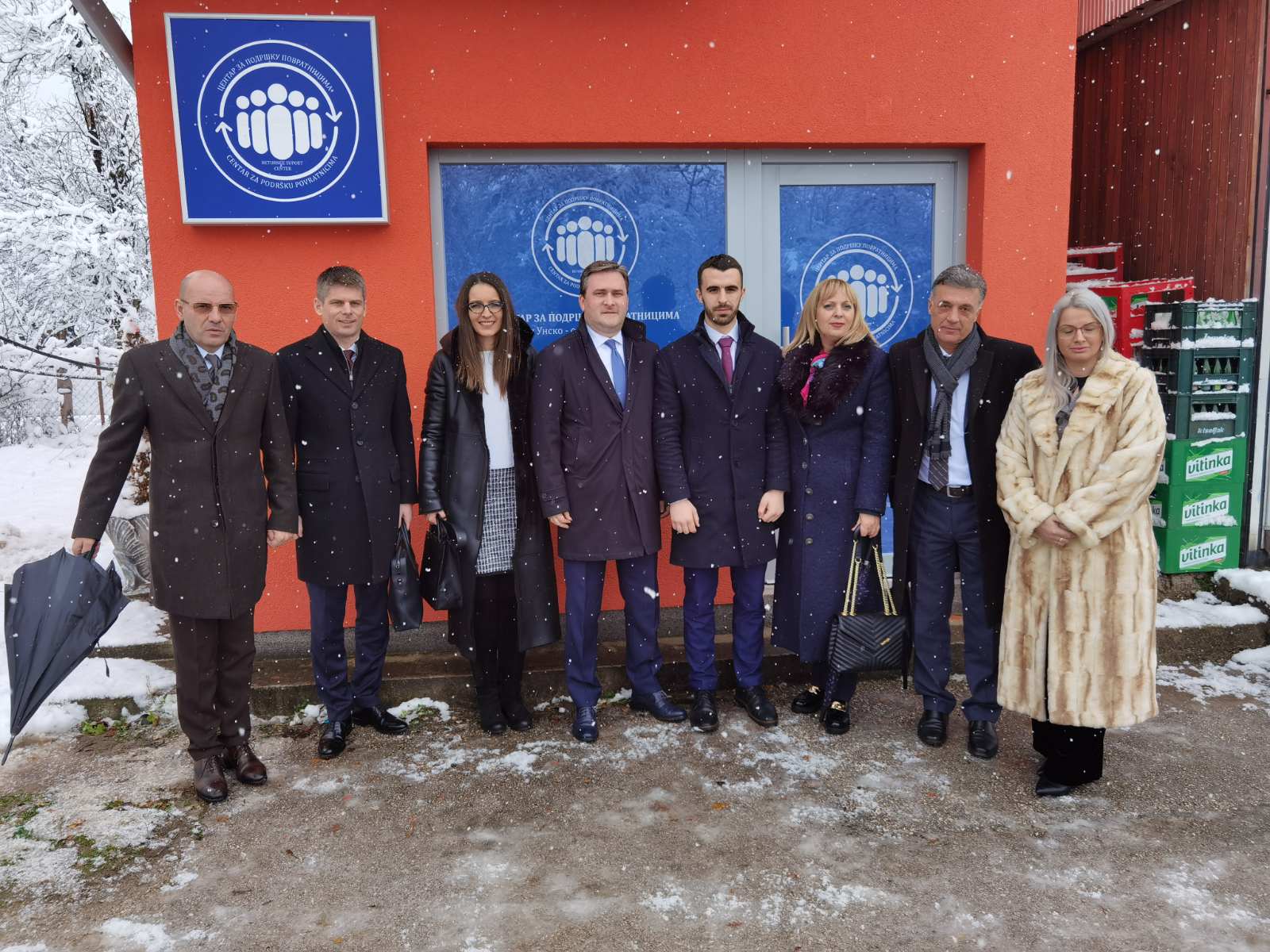
Minister Selakovic and Director Gouillon handed over contracts for the donation of 35 pregnant heifers, and the Head of Serbian diplomacy said that today we are sending a message of love, peace and solidarity and that with this assistance we are showing that we can do something good for ordinary people.
"You may rest assured that Serbia will continue to send such messages both in the Federation and in the Republic of Srpska, in the whole of Bosnia and Herzegovina, while respecting its territorial integrity, but showing love for Srpska", said Minister Selakovic in his address to the families who received the aid.
Minister Selakovic emphasized that he was convinced that this assistance would be only the first in a series provided by the Ministry of Foreign Affairs and the Office for Cooperation with the Diaspora and Serbs in the Region.
As he noted, the aid that was delivered today would have been impossible if the President of Serbia, Aleksandar Vucic, the then Prime Minister, had not started a wave of serious, important reforms in Serbia back in 2014, which gave results in creating new value and greater social wealth, thus moving Serbia forward from being in a state of stagnation, disorganization and social and economic chaos, and which ensured Serbia becoming one of the fastest growing economies in Europe for the second year in a row.
“That would not be possible if our policy in the region has not been and remained the policy of a helping hand, because there is no well-being if only you are doing well and the neighbours are not, and the policy of our state and the policy of President Aleksandar Vucic is that when we are well, we should also help others be well", underlined Minister Selakovic.
The Head of Serbian diplomacy said that his heart was full today to see diligent, hard-working and brave people who are engaged in cattle breeding.
"Both Serbs and Bosniaks are sitting here. It is not well when only some of us are doing well, there is no well-being in that case. We must all work together a lot harder for the benefit of all of us, and if we all work together, the chances of us getting better will be much greater", said Minister Selakovic.
The Head of Serbian diplomacy stated that he was proud that the first project was realized, with the significant support of President Aleksandar Vucic and Prime Minister Ana Brnabic, and that a total of 62 families who applied for the call for the provision of assistance met the requirements.
"There are 27 more families that have yet to be donated a heifer. We agreed today that in the next three months, those 27 families will also get their heifers. Good and hardworking people should be supported. We agreed to try to do something similar not only in Petrovac, but also in Sanski Most, Drvar, Grahovo, Glamoc", said Minister Selakovic.
The Director of the Office for Cooperation with the Diaspora and Serbs in the Region, Arnaud Gouillon, said that the Office had launched projects of economic empowerment of Serb returnee families in the Federation of BiH, amounting to a total of 9,162,000 dinars.
"We have divided this into three projects on the territory of Bosanski Petrovac, Grahovo and Posavina. These are pilot projects, the first of their kind that the Office launched this year together with local Serbian NGOs.
Support to Serbian households engaged in livestock farming and agriculture aims to create self-sustaining family economies. The first goal is that their capacities fully meet the needs of the family, and the second goal is to be able to market the surplus", Gouillon said.
He said that, the day before in Posavina, milling machines, motor cultivators, trimmers and chainsaws were handed over to Serbs who are engaged in agriculture in that part of the Federation of BiH.
"Our ultimate goal is to form a cooperative that would bring all those people together, all those Serbian farmers and make their work easier. Two million dinars were invested in this project, and 40 households with more than 140 members were included ", Gouillon said.
According to him, in Grahovo, beekeeping equipment worth one million dinars was provided from the funds of the Republic of Serbia, in order to help returnees whose livelihood depended on honey production, and 6,162,000 dinars was allocated for the third project implemented through the Returnee Support Centre from Bosanski Petrovac for the procurement of pregnant heifers.
Gouillon emphasized that a donation was given today to brave and determined people who, with their optimism, proved that they believed in a better tomorrow, and that the help they received will be an incentive and motivation to dedicate themselves even more energetically to their work and be more successful.
"That assistance clearly indicates that their motherland, theirs, our Serbia, thinks of and cares about them, about their fate and well-being", Gouillon underlined, who also visited some of the households that received the aid together with Minister Selakovic.
Selakovic and Gouillon visited households in Bosanski Petrovac
Minister of Foreign Affairs of Serbia Nikola Selakovic and Director of the Office for Cooperation with the Diaspora and Serbs in the Region Arnaud Gouillon visited today households in Bosanski Petrovac in the Federation of BiH that were each donated one pregnant heifer, within the projects co-financed by the Office of the Ministry of Foreign Affairs for Cooperation with the Diaspora and Serbs in the Region.
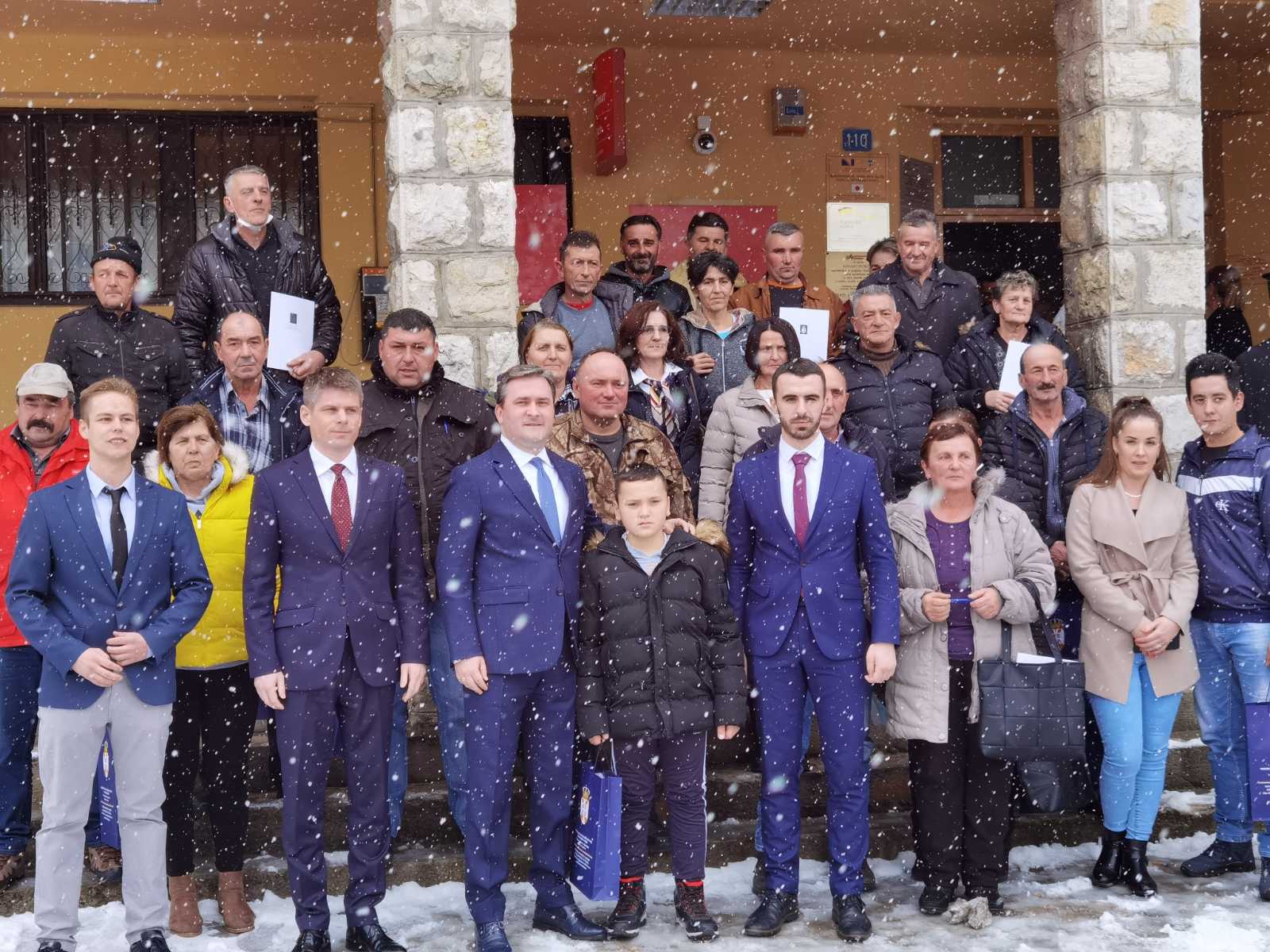
These are five-member returnee families with three children each, to whom, as they say, this help means a lot.
One of them is the family of Steva Loncar, who is primarily engaged in agriculture, but also in forestry, beekeeping and hunting.
He stated that there were returns to Bosanski Petrovac and that even more people would return, if they were enabled to work.
"To encourage this a little, to do something so that work can be done. We have everything we need for life - water, roads, telephones, electricity, it is only just that young people go abroad looking for work", said Loncar.
Snezana Jelicic, who has three children and whose husband passed away, also says that the help is significant.
"I am a single mother with three children and this heifer means a lot to us because our income is low, and all my children go to school", said Snezana, who modestly stated, as did her 11-year-old son Milos, that they did not need anything else.
With this help, the Jelicic household now has a total of two cows in the barn, thanks to which, says Snezana, there will be more milk, cheese and cream for sale.
Earlier today, Serb and Bosniak returnee families in Bosanski Petrovac were presented with contracts for the donation of a total of 35 pregnant heifers.
Apart from the heifers for cattle breeders in Bosanski Petrovac, for which more than six million dinars were earmarked, Serbian families in Posavina received assistance in the form of agricultural machinery, for which two million dinars were allocated.
These are 43 households in the local community of Novi Grad, the municipality of Odzak, in the territory of the Posavina Canton, that were donated motor cultivators, trimmers, chainsaws and fruit sprayers.
Within the projects co-financed by the Office for Cooperation with the Diaspora and Serbs in the Region, one million dinars have been allocated as assistance to beekeepers in Bosansko Grahovo.
Selakovic: We will continue to help Serbs in BiH and their Bosniak neighbours
Minister of Foreign Affairs Nikola Selakovic stated today, after handing over assistance to 35 families in Bosanski Petrovac, that Serbia would continue to help Serbs in Bosanski Petrovac, Drvar, Grahovo and Glamoc, but also their Bosniak neighbours.
“It is not acceptable that only some of us are doing well while others suffer. That is what our policy stands for, our regional policy. Much like when President Aleksandar Vucic initiated the policy of donating vaccines to both the Federation and the Republic of Srpska, North Macedonia and Montenegro at the beginning of this year, and when Serbia opened its borders to all citizens from the neighbouring countries who wanted to be vaccinated, today we are helping our compatriots in Bosanska Krajina.
"We will continue to do so, because only an economically strong and successful Serbia can provide good support to the Republic of Srpska, but also to all Serbs living in the area", said Minister Selakovic.
The Head of Serbian diplomacy said that in the last four years, Serbia provided assistance to Drvar amounting to 2,915,000 euros for specific projects, and to Bosanski Petrovac of around 250,000 euros for several communal projects.
“This time, the Ministry of Foreign Affairs and its Office for Cooperation with the Diaspora and Serbs in the Region together with the Returnee Support and Assistance Centre headed by Nemanja Davidovic in Bosanski Petrovac helped 35 returnee families, not only Serbs but also Bosniaks, who received one pregnant heifer each”, said Minister Selakovic.
According to the Minister, President Aleksandar Vucic had at one point initiated painful reforms that were showing results, and Serbia began to help Serbs in Bosanska Krajina more and more every year.
The Director of the Office for Cooperation with the Diaspora and Serbs in the Region, Arnaud Gouillon, said that this year, for the first time, the Office supported and financed three self-sustainable projects in Posavina, Bosanski Petrovac and Grahovo.
"Yesterday we donated agricultural machinery in Posavina, today 35 heifers in Bosanski Petrovac, and beekeeping equipment in Grahovo. The total value is nine million dinars. By doing so, we want to send the message that the motherland, our Serbia, is with its people, with the returnees, with other people who share the fate of the returnees and the Serbian people, to show them our care and solidarity.
In the period ahead, we will continue with similar projects for the benefit of all who live in this area", Gouillon said.
Nemanja Davidovic from the Returnee Support and Assistance Centre in Bosanski Petrovac said that the aid delivered today meant a lot to Bosanski Petrovac and stated that this was the second largest investment of the Republic of Serbia in that municipality.
“Even the greatest of suffering is easier when you have friends, and the state of Serbia, Minister Selakovic and Arnaud Gouillon are our friends”, Davidovic said. |
|
|
| Selakovic: Serbia supports the development and progress of the Republic of Srpska |
|
7 December 2021
Minister of Foreign Affairs of the Republic of Serbia Nikola Selakovic met today with Minister of European Integration and International Cooperation of the Republic of Srpska Zlatan Klokic and stated that Serbia respected and supported the territorial integrity of Bosnia and Herzegovina (BiH), but that it also supported the Republic of Srpska in its efforts to develop and make progress as an equal entity within BiH.
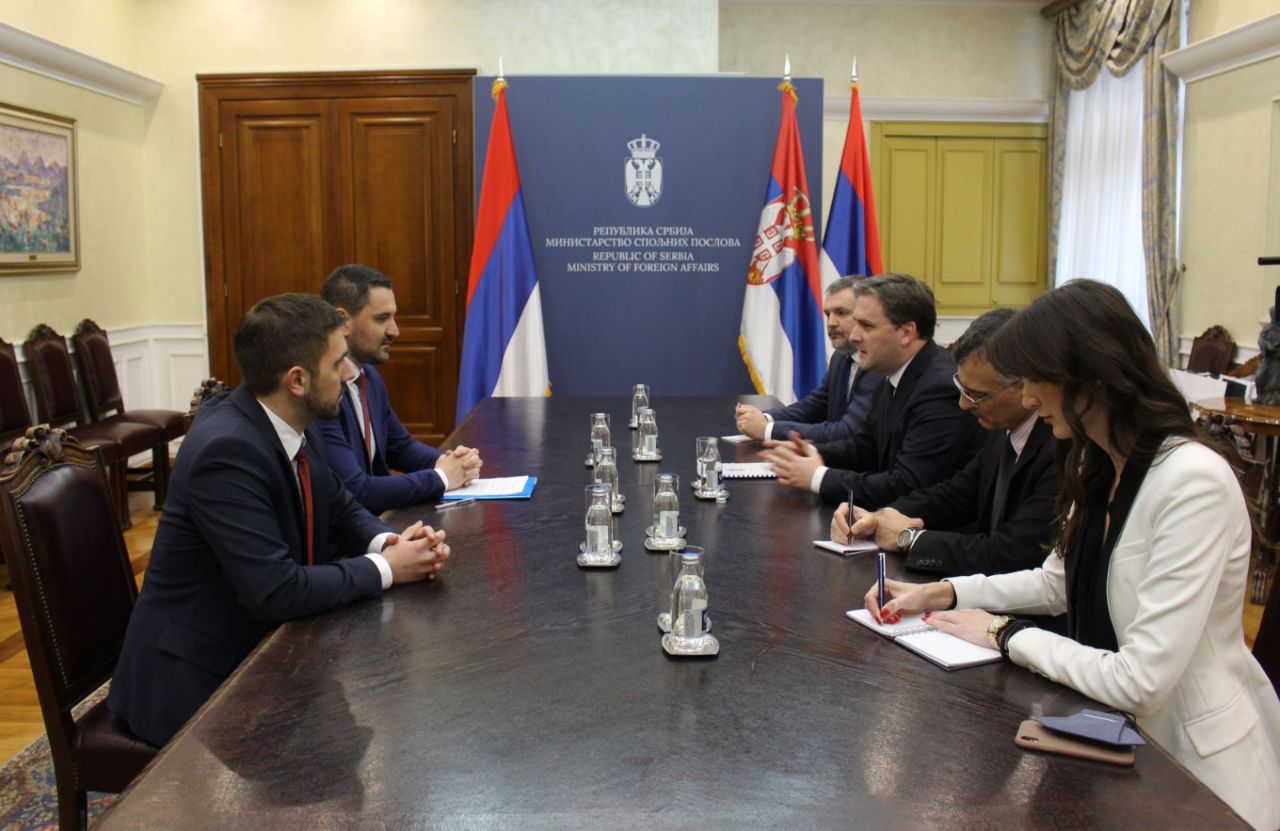
After the meeting with Minister Klokic, Minister Selakovic said that Serbia wanted to build the best good-neighbourly relations with BiH in the future, but also reminded that Serbia had an Agreement on special and parallel ties with the Republic of Srpska.
"Serbia is working diligently and dedicatedly on its implementation. The Republic of Serbia loves the Republic of Srpska and supports it in its efforts to develop and make progress as an equal entity within BiH", said the Head of Serbian diplomacy.
According to the Minister, the contribution to such development and progress was visible at every step in the activities of Serbian state authorities, from Serbian President Aleksandar Vucic, to the Serbian Government and all line ministries, through a large number of projects with which Serbia was present in the Republic of Srpska.
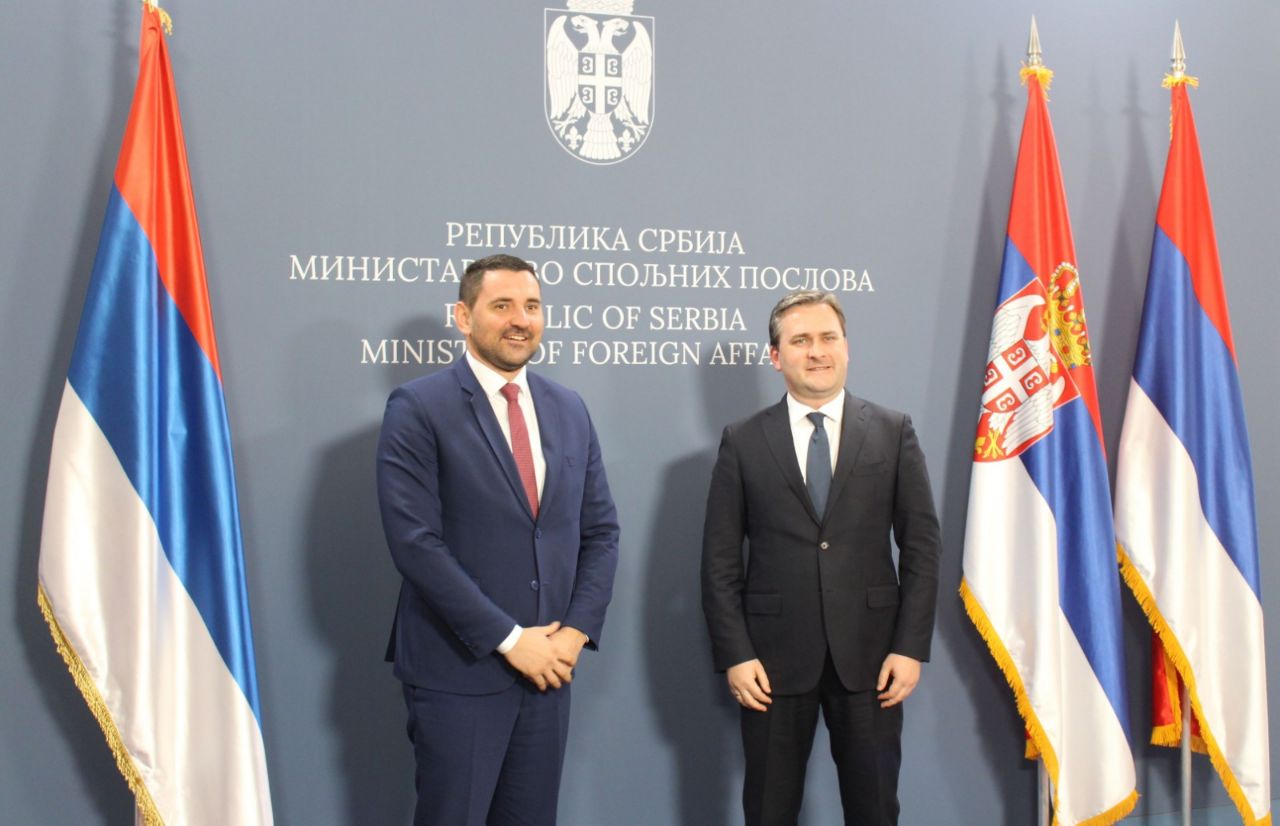
Minister Selakovic said that there was no local self-government unit in the Republic of Srpska that had not received a kind of assistance from Serbia, aimed at contributing to raising the quality of life in Srpska.
The Minister stated that Serbia was committed to cooperating with the Republic of Srpska in various areas, in the first place in infrastructural connectivity, and noted in that context the joint work being done on the realization of a large project of building a highway from Belgrade to Sarajevo.
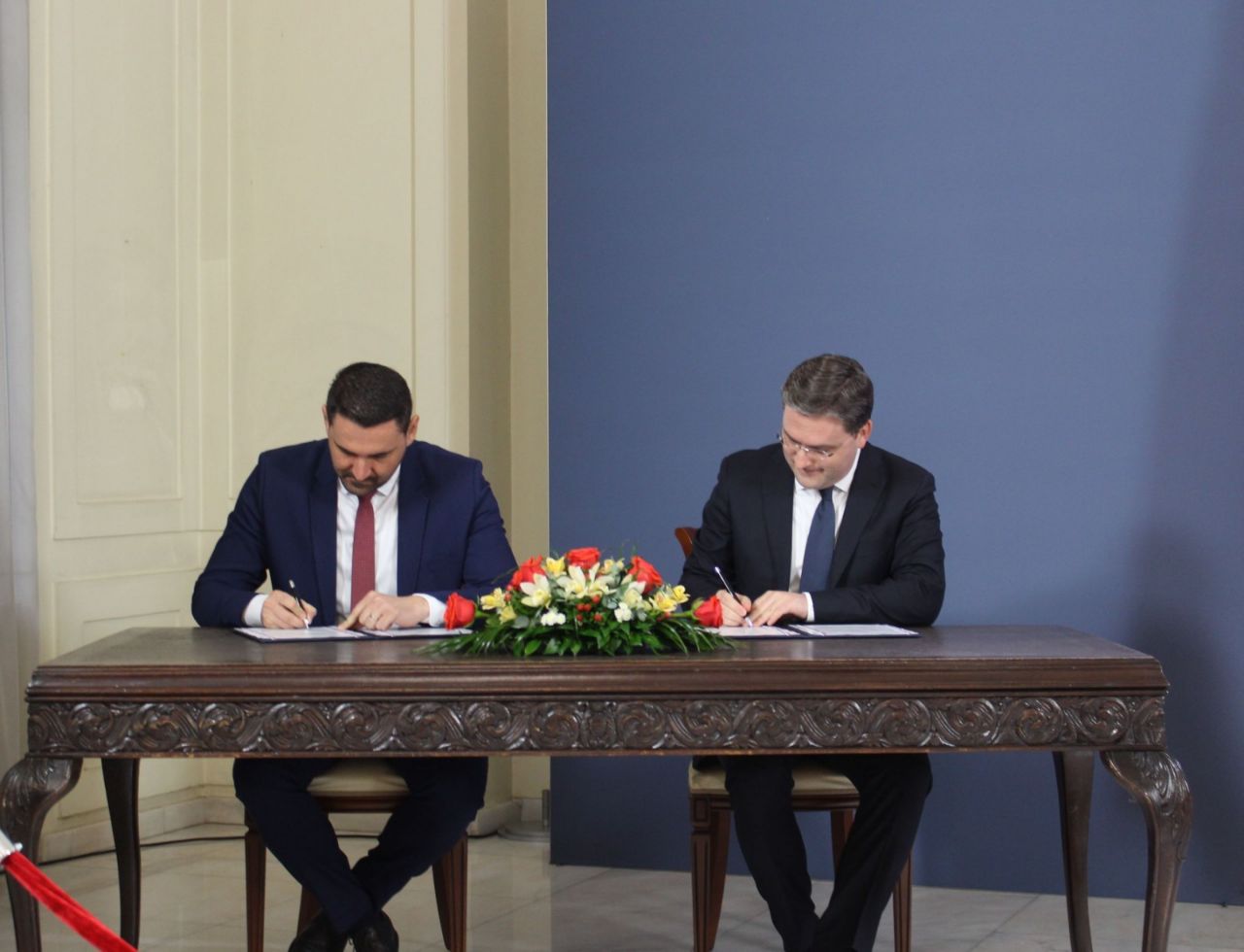
After the meeting, the two Ministers signed a Memorandum of Cooperation between the Government of the Republic of Serbia and the Government of the Republic of Srpska in the field of diplomatic education, and the Serbian Foreign Minister said that the memorandum was the legal basis for a number of young, talented people from the Republic of Srpska to attend training during their higher education at the Diplomatic Academy of the Serbian Ministry of Foreign Affairs in the future, the implementation of which should begin in the next academic year.
Minister Selakovic announced that he would visit Bosanski Petrovac with the Director of the Office for Cooperation with the Diaspora and Serbs in the Region, Arnaud Gouillon, on Friday and Saturday, where he would hand over valuable assistance to compatriots engaged in agriculture.
Minister Klokic expressed gratitude for the support that the Republic of Srpska was receiving from Serbia and stated that it had never been more concrete than in the last seven years, through various projects, while expressing gratitude to Serbian President Aleksandar Vucic and Serb member of the BiH Presidency Milorad Dodik.
"There is not a single municipality or city in the Republic of Srpska where Serbia has not implemented a project that meant a better life for its citizens", said Klokic and thanked Minister Selakovic for his most sincere and open support. |
|
|
| UNESCO’s role extremely important for preservation of Serbian heritage in Kosovo and Metohija |
|
12 November 2021
Prime Minister Ana Brnabic stated today that severe examples of endangering the Serbian cultural, historical and spiritual heritage in Kosovo and Metohija are proof of the important role of UNESCO in protecting and preserving heritage.
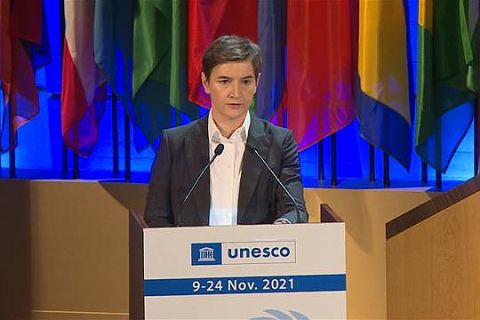
At the 41st session of the General Conference of UNESCO in Paris, Brnabic emphasized that four jewels of the Serbian medieval cultural heritage in Kosovo – Visoki Decani, Pec Patriarchate, Gracanica and Bogorodica Ljeviska, have been preserved thanks to the fact that they are inscribed on the endangered world heritage list. Hundreds of other sites and monuments are endangered.
The Serbian heritage in Kosovo and Metohija is of immeasurable importance, not only for the national identity of Serbia, but also as a part of the esteemed European and world heritage, she underlined.
Source/Photo: www.srbija.gov.rs |
|
|
| Joint statement of the participants in today's meeting of the Open Balkans initiative: "The future of enlargement – a view from the region" |
|
4 November 2021
The President of the Republic of Serbia, Aleksandar Vučić, the Prime Minister of the Republic of Albania, Edi Rama, and the Deputy Prime Minister of the Republic of Northern Macedonia in charge of European affairs, Nikola Dimitrov, signed a Joint Statement "The future of enlargement – a view from the region" today, within the Open Balkans cooperation initiative. We transmit the text of the Joint Statement in its entirety:
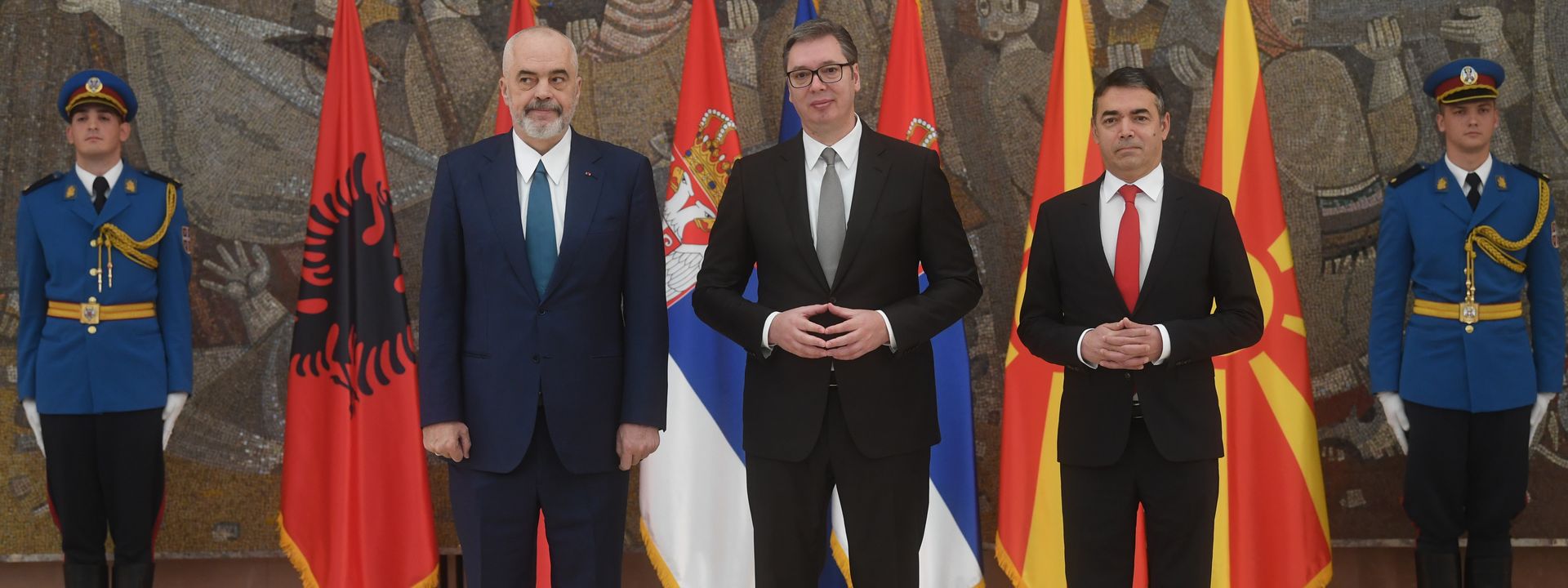
"The European Union and its member states, together with partners from the region, reaffirmed their unequivocal support for the European perspective of the Western Balkans at the Summit in Brdo on 6 October.
The Western Balkans reiterated the region's commitment to European values and democratic principles, the rule of democracy, fundamental rights and the rule of law.
However, the European Union's questionable capacity to integrate new members, internal debates among EU member states and bilateral relations have hampered the region's real progress towards the EU.
On paper, enlargement policy remains active. In practice, however, there is growing disappointment among citizens in the region regarding the EU perspective.
In addition, delays in the EU perspective have cost the region too much politically.
Northern Macedonia is a great example of unfulfilled promises of the European Union. Its government tried to meet Brussels' conditions, only to find itself isolated and left to deal with the consequences of EU decisions. This weakened perspective of European integration threatens to leave us more disintegrated than ever. This feeling is common throughout the region.
As the European Union develops new and far-reaching strategies, the region is desperately trying to implement existing ones. And while our path to the European Union has derailed, we still remain committed to meeting EU standards.
We cannot allow this negative spiral to jeopardize the very basis of the region's future and prosperity.
The European Union is moving forward, while the region is stuck within the dilemmas of the EU itself. The European Union should and must explore all ways towards faster integration of the Western Balkans in the run-up to their accession, together with its commitments for phased accession as defined in the new methodology.
Accordingly, it would be useful to involve the region in the development of the European Union's trade and tax policy, such as the mechanism for adjusting the carbon dioxide emission limits and protective temporary measures to restrict steel imports, to name just a few.
We could also explore the possibility of exempting the Western Balkans from various erga omnes trade policy measures.
Our universities could be involved in the field of higher education and research of the European Union, which would provide an equal chance to participate in tailored programs, research and innovations of the EU. At the same time, our agriculture is crying out for additional funds, and it has huge potential for expanding and delivering high quality products to the market of the European Union.
This could prevent the negative impact on the stabilization and economic performance of the region. We believe that it is in the interest of the European Union to help build and promote a secure and prosperous region.
And more than that – together we could explore Schengen participation and gradual integration into the single market of the European Union.
Today's world is changing rapidly. It is time to act, and act decisively. We cannot afford nor will we be forgiven for missed opportunities, indulgences and lack of determination to realize this strategic vision.
We need to understand each other better if we want to achieve the best results. If anyone thinks we have to act now, that was already yesterday.
To this end, today we reaffirmed our determination to deepen our economic cooperation within the Open Balkans initiative, building on the Berlin Process agenda and focusing on rapid and tailored implementation.
In this endeavour, we have engaged our chambers of commerce and instructed them to prepare detailed guidelines for the implementation of the Memorandum of Understanding and Cooperation regarding the facilitation of imports and exports, which was signed in Skopje on 29 July.
Today, we approved a detailed plan to implement trade facilitation measures and asked the Western Balkan Regional Chamber of Commerce to further monitor the implementation process. We have also decided to form an Inter-Ministerial Council, which will work closely with the chambers of commerce to implement these measures.
The Western Balkan is ready to move at an accelerated pace. We need to move forward. That is how the European Union should also move – towards the Western Balkans. Staying idle is not an option.
We invite all other parties in the region to join us and we welcome them. The Open Balkans is open", the integral text of the Joint Statement reads.
Source: www.predsednik.rs
Photo: Dimitrije Goll |
|
|
| Address of the President of the Republic of Serbia at the United Nations climate change conference COP26 held in Glasgow |
|
2nd November 2021
"Your Excellences,
distinguished delegates,
dear Sarah,
At the very beginning, I feel obliged to thank Prime Minister Boris Johnson and Her Majesty’s Government for exceptional hospitality.
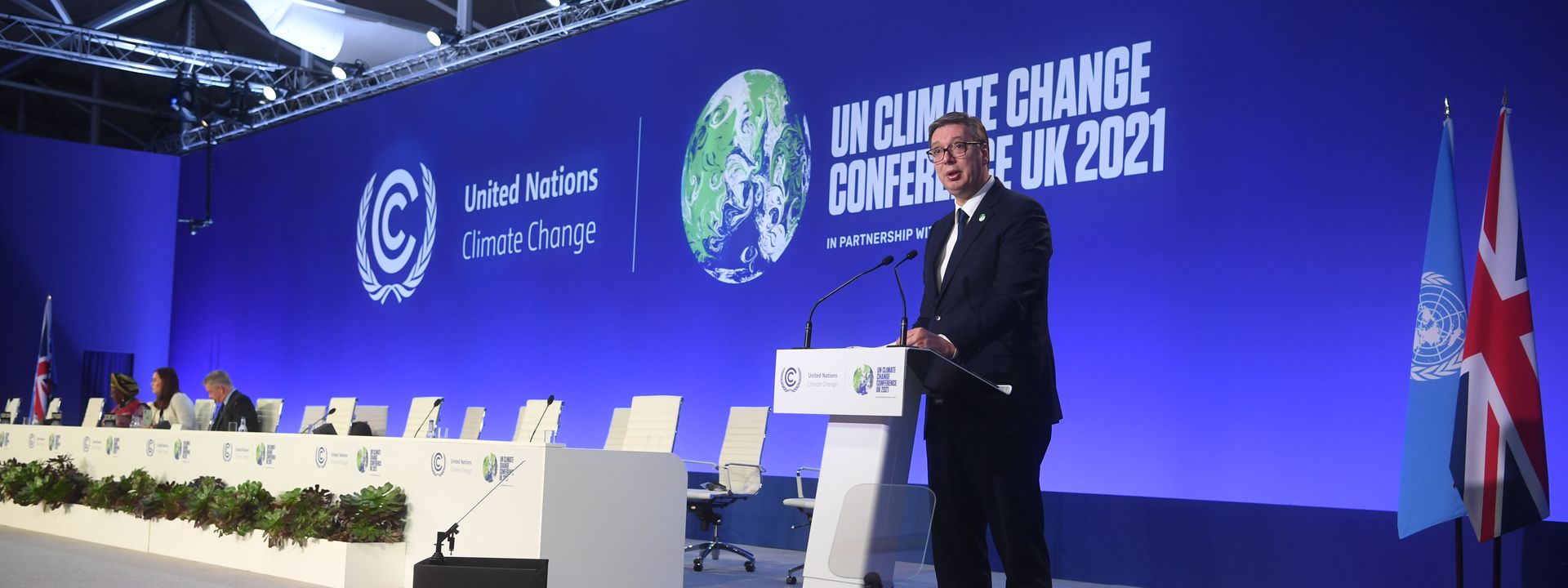
I feel privileged to represent the Republic of Serbia at this important place and at the highest-level world forum, in working on the most important topic of today – promoting climate awareness.
We all agree that we must make investment into climate and environment.
We all, likewise agree, that future generations must be educated in order not to repeat the mistakes we made, by hurting the only Planet that makes life possible.
I am very honoured that the Republic of Serbia is co-chairing this year’s Conference as a Non-EU representative of the Eastern Europe Group.
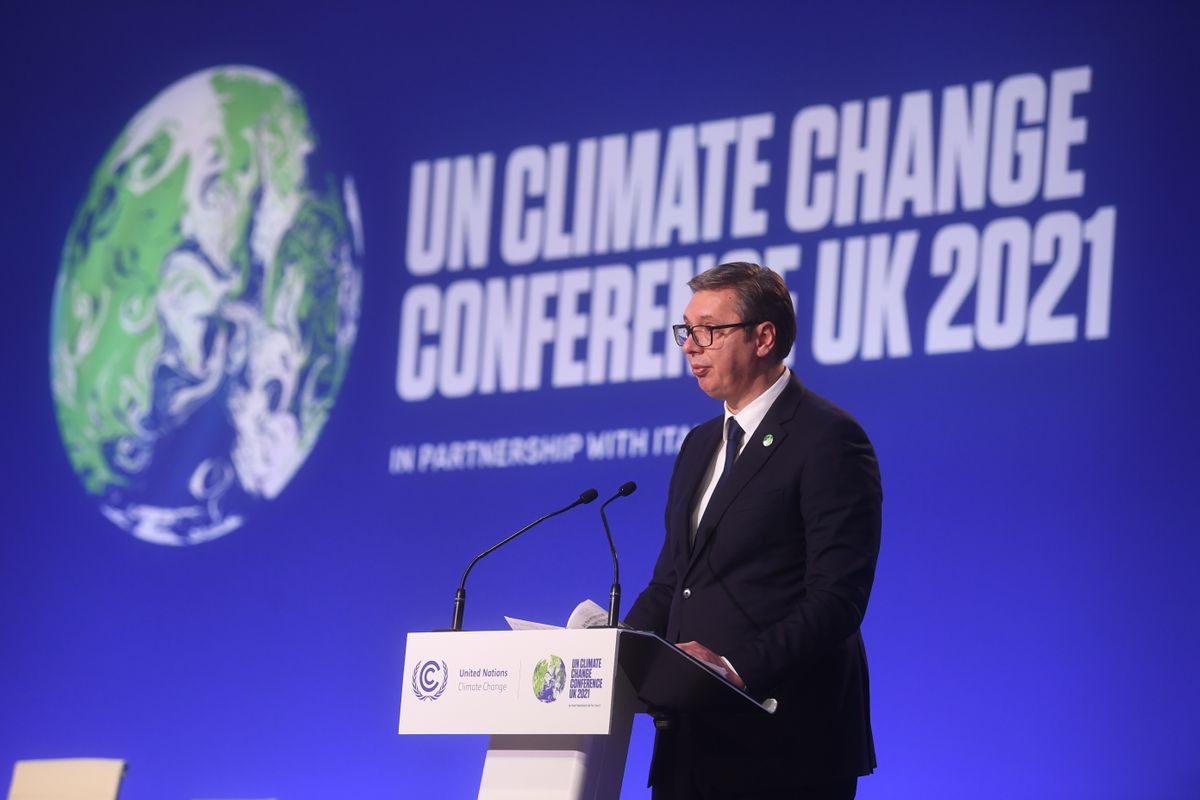
In concrete terms, we see the special contribution of our expert team in finalising negotiations on the implementation of Article 6 of the Paris Agreement, which refers to the establishment of the global market and non-market mechanisms for reducing greenhouse gas emissions, as well as to remaining provisions referring to advanced transparency framework and common timeframes for Nationally Determined Contributions, which are the key provisions of the Agreement that have not yet been covered by the decision that is to be adopted by the Conference, i.e. all member states.
We, therefore, believe that this is an exceptional opportunity for Serbia to give its full contribution to the finalization of negotiations, which, we hope, will secure full implementation of the Paris Agreement.
As a result of strong economic development, modelled for Serbia by 2050, the impact of the implementation of climate measures to employment will be optimal, through new jobs creation and creation of new industries which have not existed so far.
One billion euros was raised at the first green bonds auction in Serbia, which clearly confirms the trust of international investors in our green agenda, but also to the economic and political stability of our country.
Incomes from green bonds issuance will be used for financing renewables, energy efficiency, sustainable water management, prevention of pollution and circular economy development and biodiversity preservation.
And as you can see, dear friends, my people made a terrific speech for me, but I am going to add a few more words and a few more questions for those that are coming from big powers and that haven’t answered yet several questions:
Number one is: how are we going to finance all these activities?
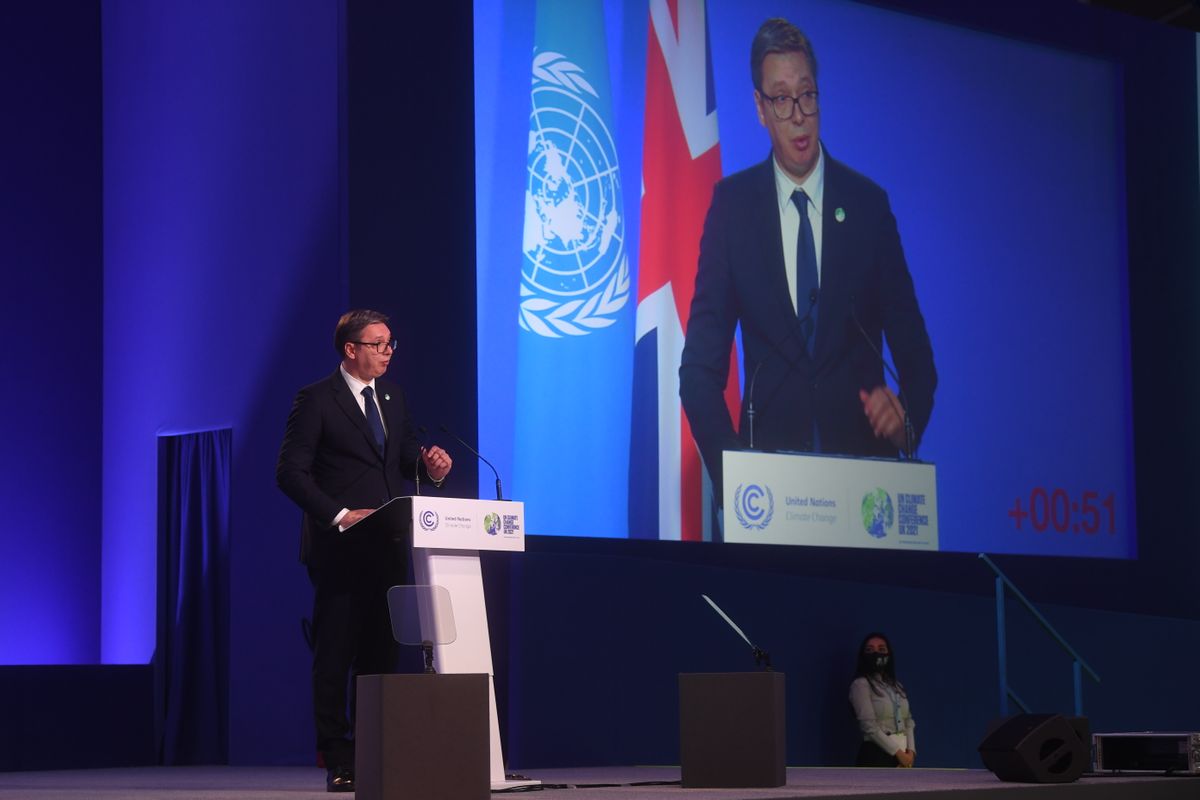
We’ve heard the story of trillions of dollars that are at our disposal. My question would be: what would be the interest rate, what would be the terms for taking these amounts of money, and actually how are we going to tackle that issue?
Number two: how are we going to treat the nuclear power plants? Are we going to shut them all or are we going to build them more?
Then, how are we going to build more renewables if we already started endorsing populist movements against wind parks, new hydropower plants, and are we going to put in jeopardy the level of our public debt to GDP ratio if we raise huge amounts of money?
How are we going to treat natural gas, and how are we going to secure decent prices of natural gas and electricity power as well?
And, I came here using an electric car from Edinburgh to Glasgow. But, how are we going to do mining and refining of lithium, nickel, cobalt and many other very important minerals?
In the end, we all know what is our final aim, what is our final target. But, it’s not a fairytale – we’ll have to work a lot, we’ll have to be 100 per cent dedicated, and we’ll have to be more honest with each other.
The health of people living in Serbia depends directly on the implementation of this Agenda, just like the health and life of each living being on Earth depends on arrangements that will be reached here and on national implementation of the respective arrangements.
Perhaps it is the right time to listen and hear the cry of Mother Earth because if we lose this race against time, our children will inherit an irreparably polluted Planet.
Thank you very much for listening to me."
Source: www.predsednik.rs
Photo: Dimitrije Goll |
|
|
| Contracts for 14 apartments in Belgrade for refugees from B&H and Croatia awarded |
|
25 October 2021
The Minister of Foreign Affairs, Nikola Selaković, attended the handing over of contracts for 14 apartments intended for refugee families from Bosnia and Herzegovina and Croatia tonight in the Old Palace, which were purchased within subproject 9 of the Regional Housing Program of Serbia.
"It is my great pleasure and honor to greet you all on behalf of the Government of Serbia, on behalf of the state of Serbia, to thank all donors, especially the EU, which gathered the largest number of donors who are EU member states, but especially the Kingdom of Norway, as one of the largest donors outside the territory of the EU, on the successful completion of the ninth sub-phase of the Regional Housing Program", stated the head of Serbian diplomacy.
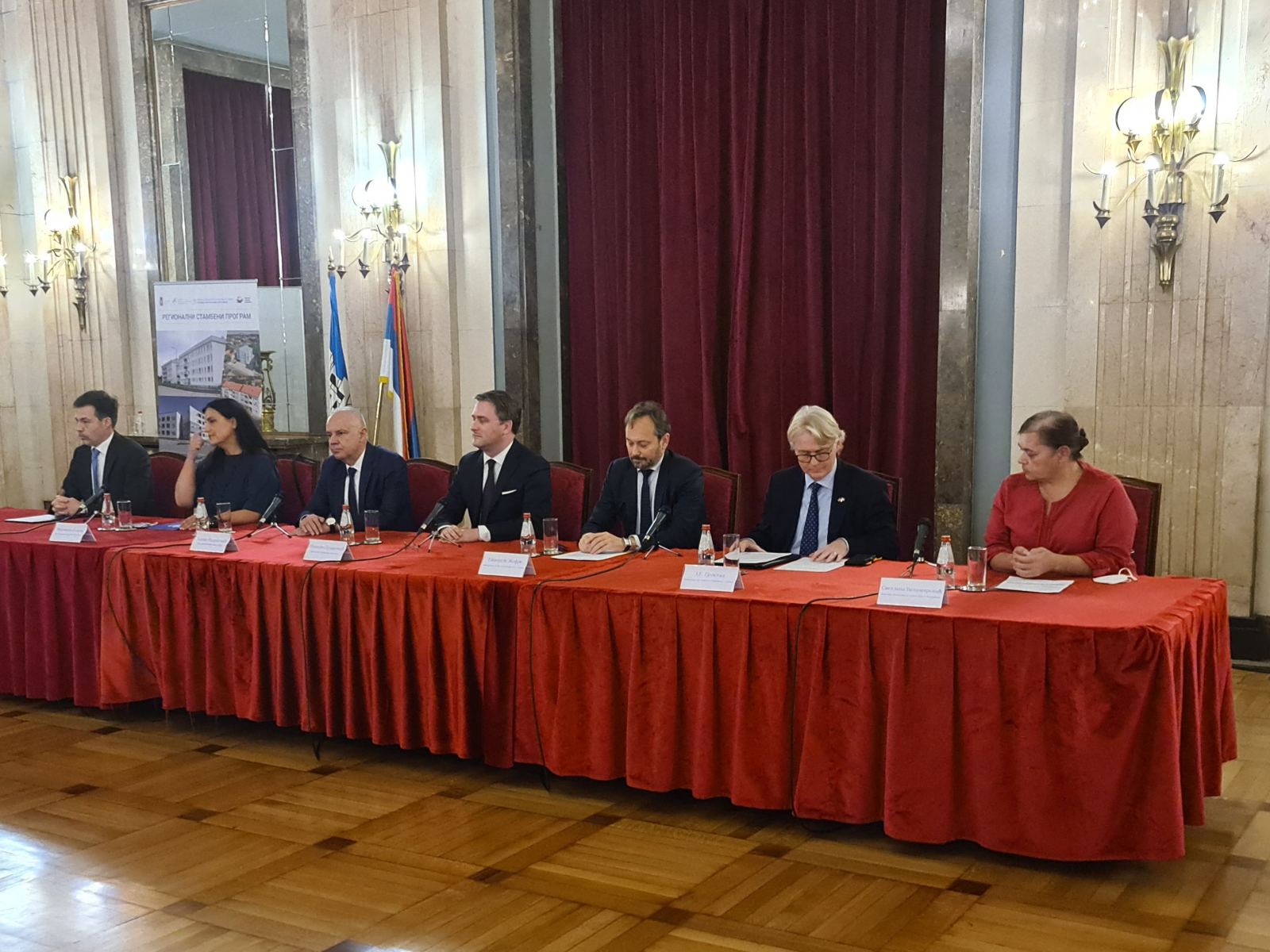
Minister Selaković emphasized that the Regional Housing Program has so far enabled more than 6,000 families who fled and were displaced from the former Yugoslavia, mostly from the territory of today's Republic of Croatia and Bosnia and Herzegovina, to get a roof over their heads.
He added that those families found salvation and refuge in Serbia after those life moments that they can probably never erase from their memory when in one day they lost everything that generations of their parents and ancestors gained.
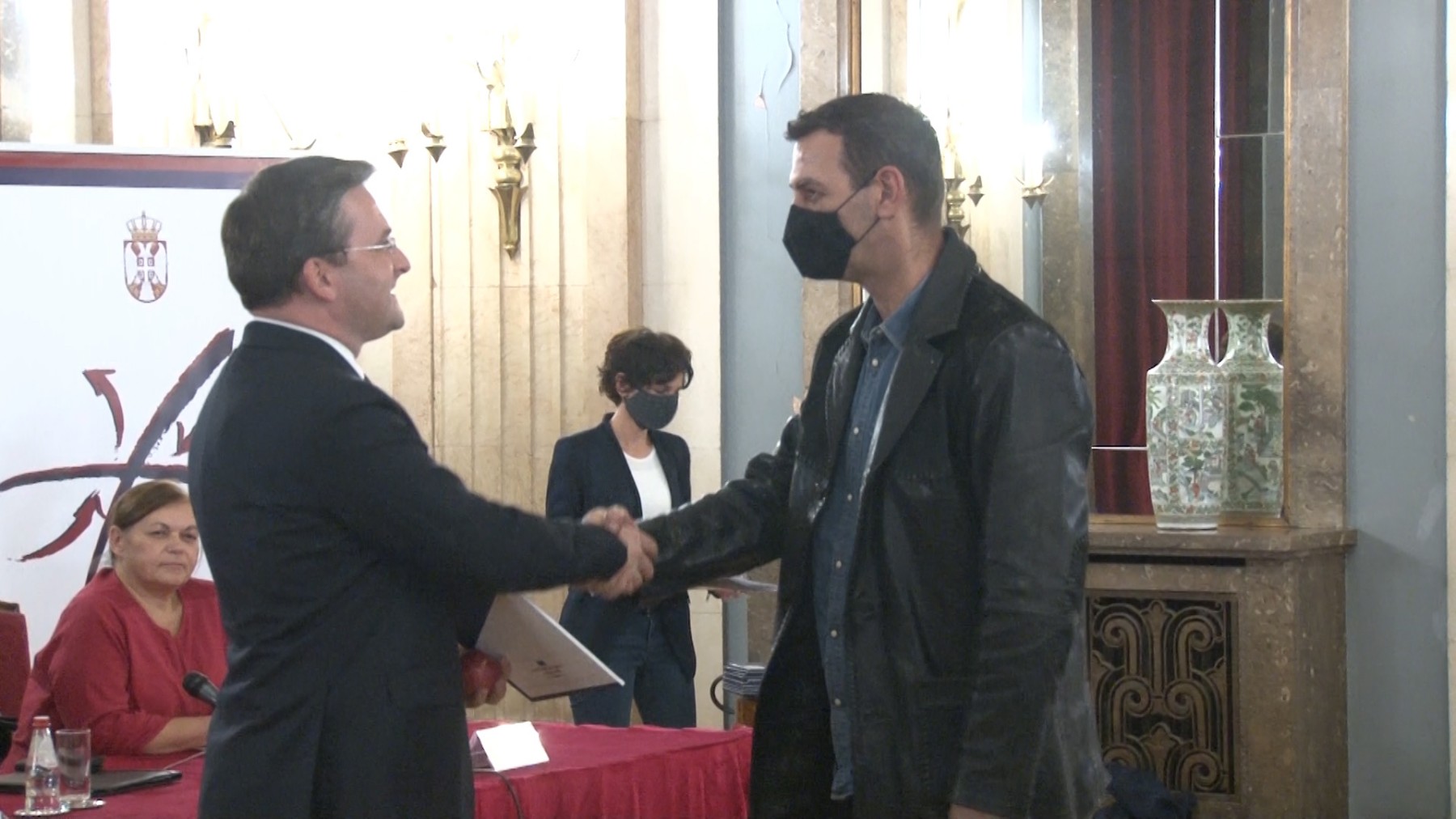
The head of Serbian diplomacy stated that they found themselves in Serbia and started here from scratch.
Minister Selaković said that the donors who helped to form the fund itself and make it work, and the Commissariat for Refugees and Displaced Persons and Migration, with the help of the Council of Europe Bank, UNHCR as a partner, the OSCE, allowed many of those who were displaced to get a roof over their heads.
"At one point, there were about 650,000 refugees in Serbia, and according to the data provided by the Republic Commissioner for Refugees and Migration, nearly 100,000 families of our compatriots have received a roof over their heads through the Commissariat, the state of Serbia and the Serbian Government", said Minister Selaković and reminded that earlier today in Ub, contracts on apartments for 21 families were solemnly handed over.
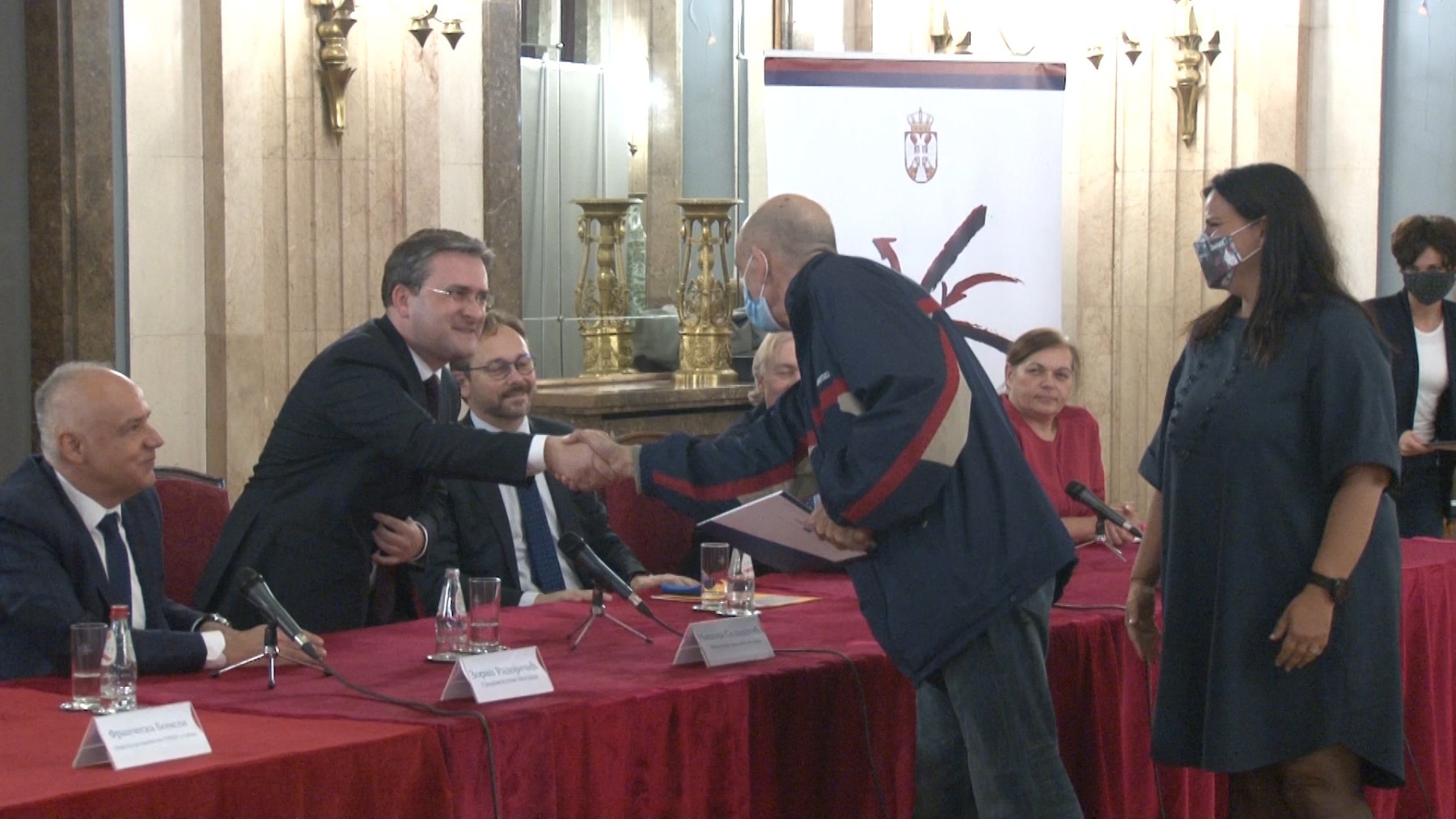
The head of Serbian diplomacy stated that President Aleksandar Vučić, the Government of Serbia, headed by Prime Minister Ana Brnabić, and he personally, as the Minister of Foreign Affairs, are making maximum efforts to resolve this issue in Serbia in the best possible way.
"Tonight, there are 14 families here which enriched the city of Belgrade. The best part of our people are our people who came from Krajina, either from the territory of today's Croatia or B&H, hardworking, honest, good people. I am happy that tonight we have the opportunity and the possibility to provide 14 such families with permanent housing here in Belgrade", said the head of Serbian diplomacy.
Minister Selaković thanked the donors for their selfless help and efforts, the UNHCR and the OSCE, as well as the City of Belgrade for their kindness.
"Until only a few years ago, the City of Belgrade did not show interest in this activity, that interest came a little more than seven years ago and since then the City of Belgrade has been working in partnership with the Commissariat and donors on the realization of this project", said the head of Serbian diplomacy.
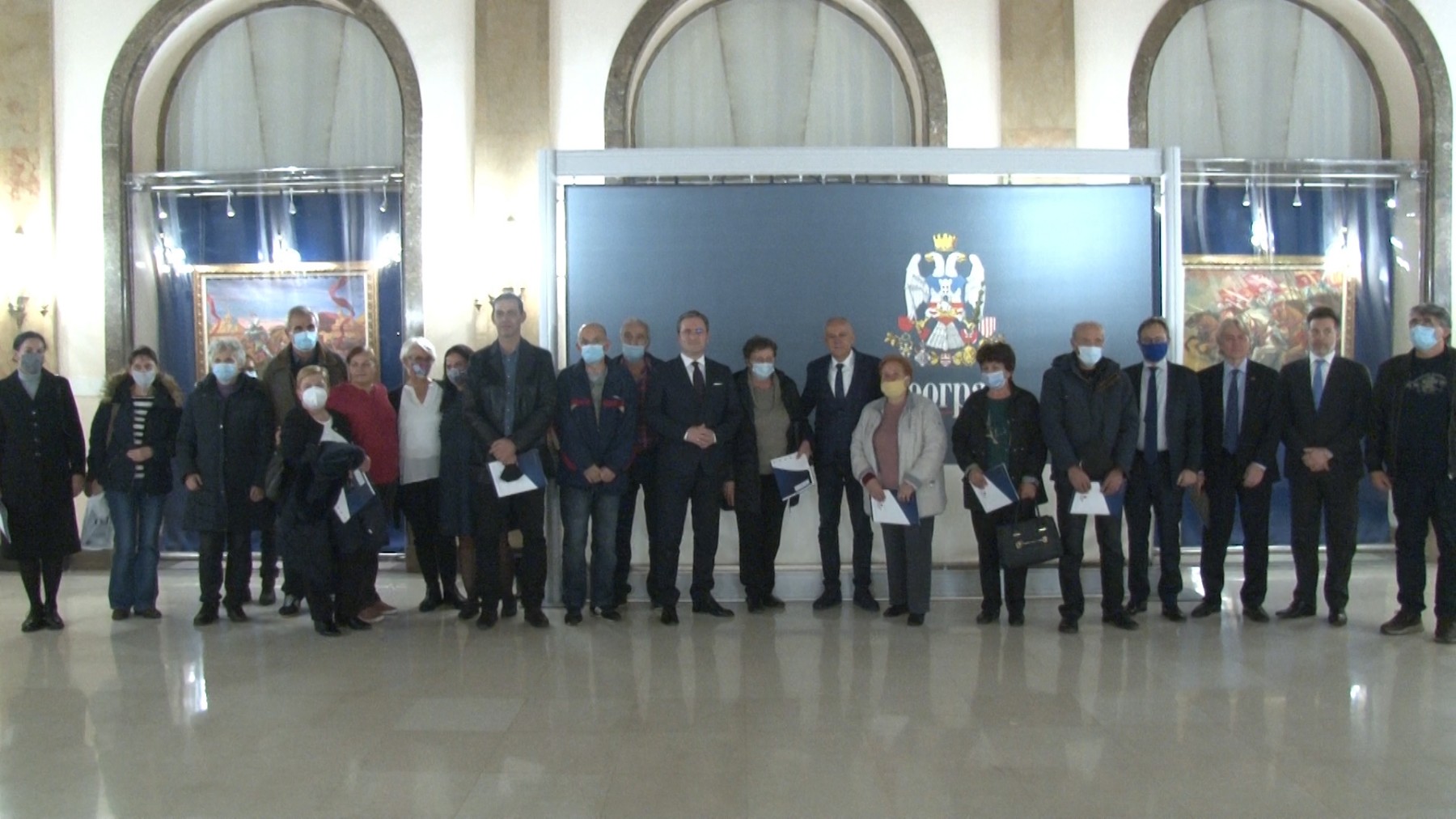
Minister Selaković wished the families who received apartments to record and count only beautiful and good hours and moments in their new homes, and to leave behind what is difficult in their lives.
He wished the older ones to welcome their children and grandchildren and live to a peaceful old age in health in those apartments, and the younger ones to build and raise their families and their children in those apartments and to rejoice in each new great success.
"Thank you for your patience for waiting until this moment and I wish you that in the future everything in your homes will go much easier and much better than it has been so far. Long live Serbia", said Minister Selaković. |
|
|
| Contracts for 21 apartments in Ub were distributed to refugee families from B&H and Croatia |
|
25 October 2021 The Minister of Foreign Affairs, Nikola Selaković, attended the ceremonial awarding of contracts in Ub on the purchase of 21 apartments to refugee families from Bosnia and Herzegovina and the Republic of Croatia within the realization of the Regional Housing Project.
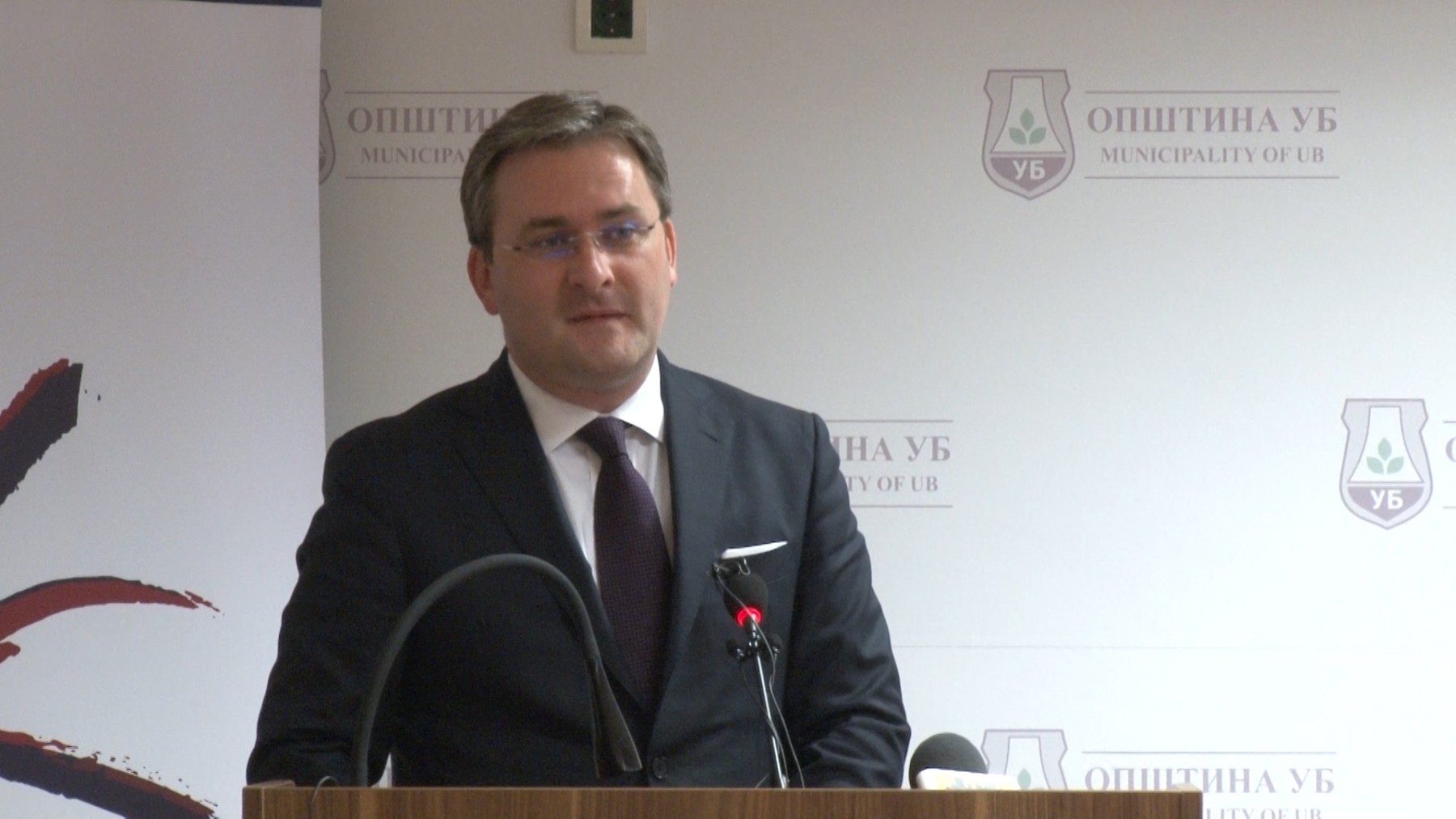
Selaković expressed satisfaction that 21 families are solving their housing issue and that later today 14 families in Belgrade will also get a contract on the purchase of an apartment, emphasizing that we are slowly approaching the estimated 7,500 apartments and houses, necessary to provide housing for our compatriots who left their homes in the '90s.
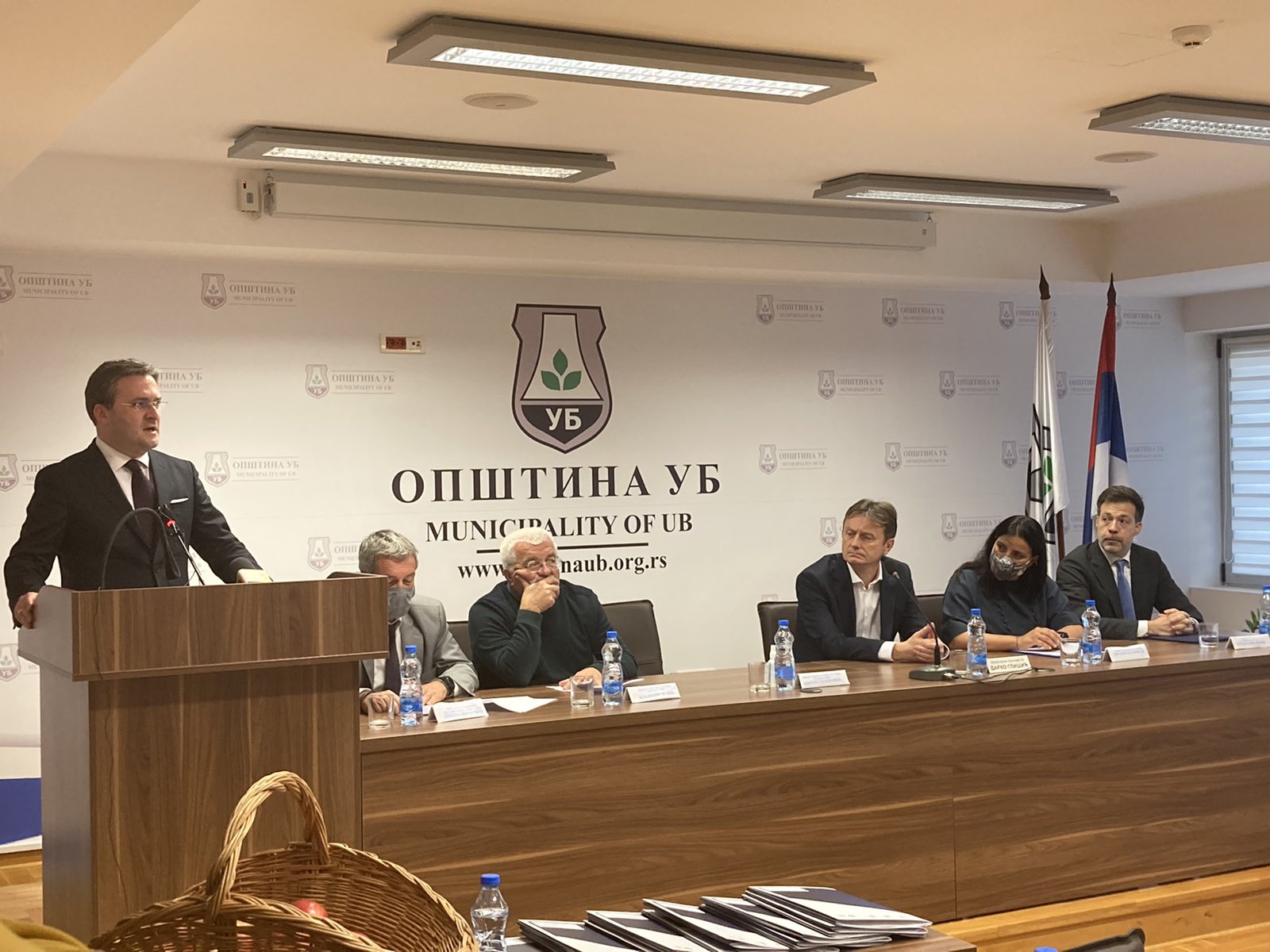
"From today, each of you will have your own home, which is not magnificent and luxurious, but it is yours", said the minister, adding that Ub is one of the most beautiful municipalities and the municipality that is developing the fastest.
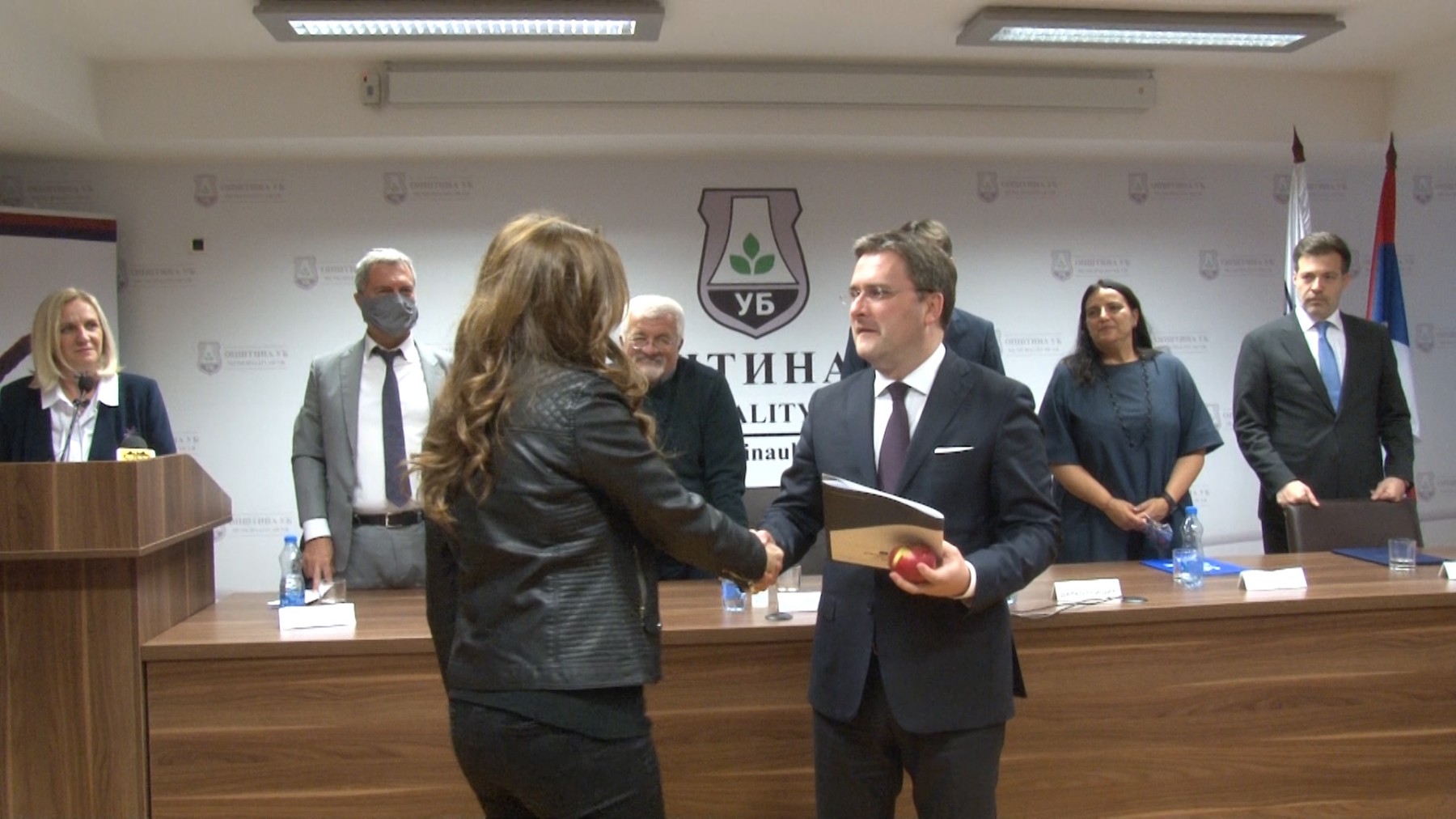
He added that everyone from the state leadership follows the policy of the Government and President Vučić, with the goal of making Serbia better, more organized and more developed.
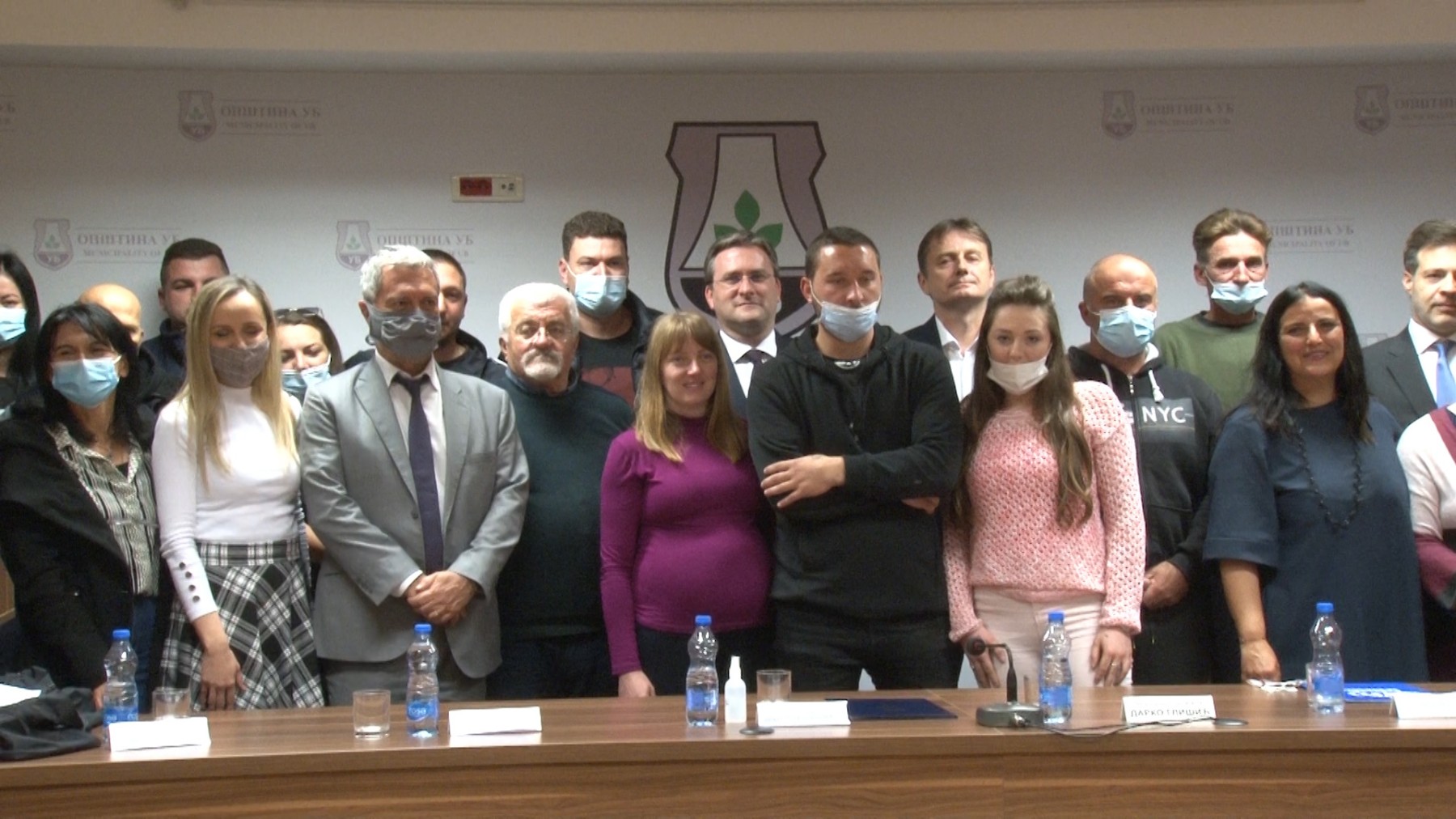
Selaković thanked all donors individually, the representative of the EU delegation, UNHCR, the Development Bank of the Council of Europe, the Commissariat for Refugees and Migration, with whom exceptional cooperation was achieved.
"I want a new chapter of life to start in your apartments from today, so that you can record only beautiful moments in them", the minister concluded. |
|
|
| Meeting of the President of Serbia with the Serbian member of the Presidency of Bosnia and Herzegovina |
|
23 October 2021
The President of the Republic of Serbia, Aleksandar Vučić, met with the Serbian member of the Presidency of Bosnia and Herzegovina, Milorad Dodik tonight, with whom he discussed the political development of the situation in B&H, the economic situation, but also the energy crisis in the region.
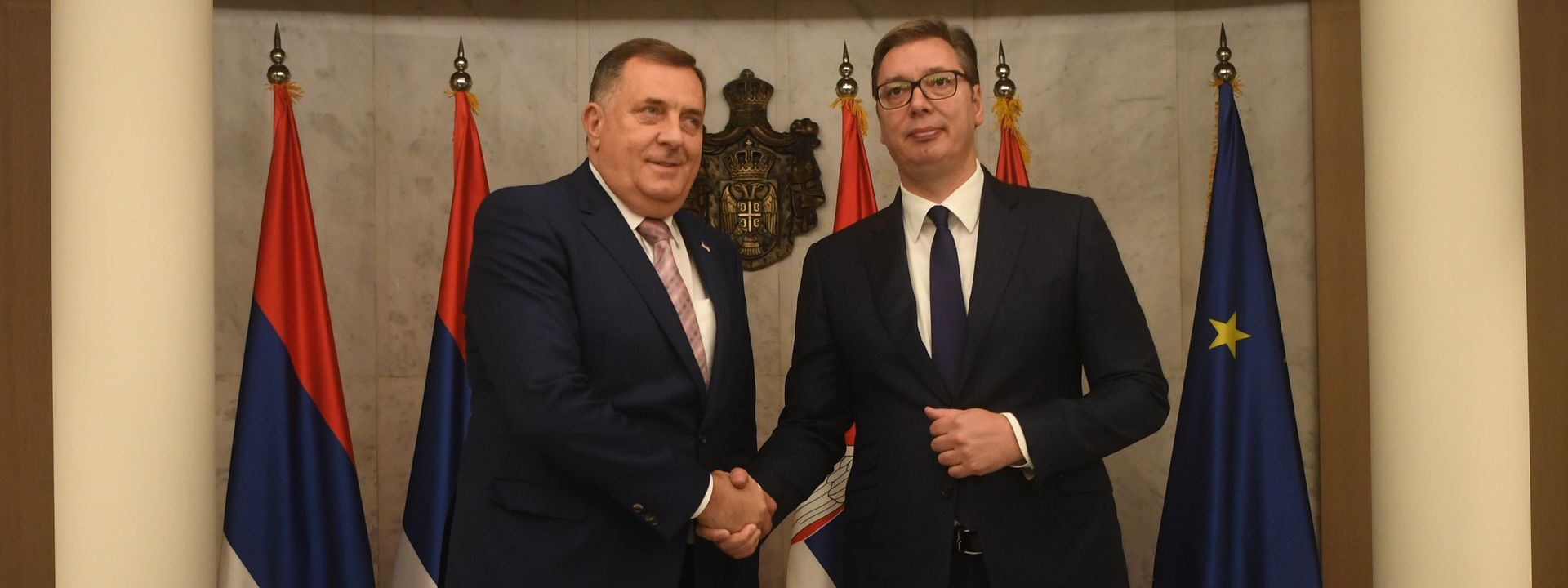
"We had extensive preparations for today's meeting, on all important topics in the relations between Serbia and Bosnia and Herzegovina. We also talked about the Army of the Republic of Srpska and I conveyed important messages from people from Europe and the world. I am grateful that he expressed his willingness to listen to other opinions. It is important to preserve peace and show that the Republic of Srpska is not the source of the problem, but that we are all ready to talk in the region. Our position is clear and firm. I will not say that we warn, but I ask everyone to talk and solve problems through dialogue. Serbia will not join the sanctions. As long as I am the president, there will be no blockades on the Drina", said President Vučić after the meeting and added that the Serbian member of the Presidency of B&H unequivocally said that the Republic of Srpska does not want to create problems on purpose, but that their moves were a reaction to taking the right to the use of the forest away from the RS and handing it over to Sarajevo.
President Vučić pointed out that the conversation has no alternative and that it is necessary to talk to Bosniaks, but also that we should all abandon our dreams of victory over the other.
"We talked about the development of infrastructure and the merging of Serbia and the Republic of Srpska and Serbia and Bosnia and Herzegovina. In accordance with that, we expect the signing of a commercial contract on the construction of the highway from Sremska Raca to Bijeljina by the end of the year. That is a great thing, both for the Republic of Srpska and for Bosnia and Herzegovina. It is also important to make the road from Visegrad to Sarajevo as soon as possible. We are connecting Pazar and Tutin with Belgrade and Sarajevo. The unification of the Bosniak and Serb peoples is important for the development of economic relations. When we build the Ruma-Sabac highway and the Sabac-Loznica highway, which we will extend to Mali Zvornik, we will further increase the strength and continuity of communication with B&H and the Republic of Srpska", said President Vučić, adding that he had talked with the Serbian member of the B&H Presidency about the economic situation, and especially about the shortages of electricity.
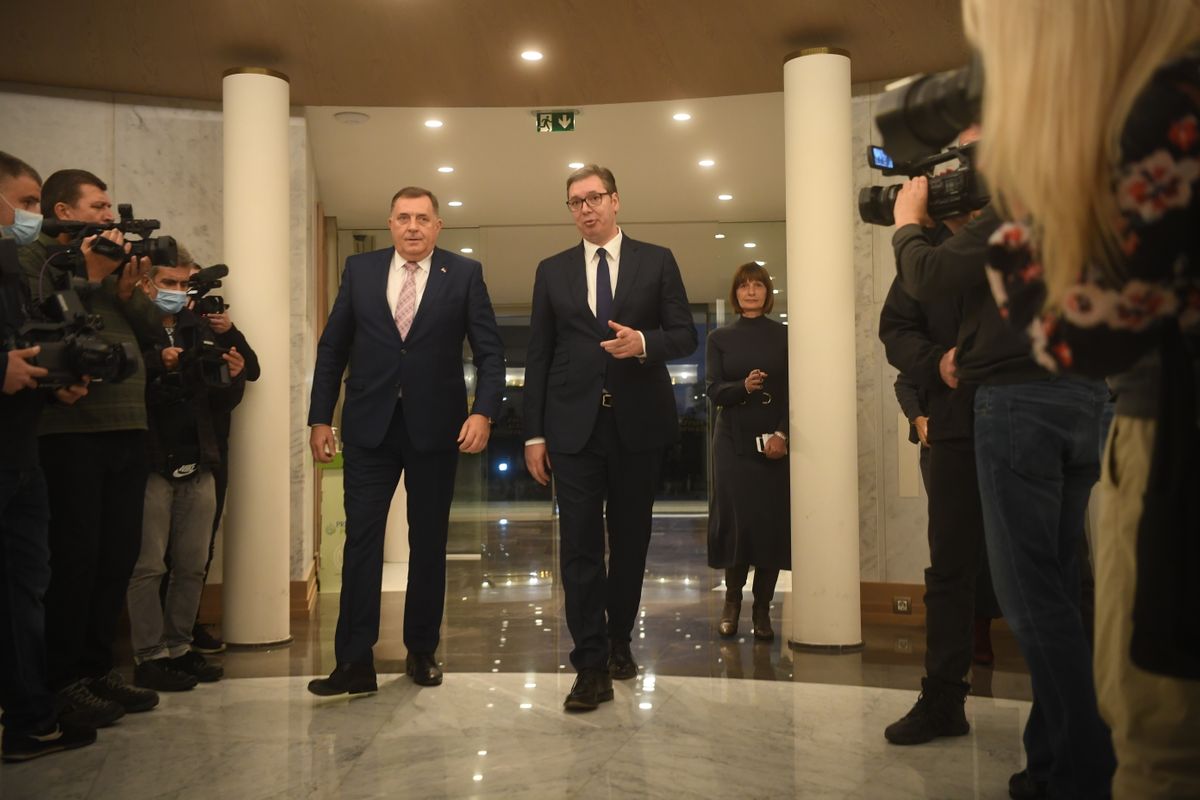
"The crisis threatens a large number of countries in the region. We also talked about preparing a joint platform for talks with all partners about the construction of a branch of the gas pipeline from the territory of Serbia to Banja Luka", emphasized President Vučić. He also said that funds for the construction of the airport in Trebinje have been provided and that the planning and project documentation for the construction of this airport will be ready in March next year.
Serbian member of the Presidency of Bosnia and Herzegovina, Milorad Dodik, pointed out that the situation in B&H is complex and that it was caused by a combination of various events in the past.
"I informed President Vučić about the situation in B&H, as well as about the culmination of unfavorable situations for the Serbian people in the Republic of Srpska. The Republic of Srpska is being disempowered, the situation is very confusing, in which no one wants to sit down and negotiate, and conflicts are not necessary. I am not ready to sacrifice peace for the Republic of Srpska, but I am ready to sacrifice everything else for the Republic of Srpska. Peace has no price and no alternative, and I am grateful to President Vučić for taking the time to listen to me", Milorad Dodik said tonight, adding that the Republic of Srpska is being disempowered by the persistent force of the international factor.
"We cannot give in, in the sense of allowing them to take away our land and forests", said the Serbian member of the Presidency of B&H, commenting on recent decisions of the Constitutional Court of Bosnia and Herzegovina, and assessed that today, the Republic of Srpska, as a signatory to the Dayton Agreement, is being "disempowered", unlike the Federation of B&H and the Brcko District.
Source: www.predsednik.rs
Photo: Dimitrije Goll |
|
|
| Selaković in UNSC: Dialogue and the implementation of the agreements reached are the only right way to resolve all open issues |
|
15th October 2021
Selaković in UNSC: Dialogue and the implementation of the agreements reached are the only right way to resolve all open issues
Distinguished President of the Security Council,
Esteemed members of the Security Council,
Distinguished Special Representative,
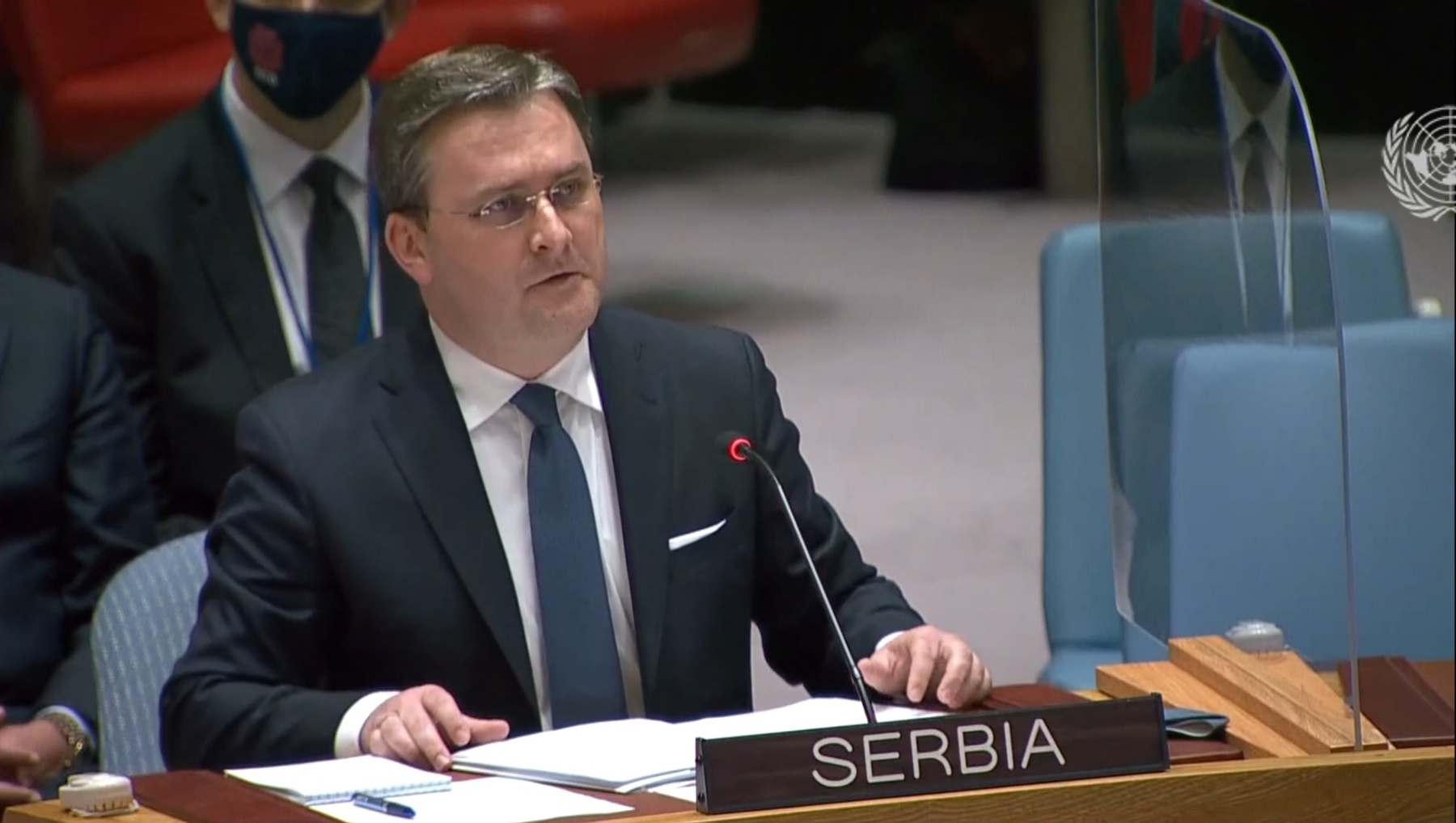
I would like to thank Secretary-General of the United Nations Mr. Guterres and Special Representative of the Secretary-General and Head of UNMIK Mr. Tanin for the report submitted and for their efforts made towards the implementation of the UNMIK mandate. I would also like to thank the members of the Security Council for the continued attention they have devoted to the issue of Kosovo and Metohija. The Republic of Serbia highly values the activities of the Mission of the United Nations in Kosovo and Metohija and supports it in carrying out its work as efficiently as possible, pursuant to the UN Security Council Resolution 1244, and undiminished in scope, aiming to build and preserve lasting peace, stability and security in the Province.
Mr. Tanin,
Please accept the expressions of our gratitude for your engagement and the cooperation we achieved during your term of office.
Mr. President,
Deep regret and concerns are raised by the fact that the security situation in Kosovo and Metohija in the past period has been marked by an increasing number of various ethnically motivated attacks and incidents targeting Serbs, which was also stated in the Report; that the provisional institutions of self-government (PISG) in Pristina continue to take unilateral steps and refuse to implement the agreements reached in the Brussels dialogue; and that institutional discrimination against Serbs, attacks on the sites of the Serbian Orthodox Church and the undermining of the economic sustainability of Serb communities in the Province have continued.
We are witnessing that dangerous provocations by Pristina are taking place every day, at an accelerated pace, thus seriously threatening the safety of Serbs in Kosovo and Metohija and directly violating the agreements and arrangements reached within the Brussels dialogue.
The latest violent incursion of the so-called ROSU units into the northern part of Kosovska Mitrovica, on 13 October, is the ninth incursion of its kind. Tear gas, shock bombs and unbridled violence are becoming a matter of everyday life for Serbs in the north of Kosovo and Metohija, and that must be stopped immediately.
In the last attack with firearms and chemicals used by Pristina special forces, 71-year-old Verica Djelic died as a result of chemicals used in the intervention, 10 unarmed civilians were wounded, one of them 36 years old Srećko Sofronijević was critically wounded in the back with of an automatic rifle. A three-month-old baby, who miraculously remained unharmed, was also the target of the shooting.
The false excuse for the latest unilateral action, as EU High Representative for Foreign Affairs and Security Policy Josep Borrell called it, was the fight against organized crime and smuggling. Ladies and gentlemen, Serbia is strongly against organized crime and smuggling, but the members of the UNSC should know that such an important and general global goal, which we all share, was cynically used for an armed attack on unarmed civilians, which began with an automatic rifle raid of pharmacies in which patients of Serbian and other nationalities are supplied with vitally important medicines. Four days before the local elections in Kosovo and Metohija, in order to gain votes in an irresponsible and inhumane way, fully motivated by separatist goals, the current PISG regime used medicines on which people’s lives depend to prove its position on the status contrary to UNSCR 1244.
Only a few days earlier, another provocation on the part of Pristina led to a dangerous crisis, when personnel of the so-called ROSU unit, armed with long firearms and reinforced with armoured vehicles, were deployed to administrative crossings between central Serbia and Kosovo and Metohija - Brnjak and Jarinje – in order to remove Serbian license plates and replace them with temporary ones, thus violently preventing the free movement of citizens.
These events do not fall within the reporting period covered by the latest Report of the UN Secretary General on the work of UNMIK, but it is incumbent upon us to address them on this occasion, in order to have everyone understand how dramatic the situation on the ground has been and how serious the consequences of Pristina's unilateral actions can be.
The incursions of heavily armed Pristina police formations, composed exclusively of Albanians, into the north of Kosovo and Metohija, under various pretexts and motives, with the use of excessive force, are provocations that have an extremely dangerous potential to destabilize the already sensitive security situation on the ground. The goal of the latest incursions of Pristina’s special force personnel into the north of the province was to provoke the Serbs and additionally intimidate them with a demonstration of force, as well as to provoke Belgrade to react hastily in some way.
It is obvious that with such moves Pristina aims to erase the 10 years of dialogue, which is the only way to resolve open issues. These provocations once again demonstrate that the provisional institutions of self-government in Pristina, not only do not intend to implement everything agreed in the Brussels dialogue, but that their goal is to completely deny dialogue as a means of resolving problems. An effective response to Pristina's lack of credibility and their dangerous play with fire, which could have unforeseeable consequences, cannot be provided by calling on "both sides" for constructiveness and restraint, which has long been a manner in public communication of some important factors in the international community. There is only one source of destabilization, it has a name – and that is the provisional institutions of self-government in Pristina - and after the events of 13 October, it is clear that it can and needs to be stopped by urgent and decisive action of the international community. It is now quite obvious that these are no longer sporadic and isolated provocations by Pristina, but that this is an organized campaign of ethnically motivated violence and discrimination against Serbs.
We also express our concern over the latest imposition of tariffs by Pristina on certain products originating from central Serbia, which was made public on 8 October. We remind you that the unilateral decision of Pristina to impose duties on products from central Serbia in November 2018 resulted in a de facto complete trade blockade and a long-term stalemate in the dialogue between Belgrade and Pristina. In contrast to Pristina, which persistently seeks to raise barriers towards central Serbia through unilateral acts, Belgrade is persistently and consistently working to liberalize the flow of people, goods, services and capital, which is the basic goal of our "Open Balkan" initiative. North Macedonia and Albania joined this initiative, but Pristina did not.
Distinguished members of the Security Council,
In the period from March to September this year, which is covered in the latest Report, close to 100 ethnically motivated attacks were carried out against Serbs, their private property, religious and cultural heritage sites. The increase in the frequency of attacks was accompanied by the strengthening of the intensity of ethnically motivated violence, which more and more often targets children, the elderly, women, the few returnees present there, as well as churches and other property of the Serbian Orthodox Church.
This systematically intensifies the ubiquitous sense of insecurity of the remaining Serbs, but also deters potential returnees, who are in fact being told that local Albanian communities can attack them with impunity and prevent them from returning to live in their own homes.
The most striking example of the position of Serbs in Kosovo and Metohija is the case of the displaced person Dragica Gašić, who moved into her apartment in the municipality of Djakovica again in early June. In that town – to which local Albanians proudly refer as a place forbidden to Serbs - Ms. Gašić, on her return, first faced physical and verbal attacks by citizens of Albanian nationality living there. Instead of being provided protection, that seriously ill woman then became a victim of institutional persecution as well, that the local self-government bodies and the police unleashed against her. Since this is a person who is the first and only Serb returnee to Đakovica after more than twenty years, it was to be expected that, at that moment, at least civil society organizations would attempt to protect her rights. However, NGOs from Djakovica soon joined the activities aimed at the expulsion Ms. Gašić, including those receiving funding from international donors for projects related to strengthening democracy and the rule of law.
I must also mention the latest attack on the house of the only remaining Serbian woman in the center of Pec, retired teacher Rumena Ljubić, whose windows were stoned twice in just 24 hours on 13 October.
Dragica's and Rumena’s fate is a frightening reflection of the real situation of human rights that almost every one of over 200,000 displaced Serbs and non-Albanians would face in Kosovo and Metohija - provided that they gather the courage to return to their homes in the Province after more than twenty years. I would like to remind you again that since 1999, only around 1.9% of internally displaced Serbs and other non-Albanians have achieved a sustainable return to Kosovo and Metohija.
Therefore, I believe that the aforementioned will encourage the members of the Security Council and the international presence on the ground to devote priority attention in the future to the issue of the return of displaced persons, which is an important part of the UNMIK mandate under UN Security Council Resolution 1244.
I therefore thank the Secretary-General in particular for keeping this extremely important issue in focus and for calling again, in the conclusions of his Report, for the creation of conditions for the sustainable return of internally displaced persons and the sustainable reintegration of returnees.
Distinguished members of the Security Council,
Serbian medieval monuments in Kosovo and Metohija, including monuments that, due to their exceptional value but also constantly being subject to threats are inscribed on the UNESCO List of World Heritage in Danger, are still among the most endangered cultural heritage in Europe.
I wish to recall that there are over 1,300 Serbian churches and monasteries in Kosovo and Metohija. Attacks on Serbian cultural and religious heritage are at the same time attacks on the identity of Serbs in the Province and directly affect their sense of safety.
A striking example of disrespect for Serbian cultural and religious monuments in the Province is the case of the Visoki Decani monastery. The monastery, which has been the target of attacks and shelling several times since 2000, is still secured by KFOR forces due to being under a threat. It is faced with a series of hostile actions, and the perpetrators are not deterred by the fact that this is a World Heritage Site. Despite frequent declaratory statements, even the decision of the so-called "constitutional court" of the PISG in Pristina five years ago confirming ownership of Visoki Decani Monastery over 24 hectares, is not respected. We welcome the assessment made by the UN Secretary General in his Report.
Dear Mr. President,
The Republic of Serbia remains committed to finding a compromise political solution, as prescribed under Resolution 1244, which will ensure lasting peace and stability. We firmly believe that dialogue and the implementation of the agreements reached are the only right way to resolve all open issues.
As a state committed to the respect for international law and a member of the United Nations, Serbia opposes any attempt at establishing an artificial balance between the parties in the dialogue, as well as the relativization of responsibility for unilateral acts.
We note with concern that not even eight years after reaching the Brussels Agreement, the establishment of the Community of Serb Municipalities has not been initiated, although Belgrade has fulfilled all its obligations under that agreement.
There are also numerous and repeated examples of Pristina violating or obstructing agreements reached in dialogue, in the areas of energy, justice, freedom of movement and visits by officials.
One such example is the verdict sentencing Ivan Todosijevic to two years in prison, which is also pointed out in the Secretary General's Report. The Brussels Agreement was directly breached, which was also stated by the representatives of the European Union. With its conduct Pristina caused immeasurable damage to the reconciliation process in Kosovo and Metohija.
Despite the interpretation from the European Commission that this is a violation of the Brussels Agreement, because Todosijevic had to be sentenced by a panel consisting of the majority of judges of Serbian ethnicity, Pristina still does not take any action in this regard.
Pristina also continued with the practice of banning Serbian officials from entering the territory of the Autonomous Province of Kosovo and Metohija.
We believe that it is important that the international community, and especially the European Union, as the guarantor of the agreement, firmly insists that the provisional institutions of self-government in Pristina start implementing all the agreements reached.
Distinguished members of the Security Council,
As before, the Republic of Serbia remains fully committed to resolving the issue of missing persons, as also demonstrated through full cooperation with relevant international mechanisms as well as participation in the work of the Working Group on Missing Persons. We expect that the representatives of the provisional institutions of self-government in Pristina will fulfill their obligations.
Bearing in mind everything I delivered here today in my address, we hold the position that the international presence in Kosovo and Metohija, pursuant to UN Security Council Resolution 1244, is still necessary. In addition to UNMIK, the presence of KFOR as the main guarantor of security and EULEX, due to its engagement in the field of the rule of law, is also important. I would like to emphasize once again that Serbia fully supports respect for international law, comprehensive implementation of UN Security Council Resolution 1244 and activities of UNMIK in an undiminished scope and with adequate financial resources, so that the Mission fulfills the mandate entrusted to it under the Resolution.
Thank you. |
|
|
| President Vučić visits the Republic of Slovenia |
|
6 October 2021
The President of the Republic of Serbia, Aleksandar Vučić, participated in the Summit of the Leaders of the European Union and the Western Balkans, at which a Declaration was adopted in which EU leaders give unequivocal support to the European perspective of the Western Balkans and reaffirm their commitment to the enlargement process based on "credible partner reforms", emphasizing the importance of "strengthening the integration and the capacity of absorbing new members" by the EU itself.
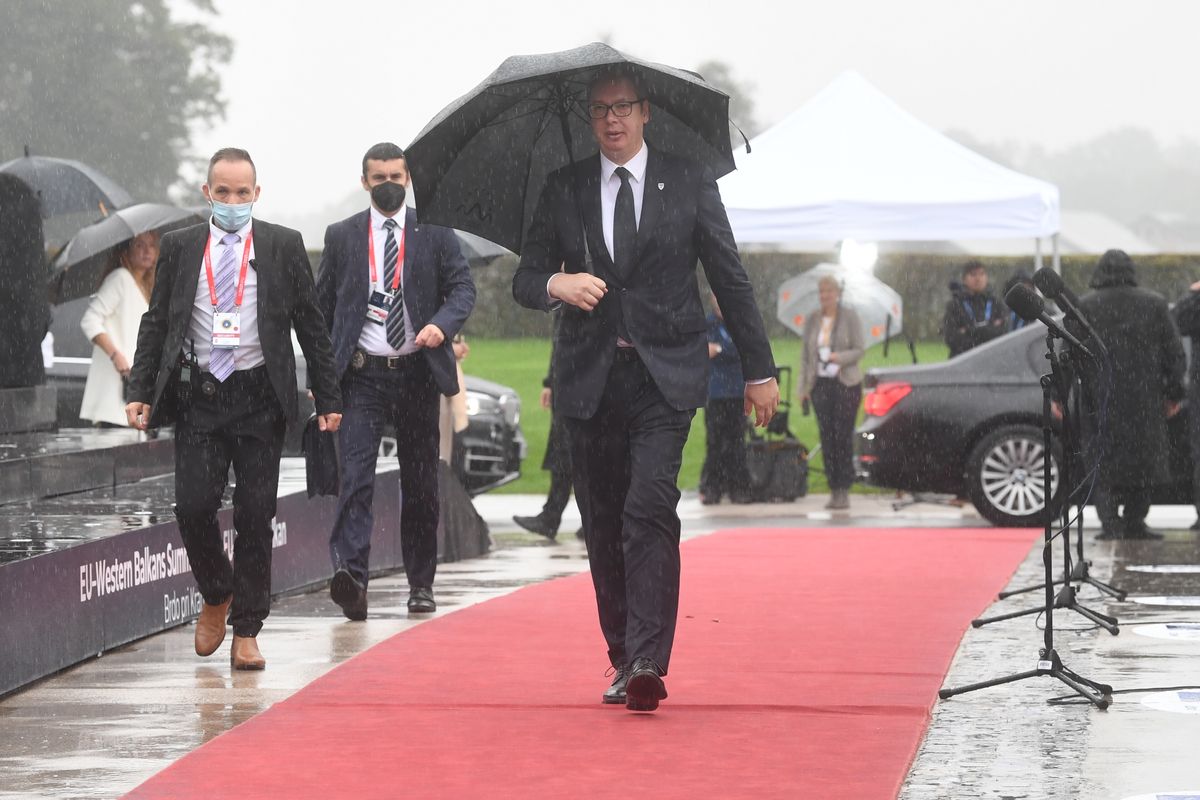
After the EU-Western Balkans Summit, President Vučić stated that there is a perspective of EU enlargement, but that not all member states have the "same appetite" for enlargement.
"On behalf of the Republic of Serbia, I am satisfied with the fact that the presidents and prime ministers of the EU countries talked to us for four hours about the future of the Western Balkans. On behalf of Serbia, I thanked for the help and support, investments and money that EU taxpayers invest in our country. We talked about the fact that there is a prospect of enlargement and it is clear that there are strategic interests of the EU in that European area", said President Vučić and added that there was a positive atmosphere at the Summit and that the host, the Prime Minister of the Republic of Slovenia, Janez Janša, has always fought for a clearer European perspective of the countries of the Western Balkans.
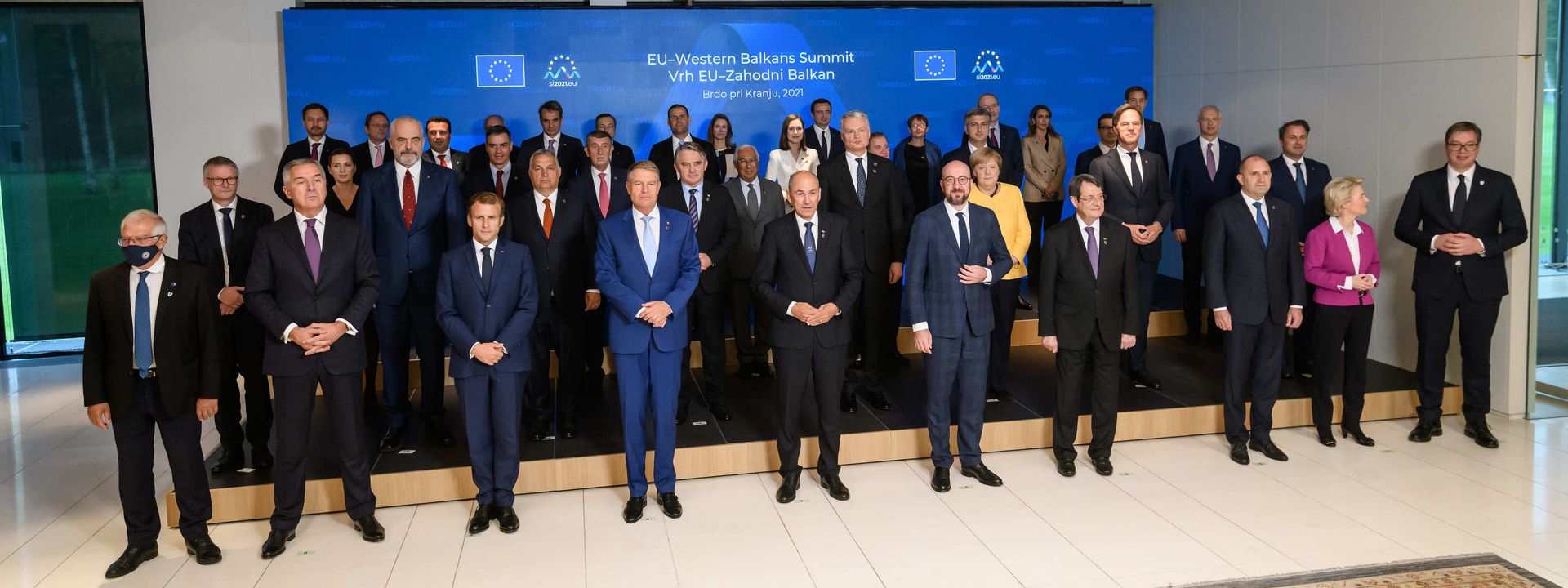
"It seems to me that we have presented ourselves in a good way with a responsible and serious policy, and I believe that in the coming period, we can improve our position in the EU", said President Vučić, adding that he had many bilateral talks: with Greek Prime Minister Kyriakos Mitsotakis, who said Athens would continue to support Serbia's territorial integrity, with the French president, the Hungarian prime minister, the Spanish prime minister, the Slovak prime minister, the Romanian president, the president of the European Council, Charles Michel, and with many other European leaders.
President Vučić stated that he also talked with the prime minister of the Republic of Croatia about the relations between our two countries, as well as with the prime ministers of the Republic of Albania and the Republic of Northern Macedonia, Edi Rama and Zoran Zaev.
President Vučić paid a two-day visit to the Republic of Slovenia, where he attended the Summit of Heads of State and Government of the European People's Party on the first day and assessed that, after the loss of the German Christian Democratic Union in the elections, the strength of the European People's Party was concentrated in Central and Eastern Europe.
Source: www.predsednik.rs
Photo: Dimitrije Goll |
|
|
| Selaković in New York with 28 foreign ministers on economic successes of Serbia and K&M situation |
|
25 September 2021
The Minister of Foreign Affairs of Serbia, Nikola Selaković, has stated that in New York he introduced foreign ministers of 28 countries to economic success of Serbia but also to the situation in Kosovo and Metohija, which he also discussed with the Russian Minister of Foreign Affairs, Sergey Lavrov, who told him that we could count on the support of the Russian Federation, with regards to Serbian interests in K&M.
Summarizing results of his visit to New York within the session of the UN General Assembly, Minister Selaković says that one of the last meetings was with Minister Lavrov, which was their third meeting in the previous nine months.
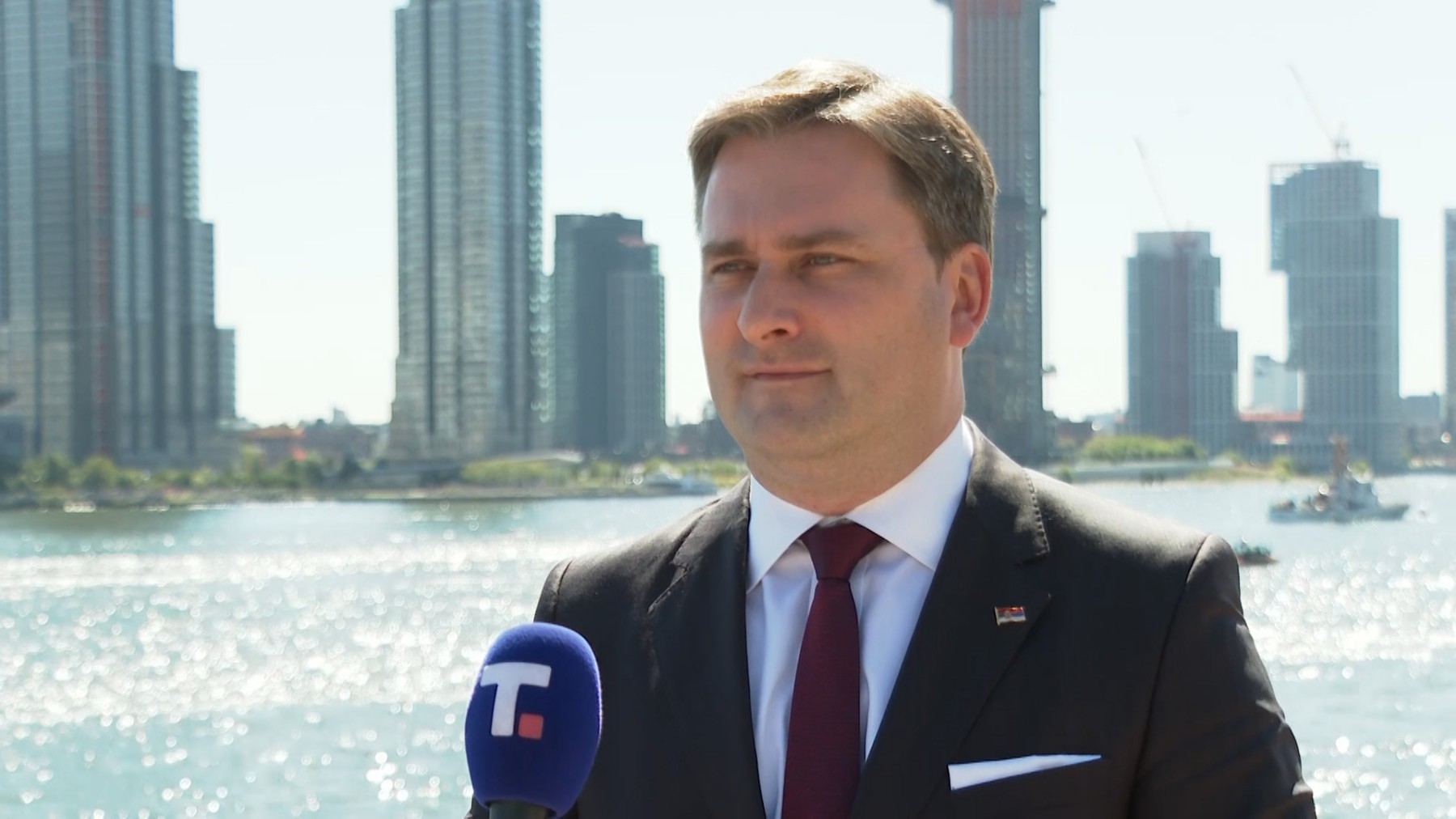
The Serbian Foreign Minister says that he surely used this opportunity, too, to introduce Minister Lavrov to the latest events in northern Kosovo and Metohija, the situation of the dialog between Belgrade and Priština and very clear and unambiguous attitude of President Aleksandar Vučić regarding the continuation of the dialog and subsequent events in K&M.
“We discussed the principled support of the Russian Federation, which is constantly present not just in Moscow, Belgrade, in the field, but also here in the East River, by the delegation of the Russian Federation as the permanent member of the UN Security Council. Of course, we will continue to maintain this type of dialog. What Minister Lavrov said was that we could count on the support of the Russian Federation in future with regards to our interests in K&M”, highlighted Minister Selaković.
He said that he had had the opportunity in New York to hold 33 meetings, of which 28 with ministers of foreign affairs, whom he had introduced also to topicalities related to the latest events in Kosovo and Metohija, but also to our principled position regarding the observance of the international public law, territorial integrity and sovereignty.
Minister Selaković said that his colleagues at the meetings had praised the substantial and fantastic success of Serbia in the consolidation of the economic sphere and transformation of what had been on the edge of collapse and economic disaster seven years before to the fastest growing economy in Europe, which Serbia was in the past two years.
He said that most of his interlocutors had supported our reforms and expressed great respect toward what President Aleksandar Vučić and Serbia had done in the previous period.
Many of them, says the Serbian Foreign Minister, showed great interest in the manner in which Serbia organized the figth against Covid 19.
“It was a great pleasure and pride to represent the Republic of Serbia in all these meetings. Many of my colleagues confirmed their arrival to Belgrade to the Conference on 11th and 12th October, which is dedicated to the 60th anniversary of the foundation of the Non-Allied Movement”, said Minister Selaković.
He emphasized that it was not just the evidence of how much they had cared to come to Belgrade to the conference, but also to see and witness the Serbia which after several decades of attempts to fight different challenges rose to its feed, was economically consolidated and turned towards its traditional friends.
“That is a great deal and our country will surely during October be one of the spots on Earth of greatest importance for multilateralism, for cooperation among the countries which share the same values, the values entered into the UN Charter and which are based on the promotion and fight for peace, equality, observance of the international public law and rights of every country to pursue its path to happiness and better and more ordered society in compliance with the wishes of its population”, said Minister Selaković.
He said that the Minister of Foreign Affairs of Azerbaijan, Jeyhun Bayramov, would come to Belgrade to the conference on the occasion of the Non-Allied Movement adding that we had strategic cooperation with Azerbaijan and frequent contacts.
“We agreed to realize as soon as possible after the Belgrade conference his bilateral visit to Serbia”, added Minister Selaković.
He said that it had been agreed to intensify the cooperation and finalize the agreements which should be signed and after that realized when the meeting of Serbian President Aleksandar Vučić and Azerbaijan President Ilham Aliyev took place.
Minister Selaković says that the Ministry of Foreign Affairs had recently received its sector for economic diplomacy and there were great expectations from it and one of the tasks was to deepen the cooperation with Azerbaijan. |
|
|
| Telephone conversation of President Vučić and General Secretary of NATO |
|
26 September 2021
The President of the Republic of Serbia, Aleksandar Vučić, has discussed today by phone with the General Secretary of NATO, Jens Stoltenberg about, as the General Secretary said, worrisome situation in northern Kosovo and Metohija.
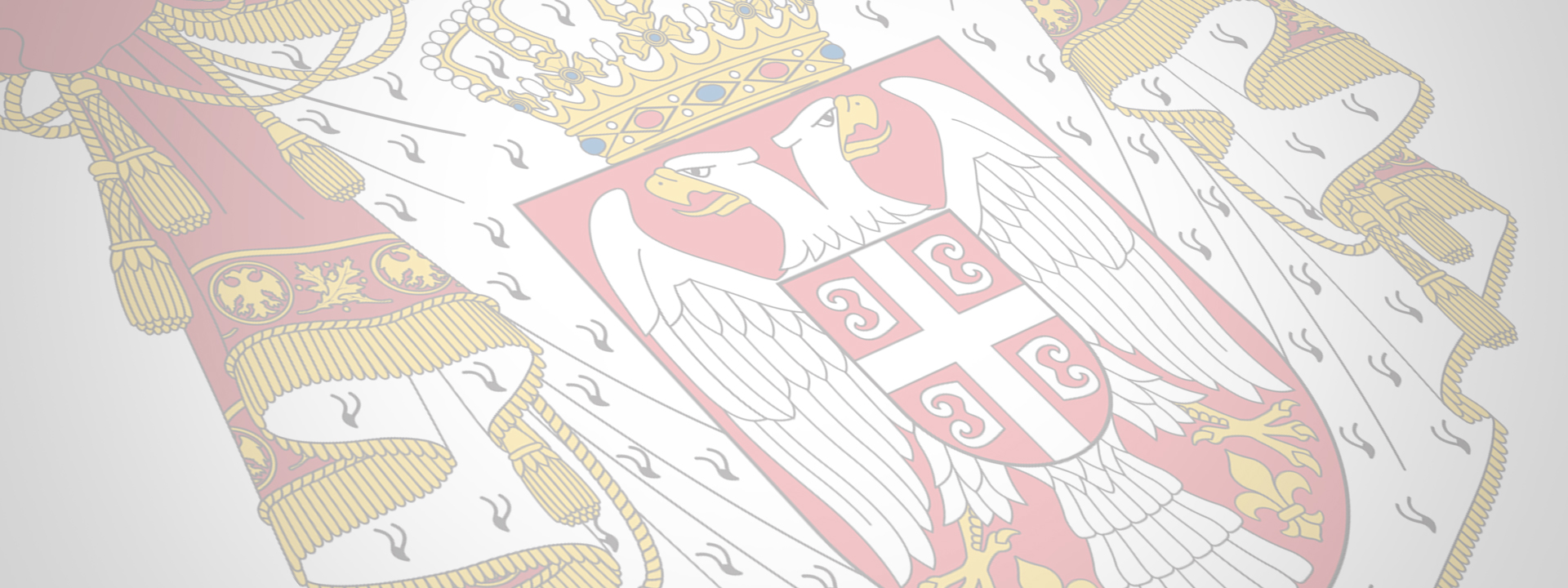
President Vučić said that Serbia had not violated either Brussels Agreement or Resolution 1244 by anything, by any single move or in any manner jeopardized peace preservation.
“The complete occupation by armored vehicles of northern Kosovo and Metohija has lasted for seven days and it is conducted by Priština and everyone in the international community “are thunderously silent”, said Serbian President. “However, everyone is worried all of a sudden when they spot Serbian helicopters and airplanes at the territory of central Serbia, because apparently they should not exist, or should not take off until they receive the approval from Kurti or someone from the international community”, says President Vučić.
Serbia observes all international agreements it signed, Serbia will always conduct responsibly and seriously, but Serbia is still asking when the formation of SMC will start and when Kurti’s armored units will be withdrawn from northern Kosovo and Metohija.
Finally, with the gratitude to General Secretary Stoltenberg for the fair relation and wish to listen to the Serbian side, President Vučić asked about the norm and international regulation violated by Serbia? Today, yesterday or any time?
The two interlocutors agreed to stay in constant touch due to necessity of the preservation of peace and stability in the entire region.
Source/Photo: www.predsednik.rs |
|
|
| Pristina seriously jeopardised regional stabilit |
|
25 September 2021
Prime Minister Ana Brnabic warned today that Pristina has seriously jeopardised local and regional stability after sending heavily armed special units to the north of Kosovo who are exerting ` against the peaceful Serbian population.
Brnabic spoke at the general debate of world leaders, as part of the 76th session of the UN General Assembly in New York.
We bring the Prime Minister's speech in its entirety:
Mr. President,
Mr. Secretary General,
Excellencies,
Ladies and gentlemen,
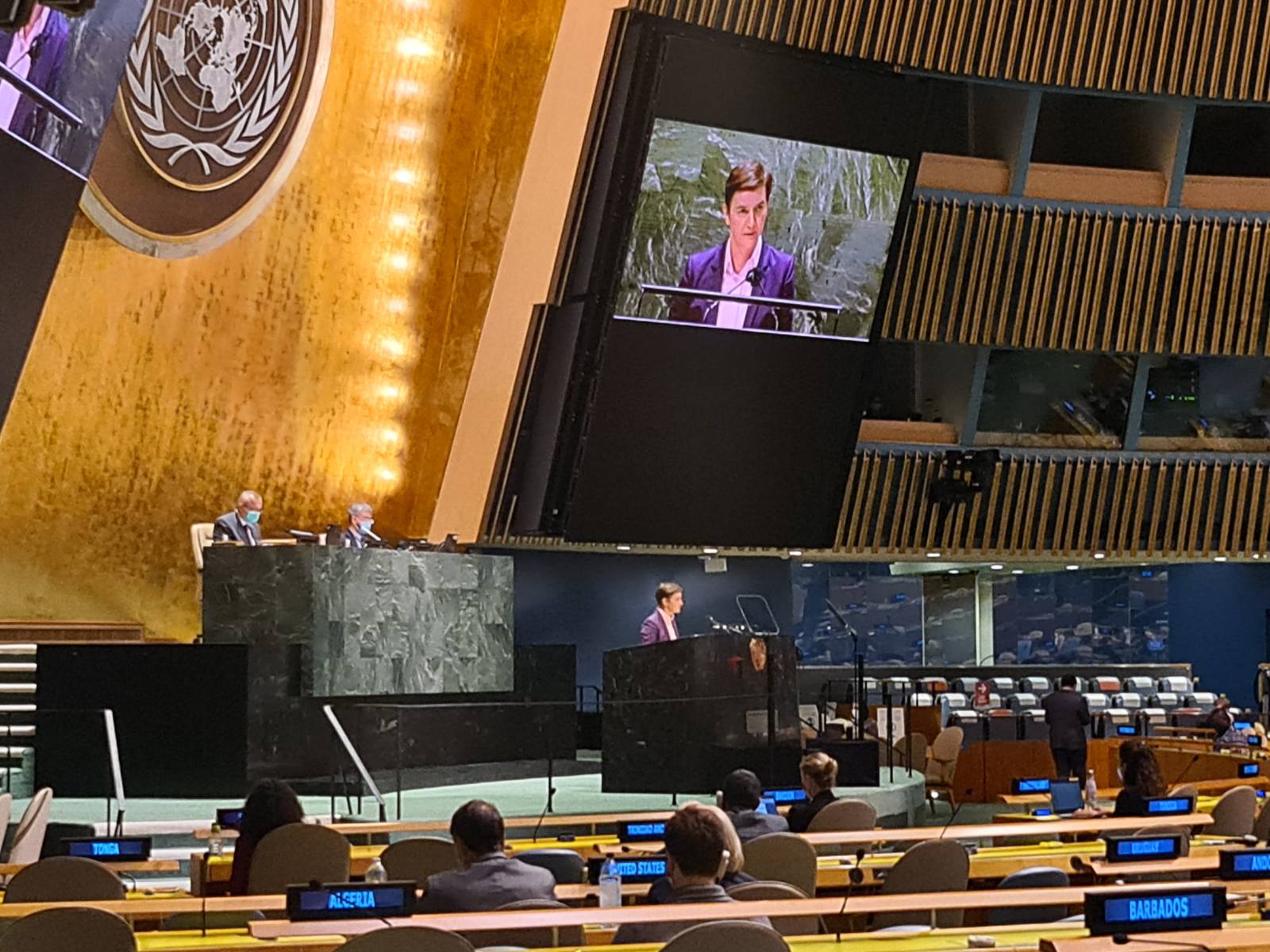
I have the great honor to address you today on behalf of the citizens of the Republic of Serbia.
Esteemed Excellencies Mr. Abdulla Shahid, Mr. Volkan Bozkir and Mr. António Guterres, I would like thank you for the active engagement, dedication, and leadership you have shown during these difficult times for the United Nations and all of humanity.
Serbia shares your conviction and we remain fully committed to supporting your efforts.
This year, we come together at a decisive moment in our history.
Covid-19 has shaken our foundations to the core.
At the same time, we are increasingly witnessing and experiencing effects of climate change.
And, finally, we are seeing significant shifts in global partnerships and alliances, trade wars between traditional partners and allies, protectionism instead of openness and free market, and overall uncertainty at an unprecedented scale.
Some of the pressing and extremely emotional issues that we have locally, in the Balkans, are still unresolved and while we are trying – and Serbia is especially dedicated to this – to change the future by working together and creating alliances, through initiatives such as the Berlin process or Open Balkan, others are trying to disrupt these processes, and instead of focusing on the future, they want to recreate the past – whatever the cost of that may be.
But, let me start with COVID:
COVID-19 pandemic has exposed critical weaknesses in the architecture of global governance. It has threatened to erase the progress many nations have achieved in recent years.
It has placed nations at a junction between isolation and collaboration, between panic and hope, between chaos and order.
The pandemic questioned some of the basic tenets of the open and cooperative international order.
Global exchanges, international communication, cross-border trade have all seen a vast decrease.
Curfews, restrictions on freedom and lockdowns of entire societies have created uncertainty in many segments of the individual lives of our citizens or – for that matter – our own individual perception of what freedom in today’s world even means.
For Serbia, this pandemic threatened to undermine everything we have been doing for the past 7 years, to crush all of the results and accomplishments of difficult reforms we initiated in 2014, and to propel us back to the times of high unemployment, rising public debt, uncontrollable deficit, and overall desperation.
Much as in any other country, COVID-19 has tested our nations’ resiliency and, this time, unlike during the global financial crisis – which was of much more limited scope and incomparable in consequences to COVID-19 pandemic – Serbia stood strong.
The reforms we undertook in the pre-COVID times made us more resilient than ever.
The fiscal consolidation, the budget surplus we had, efficient and predictable investment environment, became a lifeline that saved us from a recession during the pandemic and one that ensured we could support our citizens and our economy during these, most difficult of times.
Despite the effects of the crisis, Serbia has managed to preserve financial and economic stability. In 2020, we recorded a decline in GDP of only 0.9% – one of the best results in Europe. Our public debt remained below 60% of our GDP, average salary continued to grow by almost 10%, while despite the pandemic the number of people employed increased by over 3%.
The recovery in this year has been stronger than expected – our GDP will grow approximately 7%, and perhaps even stronger.
Prior to the pandemic, we have opened our borders to investment, technology, and ideas, and we managed to create peaceful and stable environment that allowed us to pursue rapid domestic transformation, with innovation and knowledge-based economy as the foundation.
The innovative advances we had made allowed us to diversify our capabilities when the virus hit – through e-Government, online education and digital textbooks, or central software system for a successful vaccination rollout.
We invested heavily in health infrastructure and strengthened the health system in order to respond to the current crisis, eternally grateful to the health care workers for their dedicated struggle.
Our decision to put geopolitics aside, and people at the center of our policies, is the reason we were able to acquire vaccines quicker than most other nations.
We did not discriminate between manufacturers, did not care whether vaccines are from the East or from the West, but chose to negotiate with all vaccine manufacturers deemed safe by regulators. This openness gave us the ability to purchase vaccines from around the world, giving our citizens the unique freedom to choose which vaccine they prefer.
Excellencies,
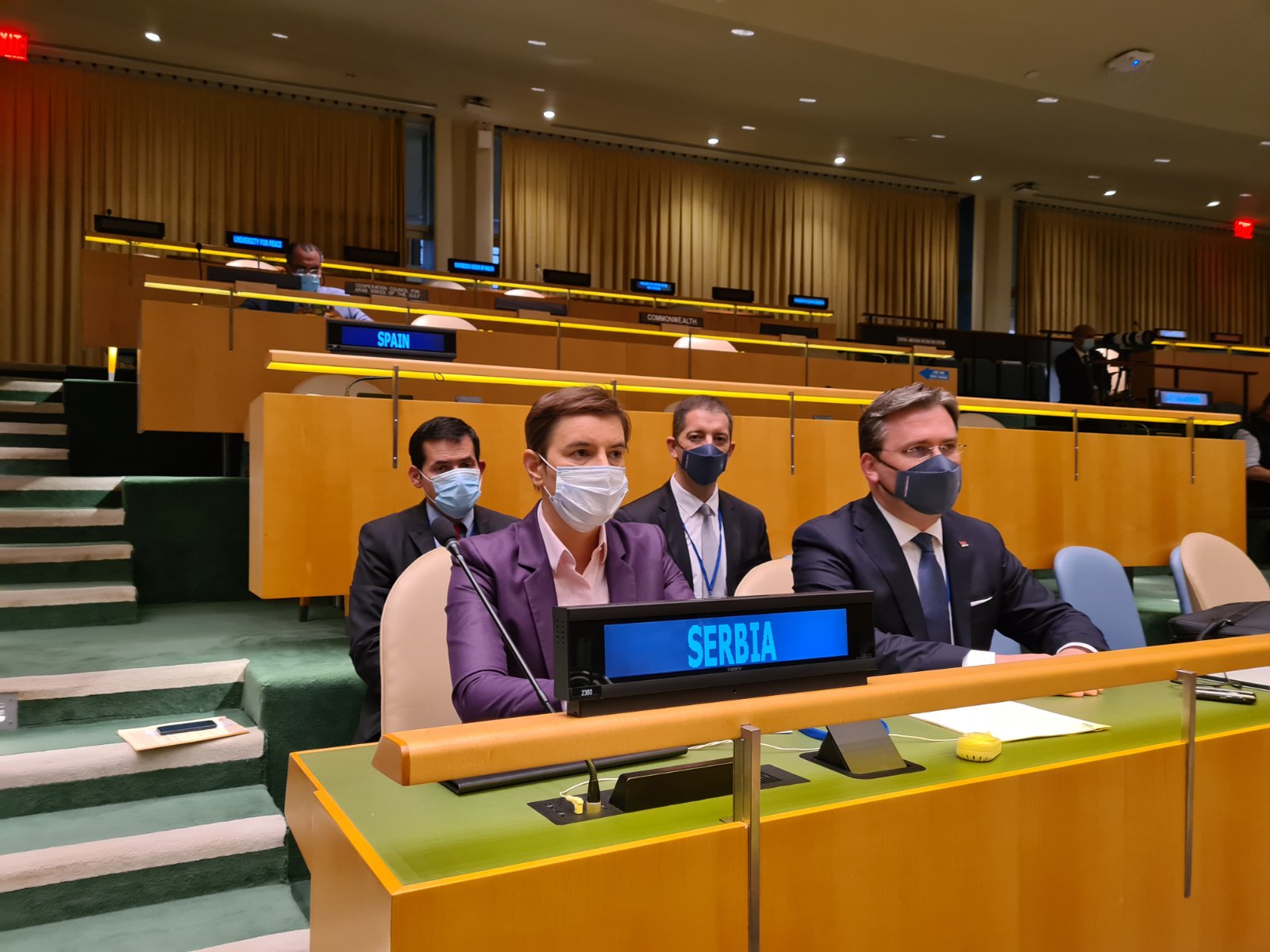
Serbia believes in solidarity between nations, multilateralism and helping others when in need.
Since the beginning of this year, we have made it our mission to support our neighbors, and all those in need, with COVID-19 vaccines and we have also allowed foreign nationals to come to Serbia to receive the vaccine which will protect their lives.
In total, Serbia has donated or allocated over a million doses of vaccines – of which 230.000 doses to the region; 300.000 doses for foreign nationals which came to Serbia to get vaccinated; and additional 570.000 doses to countries of Africa and Asia.
We will keep doing so, to the greatest extent possible, and until COVID-19 is behind all of us.
That is why we have also taken steps to acquire the technology to produce at least two types of COVID-19 vaccines to help improve global access so we can all be safe and victorious.
However, as stated by dignitaries of some of the largest nations during this General Assembly, there are other pressing issues that all of us need to keep addressing without any delay and in a bold manner – and that is climate change.
Serbia has redoubled its efforts to make our country safer and cleaner for its citizens, and by doing so, contribute to the fight against climate change and for environmental protection.
We are strongly committed to the implementation of the sustainable development goals and the Paris Agreement on Climate Change. We are committed to global efforts and will continue to work actively to meet our obligations under the UN Framework Convention on Climate Change.
We are about to submit our revised Nationally Determined Contributions to contribute to this critical global effort. We have already announced our intention to reduce greenhouse gasses for at least 33.3% compared to 1990, and 13.2% compared to 2010, which we are currently incorporating into our energy and climate strategic documents.
We work strategically on planning and investments in this sector. These investments are extremely expensive, requiring years and decades of commitment and a systemic approach - but we are clearly set on the path of this transformation.
Ladies and gentlemen,
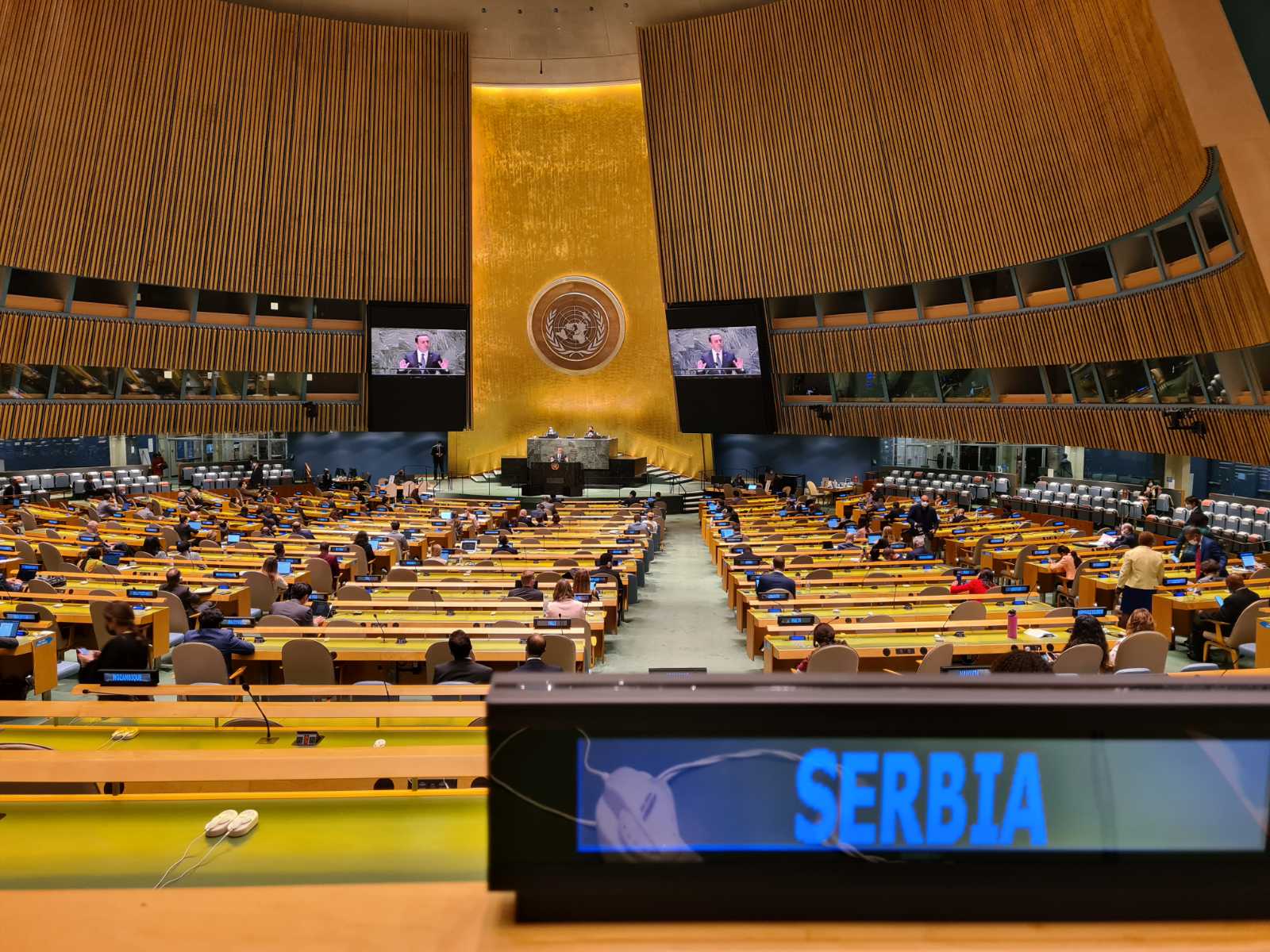
Of all the challenges we face, the most worrisome for Serbia is the maintenance of peace and stability in the southern Serbian province of Kosovo and Metohija.
For more than two decades, we have been constantly drawing international attention to the problems that non-Albanian population is facing in Kosovo and Metohija. Physical safety, respect for and protection of human rights, especially of minority communities, are far from satisfactory.
We are now witnessing a constant increase in the number of attacks targeting Serbs, their property and religious heritage in Kosovo and Metohija.
To illustrate, there were 55 such incidents in 2014, 62 in 2016, 71 in 2020, and 100 since the beginning of this year. The total number of attacks in 2020 has already been surpassed by June of this year.
According to the UN, Kosovo and Metohija is still the territory with the least number of returnees (internally displaced Serbs) of all post-conflict areas in the entire world!
I will give you just a few examples to depict how life of Serbs in Kosovo and Metohija looks like.
On the 11th of May the house of Radoje Pumpalović, 81-years old returnee to Kosovo in the village of Dubrava, in Istok municipality, was attacked. This was the 5th attack on him in the same year. Again… he is 81 years old.
Since June 2021, multiple attacks were carried out against Dragica Gašić, 59-years old woman, the first Serb returnee in Đakovica after 22 years since the end of the conflict. Attacks include stoning of her apartment, banning her from shopping for food in the local store and petitions by civil society organization demanding her eviction from the city.
On 2nd of July, in the village of Gobulji near Vučitrn, a group of Albanians attacked 13-year old Nikola Perić. The attack occurred when he was returning home from the school playground with three friends.
Attacks on Serbian medieval churches, monasteries and monuments in Kosovo and Metohija, make them some of the most endangered cultural heritage sites in Europe.
Monastery Visoki Dečani was recently listed, by Europa Nostra, as one of the 7 Most Endangered Heritage Sites in Europe in 2021. The Advisory Panel of Europa Nostra noted that Dečani is the only monument in Europe under robust military protection for a continuous period of 20 years, although it constitutes a monument of ultimate historical and cultural importance for Europe and the world.
This spiral of violence occurring in Kosovo and Metohija culminated at the beginning of this week. On the pretext of enforcing new license plate rules, Priština dispatched heavily armed special units to the north of the province. This is yet another brutal violation of the Brussels Agreement, and this irrational show of force has ignited a major crisis. It disrupted the supply of food and medication to Serb communities in the north of the province. Local Serbs who peacefully gathered to protest this measure were met with tear gas and police brutality, thus seriously threatening local and regional stability.
Despite of all the challenges and daily provocations, Serbia remains strongly committed to finding a compromise-based solution that will ensure lasting peace and stability.
Dialogue and the implementation of the agreements reached – are the only proper way to resolve all open issues.
However, almost 9 years after reaching the Brussels Agreement, as the 1st agreement on normalization between Belgrade and Priština, the establishment of the Community of Serb Municipalities – the backbone of this agreement – has not yet even begun.
I would like to appeal, once again, to the international community, and especially the European Union, as the guarantor of the Brussels Agreement, to firmly insist that the Provisional Institutions of Self-Government in Priština start implementing all of the agreements reached.
The Republic of Serbia, by defending its sovereignty and territorial integrity, at the same time defends international law, the UN Charter, legally binding UN Security Council Resolution 1244, and the supreme authority of the Security Council when it comes to the preservation of international peace and security.
We attach special importance to the activity of the UN mission in Kosovo and Metohija and expect it to continue to implement its mandate in the Province in accordance with this resolution.
Dear friends,
Our generation shares the common destiny of the modern world, which is becoming increasingly complex in terms of geopolitics, technology, health, climate. In the face of these challenges, Serbia will continue nurturing international partnerships, on a predictable and transparent basis.
We will continue pursuing the rule of law reforms on our EU path, which is our strategic foreign policy goal. We see this as inseparable from achieving sustainable peace, stability and prosperity.
We will host, together with the Republic of Azerbaijan as the current chair of the Non-Aligned Movement, a commemorative high-level event marking the 60th anniversary of the First Non-Aligned Movement Conference, which was held in Belgrade in 1961. We are very much looking forward to hosting our friends from all parts of the world in Belgrade in October this year.
We will further enhance cooperation across the Balkans, through the Open Balkan initiative and Berlin process, by opening borders, harmonizing differences, and further integrating our region.
In conclusion,
Over the past 7 years, Serbia has been transformed: we sparked an economic revival, created opportunities for young people, cultivated a tech boom, and improved Serbia’s position abroad. The progress we have made has allowed Serbia to better face and survive the pandemic.
The world now faces a turning point. The recovery from COVID-19 and sustainable reconstruction will not proceed if issues, new and old, are not handled by joint forces and collaborative international actions.
This pandemic taught us one important lesson: unless all of us are safe, no one is safe – so we can either win together, all of us – regardless of how rich or poor, large or small, from Europe, Asia, Africa, America or Australia, or fail together.
But, if anything, the COVID-19 pandemic, as well as the issue of climate change, should have taught us to stand together.
Thank you.
Source: www.srbija.gov.rs |
|
|
| Prime Minister Brnabic at Global COVID-19 summit organised by White House |
|
22 September 2021
Prime Minister Ana Brnabic participated today at the Global COVID-19 summit, organised by the White House, which was opened by US President Joseph Biden.
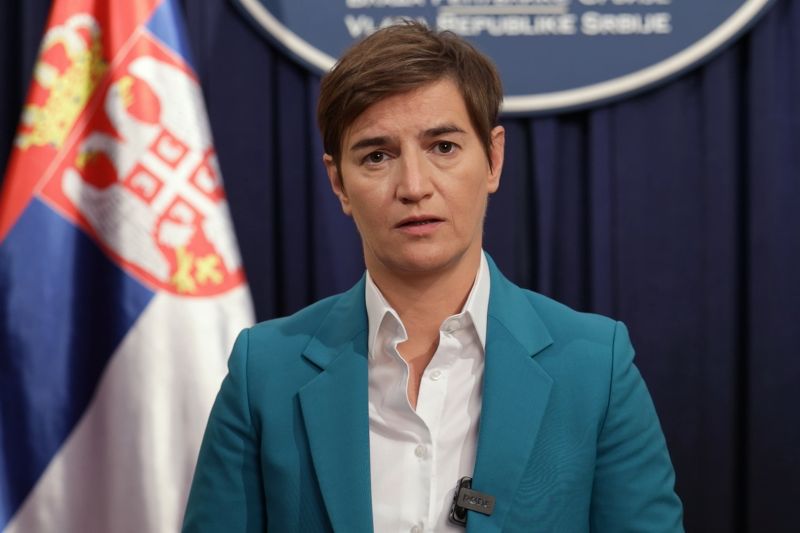
The video messages are attended by a large number of world leaders and officials of international organizations, including UN Secretary General Antonio Guterres, European Commission President Ursula von der Leyen, British and Canadian Prime Ministers, Boris Johnson and Justin Trudeau, German Chancellor Angela Merkel and many others.
In the message, the Prime Minister pointed out that Serbia was among the first European countries to procure a covid vaccine, and that she was the first European Prime Minister to receive the vaccine. Thanks to years of investment in digitalisation and development of eGovernment, we have managed to organise a complicated and complex vaccination process very efficiently and in a way that it is focused on citizens, she explained. However, as she added, from the very beginning we were aware that this is not just a matter of our citizens and only our struggle. In the fight against the COVID-19 pandemic, we are all safe or no one is safe.
That is why, in addition to procuring vaccines for our citizens, we donated vaccines to the citizens of the Western Balkans, but also to other countries, she reminded and specified that Serbia donated 230,000 doses of vaccines to the region, we vaccinated foreign citizens in Serbia with approximately 300,000 doses and set aside we have 570,000 doses of vaccines for countries in Africa and Asia. Brnabic mentioned that Serbia has already started the production of covid vaccine from one manufacturer, and that it will start production from another by the end of the year, because in that way we want to help and support all people and countries that need vaccines. This is a pandemic in which we will either win together or lose together, but we must fight together, the Prime Minister repeated.
That is why Serbia supports the goals of this global summit, she emphasised, and expressed her gratitude to the United States of America and President Biden for organising the summit and supporting joint efforts in the fight against the COVID-19 pandemic. Vaccines are the only way out in the fight against the pandemic, concluded Brnabic. |
|
|
| Gouillon announced a campaign to protect the property rights of Serbs in the FB&H |
|
11. Sep 2021.
The head of the Directorate for Cooperation with the Diaspora and Serbs in the region, Arnaud Gouillon, announced a campaign for the protection of property rights of Serbs in the Federation of B&H today, because there is a risk of losing property due to the harmonization of data on real estate cadastre and land registers.
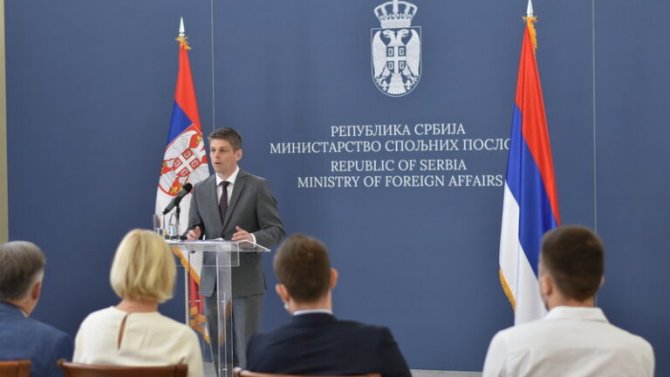
"Significant, important and somewhat worrying harmonization of data is underway and there is a risk that Serbs from the Federation of B&H might lose their property", Gouillon said at a press conference he held with the head of the Republic of Srpska representative office in Belgrade, Mlađen Cicović, which specified that there is about 400,000 Serbs who own real estate in the Federation.
According to Gouillon, there is a danger that Serbs from the Federation will lose their property, will not be registered in the books, nor be informed about it, because the information is published in the Official Gazette of the Federation and local media, inaccessible to Serbs living all over the world.
"In the absence of the owner, when a harmonization is conducted, the real rights holder is deleted, and his property is transferred to the state, canton, municipality", said Gouillon.
The information campaign will be conducted in five steps through embassies and consular offices, organizations with which the Directorate cooperates, the diocese of the Serbian Orthodox Church, social networks and the media.
He added that in the next 30 days, a video with the phone numbers of the RS Legal Aid Office +387 55490940 or viber and whatsapp numbers +387 65 090-040, will be broadcast on RTS, as well as by e-mail: pravnapomoc.banjaluka@rgurs.org.
Gouillon emphasized that confiscation of property in FB&H is a risk that can be prevented simply and easily. It is only necessary, he says, for those interested to contact the legal aid offices, which will monitor everything that is necessary for them.
Cicović emphasized that the joint campaign aims to inform as many compatriots around the world as possible about the procedure of harmonizing data on real estate cadastre and land registers in the Federation.
"The campaign is primarily important because the process of harmonizing data is non-transparent", Cicović said.
He added that the Republic Administration for Geodetic and Property Legal Affairs has opened offices in Banja Luka, Bijeljina, Mrkonjic Grad, Nevesinje, East Sarajevo and Zvornik, where citizens can receive free professional and legal assistance.
These offices acted on citizens' requests, and by 10 August, a total of 4,447 requests had been resolved. |
|
|
| Marking the Remembrance Day of all Serbs who died and were expelled in the armed operation "Storm" |
|
5 August 2021
The President of the Republic of Serbia, Aleksandar Vučić, attended the markiing of the Remembrance Day of all the victims and expelled Serbs in the armed operation "Storm" and said that Serbia remembers!
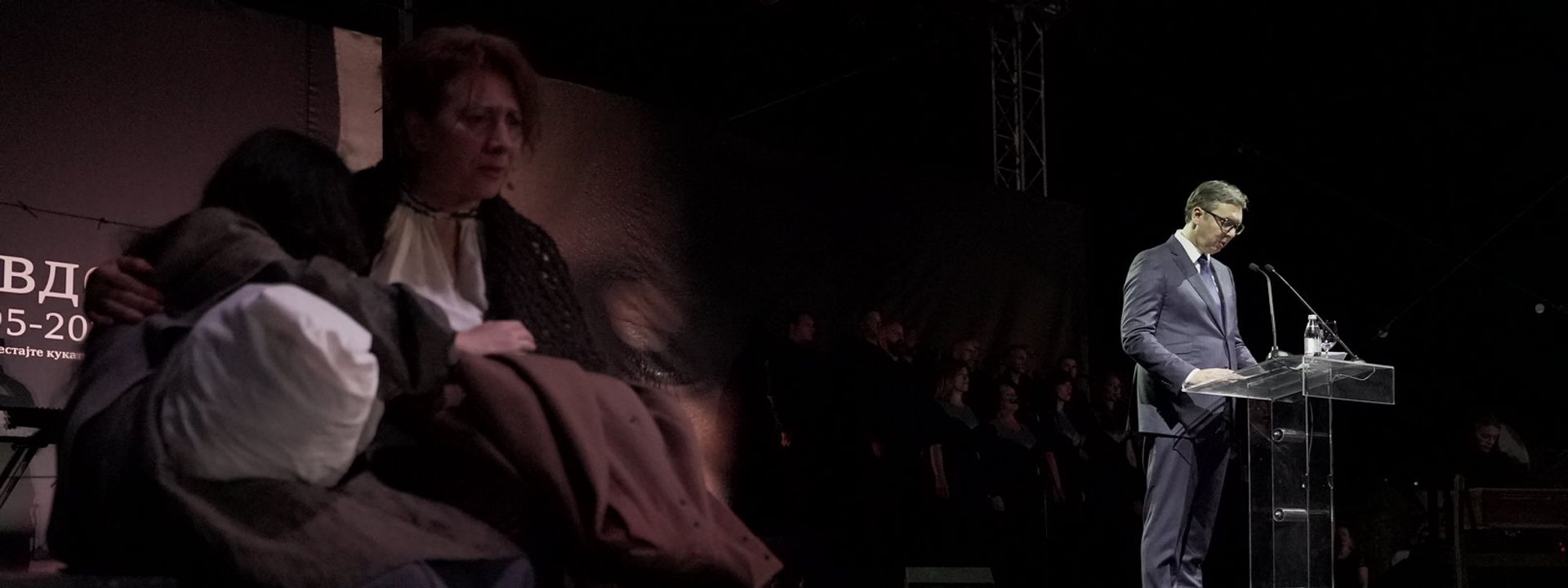
"Today, when we remind ourselves again of what happened in August 1995, the terrible pogrom, the expulsion of more than 250,000 Serbs, the exodus and ethnic cleansing, we, at the same time, and finally, remind ourselves of who we are, what we are, where we come from and where we are going. Thank you all for being here together tonight and for showing how much we love our people", said President Vučić, adding that we will not forget any of the things that the Krajina people had to go through.
"For us, these are not just terrible numbers of victims", said President Vučić and emphasized that Serbia will not forget.
"History has never been rewritten like today. That is why I want to remind us all not only of what others have done to us, not wanting us to exist, but also of what we have done to ourselves, just as if we ourselves did not want to exist", said the President, noting that we must never again allow Serbia to forget its silent heroes.
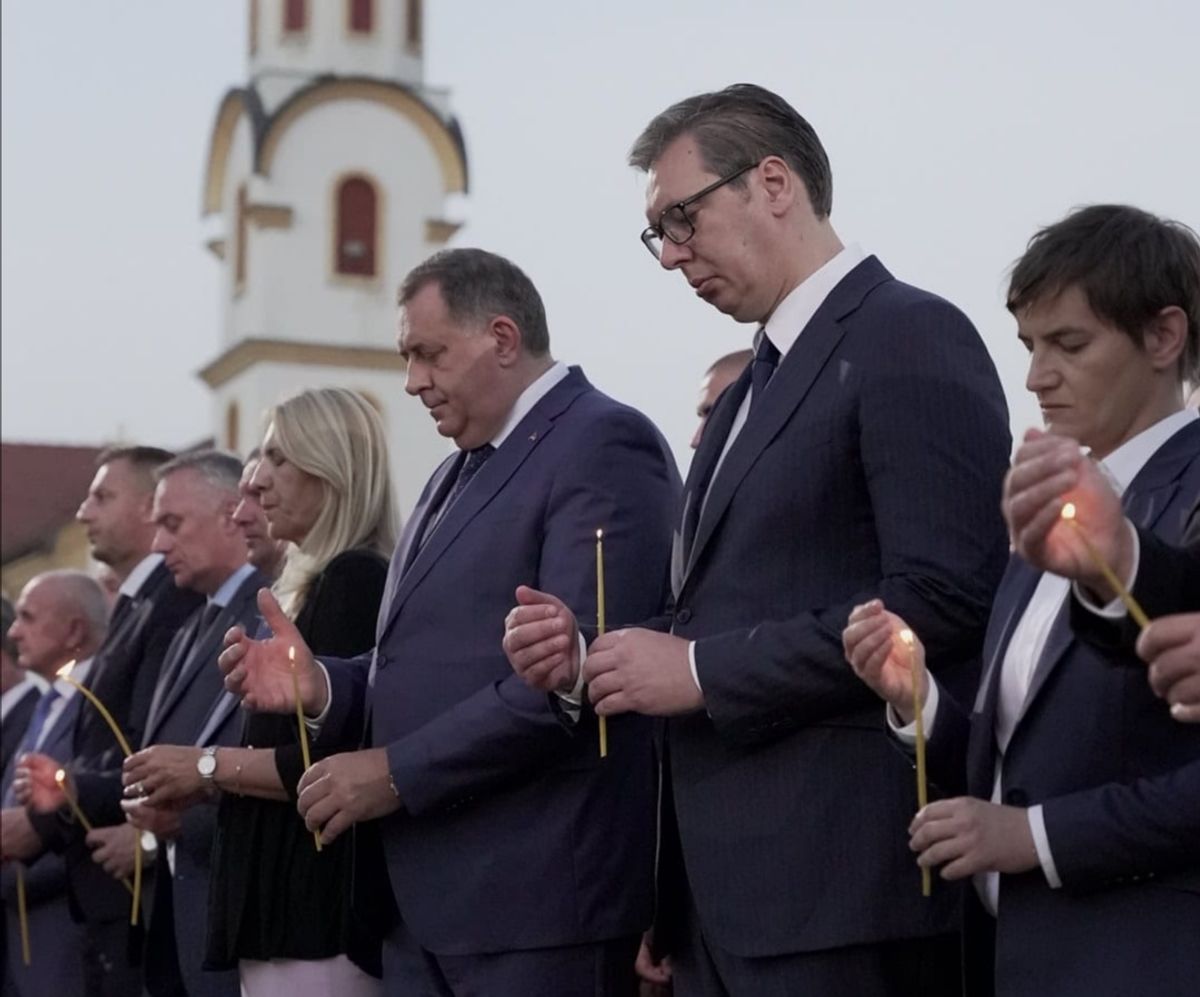
President Vučić emphasized that we must never again cover our eyes, ears, and mouths in front of something that truly was a pogrom and the downfall of all humanity.
"Pretending that this is not true, avoiding saying it, is a crime not only against the victims, but also against ourselves, every living Serb, people from Krajina, as well as Serbia and its future", said President Vučić and underlined that people can stand up straight and live with themselves and the others without hesitation, fear and doubt, only if they remember.
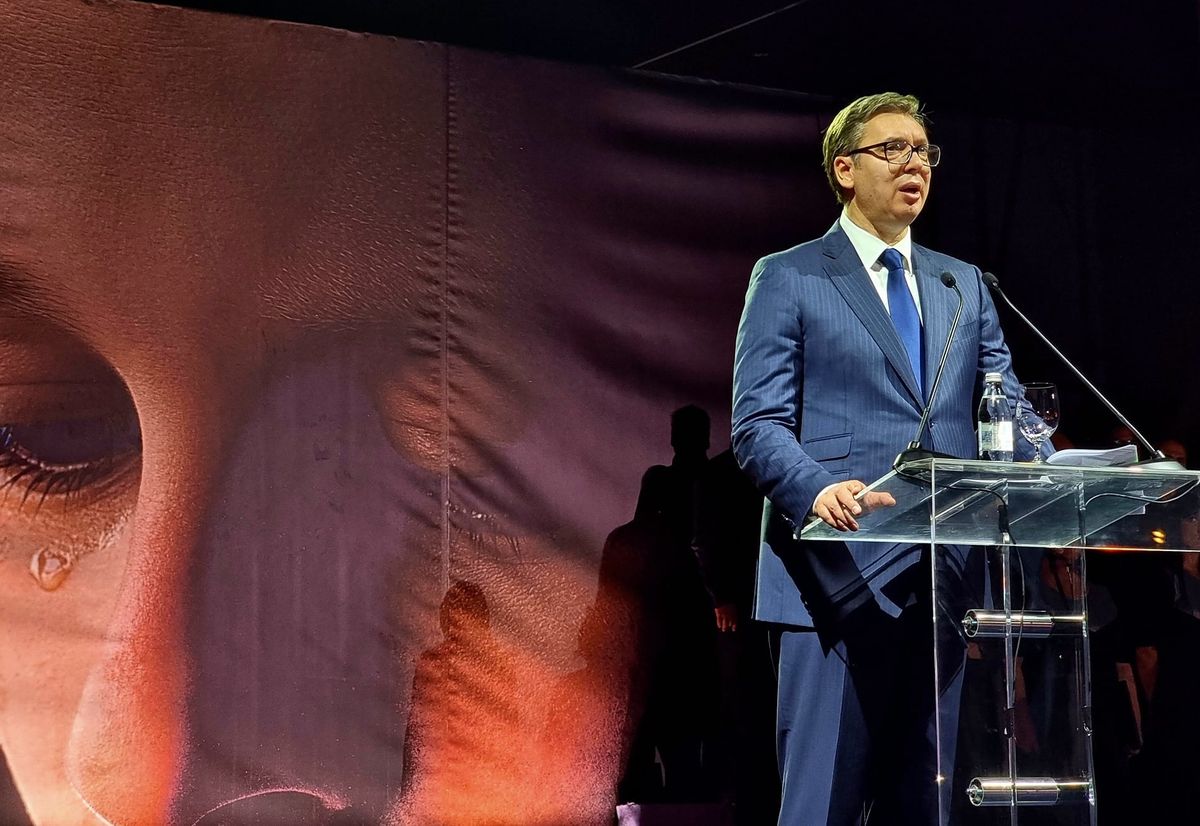
President Vučić pointed out that Serbia must fight for peace and cradles with children, as well as that not remembering annuls and erases us from the history and the future, depriving us of the right to tomorrow.
"Our mission is a happy future for us and for the new generations! Today's Serbia is based on a clear identity and a culture of remembrance", said President Vučić and reminded that everything that had been neglected for decades had been done, and that a strong Serbia has become the master of its own destiny.
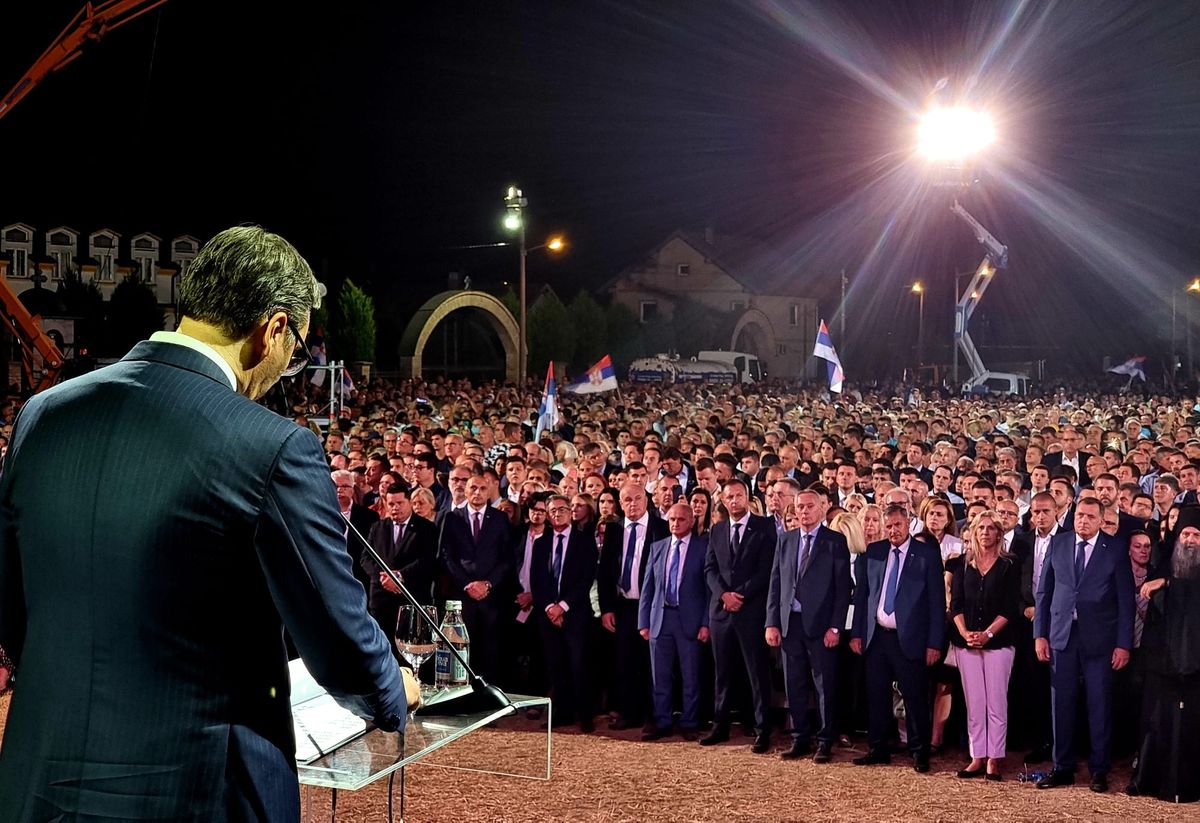
"Eternal glory to you, Serbian martyrs who perished in the "Storm" and all other pogroms. Your children are in their Serbia, taken care of, loved and successful. Sleep peacefully, Serbian falcons, the future of your children is our vow", concluded President Vučić and thanked everyone who showed that night how much they love their country and that Serbia remembers.
Source: www.predsednik.rs
Photo: www.predsednik.rs |
|
|
| Meeting with the Serbian member of the Presidency of Bosnia and Herzegovina and representatives of the Republic of Srpska |
|
4 August 2021
The President of the Republic of Serbia, Aleksandar Vučić, met today with the Serbian member of the Presidency of Bosnia and Herzegovina, Milorad Dodik, the President of the Republic of Srpska, Željka Cvijanović, the President of the National Assembly of the Republic of Srpska, Nedeljko Čubrilović, and the Prime Minister of the Republic of Srpska, Radovan Višković, with whom he discussed aspects of economic cooperation between Serbia and Srpska, the problems facing the Serbian people, as well as the improvement of overall regional cooperation.
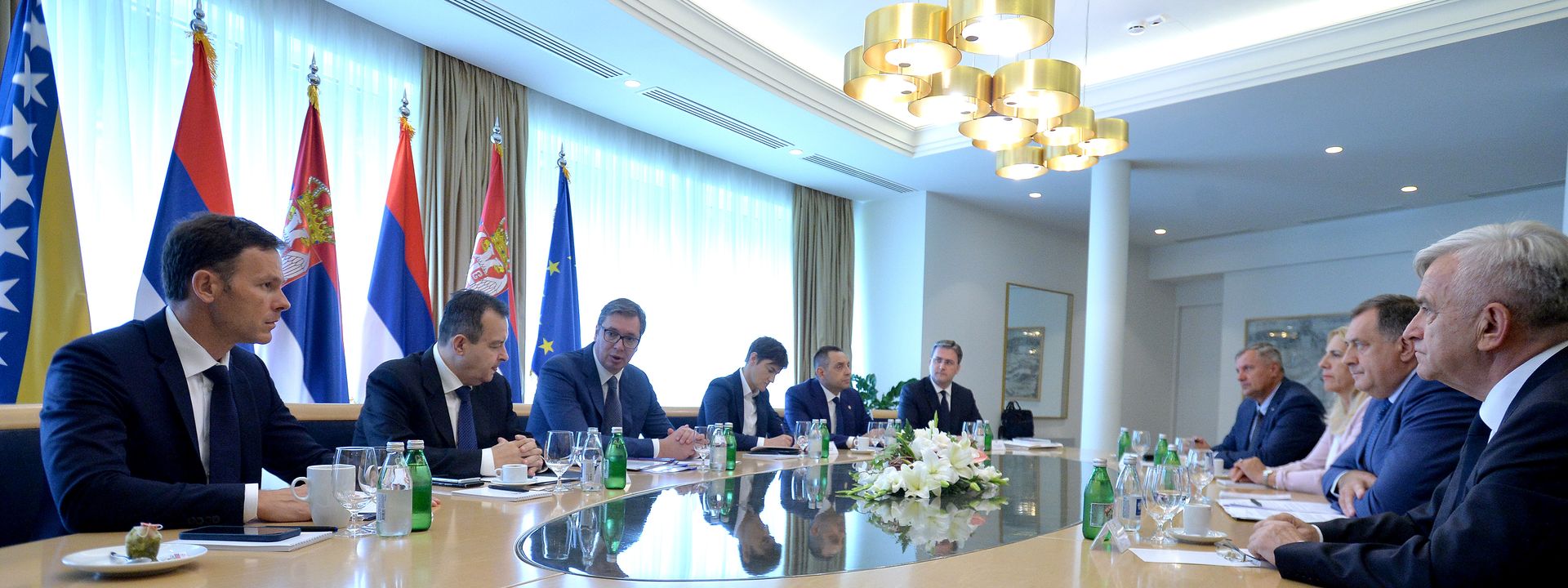
"Due to all obligations today, Serbia and Srpska will mark together 26 years since the beginning of the criminal operation ‘Storm’, mass murders of Serbs and the largest ethnic persecution in modern Europe tonight in Busije", said President Vučić ahead of the meeting with the Serbian member of the Presidency of Bosnia and Herzegovina, Milorad Dodik, and representatives of the Republic of Srpska.
President Vučić pointed out that he had carefully listened to the representatives of the Republic of Srpska and that all important topics related to the situation in the region, Bosnia and Herzegovina, as well as the Republic of Srpska had been discussed at the meeting, emphasizing that decisions must be made in accordance with the interests and with the consent of the three peoples and that this is the essence and spirit of the Dayton Agreement.
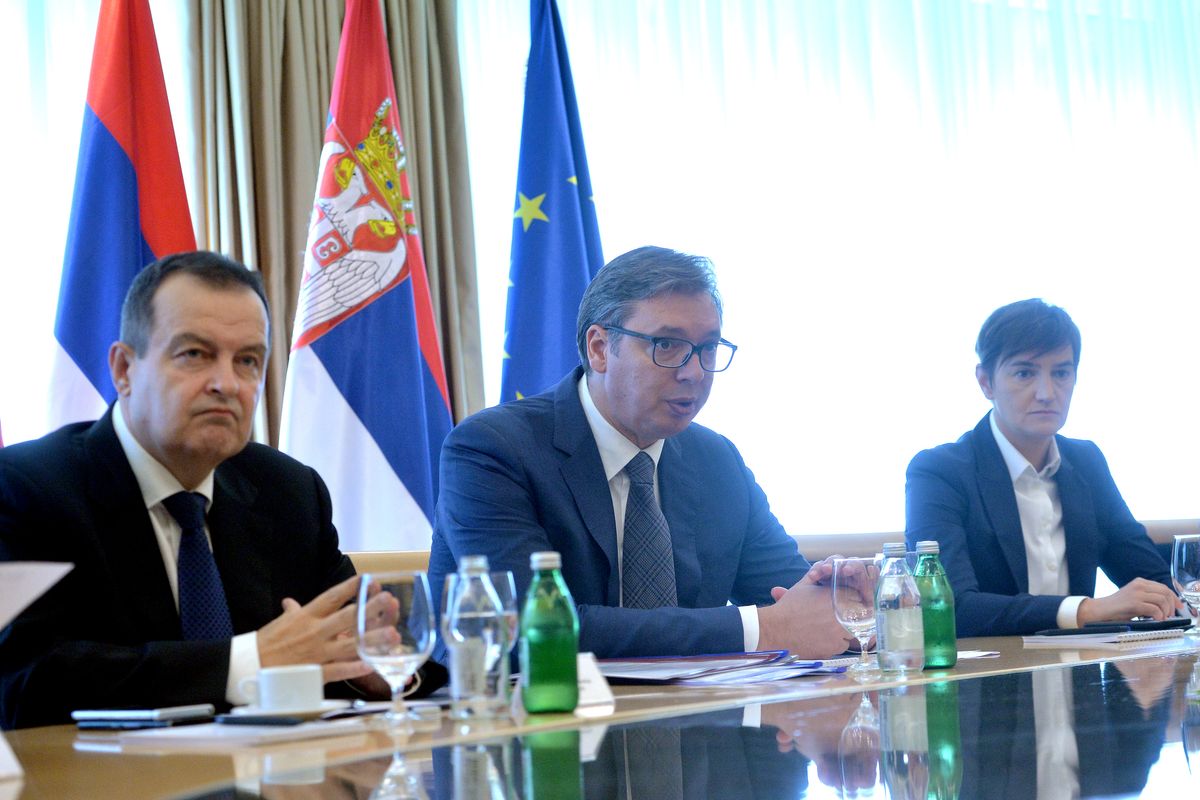
"The position of the Republic of Serbia is that imposed decisions are never good. Serbia has expressed a desire to respect the Dayton Peace Agreement and to preserve peace and stability in the entire region", said President Vučić, adding that Serbia respects the territorial integrity of B&H, but also of the Republic of Srpska within B&H.
President Vučić conveyed that all economic projects that are of essential importance were also discussed at the meeting, as well as that Serbia, together with a consortium of Serbian companies, will not only build, but also pay 80 percent of the road from Raca to Bjeljina.
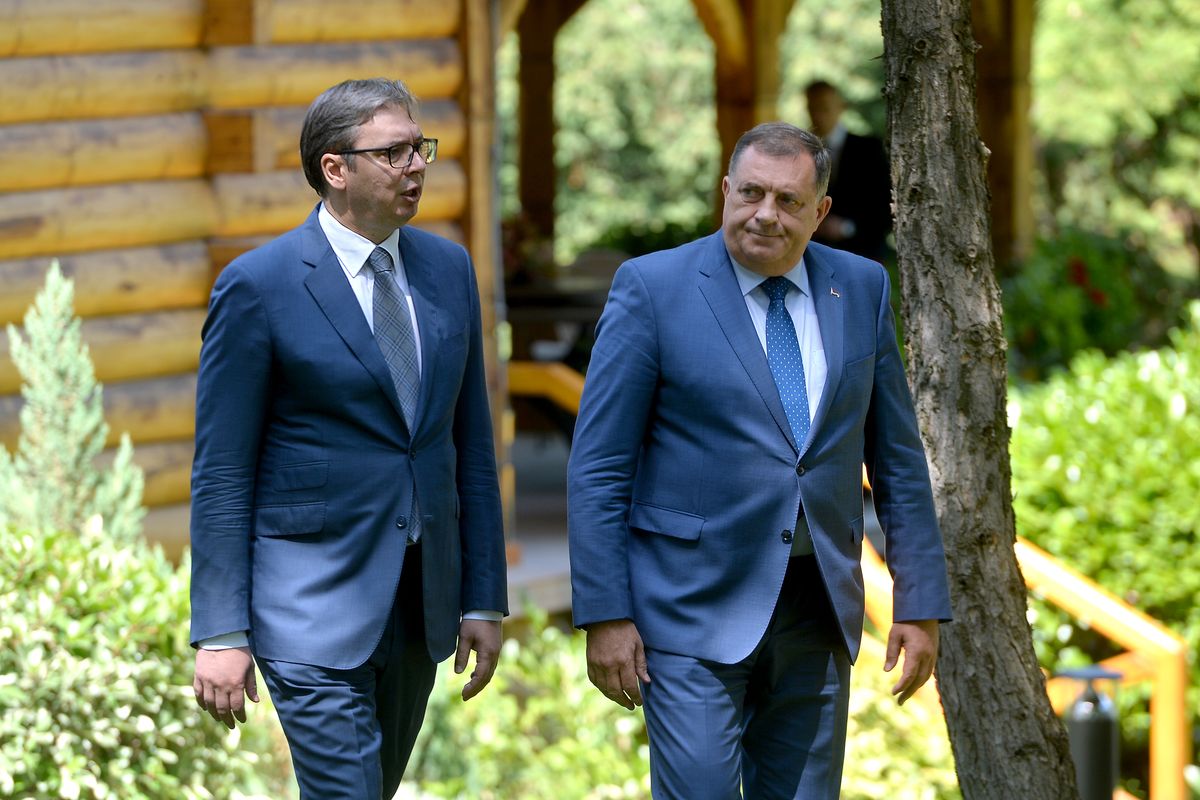
"We will also build a bridge on the Sava – it will be a contribution to friendship and brotherhood with the Serbian people and with all peoples in B&H", the president said, adding that they also talked about energy projects and the Belgrade-Sarajevo highway, as well as further support in the field of health and social policy that Serbia will continue to provide to the Republic of Srpska.
"It is very important for us to bring the draft law on the protection and use of our Serbian language and the Cyrillic alphabet by Unity Day, to have the same norms on that issue", said President Vučić and underlined that all great European nations preserved their identity through language and script.
"Every conversation is good and we will always have all the attention and time of this world to hear the representatives of our people, because we Serbs belong to the same family and do no harm to anyone if we protect our Serbian language, we just want to preserve our name, our identity and the right to a future for our children", concluded President Vučić and emphasized that in the future, Srpska will always be able to count on an even greater support from Serbia.
After the meeting with the representatives of the Republic of Srpska, President Vučić also met with the representatives of non-parliamentary parties that do not want the participation of foreign representatives in the inter-party dialogue, as well as the representatives of the ruling and opposition parties in the National Assembly of the Republic of Srpska. Source: www.predsednik.rs
Photo: Tanjug/Zoran Žestić |
|
|
| 75 apartments in Nis handed over to refugee families from Croatia and B&H |
|
2 August 2021
75 apartments in Nis handed over to refugee families from Croatia and B&H
The Minister of Foreign Affairs, Nikola Selaković, attended the ceremonial handing over of keys to 75 apartments today in Nis, intended for refugee families from Croatia and B&H within the implementation of the Regional Housing Programme (RHP) in Serbia.
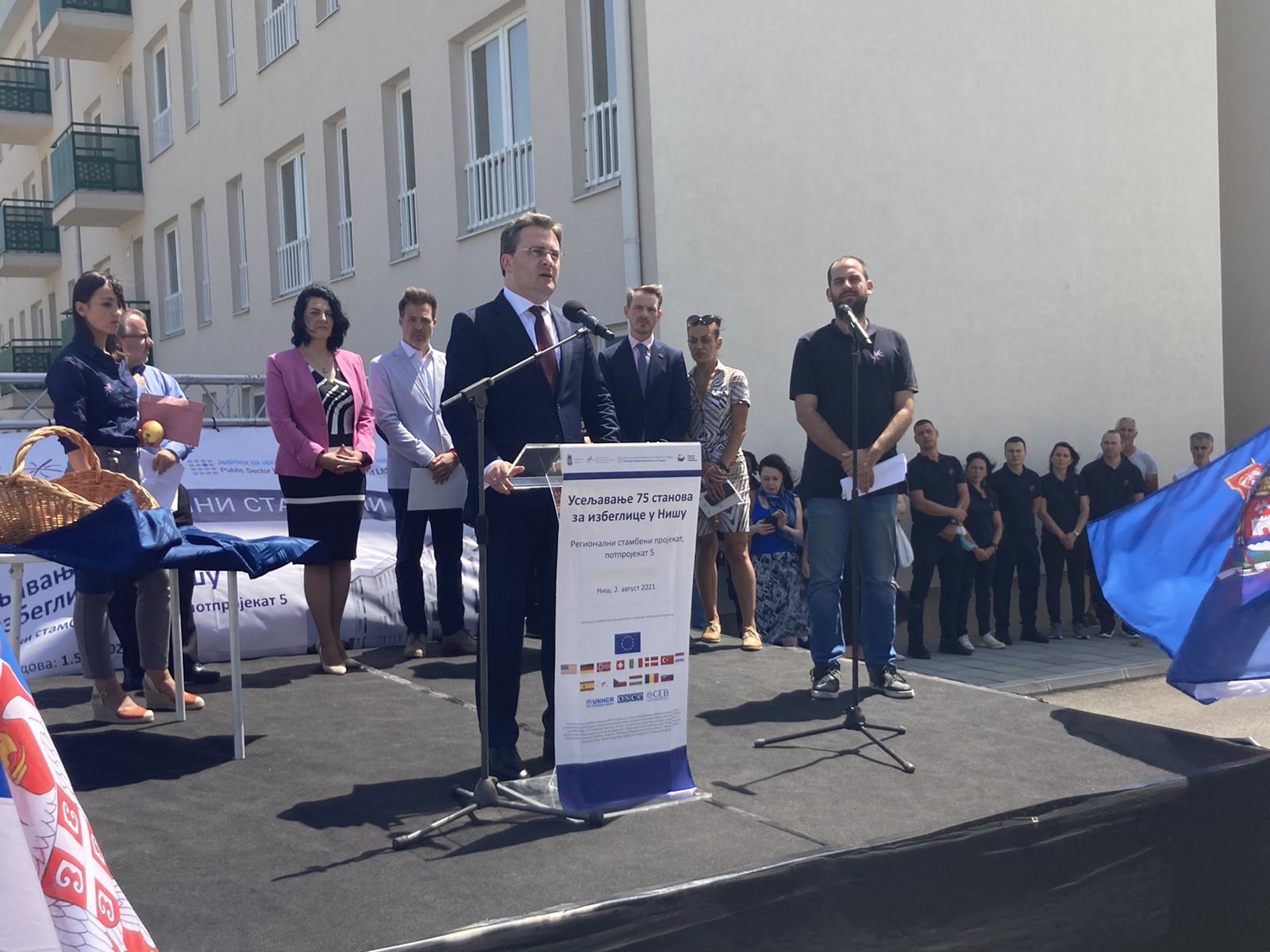
In his address, Selaković expressed his satisfaction that he had the opportunity to share the joy with 75 families who, after 25 years, will get their own roof over their heads, wishing them a lot of happiness, joy and beautiful moments in their new homes.
"The city of Nis has become richer for 75 wonderful, hard-working, diligent, honest families, our people who did not flee to Serbia of their own free will, but out of a desire to simply protect their dear lives", Selaković said, thanking the city of Nis for its help in the implementation of this project.
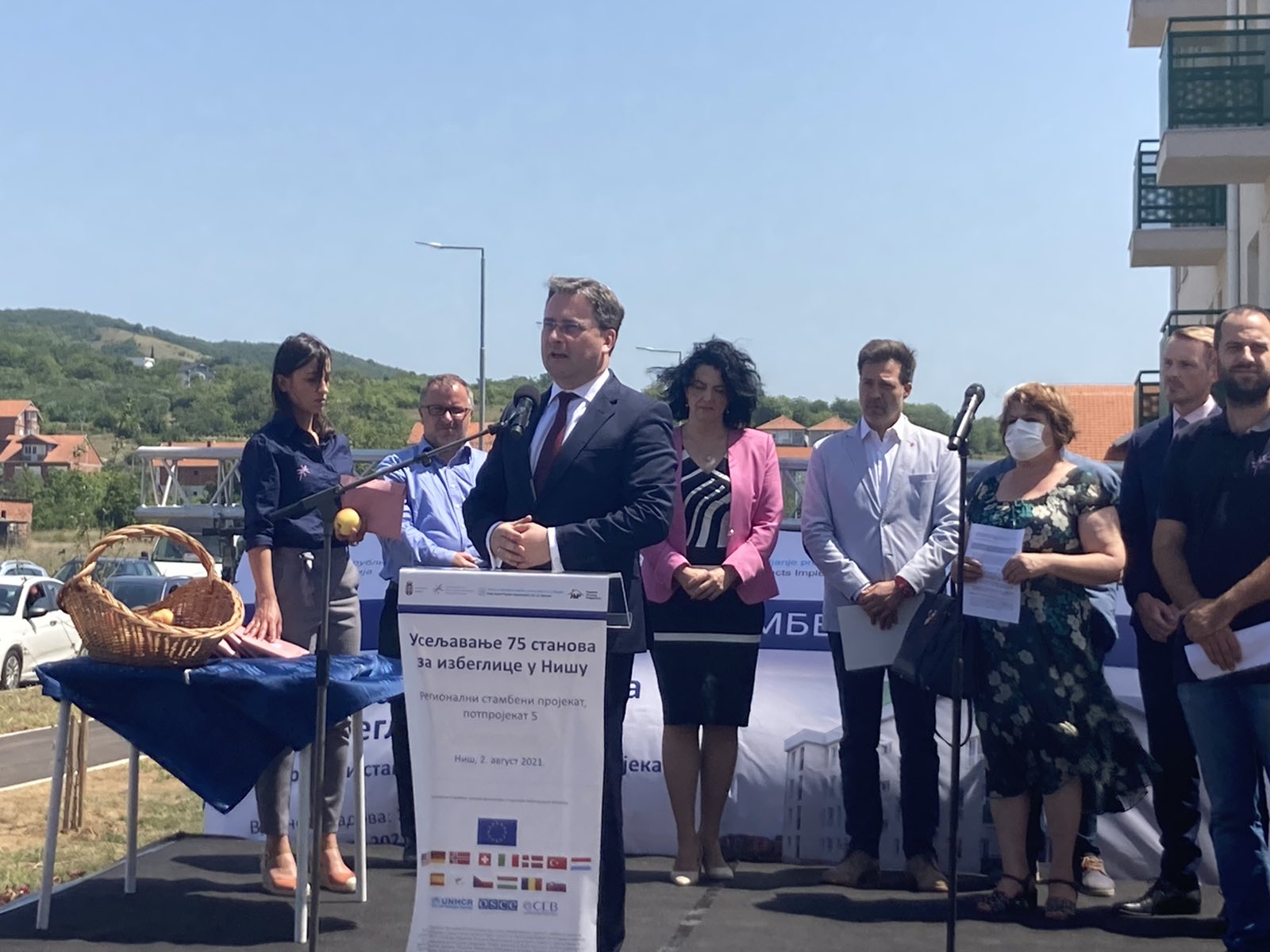
Minister Selaković, who is also the President of the Commission of the Government of Serbia for the coordination of the permanent integration process of refugees, said that 5,825 housing solutions have been allocated so far within the implementation of the RHP. He stated that 2,004 packages of construction materials, 305 prefabricated houses, 1,575 rural houses with a garden and 1,941 housing units were awarded.
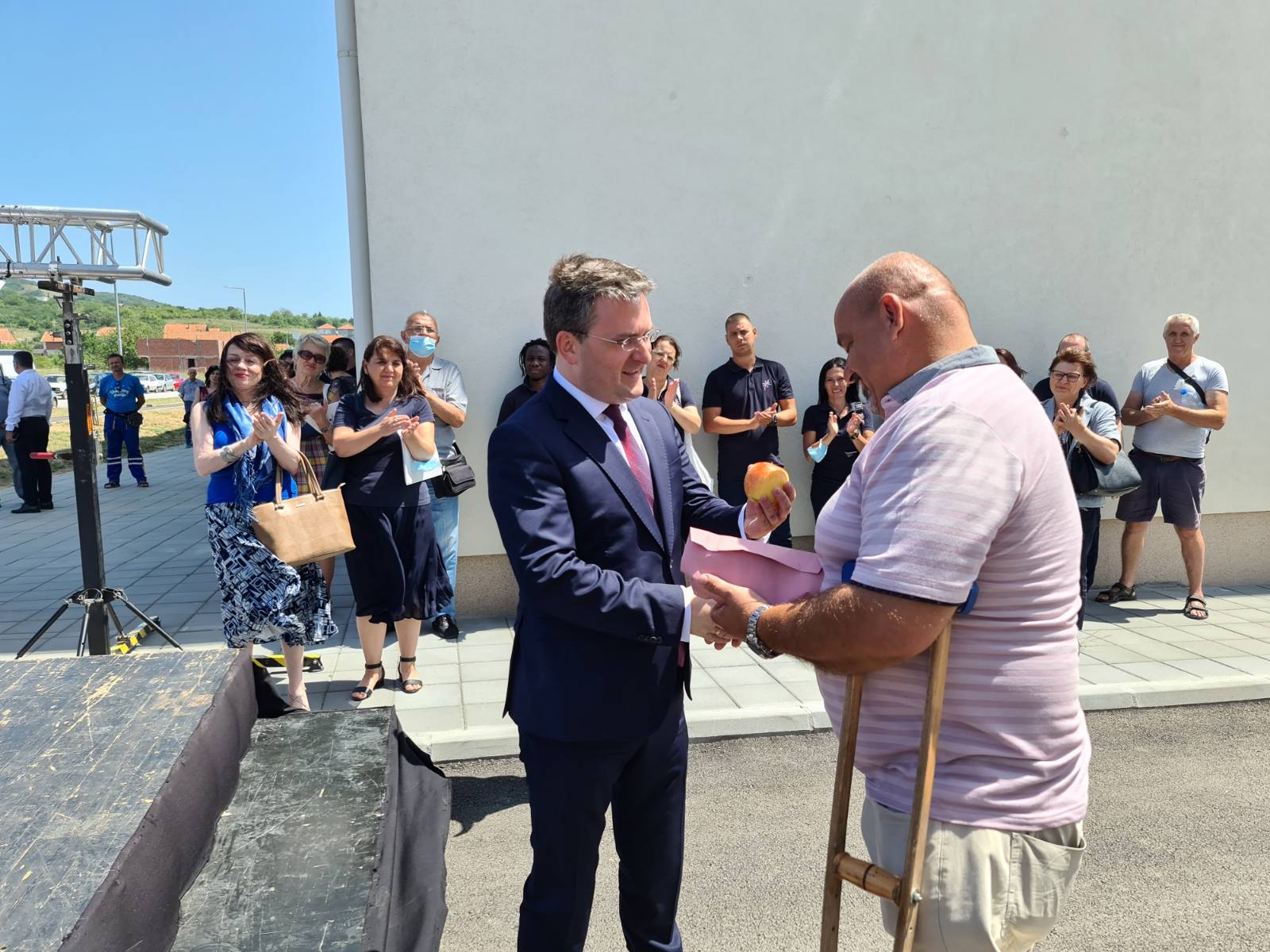
The Minister said that the apartments that are being moved in today were built within the sub-project 9 of the RHP, emphasizing that its total value is around 1,500,000 euros.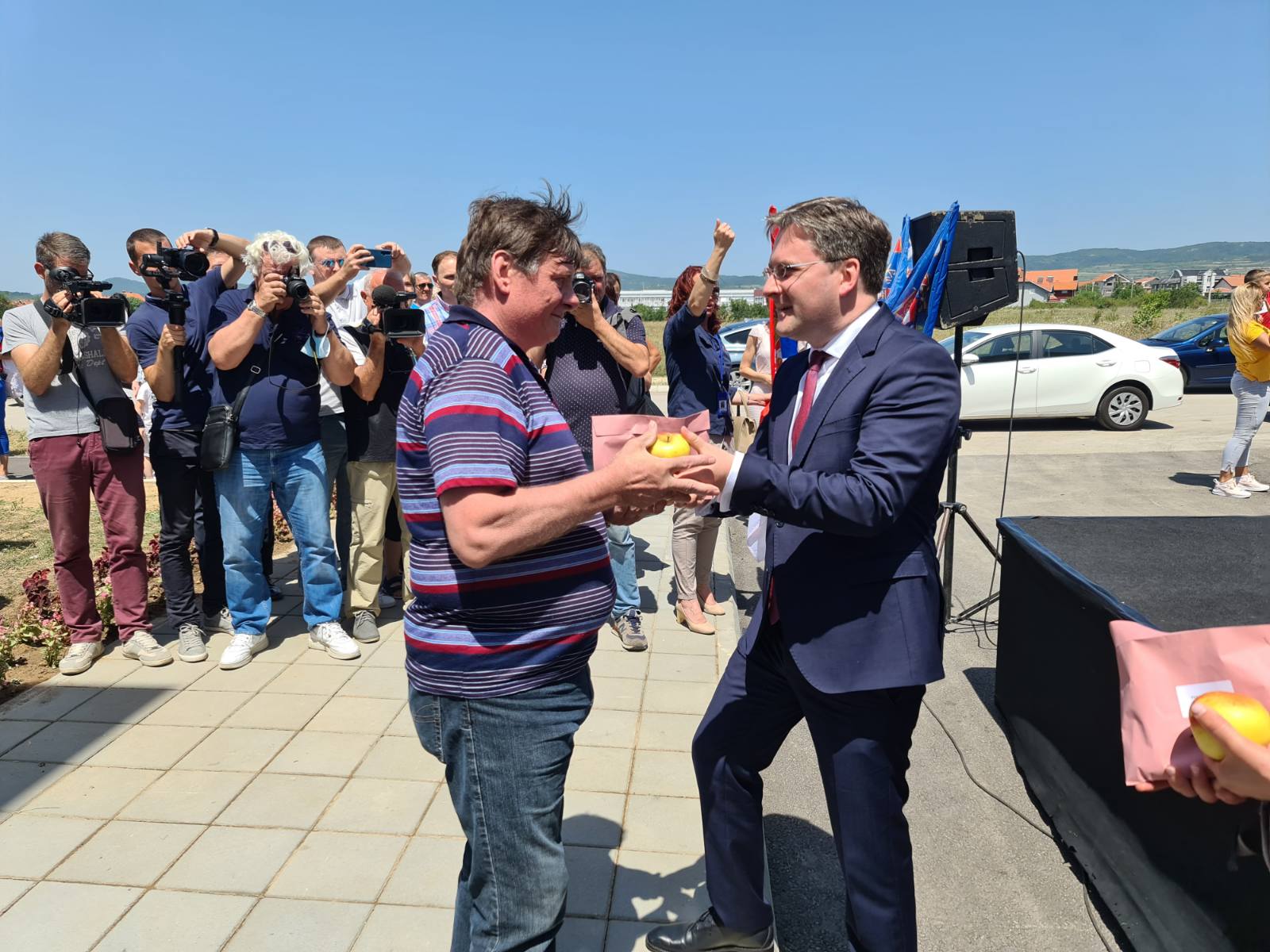
"With this project, Nis will solve the issue of finding homes for our people who fled from the territory of B&H and Croatia to Serbia", said the minister, adding that it is also necessary to find an adequate solution for the issue of internally displaced persons from Kosovo and Metohija.
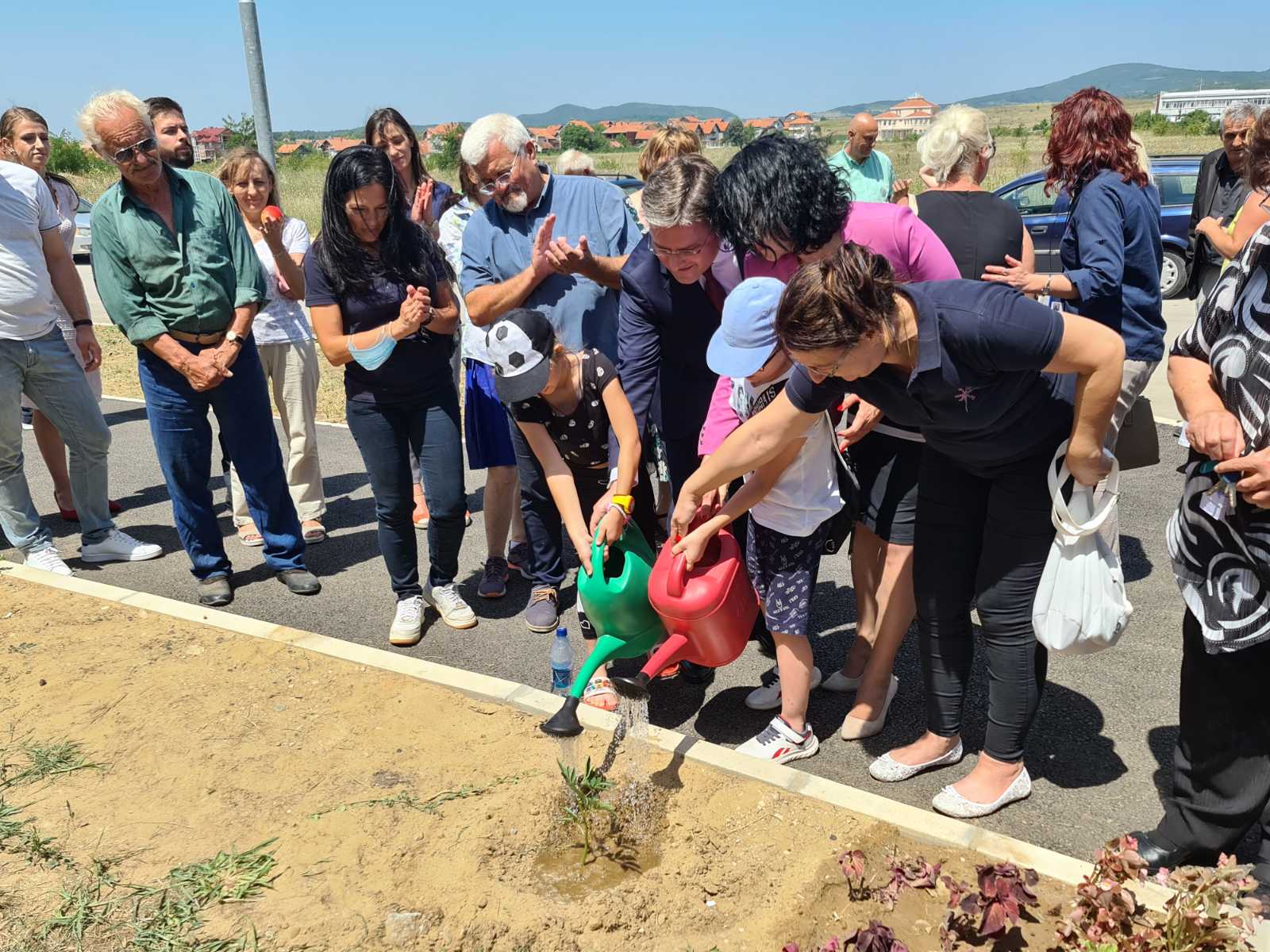
The Minister thanked the EU, the largest donor to the RHP, and other bilateral donors participating in the aforementioned program. He also emphasized the importance of the Council of Europe Development Bank and especially thanked the Commissariat for Refugees and Migration for its engagement in the implementation of this program.
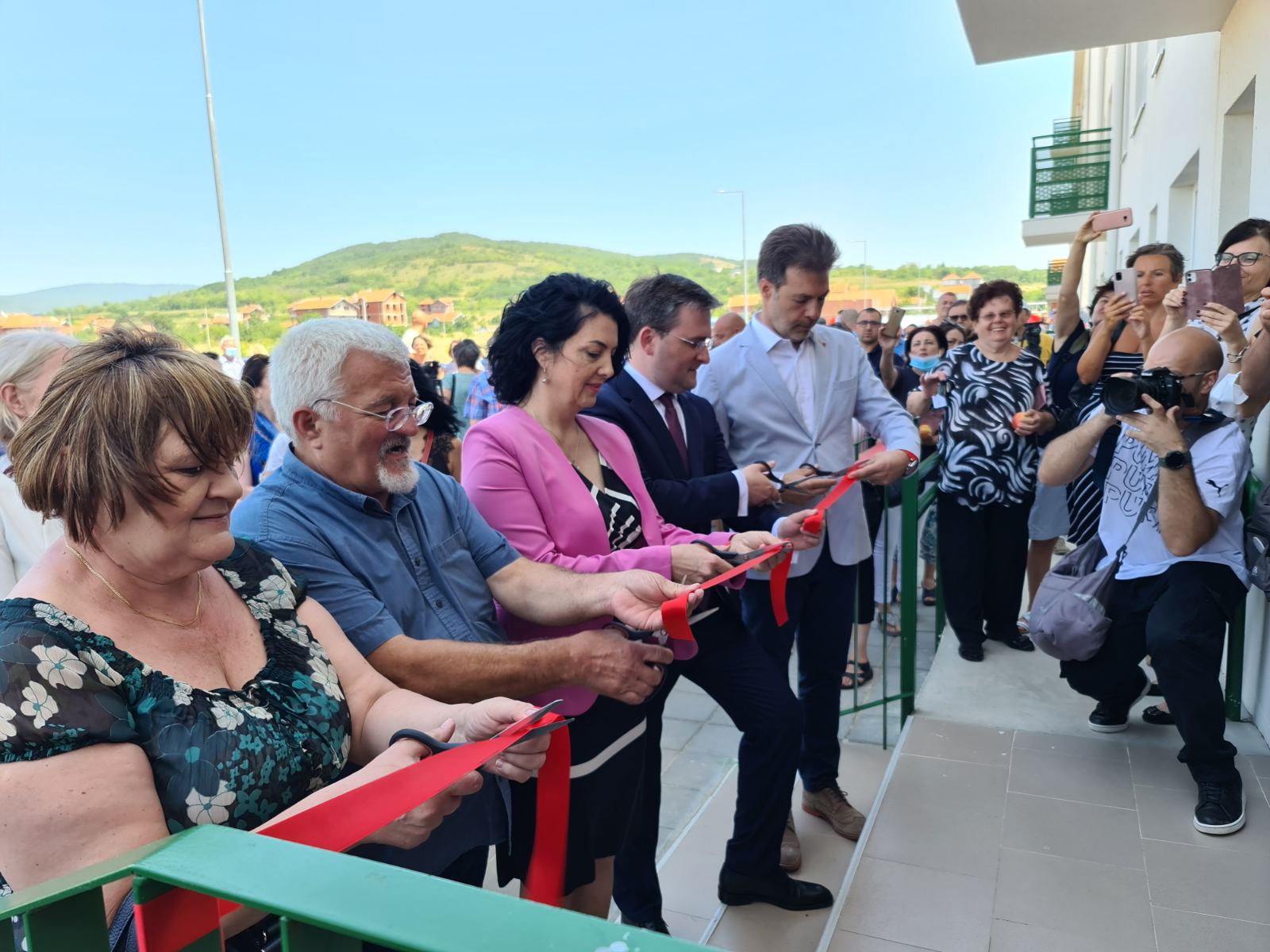 |
|
|
| Selaković spoke with Željka Cvijanović |
|
23. July 2021.
The Minister of Foreign Affairs of the Republic of Serbia, Nikola Selaković, met today in Belgrade with the President of the Republic of Srpska, Željka Cvijanović, with whom he discussed a number of topics of importance for special and parallel ties between Serbia and the RS.
According to Minister Selaković, special and parallel ties between Serbia and the RS are developing, and at this moment they are at a historical maximum, i.e. at the highest level since the agreement was concluded and since Serbia and the RS have existed and acted together.
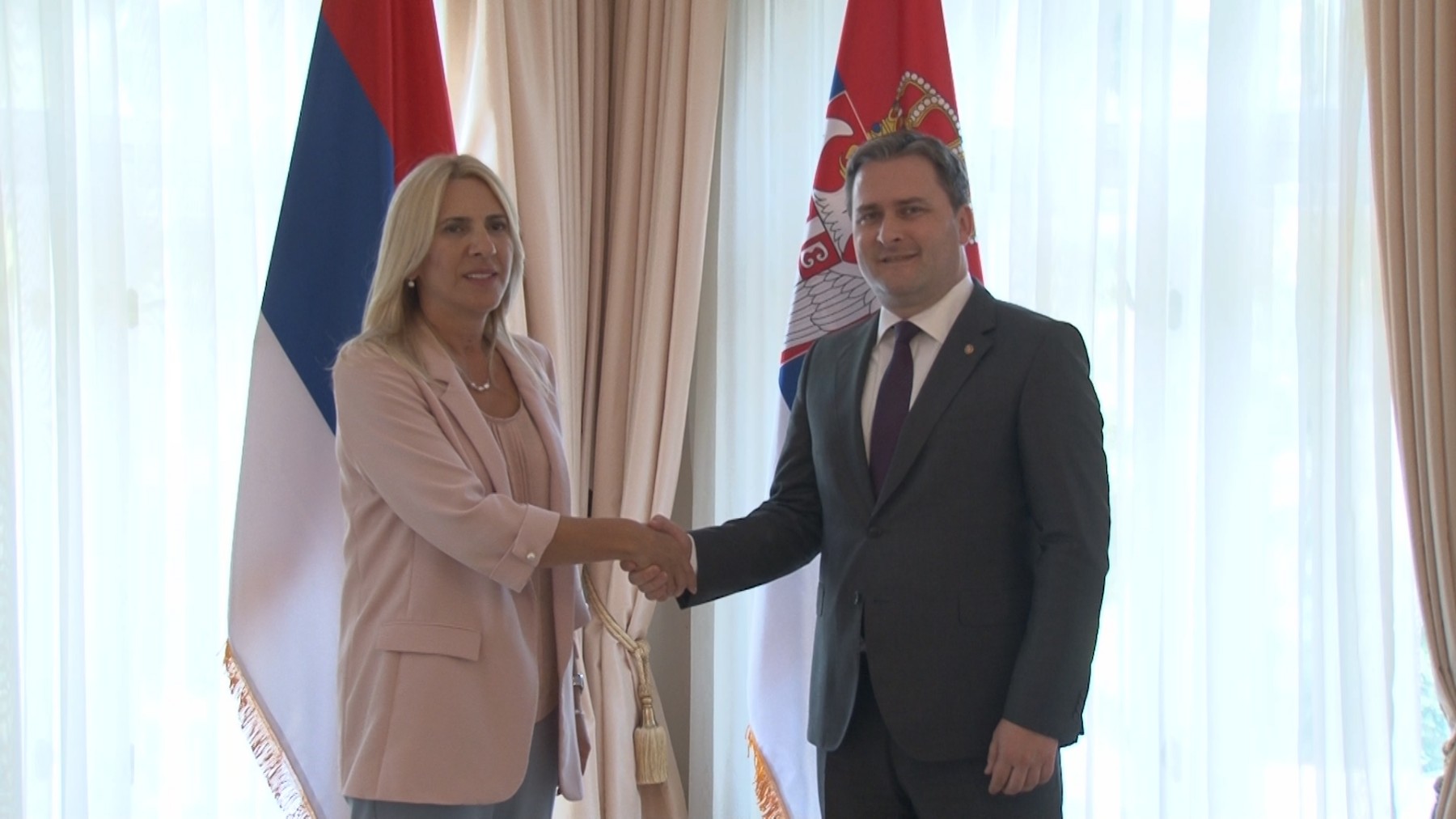
"On the one hand, respecting the territorial integrity of B&H, Serbia strives to develop the best possible political, economic and any other relations with all its neighbors, but on the other hand, respecting and being guided by the Agreement on Special Parallel Relations between Serbia and the RS, Serbia does not forget its people and the RS as an entity established and confirmed by the Dayton Agreement", Selaković said after the meeting.
One of the topics, he added, was the functioning of the joint Serbian diaspora and activities in the field of preserving the Serbian national, cultural and religious identity.
Selaković informed his interlocutor about the plans for opening additional Serbian language schools for the diaspora, expressing the expectation that teachers from the RS will be included in that program.
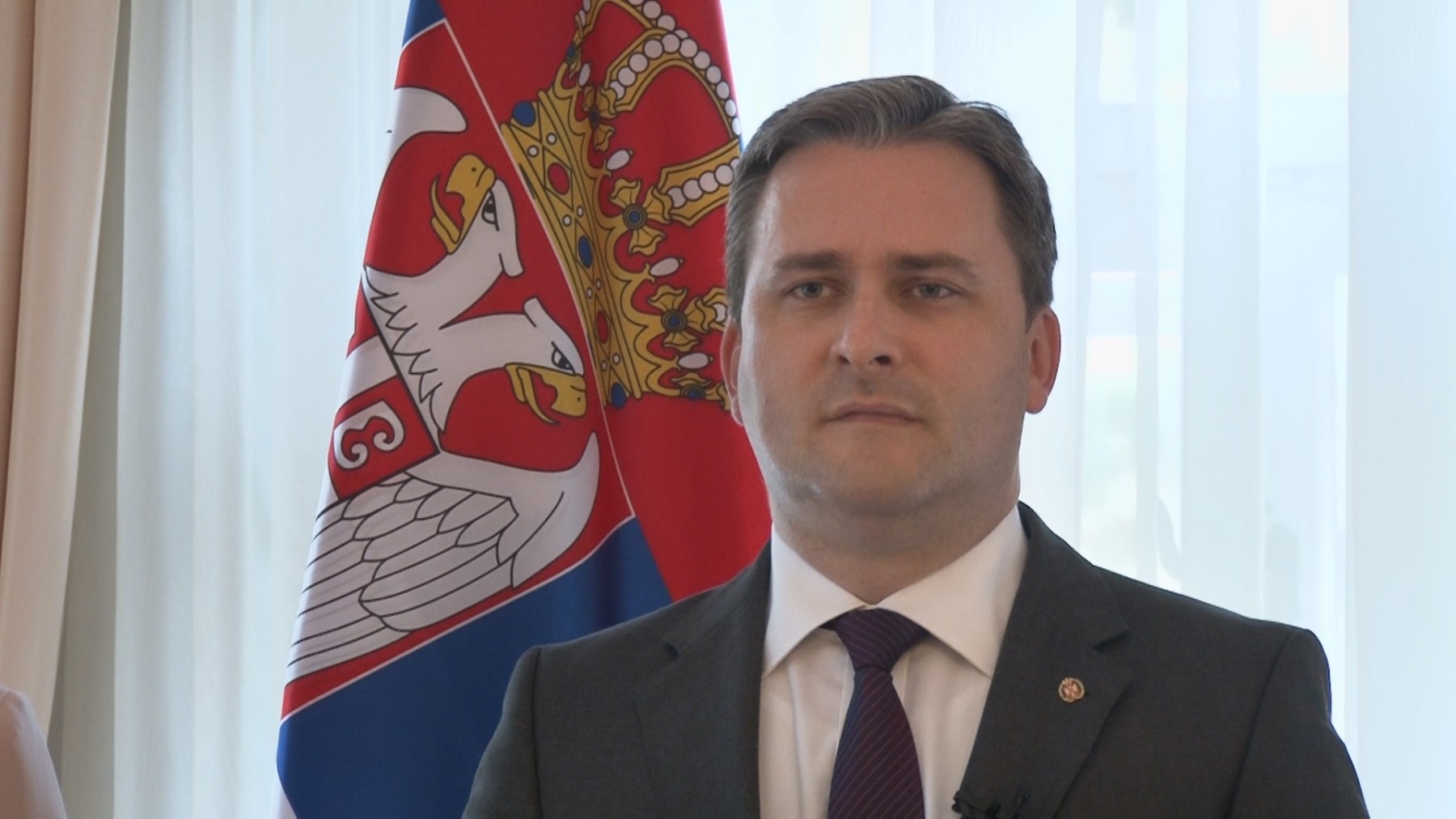
He added that the joint celebration of the Serbian Unity, Freedom and National Flag Day, on 15 September, was also discussed at the meeting.
"We agreed that the Serbian diaspora should jointly celebrate our tricolor and 15 September as the day when Serbs from all over broke through the Thessaloniki front together", Selaković said.
After the meeting, President Cvijanović said that it was important to work on strengthening the institutional ties between Serbia and the RS, and that stable and strong Serbia is important for the citizens of the RS.
According to her, today's agreement on a common relationship with the diaspora is of great importance for preserving the national identity of Serbs outside Serbia and the RS.
Cvijanović thanked for the economic assistance of Serbia during the previous years, expressing the expectation that the joint infrastructure projects will continue to be realized in the interest of the citizens of Serbia and the RS.
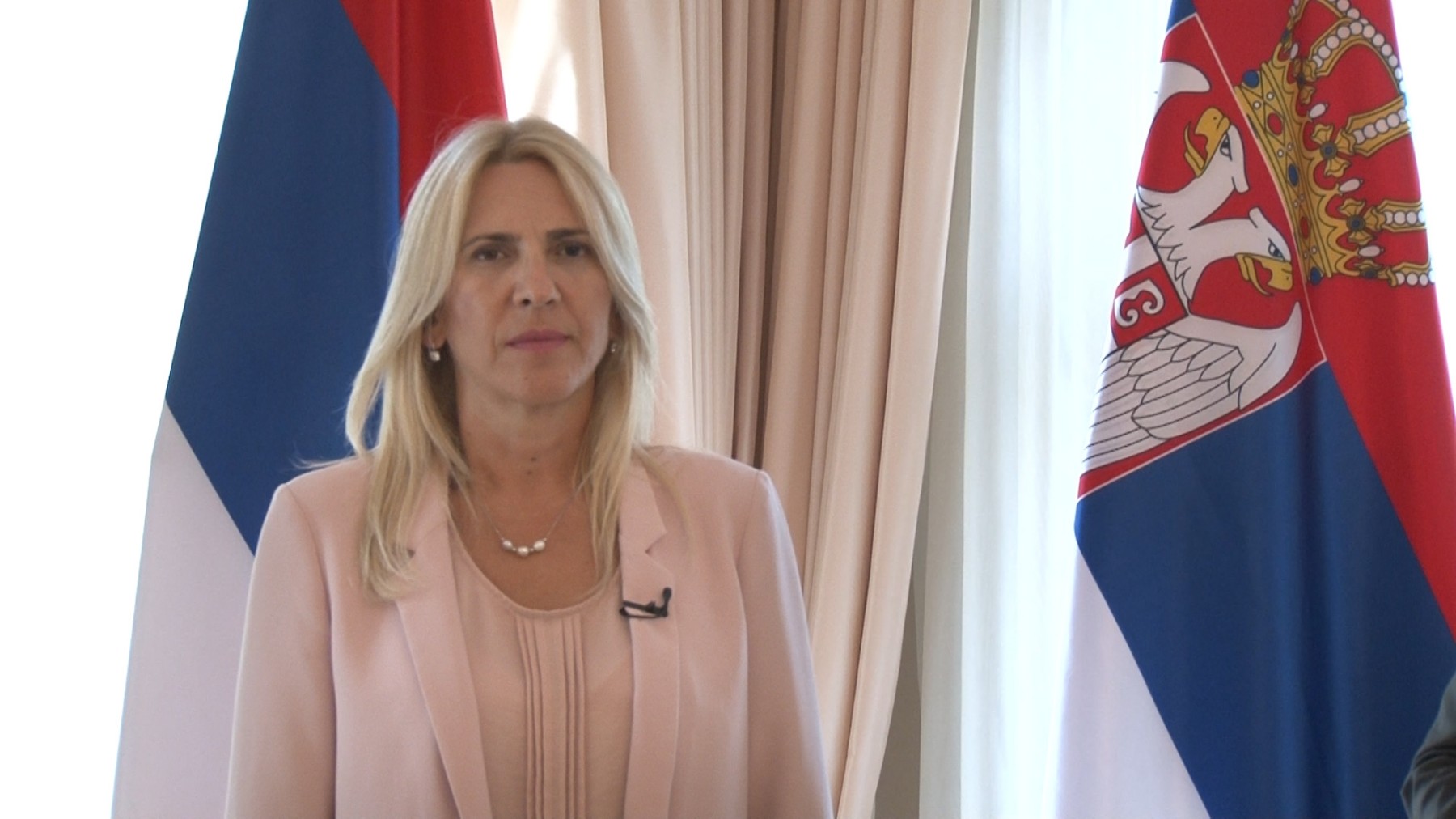
The interlocutors, among other things, also referred to the latest decision of the outgoing high representative in B&H.
"Our position is very clear: the imposed decisions and attitudes, in this case the imposed laws, have not brought anything good to anyone and have not led to any prosperity. As the Minister of Foreign Affairs of a country that is absolutely committed to the promotion of peace and stability in the region, because without that there is no prosperity, I have exactly the same position regarding this imposed decision as I stated", said Selaković.
"I want to believe that stability can be preserved, but what will happen in the future is a big question", said the head of Serbian diplomacy.
Cvijanović assessed that today's, imposed decision of the high representative is inadequate, inappropriate for democracy and backward, and that it can take B&H back two or three decades.
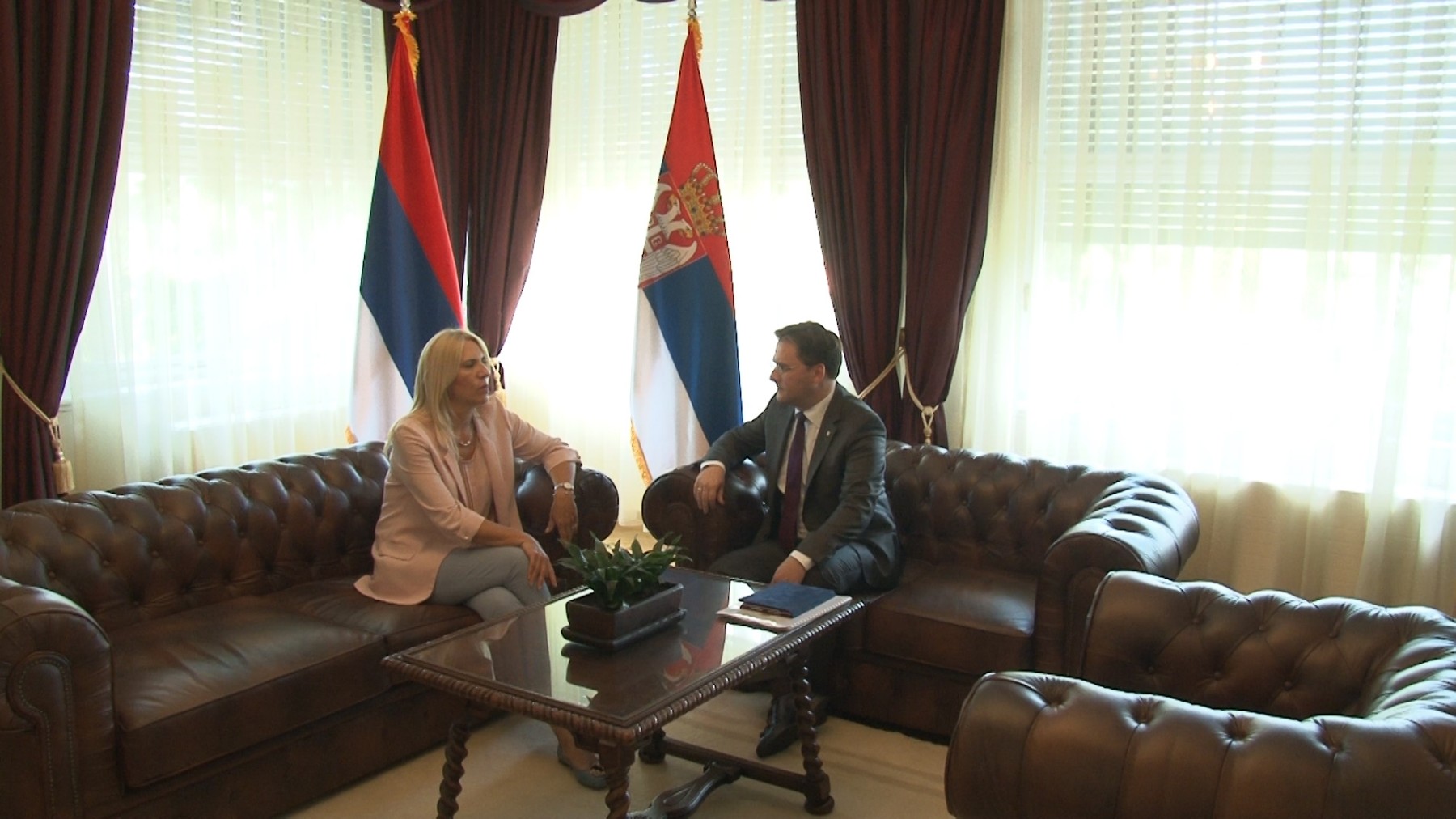
"It is unacceptable that in the 21st century you have an unelected foreigner who imposes something on democratically elected institutions or individuals. I think that this is the beginning of a difficult era… My message to the citizens and institutions in the RS is that we know what we are doing, that we are strengthening the RS, our self-awareness and our ties with Serbia", said Cvijanović.
According to her, Valentin Inzko contributed to B&H becoming an additionally hostile environment to its citizens, additionally ill-disposed towards them.
"I believe that this is a step backwards that has shown all the hypocrisy of the international community embodied in the high representative", said Cvijanović, adding that many steps back have been taken since the essential reconciliation in B&H.
"Embassies react and say that this is a step towards reconciliation, but I must say that this is a big gap in relation to what should be normal functioning in a multinational community such as B&H", said Cvijanović. |
|
|
| Serbia has achieved great success in the field of digitalizatio |
|
20 July 2021
The Prime Minister of the Republic of Serbia, Ana Brnabić, stated at a gathering dedicated to digitalization and the IT sector, which was held in New York, that since she became Prime Minister, she is most proud of Serbia's success in the field of digitalization.
Brnabić, who is on a two-day visit to the United States, said that when she was elected Minister of Public Administration and Local Self-Government in August 2016, she wanted to do everything to change the public administration and what bothered her as a citizen.
She stated that, when she took office as Prime Minister, she knew what her priorities were and that first of all, digitalization needed to be raised to a higher level, that the education reform was supposed to begin, as well as work on strengthening the economy.
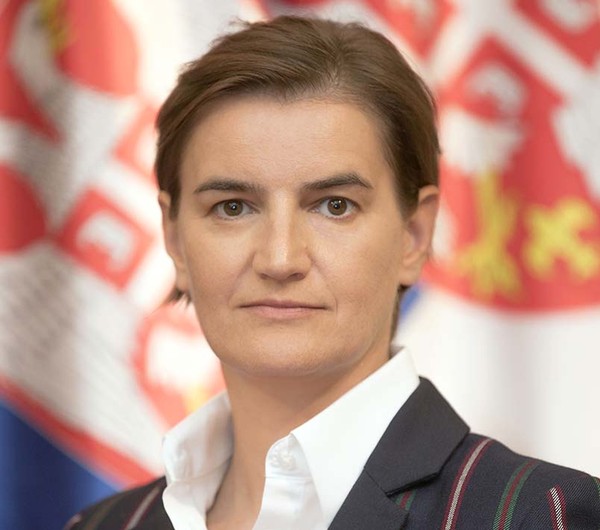
I believed in a country that believes in its people, because the Serbian people are creative. From 1 June 2017, we started working as an e-Government, i.e. we started exchanging data electronically, said the Prime Minister.
According to her, our citizens no longer had to go to, say, the Tax Administration, and since then, the public administration has exchanged 50 million documents, which means that citizens did not have to go from office to office for 50 million papers.
Brnabić pointed out that she is proud of what has been done in the field of education since she became the head of the Government, specifying that in September 2017, programming was introduced as a compulsory subject in primary schools.
Nobody believed that we could do that, but we cooperated with the private sector and some social organizations and we succeeded. At the moment, we are far ahead of numerous countries in Europe and the world, said the Prime Minister.
The Prime Minister pointed out that she was most proud when the cornerstone was laid for the science and technology park in southern Serbia, noting that so far, our country has four science and technology parks.
She pointed out that Serbia has since become one of the most successful countries in the world in the field of technology, and that according to some parameters, it is among the ten countries in the world, or among the five, assessing that this is proof that the country can change quickly.
Answering the question about vaccination, the Prime Minister emphasized that our country has never seen it as a geopolitical issue, but as a health issue.
According to her, Serbia talked with producers from both the East and the West and was among the first European countries to sign agreements with the company Pfizer-BioNTech and Sinopharm.
Unfortunately, many countries have viewed this issue as geopolitical. It did not matter to us, as long as the vaccines were safe, the Prime Minister emphasized and added that this was not the end of Serbia's success, because good organization was also needed.
Brnabić explained that the organization is another important thing in vaccination, because it is a logistically very difficult process, adding that, with the help of digitalization, success has been achieved and that everything we did in the previous years has paid off.
She stated that Serbia quickly established a system through which citizens could express interest in vaccination against the coronavirus and choose which vaccine they wanted to receive, as well as to be informed by a message when to go and get vaccinated.
Now I can log in on my phone, to see how many people have received the vaccine, how many more have registered, so that the effects of digitalization are obvious. We have made everything very efficient and easy for our citizens, the Prime Minister explained.
Answering the question of what she can tell other countries of the world about how to progress faster, Brnabić said that it is important to invest as much as possible in digitalization and education.
You need to teach children how to think, not what to think. Not all children will become IT experts, but what they can learn is an algorithmic way of thinking and how to make decisions, she said.
The Prime Minister mentioned investing in high-speed internet and providing infrastructure for start-ups as an important thing for progress, because more and more economies will be based on start-ups and innovations, emphasizing that people should be helped to start companies and implement their ideas.
Speaking about social networks, she pointed out that fake news has become the biggest problem on these networks and that it will remain so for some time.
This is the biggest challenge I face as Prime Minister, especially during the corona virus pandemic, she said, adding that social networks are also a great opportunity for politicians to communicate with citizens.
Source: www.srbija.gov.rs
Photo: www.srbija.gov.rs |
|
|
| President Vučić: We have decided – our goal is the EU, but China is an important partner |
|
22 July 2021
We have decided – our goal was and remains the EU, Serbian President Aleksandar Vučić said in an interview with the German daily "Handelsblatt", adding that there is no alternative for Serbia, but also stressing that China is an important partner for Serbia, and that the task of the state is to take care about the interests of its citizens.
He thus answered the question of what Serbia will choose once it has to choose between close relations with Beijing or the EU. Vučić emphasized that Serbia wants to become a full member of the EU.
"We are connected by history, common culture, EU members are already undoubtedly our most important partners", he explained and added that the trade exchange between Germany and China is 3,000 times higher than between Serbia and China, and, as he noted, even despite that, Serbia's business operations with China are portrayed as a problem.
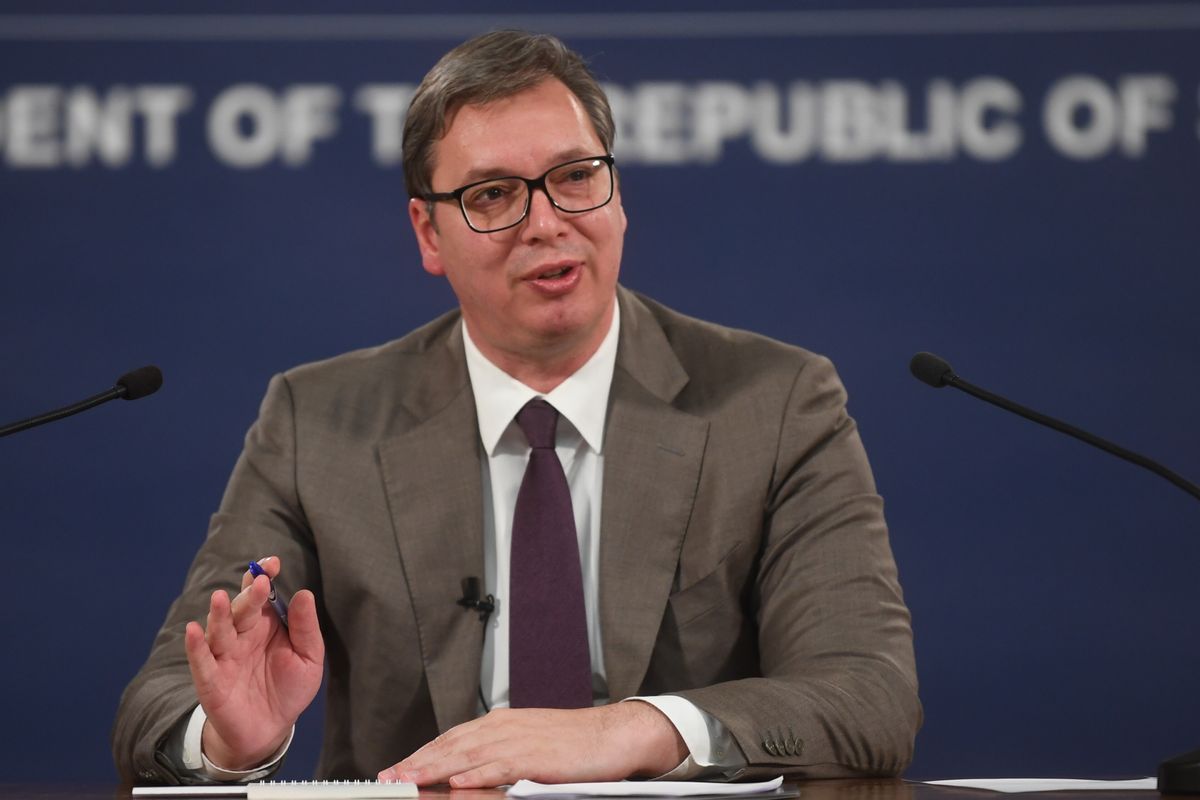
To the statement that the German Chancellor Angela Merkel did not congratulate the 100th anniversary of the Communist Party of China, and that he did so, he replied that Serbia is not Germany, but a small country. On additional insistence on what Serbia will do if it has to choose between the EU and China, he underlined that Serbia has already decided, that its goal was and remains the EU membership.
"Our biggest investors are from the EU. The EU accounts for 67% of our trade while 17 percent of the trade is with countries of the region that are all on the way to the EU. We cannot survive without the EU", he added.
"But can we do a lot of good things with China – of course. And we do that, just like Germany does", Vučić pointed out, and to the remark that the quality of the Silk Road projects was being criticized, primarily because of Chinese workers, he answered that the quality of roads or bridges, which Serbia is building with China, is excellent.
"We give jobs to those who submit the best offer to us. That is why I tell Europeans who criticize Chinese projects in our country – offer us a project for one euro more and you will get it", he emphasized.
In that regard, he pointed out that Serbia is building a railway to Northern Macedonia with 600 million euros of EU aid, stating that that offer was better than China's.
"There is often talk of a 180-kilometer railway to Budapest through the territory of Serbia, which is financed by China. But the railway that is being built with the help of the EU from Belgrade to the northern Macedonian border is twice as long and no one is talking about it. It is all too political", he stated.
Asked whether he welcomes the plans of the EU and the USA regarding an alternative initiative to the Silk Road, Vučić said that he supports everything that brings advantages to our region.
"The Chinese want to expand their presence everywhere, but many processes in the West are, frankly, more efficient and without problems. We still have a lot to learn from the West, but we are getting there", Vučić said.
He pointed out that China was an important partner for Serbia and added that when the consolidation of state finances began in 2014, our country received good conditions from China for development projects.
He also stated that a competition for a copper mine was announced in eastern Serbia, at the request of the EU, that no European company had made an offer for six months, and that it had then been taken over by the Chinese.
"Our job is to take care of our people", he said.
He reminded that the Serbian economy grew by 52% in eight and a half years, which for the EU means that Serbia could be a strong member and engine for the entire region.
Explaining how Serbia is developing so well economically, he pointed out that Serbia has an excellent workforce, which speaks English, that society and administration are digitalized, and that it has the most flexible labor law in Europe, as well as consolidated public finances.
He reminded that previously the public debt was at 78% of GDP, and that today it has been reduced, thanks to the strong growth of the economy, to 52%.
"We can afford to give investors an incentive to come", he added, emphasizing that Serbia offers investment assistance, but that, for example, subsidies were not the motive for the arrival of the development center of the company Continental.
He pointed out that, five or six years ago, only Serbia started using the dual education system in this region, which Germany, Switzerland and Austria also use, that tens of thousands of people are in dual education, and that this is appreciated by foreign investors, who, in addition, can work closely with universities as well.
Germany, he stated, is the most important trade partner and the largest investor.
We started with the arrival of small textile companies from Turkey, and now primarily large German companies are coming. Today, 71,000 people work in German companies in Serbia", he explained.
Vučić said that the European perspective is very important for investors, stating that Nidek, Toyo Tires or Mitsubishi are coming from Japan to Serbia because our country is on a stable European path.
Asked if he believes that Serbia will become an EU member in the foreseeable future, he said that he does not complain.
"It is certain that if we had received 45 billion euros of EU aid, we would have been much further economically. Instead, we received 1.6 billion euros from the EU. We are used to achieving our successes on our own", said Vučić.
The President of Serbia reminded that in Croatia, salaries used to be 2.2 times higher than in Serbia, and today they are only 1.7 times higher.
"We are closing the gap with our own efforts. If we were to become a member of the EU, then we would certainly not ask for the biggest subsidies", he assures.
He said that the Serbian path follows the German path to Europe, and that Serbia wants a fair chance.
"I believe Merkel's words. She is at the end of her term and I would not have to praise her anymore. But she gave us stability, freedom of travel to the EU, helped us with the migrant crisis in 2015, and asked the Minister of Economy Altmeier and others to work closely with us", he reminded.
Asked if there were any indications that the new German government would support Serbia in the same way, Vučić expressed confidence that it would be the same.
"I know Armin Laschet, I talked to him while he was the Minister-President of North Rhine-Westphalia. He is very smart and understands the situation in the Balkans, and he will certainly continue Merkel's policy towards our region as the new chancellor", he added.
Vučić also expressed his belief that Russia, if Serbia's accession to the EU were concretized, would not react similarly as in the case of Ukraine, as this is a sovereign decision of Serbia.
To an additional question in this regard, Vučić pointed out that whenever he met with Vladimir Putin, and there were 18 or 19 meetings, he told him that he was grateful for the traditionally close friendship with Russia, but also that Serbia is on a clear course towards the EU.
"He asked if it was our choice and I answered that EU membership is indeed our goal", he added.
When it comes to "Kosovo", Vučić emphasized that a compromise is needed regarding this issue.
"Only in this way can there be sustainable peace. Serbia wants peace, me as well. Let's stop with the madness of the past. Only then can the whole region become the engine of new growth for Europe", said Vučić.
Source: Tanjug |
|
|
| Selaković invited representatives of members of the NAM to gather in Belgrade in October |
|
13. July 2021.
The Minister of Foreign Affairs of the Republic of Serbia, Nikola Selaković, spoke at the Ministerial Conference of the Non-Aligned Movement (NAM) today and on that occasion sent an invitation to the representatives of the members to gather in Belgrade on 11 and 12 October, when the 60th anniversary of the first Conference of the Non-Aligned Movement held in Belgrade in 1961 will be marked.
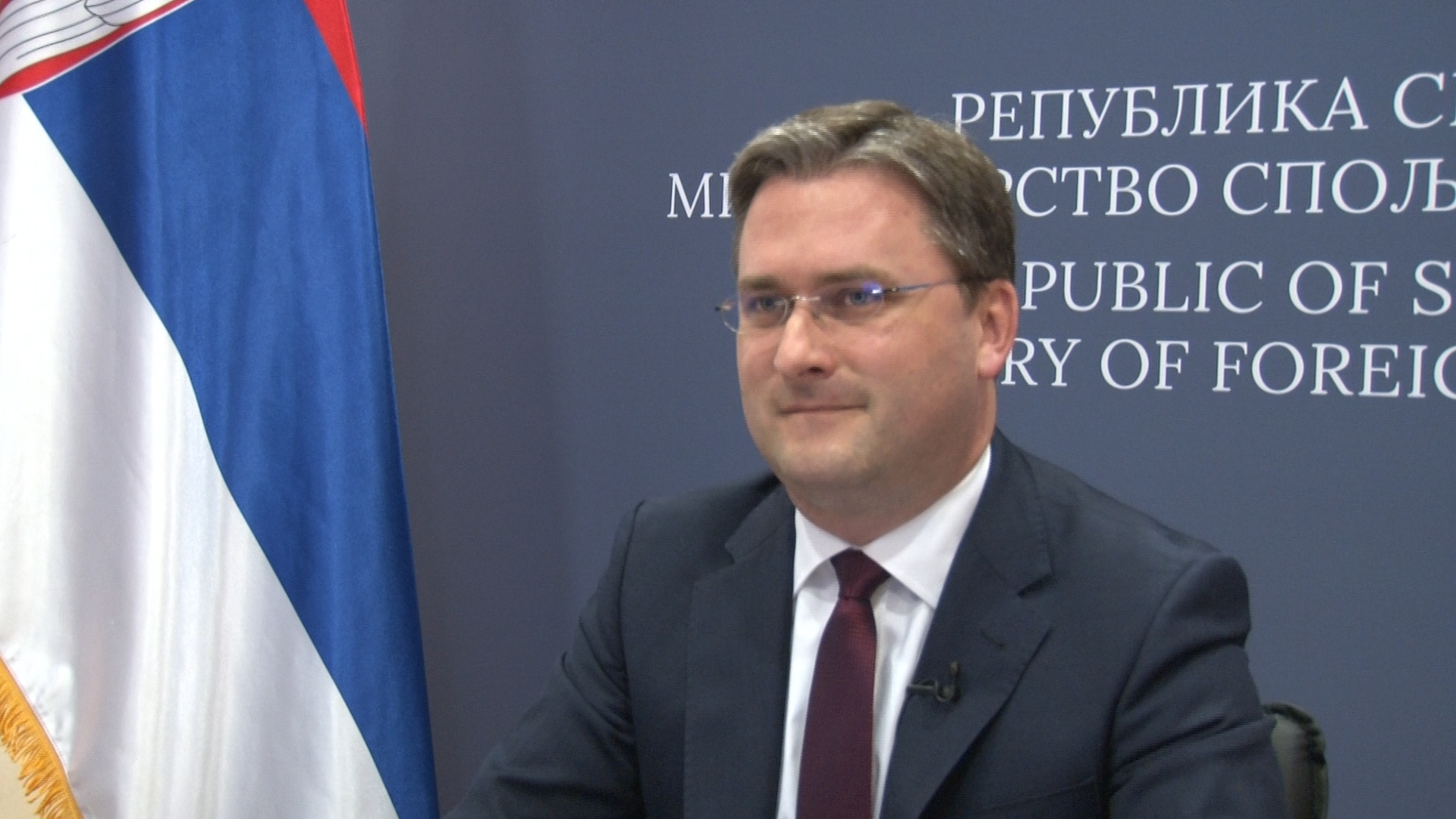
Selaković informed the participants of the conference that Serbia would organize this important jubilee of non-aligned countries together with Azerbaijan – which is currently chairing the NAM.
In his address, Selaković reminded that the former Yugoslavia and President Tito, as co-founders of the Movement, gave their contribution to creating a vision of a different world, and that Serbia, as one of the successors of Yugoslavia, is proud of that part of its history.
"The spirit of non-alignment is based on equality, freedom, lasting peace, sovereign equality of states and peaceful cooperation of all peoples, and these values are also woven into the state-building foundations of Serbia", the minister said.
Selaković said that the Non-Aligned Movement throughout its history has been a beacon of freedom to all those who sought the right to existence and prosperity in a world that was often ruled, not by the force of law, but by the law of force. He assessed that even today we find ourselves in times of serious global challenges in which the Movement has the opportunity to reaffirm its libertarian traditions and commitment to a world of equals.
"Serbia, as a militarily neutral and politically independent state, will give its most sincere contribution to such goals of the Movement. We hope that by strengthening mutual ties and cooperation, as a group of states and peoples that share the same values and interests, we will strengthen our common capacity to face the challenges of tomorrow. And the challenges are already before us", Selaković pointed out.
The Minister emphasized that international law should be a pillar of political and security architecture of the world, and added that Serbia respects the commitment of the members of the Movement towards the goals and principles of the UN Charter.
"Many members of this movement are aware that by insisting on international law, they are working in their own favor and in favor of preserving regional and global stability," the minister pointed out.
Selaković also said that the COVID-19 pandemic clearly showed that inequality, lack of solidarity and empathy in the world have become very obvious in the roughest way.
"Serbia is eternally grateful to all the countries which, such as Azerbaijan, helped us in difficult times. We later extended that chain of solidarity by making vaccines available, not only to our citizens, but also to others in the region. We supported our neighbors with the belief that solidarity is the best investment in a common future", the minister concluded. |
|
|
| Serbian children from the region visit the Ministry of Foreign Affairs of Serbia |
|
8. July 2021.
The head of Serbian diplomacy, Nikola Selaković, welcomed the participants of the Summer Camp for Serbian children from the region at the Ministry of Foreign Affairs today, and on that occasion, he introduced the young guests to his work and the way the Ministry functions.
Selaković expressed satisfaction that the participants of the Summer Camp are visiting the capital of Serbia and said that Belgrade is the capital of all Serbs.
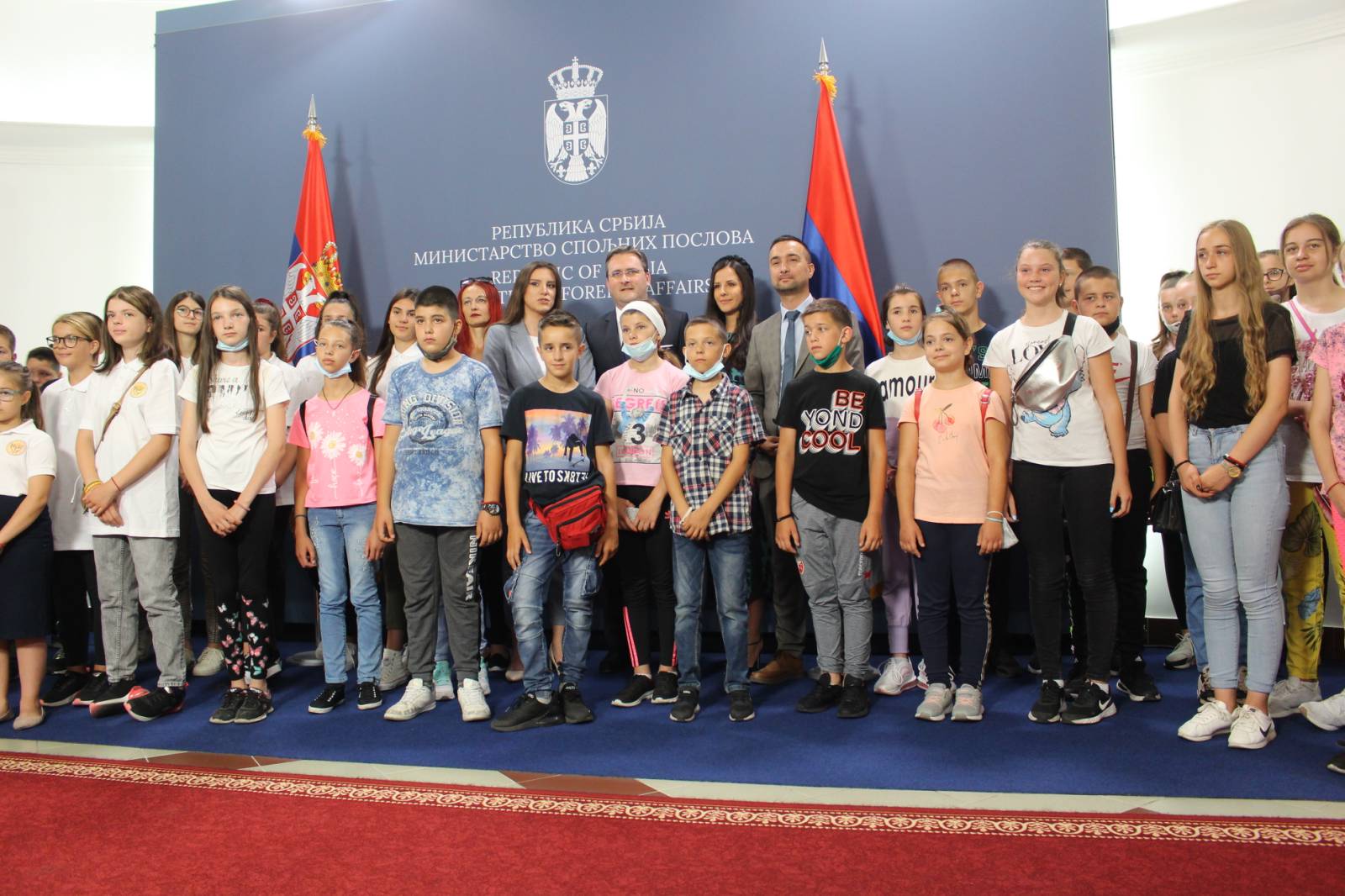
"Here on these walls, you can see the continuity of our statehood in the new century. You can see what stands behind us, so that we may know what we are fighting for and what we will one day leave to our children. I have two sons and one daughter, and everything I do, I do for them and the future of every child in Serbia and every Serbian child", said Selaković.
The Minister pointed out that Belgrade is a city that is rapidly changing and growing, a city to which everyone from the Balkans is flocking, and wished Serbian children from the region to come and get to know Serbia as often as possible.
Speaking about the sights of Belgrade, Selaković singled out the Temple of Saint Sava and underlined that we are all very proud of the most beautiful Orthodox temple in the world.
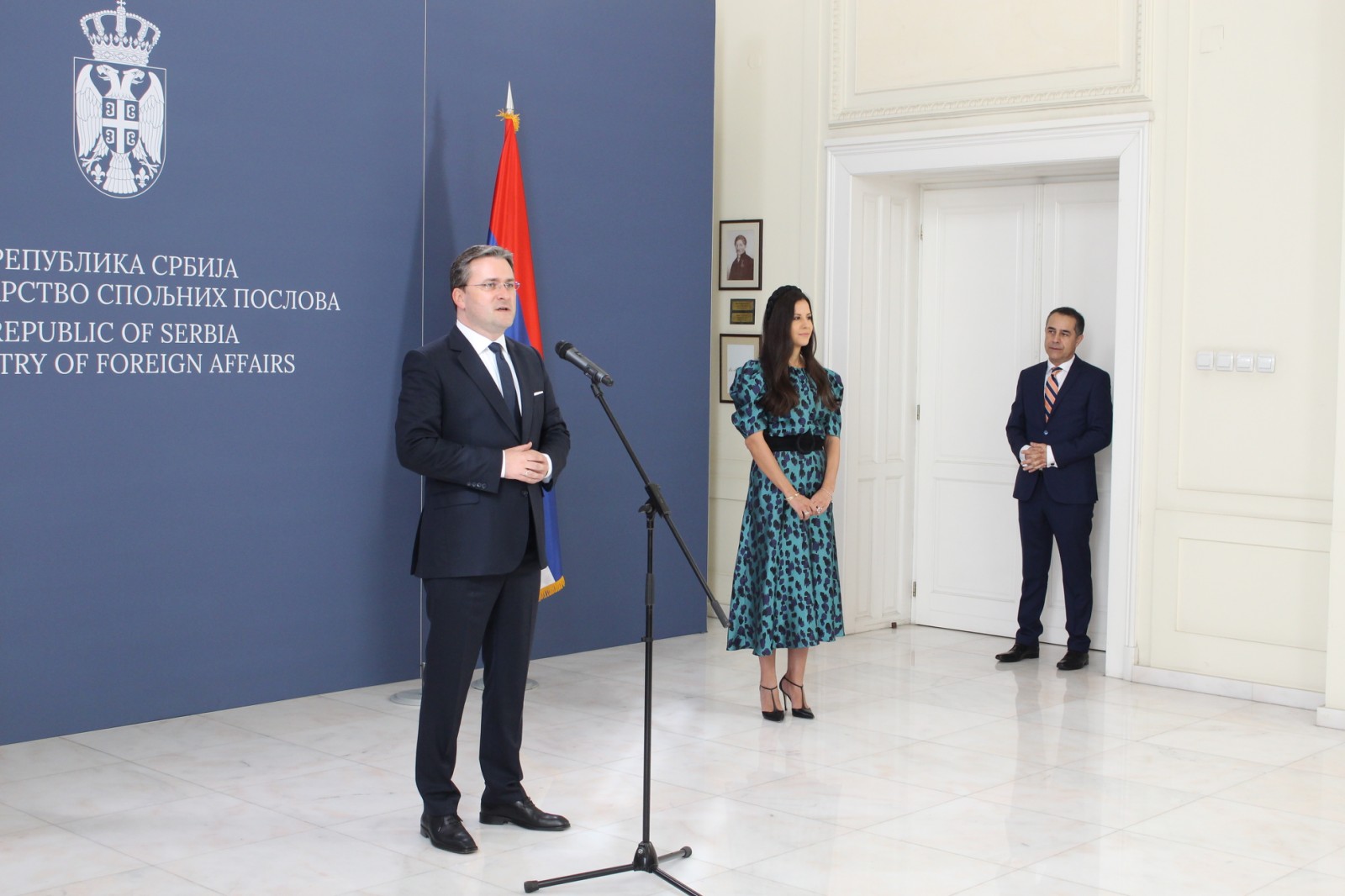
"I want you to see Novi Sad and Nis, Vrnjacka Banja, Studenica, Drvengrad, Zlatibor, Sombor, Vrsac, to see the beautiful places that exist here and what wonderful country our Serbia is", said the minister.
Selaković especially referred to the inscription on children's T-shirts "We are learning Cyrillic", and said that it was important for them to learn other languages as well, but not to forget our Serbian language and the Cyrillic alphabet.
"If we Serbs do not keep the Cyrillic alphabet, no one will save it for us", the minister said.
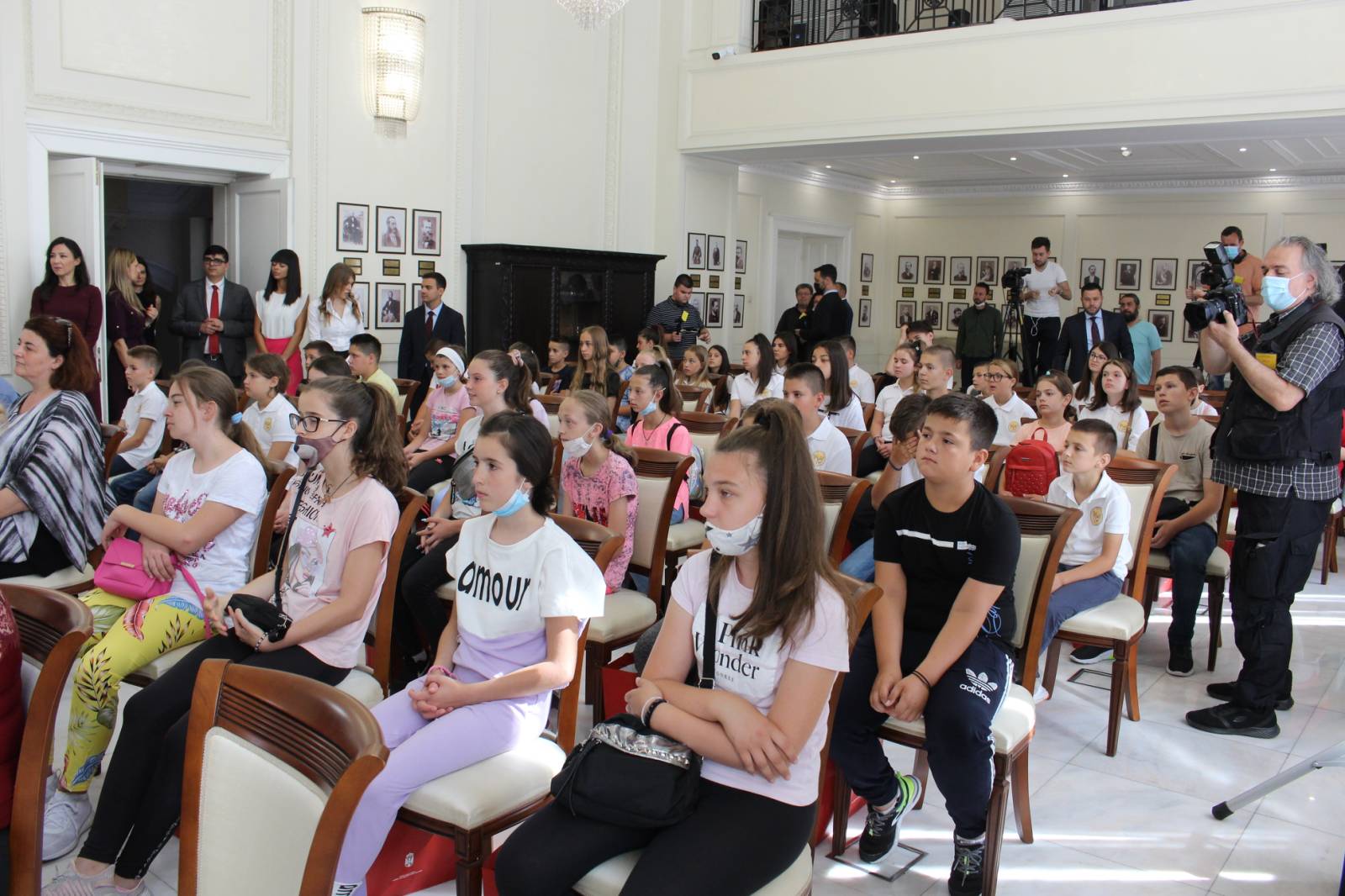
Noting that this group of participants in the Summer Camp also includes children from Dalmatian Kosovo, Selaković said that Serbs cannot escape from their Kosovo, nor Kosovo from them.
"It is a part of our soul, our identity and genetic code, it is the motive of our struggle and the life of our nation", the minister emphasized.
Also, the Minister expressed satisfaction that participants of the Summer Camp had their priest with them and emphasized that this shows that where the Serbian church survives, our people also survive.
Selaković wished the organizers of the Summer Camp to bring as many children as possible to Belgrade, saying that the Ministry of Foreign Affairs will always have their doors open for them.
"I want you to be exemplary citizens in the country in which you live, but also to love and protect your Serbian family, Serbian Orthodox name, Cyrillic alphabet and our Serbian language", Selaković concluded.
The wife of the President of Serbia, Tamara Vučić, also welcomed the participants of the Summer Camp.
"Apart from being good students and fulfilling your obligations, each of you also has a hobby. Someone is involved in sports, music, singing, folklore, or acting. If I have to give you advice today, it is to keep your hobbies. They will help you in the period of adolescence to direct that strong energy in the right direction", said Tamara Vučić.
She also wished that they would bring good emotions and beautiful experiences back from Serbia, which would always bring them back here.
The group that visited the Ministry included 44 children, aged 7 to 14 from Uzdolje, Vir, Kula Atlagic, Islam Grcki, Raducic, Nunic, Zadar, Bribir, Djevrske, Ridjan, Odzak, Bosansko Grahovo, Drvar, Bosanski Petrovac and Glamoca.
Today, the children had the opportunity to visit the Museum of Serbian Diplomacy, which is located in the building of the Ministry of Foreign Affairs, where they were introduced to the works of great Serbian diplomats.
The Summer Camp for Serbian children from the region is being organized in the period from 4 to 9 July 2021 in Novi Sad and Belgrade. The organizers of the camp are Member of Parliament Sanja Lakić and Duško Ćutilo, director of the Provincial Fund for Assisting Refugees, Displaced Persons and for Cooperation with Serbs in the Region. |
|
|
| Serbia strongly supports Berlin Process |
|
5 July 2021
Prime Minister Ana Brnabic participated today in the online Summit of Leaders of the Berlin Process, which discussed the concrete results achieved during its seven-year term, plans for the next period and initiatives aimed at providing support Western Balkans on its way to the European Union.
The focus of the summit was on building a common regional market related to four fundamental freedoms: free movement of people, goods, services and capital, for which the Action Plan was adopted in November last year, and from which the region would have special benefits.
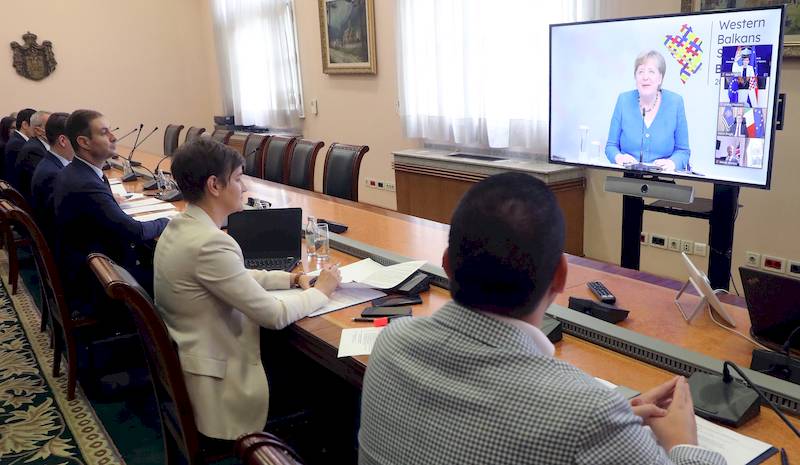
The summit said that the transport and energy infrastructure has been expanded in recent years and connected to the roads of the European Union, and praised the implementation of the agreement on the abolition of roaming fees in the Western Balkans, which began this month.
An important project of the process is the Regional Office for Youth Cooperation (RYCO) in order to connect and build understanding and tolerance in the region.
The activities of the Regional Cooperation Council (RCC) and the Secretariat of the Central European Free Trade Agreement (CEFTA) were also praised for their efforts to implement the Common Regional Market Action Plan.
Assessing that the Berlin Process is firmly based on the fundamental belief that the economy of the Western Balkans is part of Europe, German Chancellor Angela Merkel pointed out that it greatly contributes to stability and connecting the Western Balkans region, which is also in the interest of the European Union.
In her address today, Prime Minister Ana Brnabic thanked German Chancellor Angela Merkel for her strong support and active approach to regional cooperation.
Thanks to the support of Germany and Chancellor Merkel, but also to the internal initiatives of the representatives of Serbia, Albania and North Macedonia, the Prime Minister explained, the implementation of the Action Plan will enable further expansion of economic and trade cooperation in the region, which will make it more attractive for foreign investors.
Brnabic pointed out that Serbia strongly supports the Berlin Process, not only for the purpose of economic development of the region, but also as an idea of connecting and unifying the Western Balkans and its approach to the European Union.
She concluded that support in the region was particularly visible through solidarity with neighbours during the pandemic and assistance with vaccines and medical equipment.
The summit, opened by German Chancellor Angela Merkel, was attended not only by representatives of the region, but also by Slovene Prime Minister Janez Jansa, European Commission President Ursula von der Layen, Austrian Chancellor Sebastian Kurz, French President Emanuel Macron, Italian Prime Minister Mario Draghi and Polish Prime Minister Mateusz Jakub Moravjecki and Secretary General of the Regional Cooperation Council (RCC) Majlinda Bregu.
Source: www.srbija.gov.rs
Photo: www.srbija.gov.rs |
|
|
| Continuation of European integration along cooperation with countries of region |
|
2 July 2021
Prime Minister Ana Brnabic said today that the Western Balkans region should continue with European integration, but that it should also focus on regional cooperation that can improve the quality of life of citizens.
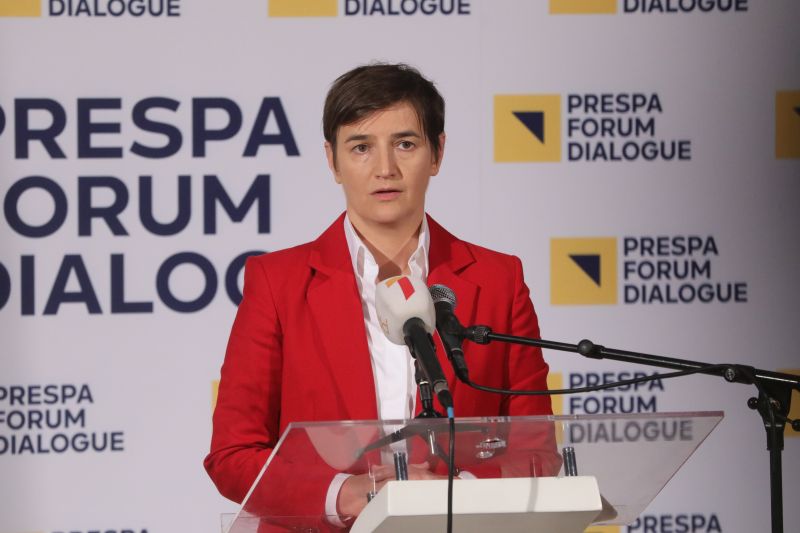
Speaking at the Prespa Forum in Ohrid, Brnabic stated that today's abolition of roaming tariffs among mobile operators is one of the concrete things that citizens benefit from, pointing out that difficult political issues should be kept in mind, such as the dialogue between Belgrade and Pristina, but that there are so many other things that can be done for citizens.
We owe that to future generations, the Prime Minister said, adding that the continuation of quarrels in the region does not bring good to anyone.
At the panel, at which topic was the synergy of the European Union and the United States, she reiterated that Serbia is a country that is committed to European, but not Atlantic integration, adding that in that matter, it differs from other countries, except Bosnia and Herzegovina.
We want to enter the European Union, but not NATO. We are a military-neutral state that has great bilateral relations with the United States of America in all fields, Brnabic underlined.
The Prime Minister commented on the statement of Albanian Prime Minister Edi Rama that he is no longer frustrated and depressed because of the dynamics of European integration by saying that no one is frustrated any more and that this brings some new things in terms of regional cooperation.
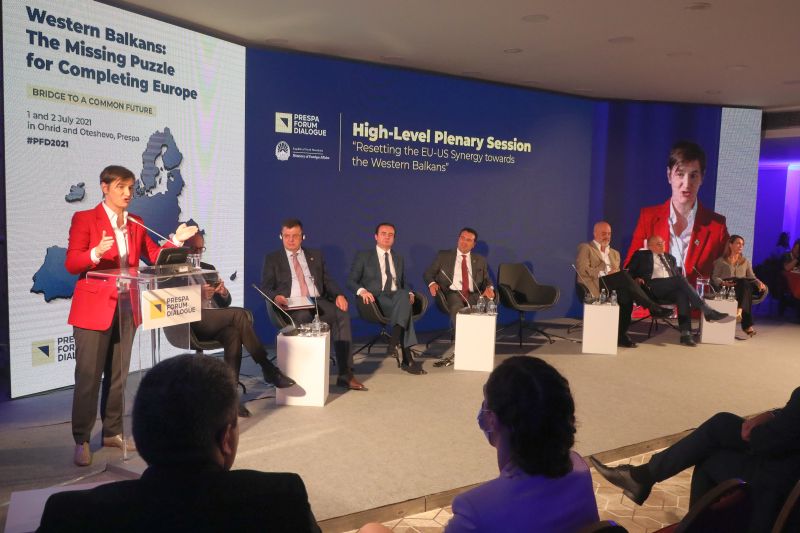
All countries must continue to do what is needed in terms of continuing the European path, but also to cooperate regionally, because they have an influence on that, she said.
Whatever you do, it all comes down to the fact that each EU Member State individually decides whether progress has been made, and that is becoming an increasingly complex and complicated process day by day, the Prime Minister stated.
According to her, it is no longer a question of European values, progress in key areas and bilateral issues, but of "linguistics and history".
In addition to Brnabic, Albanian Prime Minister Edi Rama, Prime Minister of the Provisional Institutions in Pristina Albin Kurti and others also took part in the panel.
Source: www.srbija.gov.rs
Photo: www.srbija.gov.rs |
|
|
| Selakovic: Cooperation and good-neighbourly relations are in the general interest of the entire region |
|
17 June 2021
Minister of Foreign Affairs of Serbia Nikola Selakovic took part today in Antalya in the Meeting of Ministers of Foreign Affairs of the South-East European Cooperation Process participants.
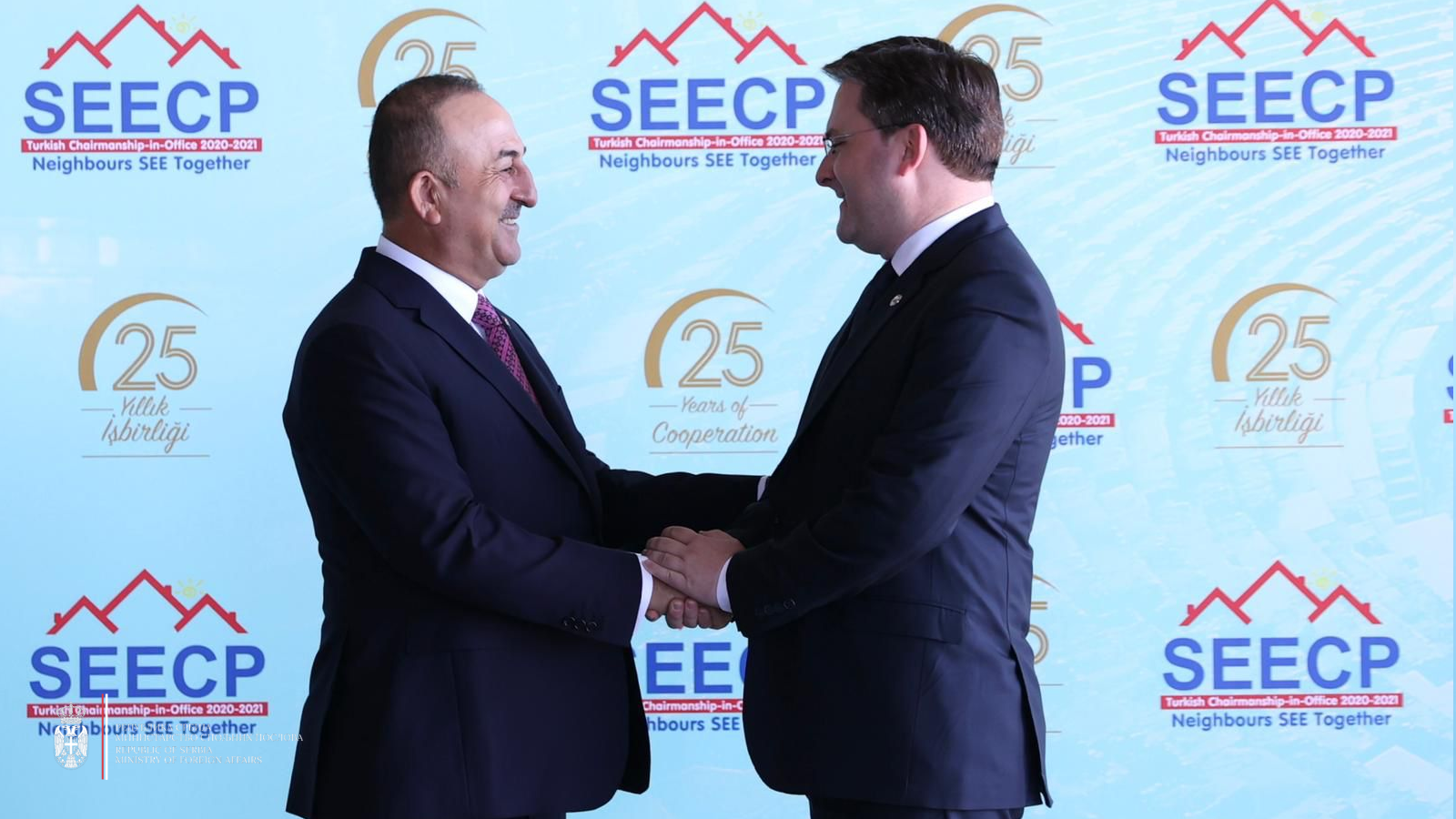
Selakovic underlined that the key foreign policy and strategic goal of our country was to achieve full membership of the European Union.
“I hope that the European Union will continue to support the process of integration of SEECP participants into the EU, which will, I am confident, bring lasting stability and prosperity to the region and help the consolidation and development of Europe as a whole”, Selakovic said.
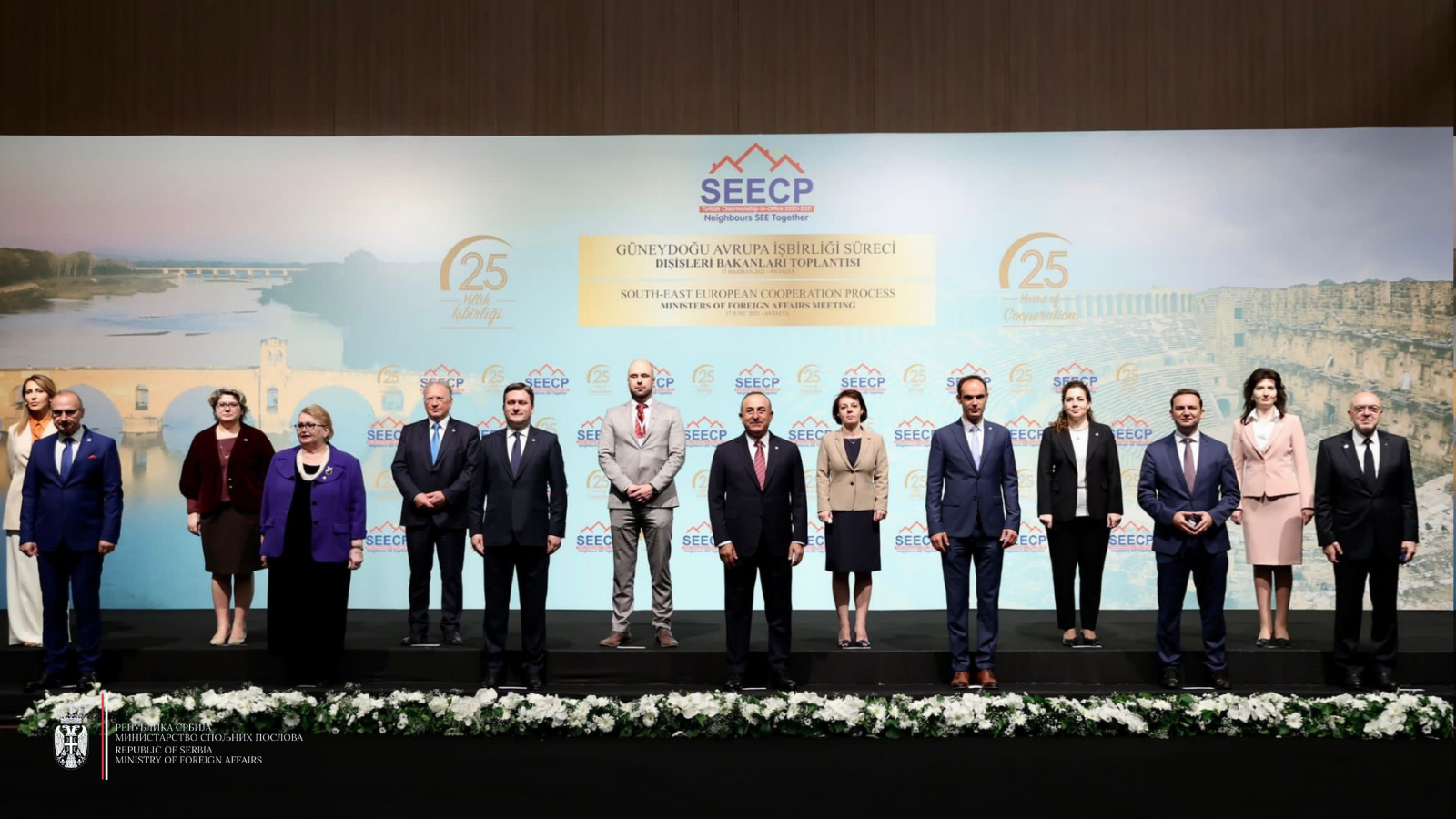
The Minister pointed out that peace and stability had no alternative, representing the guiding star on the path of our region towards the European Union. Furthermore, he emphasized in particular that Belgrade was determined to resolve all open issues through dialogue and in good faith - as a responsible and predictable partner, and in line with the principles of international law.
“We need to make sure that what is agreed upon is also respected and fulfilled on the ground later on, because our agreements primarily concern the well-being of our peoples, but they also reflect who we are and what kind of future we want”, the Serbian Foreign Minister said.
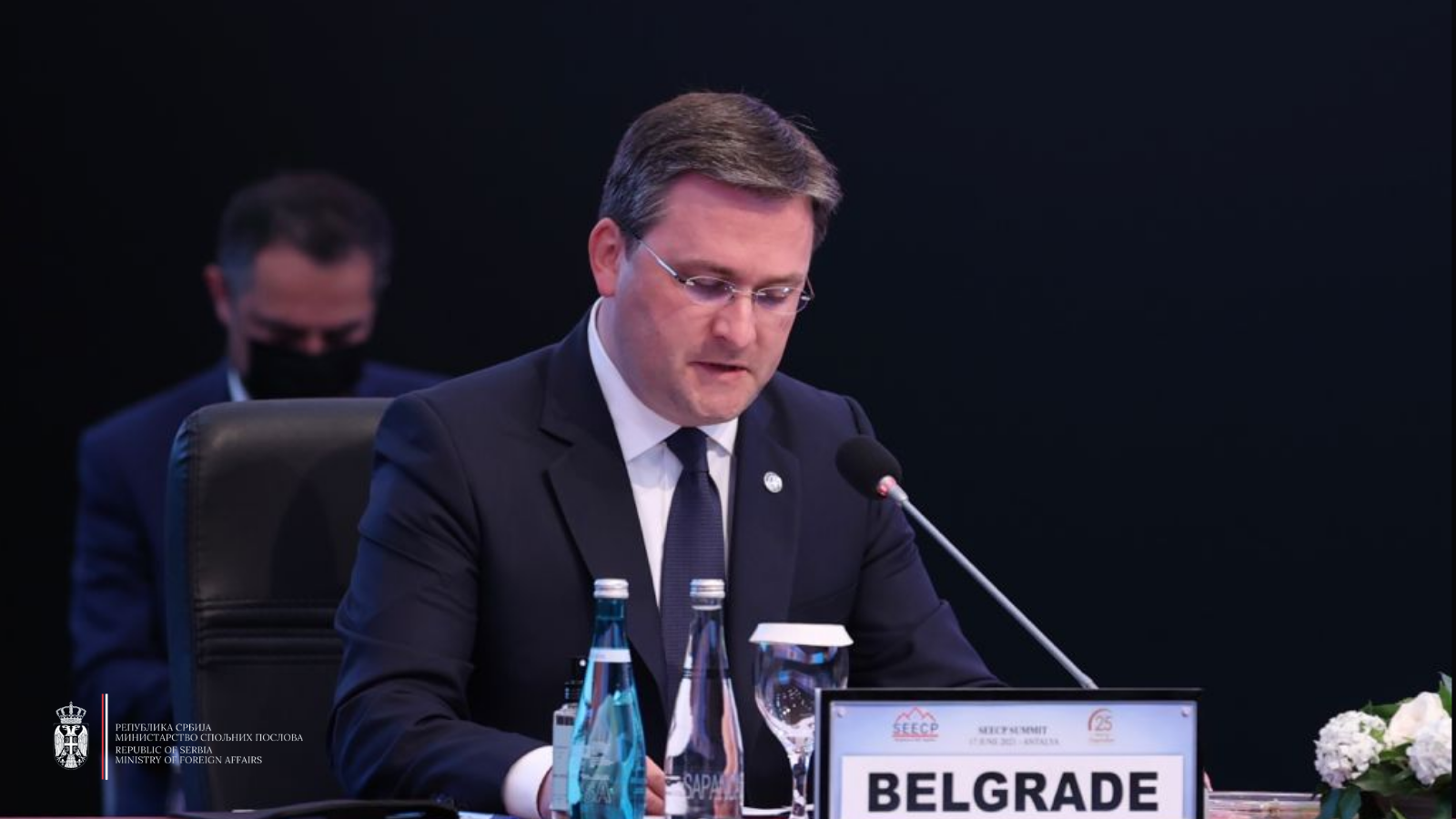
Selakovic stated that Serbia devoted full attention to the promotion of regional cooperation and good-neighbourly relations, stressing that the strengthening of economic ties within the region also contributed to the relaxation of existing political relations.
“Through participation in various formats we have committed to undertake the necessary reforms and promote regional cooperation in numerous areas, and among them, as particularly important and being in the general interest of the entire region, I would like to underline the joint infrastructure projects in the transport and energy sectors”, Selakovic said.
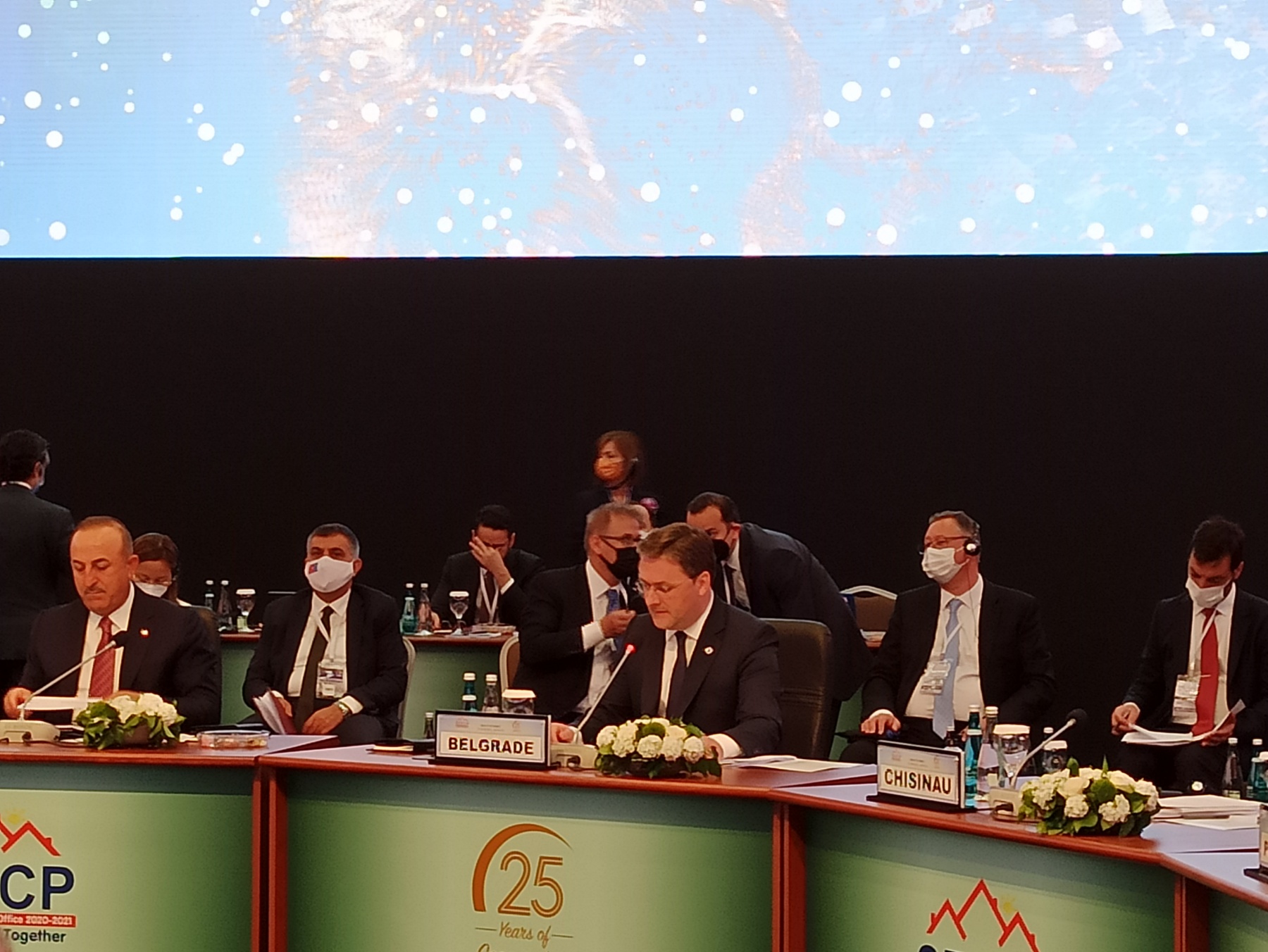
As concrete positive results of regional cooperation, the Minister underlined the Central European Free Trade Agreement (CEFTA), the Western Balkans Fund, the Regional Youth Cooperation Office, the Southeast Europe Transport Community, the Western Balkans Chamber Investment Forum, and the signing of the "Agreement on the Price Reduction of the Roaming Services in the Western Balkan region".
Selakovic commended in particular the establishment of “Green Lanes” in our region during the coronavirus pandemic, while pointing out that it was now necessary to enable their extension to border crossings with neighbouring EU member states.
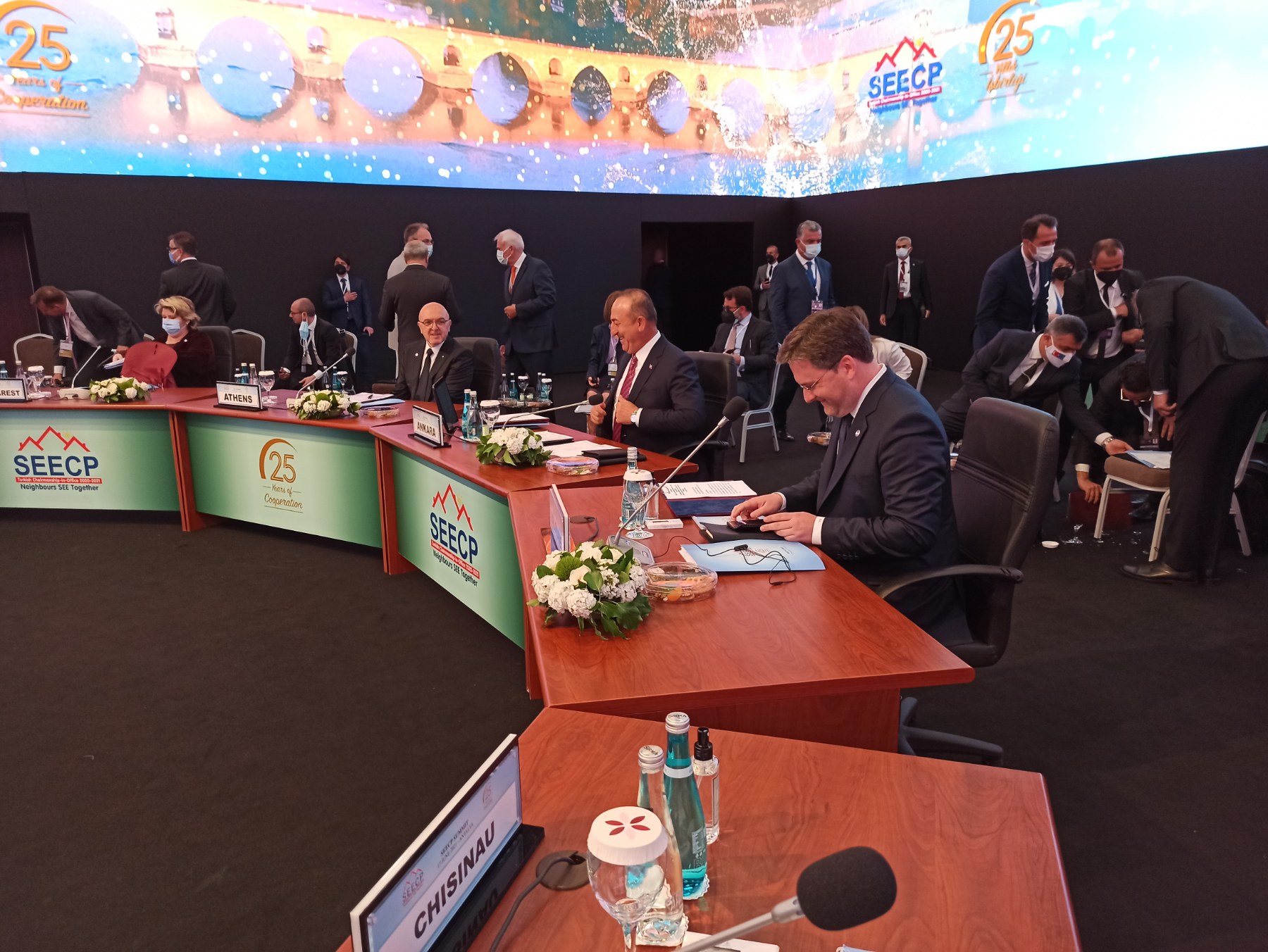
The Minister also stated that Serbia welcomed the Common Regional Market Action Plan and added that this document was largely based on concrete proposals stemming from the initiative launched by Serbian President Aleksandar Vucic in cooperation with the Prime Ministers of Albania and North Macedonia.
In addition, Selakovic emphasized that Serbia had demonstrated its commitment to enhancing regional cooperation with its neighbours in the region - by sending vaccine shipments and enabling vaccination in Serbia,
“So far, Serbia has sent 120,000 vaccines to the region and vaccinated around 65,000 citizens from countries of the region on its territory, which means that we have provided a total of around 200,000 vaccines for our neighbours”, the Minister said.
In his statement, the Head of Serbian diplomacy also touched upon the importance of the Regional Cooperation Council which, as a pivotal regional initiative, provided concrete results and contributed to achieving economic progress and deepening cooperation, and said that he expected that the implementation of the South East Europe 2030 Strategy, once it is adopted, would benefit our region.
Selakovic congratulated Turkey on its successful chairmanship and wished Greece every success as the upcoming chair. |
|
|
| Austria-Western Balkans Summit in Vienna without concrete agreements |
|
18 June 2021
Prime Minister Ana Brnabic stated today that the representatives of the Western Balkan countries in Vienna agreed that everyone feels equally frustrated when it comes to European integration and the EU's attitude towards the countries of the region, adding that they failed to agree on other issues, such as the declaration and regional agreements.
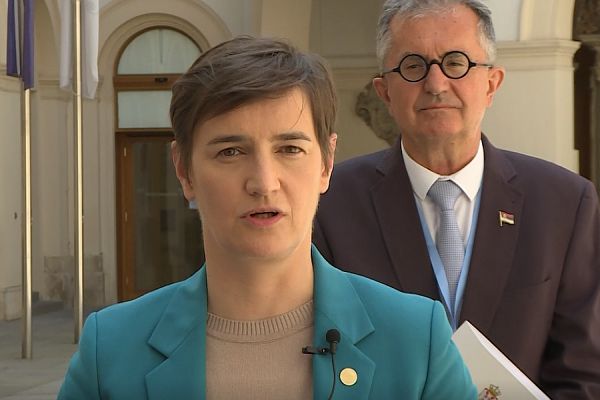
Brnabic told reporters in Vienna, where she participated in the Austria-Western Balkans Summit, organised by Austrian Chancellor Sebastian Kurz, that of all the problems that exist when it comes to European integration, the two biggest ones are the fact that there are EU member states that are absolutely against enlargements and the issue of setting new precedents.
According to her, it is a political game that will be counterproductive because people will get tired.
I think it would be more honest for those member states to say that there is no enlargement for them, but I do not believe that will happen, the Prime Minister emphasised.
The second problem, as she pointed out, is setting a precedent, and the latest is that members resolve bilateral issues using European integration.
When asked if there are joint declarations, Brnabic answered that they do not exist, unfortunately, and that the declaration of Chancellor Kurz and EU representative Miroslav Lajcak was accepted.
Until the last moment, we tried to find a compromise, Serbia agreed to many things, but somehow in the end, Kurti removed that declaration from the table, Brnabic explained.
She mentioned that this is a new reality and that it will not be easy, and added that she believes that now more and more partners in the EU understand how difficult it all is.
The Prime Minister explained that two completely different signals arrived from Pristina in just two days, and in that sense she stated that yesterday Vjosa Osmani allowed the adoption of much more serious documents, the Strategy for Southeast Europe, where "Kosovo" is mentioned, not only with an asterisk. but also with a footnote and referred to the Brussels Agreement, while today we have a different message.
Speaking in general about what was discussed during the Summit in Vienna, Brnabic said that it was challenging to talk about regional stability and hear something new, considering that they are meeting for the third time in a few days.
She expressed gratitude to Austrian Chancellor Sebastian Kurz for organizing the Summit, as well as for always openly showing commitment to the stability of the region, but also sincerely pushing the EU enlargement agenda. www.srbija.gov.rs |
|
|
| Meetings in Antalya successful for Serbia |
|
Prime Minister Ana Brnabic stated today, after the plenary meeting of the South-East European Cooperation Process (SEECP) held in Antalya, that the Joint Declaration, the Strategic Document for South-East Europe and the annual report of the Council for Regional Cooperation were unanimously adopted at this meeting.
Speaking to the press, Brnabic said that the plenary meeting was marked by two things – the fact that even Pristina voted for all documents, although Kosovo is marked in them with an asterisk, and also that President of the interim institutions in Pristina Vjosa Osmani referred to the Brussels Agreement at one moment.
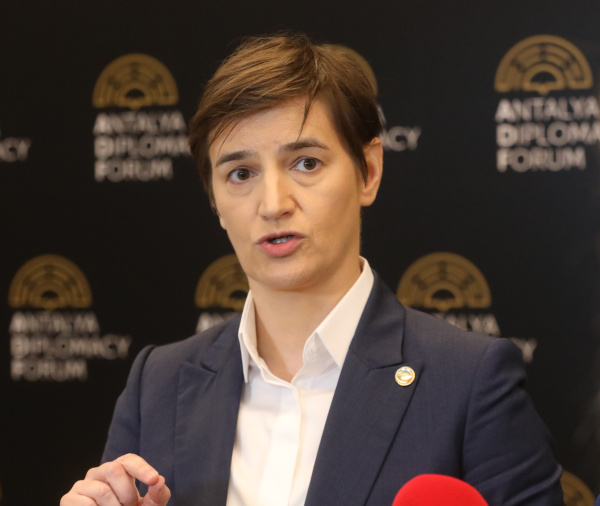
Brnabic underlined that in the Strategic Document for South-East Europe, in every place where “Kosovo” is mentioned, it is marked with an asterisk and a footnote.
It is also interesting that at one moment Osmani invoked the Brussels Agreement and said that according to it, asterisk is not put every time, but only the first time “Kosovo” is mentioned.
We see now that the Kosovo side invokes the Brussels Agreement when it suites them, and when it doesn’t suit them, then the agreement doesn’t exist. That is why I hope they will finally return to the Brussels Agreement, first and foremost in order to form the Community of Serb Municipalities, the Prime Minister underlined.
That has been constructive from them today and totally contrary to everything it could be heard in the Pristina parliament – that they would not allow the adoption of such documents.
Brnabic said that the meeting with Turkish President Recep Tayyip Erdogan was very good and that Erdogan once more sent an invitation to Serbian President Aleksandar Vucic to visit Turkey.
www.srbija.gov.rs |
|
|
| Selakovic: Serbia attaches great importance to the Berlin Process and regional cooperation |
|
8 June 2021
Minister of Foreign Affairs of the Republic of Serbia Nikola Selakovic participated today in an online meeting of Ministers of Foreign Affairs of the Berlin Process participants.
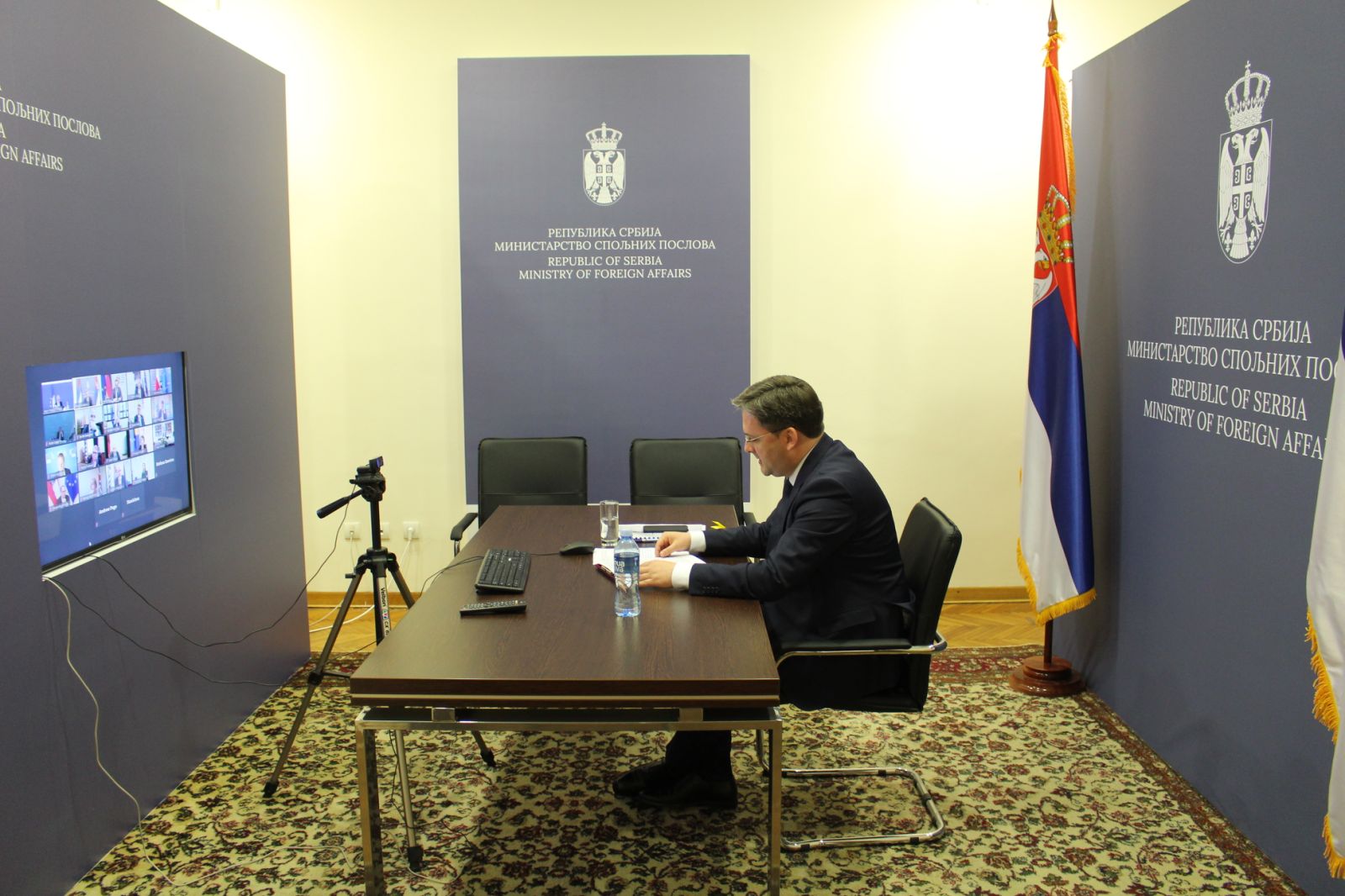
Selakovic pointed out that Serbia attached great importance to this initiative which proved to be a good forum for strengthening regional cooperation and development, promoting a policy of reconciliation and overcoming inherited problems from the past.
“Serbia will always advocate a policy of peace and connectivity, because that is the only way to create the stability that is a precondition for economic growth and progress. Unfortunately, some have not yet grasped the real meaning and essence of the Berlin Process, and they should first start to respect their internationally assumed obligations such as the Agreement on Regional Representation", Selakovic said, reacting to the fact that the Pristina representative displayed a flag of the self-proclaimed "Kosovo".
He added that the Berlin Process provided support to the EU integration of the Western Balkans through concrete projects and measures, and underlined in particular that it was the backbone of regional cooperation focused on economic connectivity, which was in line with the foreign policy orientation of the Serbian Government.
“With a responsible and well-designed economic policy, Serbia has achieved the highest growth in the region, and according to the GDP growth rate in the first quarter of 2021 of +1.7%, our country ranks first in Europe”, the Minister underlined.
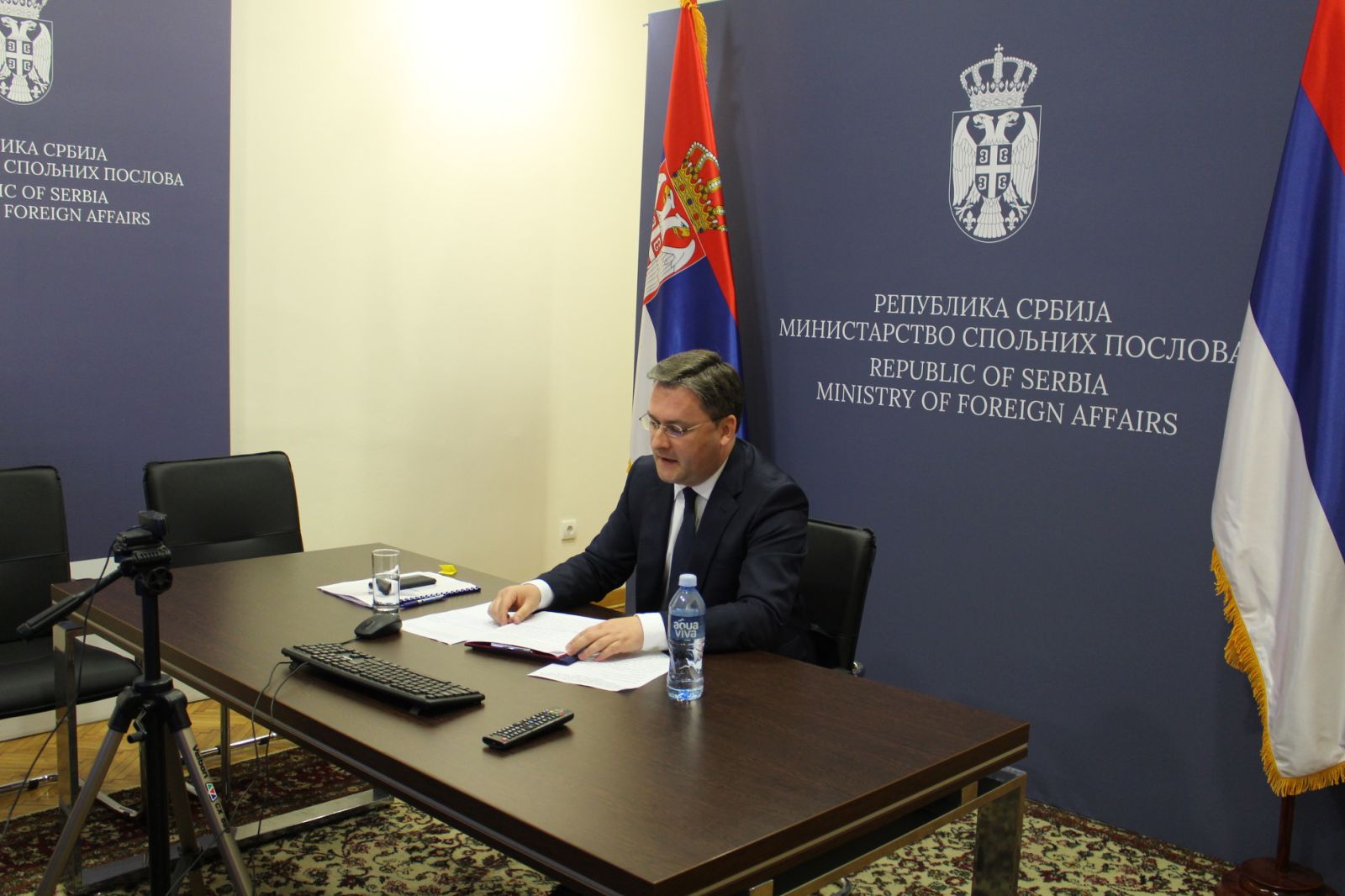
As the most current example of cooperation in this initiative the Minister pointed out the establishment of the Common Regional Market in the Western Balkans.
“Serbia welcomes the Common Regional Market Action Plan. This document is largely based on concrete proposals stemming from an initiative launched by Serbian President Aleksandar Vucic in cooperation with the Prime Ministers of Albania and North Macedonia”, Selakovic said and added that its application would expand the possibilities for improving economic cooperation in the region.
Furthermore, he reflected on the decision to establish “Green Lanes” which enabled medical equipment and food to be transported unhindered through the region in the crisis caused by the Covid-19 pandemic, without delays at border and administrative crossings.
“Serbia has also demonstrated its commitment to improving regional cooperation by showing solidarity with its neighbours in the region, through the delivery of vaccine shipments and by enabling vaccination in Serbia, including for the secretariats of regional initiatives in which Serbia participates”, the Serbian Foreign Minister emphasized.
Selakovic also pointed to other concrete results of regional cooperation within this initiative, such as the Regional Youth Cooperation Office, the Southeast Europe Transport Community, with the seat in Belgrade, the Western Balkans Chamber Investment Forum and the Agreement on the Price Reduction of the Roaming Services in the Western Balkan region.
Selakovic took the opportunity to reiterate that full membership of the EU was the key foreign policy and strategic goal of Serbia. He also pointed out that the enlargement policy was one of the most successful EU policies, that this course should be maintained, and concluded that Serbia and the entire region belonged in the EU.
The meeting was held as part of the German presidency of this initiative in the form of a video conference.
In his statement, Selakovic thanked Germany and Minister Maas for the strong support they extended to the entire Western Balkans, stating that it was this commitment that contributed to connectivity and deepening the cooperation in the region.
“The vision and support of Germany and Chancellor Merkel personally, expressed almost seven years ago, when the Berlin Process was launched, significantly contributed to the creation of the necessary conditions for closer connectivity in our region”, Selakovic said and added that the support and active approach of German partners were of inestimable importance. Furthermore, the Serbian Foreign Minister said that it was very important that other members of the European Union had also recognized the importance of the Berlin Process. |
|
|
| Address by the President of the Republic of Serbia at the session of the United Nations Security Counci |
|
09. June 2021.
Dear Mr. President, ladies and gentlemen, members of the delegations
I would point to a few ongoing issues in my speech that refer to the competences of the Mechanism, namely, the possibility of serving the sentences passed by the ICTY and Mechanism in the Republic of Serbia, with the current practice of disabling early release of the sentenced persons as well as obligation of the Mechanism regarding protection of sentenced persons.
The second part of the speech will be dedicated to issues that are opened by the six –month Report on the work of the Mechanism by Mechanism President Mr. Agius and Report by the Chief Prosecutor Mr. Serge Brammertz, especially regarding current cooperation of the Republic of Serbia and the Mechanism.
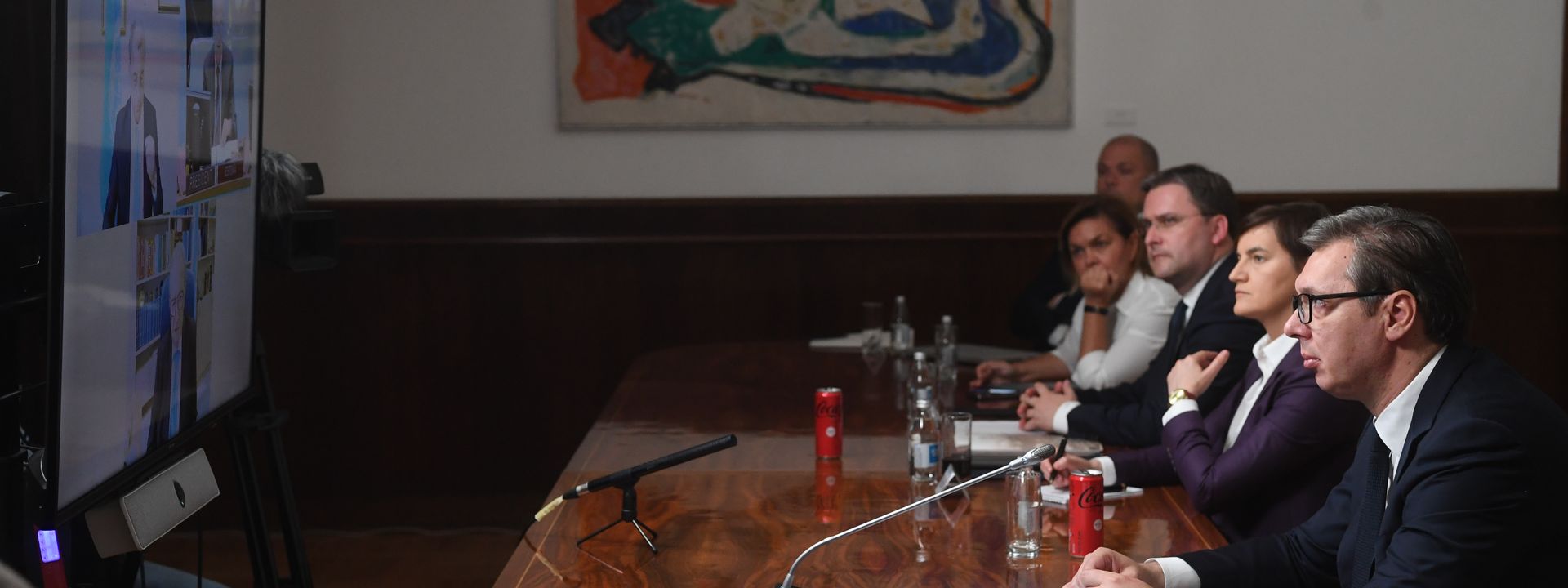
The third part of my speech, and I noticed that in many of your statements even today, is going to be the view of Serbia on everything that took place in The Hague Tribunal and what the Tribunal verdicts brought to people in the region of former Yugoslavia.
The Republic of Serbia has initiated before the Security Council, on several occasions, the issue of possibility of serving sentences passed by the ICTY and Mechanism in the Republic of Serbia. Beside the efforts to move this issue from “square one”, not a single response was obtained from the Security Council. The majority of persons that are serving their prison sentences are citizens of the Republic of Serbia, and it comes naturally that the Republic of Serbia is interested in enabling them to serve their prison sentences in the Republic of Serbia.
ICTY and the Mechanism are making references to the Security Council as an institution in charge of dealing with this issue.
I am ready to reiterate here the readiness of the Republic of Serbia to take over obligations and liability for executing prison sentences that the Tribunal or Mechanism passed on the citizens of the Republic of Serbia, under the monitoring of the Mechanism and full respect for the authority of the Mechanism regarding early release.
Mr. President
A particular problem that we are facing with is disturbance by the judicial institutions established in the territory of Kosovo and Metohija, which is within Serbia and which is under Interim Administration of the UN. We are witnesses of attempts of retrial for two citizens that are serving their prison sentences for which they had already been trialed before the ICTY. More concretely, in previous period there was an attempt for hearing of Nebojša Pavković and for obtaining extradition of Vlastimir Đorđević.
I urge on the Mechanism and Security Council to prevent attempts of violation of the principle ne bis in idem, a civilization principle that was confirmed in Article 7 (1) of the Statute of the Mechanism and to disable retrials for persons already convicted by the ICTY, particularly to make sure that it is not done in the territory which is under interim UN administration.
Mr. President,
President of the Mechanism (Mr. Carmel Agius), apart from the regular Report, delivered also on 11 May 2021 a letter to the President of the Security Council, whose subject is the alleged omission of the Republic of Serbia to apprehend and turn over to the Mechanism Petar Jojić and Vjerica Radeta, indicted of contempt of court, claiming that in this way the Republic of Serbia was acting contrary to its obligations towards the UNSC Resolution 1966 (2010) and asking the Security Council to take measures in order to ensure that Serbia meets the alleged obligations in accordance with the Mechanism Statue and Resolution 1966.
The point of the argumentation of the President of the Mechanism comes to that that the Republic of Serbia has the obligation to deprive of liberty and extradite to the Mechanism its citizens accused of contempt of court, regardless of the nature of accusation, circumstances under which such an order was made and consequences that might result from its implementation.
It is about accusations that do not refer to sever violations of international humanitarian law and that are related to a case before the ICTY, which ended in 2018 (Vojislav Šešelj case), by acquitting the defendant in the first instance, and upon the Prosecutor’s complaint the defendant was declared guilty and sentenced to a 10-year imprisonment, which was covered by the time he spent at the UN Detention Unit.
Judge Agius states that Serbia ignores its obligations in accordance with the Resolution 1966 (2010). Quite the opposite- the Republic of Serbia takes seriously its obligations regarding cooperation with the Mechanism. After the warrant for apprehension and extradition of the two persons accused of contempt of court to the Mechanism had been introduced, the Higher Court in Belgrade established that assumptions for their apprehension and extradition to the Mechanism had not been met. The decision is founded on the rules of international law and domestic law of the Republic of Serbia and it is mandatory for holders of the executive power in the Republic of Serbia.
I would remind here that the first decision of a sole judge (Aydin Sefa Akay, 12 June 2018), that was acting in this case was that the criminal prosecution of V. Radeta and P. Jojić for alleged contempt of court was to be forwarded to the judicial authorities of the Republic of Serbia. In procedures that followed, the argument of the alleged unwillingness of the witnesses to cooperate with the judicial authorities of the Republic of Serbia was stated for the first time, and the decision on deprivation of transferring the case to the jurisdiction of the judicial authorities of the Republic of Serbia was based on the respective argument.
The Republic of Serbia expressed its readiness to take over the court procedure against Petar Jojić and Vjerica Radeta on several occasions and it provided appropriate guarantees. Additionally, the Republic of Serbia fully recognizes and accepts the obligation of the Mechanism to monitor trials that were transferred to national courts with the help of international and regional organizations, as well as to take measures envisaged by Article 6 of the Statute of the Mechanism.
I would remind here that the Republic of Serbia extradited to the tribunal all the persons indicted by the Prosecutor’s Office, and among the respective mostly highest political, military and police officials; it enabled presence of vast number of witnesses, delivered extensive documentation. Obligation of the Mechanism, in accordance with the Resolution of this Security Council, is to take measures that enable transfer of cases to national justice system. In previous practice, 13 cases were transferred to Bosnia and Herzegovina, 2 to Croatia and only one to Serbia.
The last but not the least, I want to remind all of you here of the fact that France- of course as a sovereign and independent country- upon request for apprehension and extradition of Florence Altman for publishing documents and contempt of court, refused the request for extradition, with an explanation that it does not extradite its citizens. For far smaller offence you ask as to extradite our citizens Jojic and Radeta, showing both the distrust to Serbian justice and judiciary and Serbian State, as well as a fact that the rule from ancient Rome is still valid – quod licet lovi non licet bovi.
It does not harm to underline that high-level officers and politicians were not trialed for crimes against Serbs, and that crimes against Serbs remained unsanctioned before ICTY and Mechanism. Let me remind you, just as an example that Ademi and Norac case for ferocious crimes against Serb civilians in Medački Džep was left to Croatian justice institutions. Proven crimes against Serbs, like those of Ramuš Haradinaj, Naser Orić, then Ante Gotovina and other indicted for military operation “Storm” that led to a complete ethnic cleansing of Serb population in the big part of today’s Croatia, resulted before the ICTY in acquittals. Many horrible crimes against Serb civilians that were committed in the territory of Bosnia and Herzegovina, Croatia and the Autonomous Province of Kosovo and Metohija, and that resulted in ethnic cleansing, simply were not the subject of interest of the ICTY.
What’s very important and not to leave anything unclear, Serbia is a country that condemns all crimes and all criminals who perpetrated them in the region of former Yugoslavia. However, it is interesting that despite often criticism Serbia is the only one that speaks openly and condemns crimes perpetrated by Serb nationals, while in other regional countries they do not speak at all about crimes that representatives of those nations committed against members of Serbian people.
And I want to emphasize once again here in front of you that Serbia condemns terrible crime in Srebrenica and extends its deepest condolences to the families of all killed in that massacre. And there are no “buts” about the respective.
Nevertheless, we are here to analyze results and penal policy of ICTY and the Mechanism and it was such that it has never gained trust among Serbian people, no matter where they live. And not because we Serbs do not acknowledge crime committed by some of our compatriots, but because The Hague Tribunal, with exceptions, was judging only to Serbs and in all three territories of former Yugoslavia- Croatia, Bosnia and Herzegovina and Kosovo and Metohija, which some of the SC Member States see and name of course, contrary to law and legal norms and UN Resolutions, as an independent state. I would try to plastically prove to you how The Hague justice was tailored even though I know that it will not come to understanding of many of you, but to me it is important because of the history, facts, and school books that will be made in accordance with the facts.
Namely, Serbs were sentenced to totally 1138 years of imprisonment, and to 8 life imprisonments. At the same time, The Hague Tribunal did not sentence a single Croat for crimes against Serbs, neither in actions Medački Džep, nor Flash and Storm. How politically cunning it was done in the Tribunal, and all wrapped in the form of law and justice. Prosecutors of The Hague Tribunal chose on purpose three military and political leaders of Croats, Bosniac Muslims and Albanians, on all three mentioned territories, committed against Serbs. – Ante Gotovina, Naser Orić and Ramuš Haradinaj. It is interesting that following the same pattern, the same pattern, this injustice was shared. Namely, all of them were sentenced in the first instance procedure, with the exception of Ramuš Haradinaj, because not a single witness survived. Gotovina was sentenced to 24 years’ imprisonment in first-instance procedure, while by a mysterious decision of the second instance council and 3:2 judge ratio, the verdict was changed to acquittal. Naser Orić, for crimes against Serbs, was also sentenced in first instance verdict, but by a mysterious decision of the second instance court, and again 3:2 ratio decision was an acquittal and he was set free of any liability. Let me reiterate, all witnesses in process against Ramus Haradinaj, either committed suicide or were killed under very, very strange circumstances.
Let me conclude, I do not want to believe that someone wants to say that there had been no crimes against Serbs, but judging by the verdicts of The Hague Tribunal, no one- absolutely no one- is responsible for those crimes.
Nevertheless, we in Serbia will show responsibility and we will fight for peace, stability and reconciliation in the region.
We ask UN Security Council Member States to help us with rational and pragmatic approach and respect for international law and not by attempts of further humiliation of Serbia. Serbia is a small country, with proud and courageous people, the one that gave the biggest sacrifice during the WWI and WWII; people who wants to leave in peace with their neighbors. And when I am asking you for this, I do not think I am asking for too much.
At the very end, Serbia is the fastest growing country of the Western Balkans region and we cannot progress unless our relations with neighbors, friends and other countries are good, solid and better. That is why- despite the selective justice that was applied in The Hague Tribunal- we will be open for any dialogue, any kind of cooperation and we will look towards the future and not towards the past. And I have only one message for the citizens of Serbia and citizens of Serbian nationality in the entire region- keep your heads up, neither Serbia nor Serbian people are convicted of anything and it is up to us to work even more diligently, to open factories and to fight for our children and our future.
Long Live Serbia! |
|
|
| Minister Selaković presented the new e-Consulate service |
|
A new service of the Ministry of Foreign Affairs "e-Consulate" was presented in Belgrade today, intended for foreign citizens who apply for a visa and aspire to come to Serbia to work.
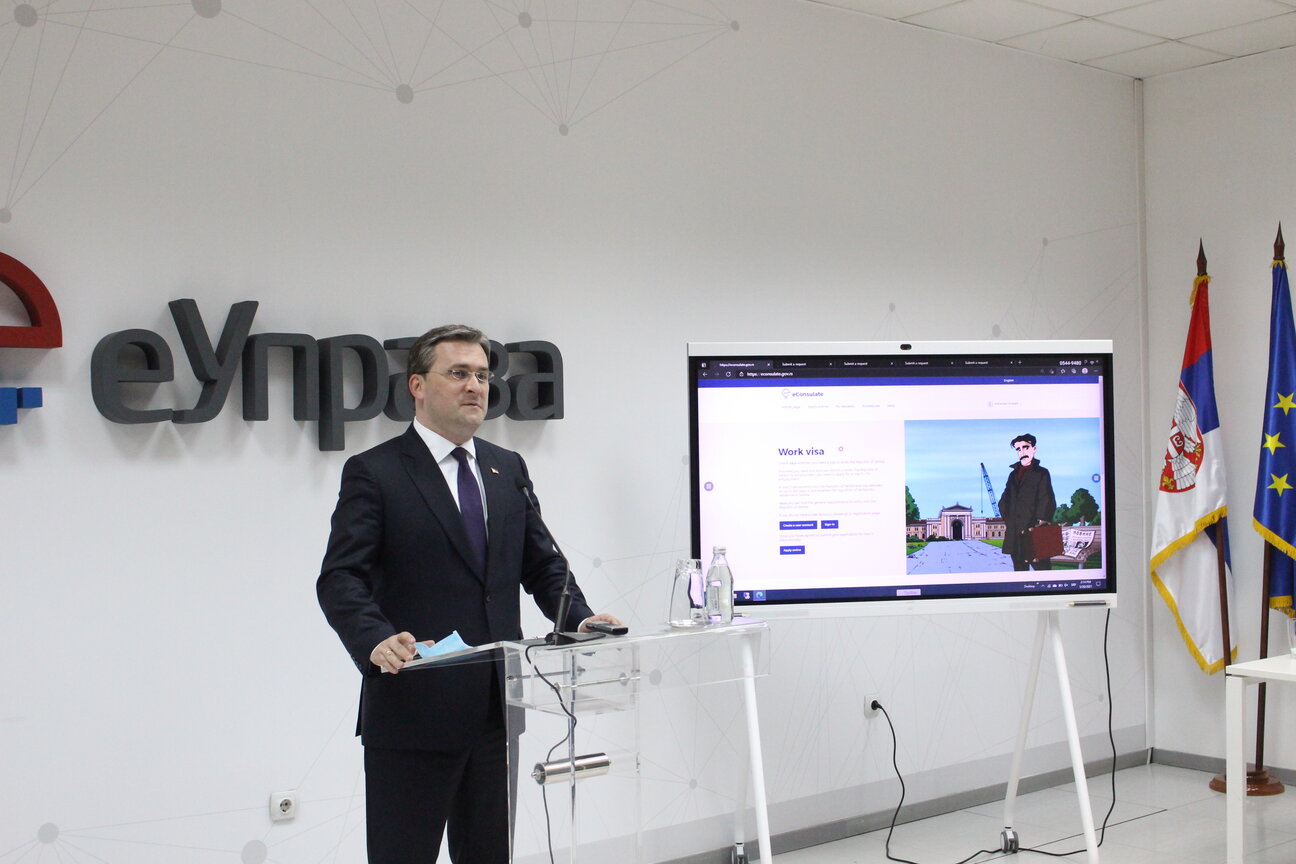
On that occasion, Minister of Foreign Affairs of the Republic of Serbia Nikola Selakovic said that this service was one of the indicators of good development of our country, which, as he pointed out, was becoming a magnet for serious foreign companies, which brought a large number of workers from other countries to work in Serbia.
"Not to be pretentious, but completely realistic, this service represents a turning point in the functioning of our system. E-Consulate and digitalization of the procedure for issuing work visas for foreign citizens who want to work in Serbia, is the first electronic service offered by the Foreign Ministry, and I can promise you that this is indeed our first, but by no means the last e-service", Selakovic emphasized.
The Head of Serbian diplomacy pointed out that "e-Consulate" reflected the modernization of an extremely important segment of the activities of diplomatic and consular missions of Serbia, and that we were actually talking about something that was essential for the further development processes of our country.
The Minister recalled that, when the President of the Republic visited the construction site of the Moravian Corridor, he was told that some construction works were delayed because Bechtel company was not issued work visas on time.
“The moment we saw that and heard the President, I alerted the services in the Ministry. We were surprised, as we knew that the issuance of visas in Turkey had a good dynamic, and then we determined that it was actually workers from Bangladesh who applied for a visa through our Embassy in India, where we have a problem with staff shortage”, the Minister explained.
As he added, this is a demanding and laborious task, each of our employees had to receive the documentation on paper, check it, then request additional information, and only then forward it.
"Today, this has been fantastically perfected for our consular officers, all that documentation is submitted in electronic form. We used to have two filters to check the documentation, now we actually have three. And the work is significantly more efficient", Selakovic pointed out.
As he emphasized, this is a service which was promised less than four months ago and it becomes available on Monday, in 95 diplomatic and consular missions of Serbia, i.e. in all our embassies and consulates general.
The biggest result of that endeavor, the Minister pointed out, apart from the advantage it would bring in the future work, was the fact that it was not a project of one state body, but a joint endeavor of the Ministry of Foreign Affairs, IT and eGovernment Office, General Secretariat of the Government, Ministry of the Interior, Ministry of Labor, Employment, Veterans and Social Affairs, National Employment Service.
“We did an extremely good job in record time. This is to the pride of our Ministry, to the pride of the entire state. I am convinced that in the period ahead, we will further modernize our affairs and make Serbia one of the few countries that has such mechanisms and such state-of-the-art provision of consular services", Selakovic said.
Speaking about the "e-Consulate" portal itself, the Minister explained that there is a cartoon of Nikola Tesla and the building of the old railway station with one crane, which actually symbolizes a historical fact - that Tesla was in Belgrade in the year when it was built.
"Today it is the place behind which the Belgrade of the future is rising, and what we managed to do together is an indicator of something that is the future of Serbia, the development of artificial intelligence, IT and creating conditions for more people to live and arrive here in Serbia in the future seeking good life and employment", concluded the Minister.
The Director of the Office for IT and eGovernment, Mihailo Jovanovic, said that this was the first time that e-services were focused on foreign citizens, which was the case with our citizens so far.
In the period from 1 January 2019 to 17 May this year, the most applications for Serbian visas were submitted at the Embassy in Beijing, 6,766 applications, then in New Delhi - 2,973, Shanghai 2,115, Tokyo 1,798, and Cairo 1,756.
In that period, 1,270 requests were submitted in Algiers, 1,095 in Jakarta, and 1,077 in Beirut.
In terms of their nationality, Serbian D visa for employment is most requested by citizens of China - 9,516 applications, followed by India 1,955, and Ukraine - 673. |
|
|
| On-line application for issuing D visas – for employment |
|
On-line application for issuing D-employment visas has started in the Republic of Serbia. Viza D allows entry into the Republic of Serbia and stay between 90 and 180 days. It also enables the regulation of temporary residence in Serbia.
If you are sure that you meet the requirements for visa D - for employment and have all the necessary documents, you can apply electronically, at the following link: http://https://econsulate.gov.rs/ |
|
|
| Serbia sets aside considerable funds for projects in Republika Srpska |
|
17 May 2021
Prime Minister Ana Brnabic stated today in Istocno Sarajevo, after a session of the governments of Republika Srpska and Serbia, that our country will invest €787 million in Republika Srpska in the next few years.
At a joint press conference with Prime Minister of Republika Srpska Radovan Viskovic, Brnabic pointed out that the construction of the Buk Bijela hydroelectric power plant, the Belgrade-Sarajevo highway, the Raca-Bijeljina section and the Trebinje airport is currently underway.
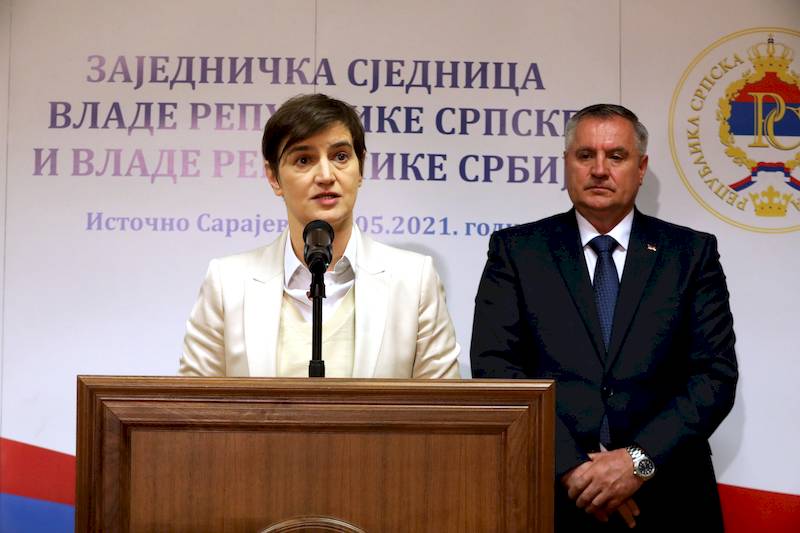
Through all these projects, Serbia invests around €500 million in Republika Srpska. This amount also includes Serbia's special support to four municipalities of Republika Srpska - Nevesinje, Drvar, Dubica and Kostajnica, which stands at between €10 million and €12 million, Brnabic underlined.
According to her, if other two hydroelectric power plants of Foca and Paunci are included, within the larger project of HPP Gornja Drina, then there is a total investment of Serbia of €787 million in the next few years, the Prime Minister explained.
She recalled that Serbia also donated various projects in the field of education, health, environment, infrastructure in local communities in Republika Srpska.
Since 2014 until today, the value of donations has been over €82 million and that will continue, the Prime Minister pointed out and added that all together, it amounts to over a billion euros that Serbia invests in projects in Republika Srpska through investments and to a lesser extent donations.
Brnabic also congratulated Republika Srpska on entering the stock market and on excellent results in the field of economic growth.
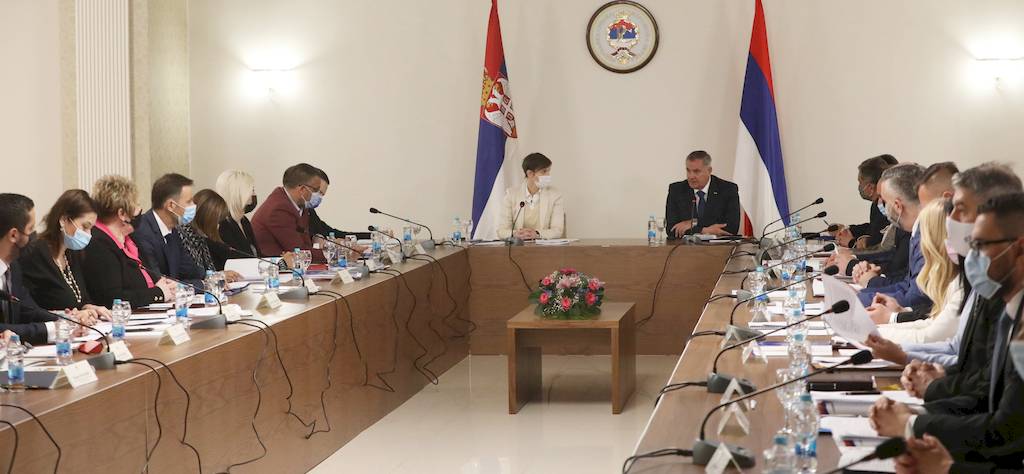
Viskovic estimated that the previous 10 years of cooperation between the governments of Serbia and Republika Srpska have led to significant infrastructure projects, the value of which will exceed 1.6 billion marks in the coming period.
Today, we will lay the foundation stone for three hydroelectric power plants - Buk Bijela, Foča and Paunci, whose value is over 1.1 billion marks. We also talked about starting the construction of the Sremska Raca-Bijeljina highway very soon, which Serbia is helping with €100 million, he announced.
According to him, the project of building an airport in Trebinje, which is also an investment of €100 million, is of great importance because it should enable Herzegovina to have much faster development in the coming years.
Viskovic expressed the expectation that the "Bratoljub" bridge in Bratunac will finally be put into operation soon, reminding that Serbia built the bridge from its own funds two years ago, but, unfortunately, BiH institutions should complete the border crossing, and citizens on they have been waiting for it for more than two years.
I hope that it will be completed by the end of June and that we will gather in July or August and put the bridge and the border crossing into use, said the Republika Srpska Prime Minister.
Viskovic emphasised that in the coming period, Republika Srpska will implement many more projects with Serbia, from the construction of "smart cities" to certain projects in the field of health.
Source: www.srbija.gov.rs
Photo: www.srbija.gov.rs |
|
|
| Foundation stone for "Buk-Bijela" new beginning in relations between Serbia, Republika Srpska |
|
17 May 2021 Prime Minister Ana Brnabic said today in Foca, during the laying of the foundation stone for the construction of the hydroelectric power plant "Buk Bijela", that this event is a new beginning in relations between Serbia and Republika Srpska and the whole region.
Brnabic assessed that "Buk Bijela" is just one element in the mosaic of our relations and a project that opens many other doors.
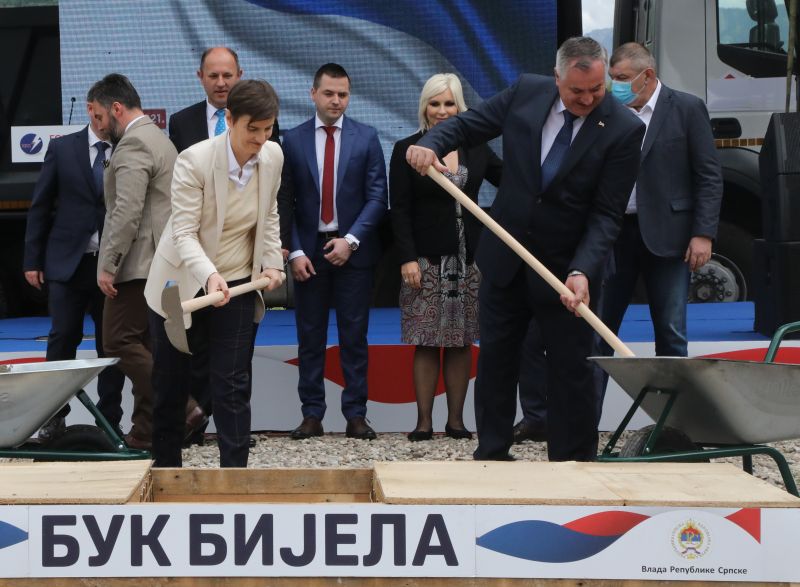
It is a strategic project that gives us energy and courage to dream much bigger dreams. This is a new beginning in the relations between Serbia and Srpska, but also in the entire region. It is in the interest of future generations who will use this hydroelectric power plant, who will not know the borders for people, capital and projects, who will stay here to live, Brnabic said.
Prime Minister of Republika Srpska Radovan Viskovic said that we have been waiting for more than 60 years to start this project, which will be finished in four years.
This is a project that means life, connection, survival and prosperity, said Viskovic.
Deputy Prime Minister and the Minister of Mining and Energy Zorana Mihajlovic stated that the plan is for the HPP to be ready in four years and that this is not the only project that Serbia and Republika Srpska will jointly implement.
This is a historic day, because there has been talk of "Buk Bijela" for decades, said Mihajlovic.
Republika Srpska Minister of Energy and Mining Petar Djokic said that Republika Srpska and the residents of Foca have been waiting for this event for a long time and that Republika Srpska is opening a new chapter of life, work and cooperation with Serbia and companies on both sides of the border, which will contribute to economic growth and development of Serbia and Republika Srpska.
Source: www.srbija.gov.rs
Photo: www.srbija.gov.rs |
|
|
| Selakovic: Serbia demonstrated that solidarity does not solely have to be the privilege of the rich |
|
11 May 2021 Minister of Foreign Affairs of the Republic of Serbia Nikola Selakovic participated today in the Adriatic and Ionian Council of the Adriatic and Ionian Initiative and the Ministerial Meeting of the EU Strategy for the Adriatic and Ionian Region, stating that it was necessary to include all available resources of this initiative more directly in finding common answers to the challenges posed by the coronavirus pandemic.
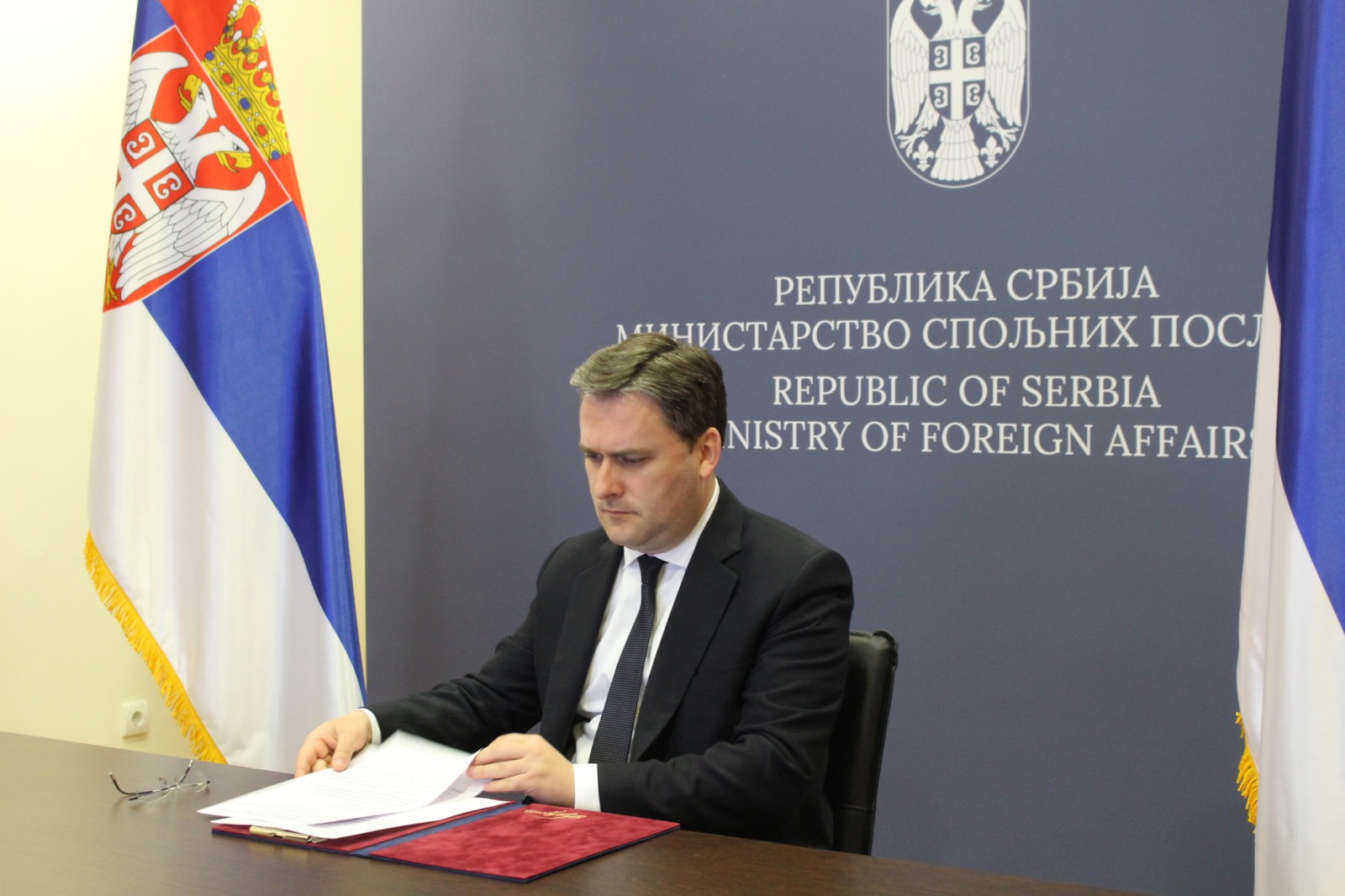
The Serbian Foreign Minister pointed out that the pandemic can only be defeated by joint forces, emphasizing that solidarity was the key word in these challenging times.
“Being committed to the principles of solidarity, Serbia vaccinated a large number of foreign nationals, primarily from the region. We have donated a number of vaccine doses to neighbouring countries as well as to the secretariats of regional initiatives in which Serbia participates. In this way, although not one of the economically strongest countries in this initiative, Serbia endeavoured to demonstrate that solidarity does not solely have to be the privilege of the rich”, Minister Selakovic said.
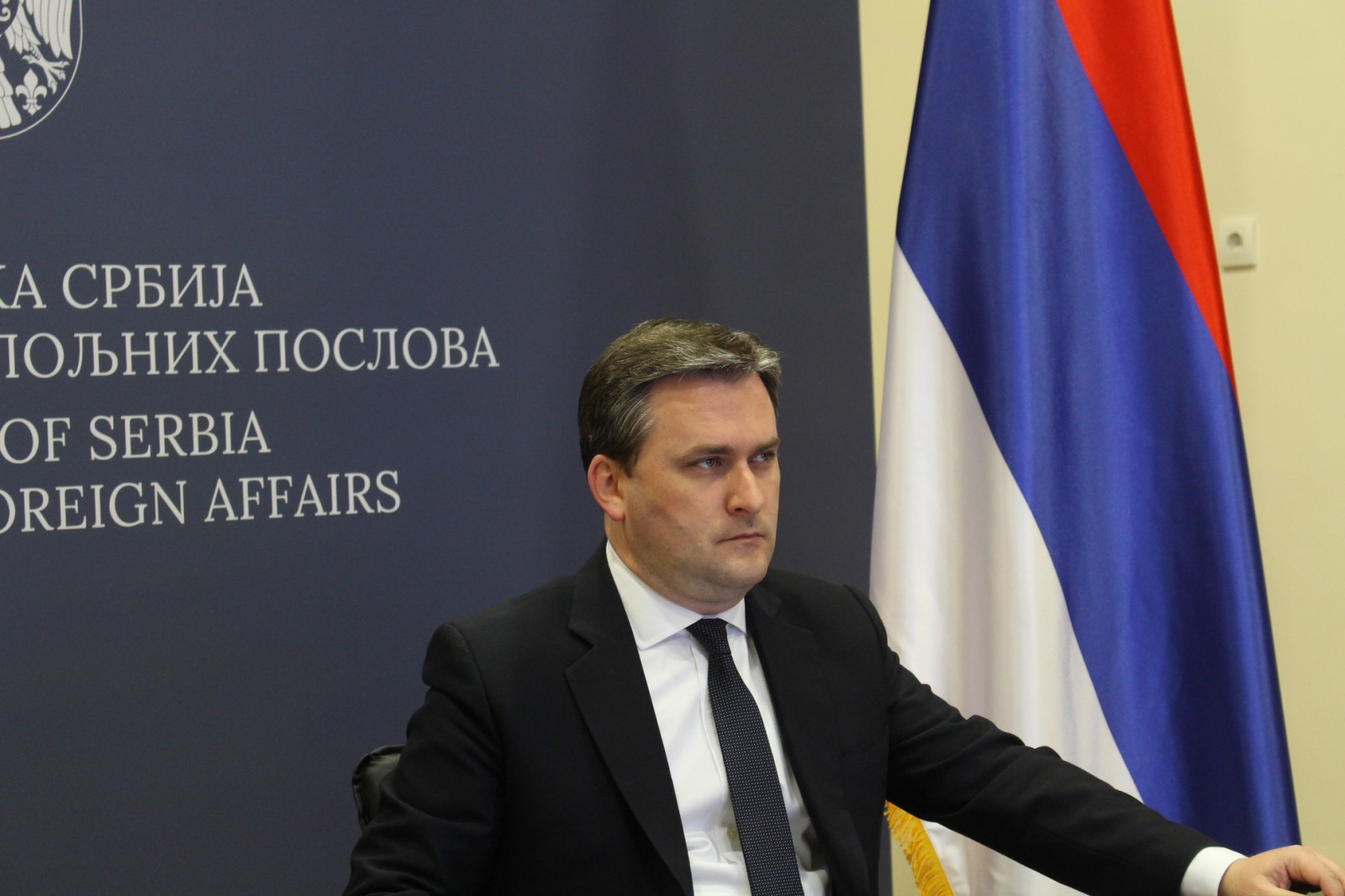
The Minister stressed that Serbia had entered the process of immunization of citizens against Covid-19 at the end of last year, and underlined that Serbia was one of the countries that faced both the epidemic and the vaccination process in the most efficient way.
Selakovic expressed pleasure over the fact that the "Izola Declaration" recognized the importance of a common European response to the pandemic and the need to revise the activity, particularly within the EU Strategy for the Adriatic and Ionian Region, while also being pleased that the Declaration confirmed the European perspective of the Western Balkans.
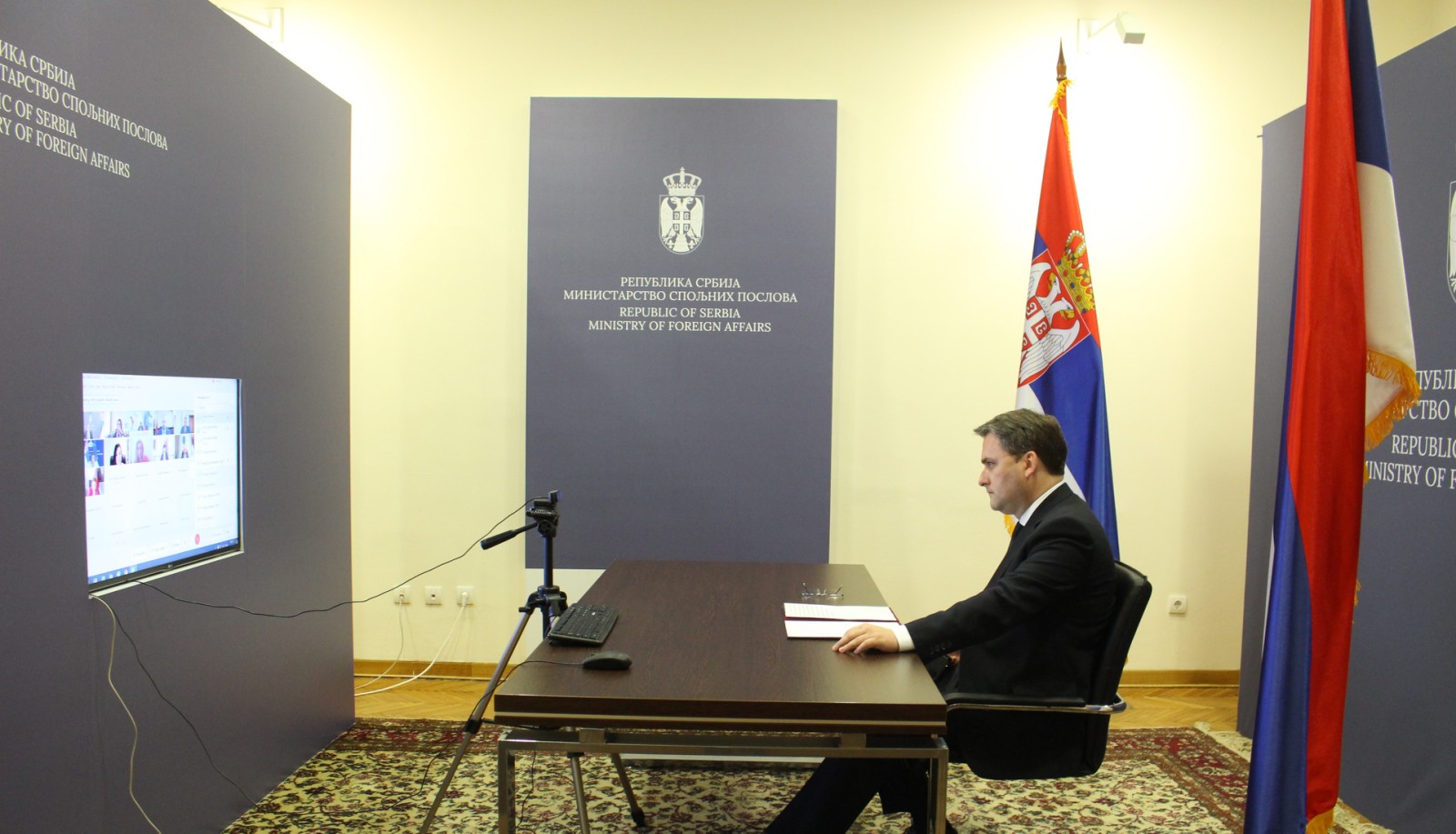
“Serbia's commitment to building a further European perspective and strengthening regional cooperation has been unequivocal”, Selakovic said adding that Serbia focused special attention on the green and digital transition in line with the European Green Deal, with support from the relevant EU funding programmes.
The meeting was held in video format, within the Slovenian Chairmanship of the initiative. |
|
|
| President Vučić met via video link with representatives of the IMF delegation |
|
21st April 2021
President of the Republic of Serbia Aleksandar Vučić talked today via a video link with the representatives of the delegation of the International Monetary Fund led by the Head of the Mission, Jan Kees Martijn. The interlocutors concluded that Serbia's main goal remains to preserve the hard-earned reputation of a fiscally secure country, as well as to continue with a responsible fiscal policy so that public debt does not exceed 60 per cent of GDP, whereby Serbia continues to work on further economic growth.
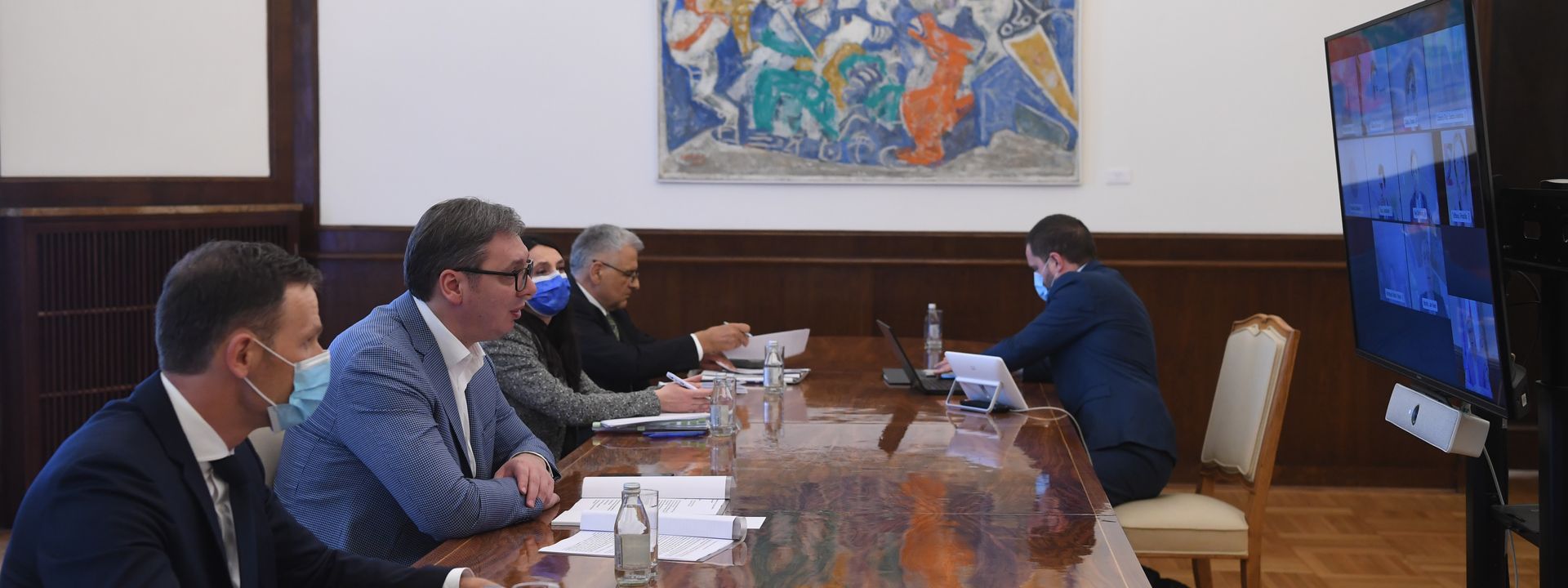
During the conversation, President Vučić and Jan Kees Martijn especially referred to the incentive measures and adopted three packages of measures to help the economy and citizens, which preserved macroeconomic stability and even achieved a higher employment rate. Martijn commended the responsible economic policy of Serbia and the successful crisis management during the pandemic.
"Serbia achieved one of the best results last year despite the challenges of the pandemic", Martijn said, noting that Serbia was one of the few countries to which the IMF did not adjust the initial projection of the 5% growth rate it gave last year.
President Vučić added that following the first quarter of 2021, Serbia is well on its way to achieving the planned growth of 6% as planned, since one of the main focuses of the Government is investing in large infrastructure projects and intensifying work on attracting foreign direct investments.
"In 2020, Serbia was at the very top in terms of economic growth in Europe, and I am convinced that this year we can enter the first three or four countries in terms of growth", said President Vučić, adding that he was satisfied that Serbia still, despite the pandemic situation, has an extremely strong inflow of investment.
President Vučić and Jan Kees Martijn also discussed a new advisory arrangement, which is of special importance in light of the improvement of the general investment climate in Serbia, as well as in the context of even greater investor assurance.
"Given Serbia's tremendous progress over the past eight years, the priority goal of this arrangement will be to preserve the results achieved, but also to provide support for further implementation of structural reforms aimed at even faster, stronger and more sustainable growth", said President Vučić and thanked the IMF and the personal engagement of Jan Kees Martijn in the professional and expert support that Serbia is counting on.
President Vučić pointed out that Serbia will pay special attention to reforms in public companies, and that priorities will continue to be investments in infrastructure, creating an even better climate for investments, greater investments in the environment, science and capital projects, which will further contribute to the long term stable financial growth in the coming years.
Source: www.predsednik.rs
Photo: www.predsednik.rs |
|
|
| Meeting with the World Health Organization Regional Director for Europe |
|
20th April 2021
President of the Republic of Serbia Aleksandar Vučić met today with the Regional Director of the World Health Organisation for Europe Hans Kluge, to discuss cooperation in the fight against the COVID-19 pandemic, as well as cooperation in improving health care in our country and other joint activities.
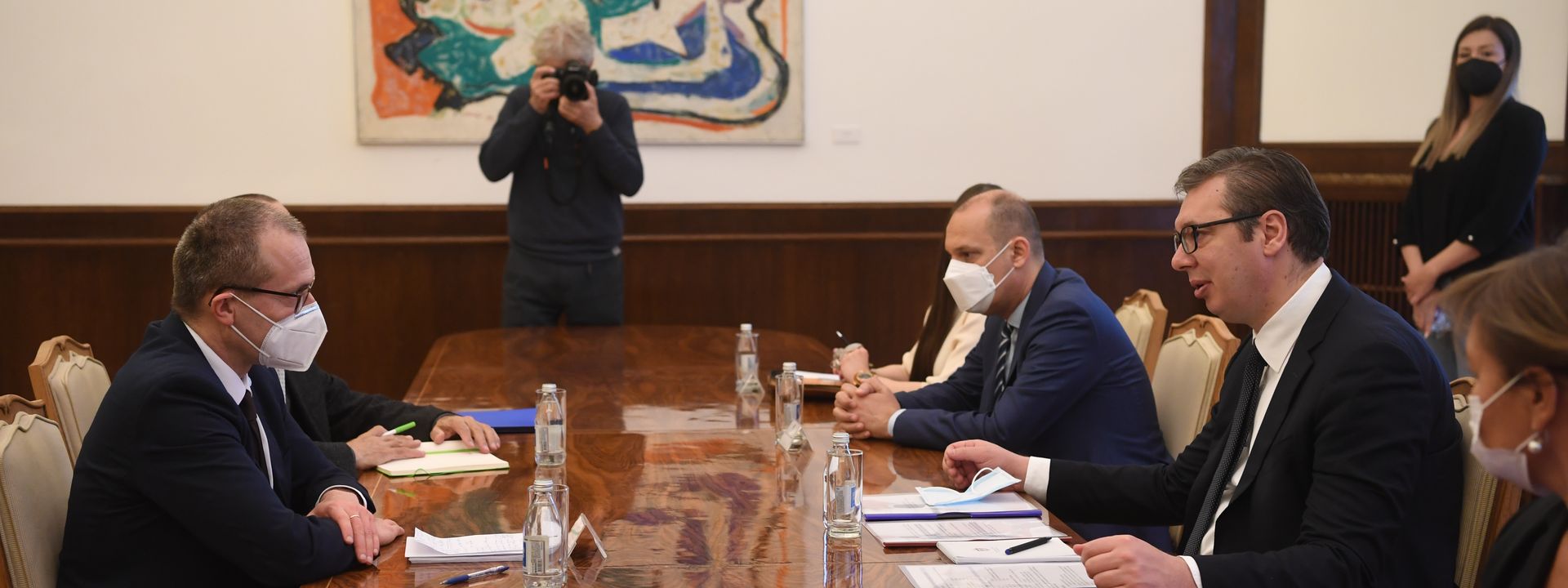
President Vučić thanked Dr Kluge for his personal engagement and support during the current pandemic, especially for technical assistance and expertise. On this occasion, he informed the WHO official about the results of immunisation in Serbia and plans on how to provide the vaccine to all citizens who want to get it.
Dr Kluge congratulated President Vučić on his leadership and personal commitment to provide vaccines. He emphasised that Serbia, with its good immunisation strategy, ranked among the global leaders, thus becoming an example of humanity and solidarity by enabling vaccination of elderly people in rural areas, foreign citizens and donating vaccines to other countries.
"Serbia has accepted the vaccine as a life-saving product and has not looked at it geopolitically", said Dr Kluge.
The two interlocutors agreed that the world should increase production capacities for vaccines, as well as develop new adequate therapies for the fight against COVID-19, and, in this regard, work on increasing the level of citizens' trust in science.
President Vučić informed Dr Kluge about the plans for improving the work of the Institute for Virology, Vaccines and Sera "Torlak". "We want to make 'Torlak' one of the best vaccine factories in Europe", said President Vučić.
Source: www.predsednik.rs
Photo: www.predsednik.rs |
|
|
| WHO describes immunisation process in Serbia as impressive |
|
19 April 2021 WHO
Prime Minister Ana Brnabic talked today with World Health Organisation (WHO) Regional Director for Europe Hans Kluge about the epidemiological situation and the course of immunisation of citizens in Serbia.
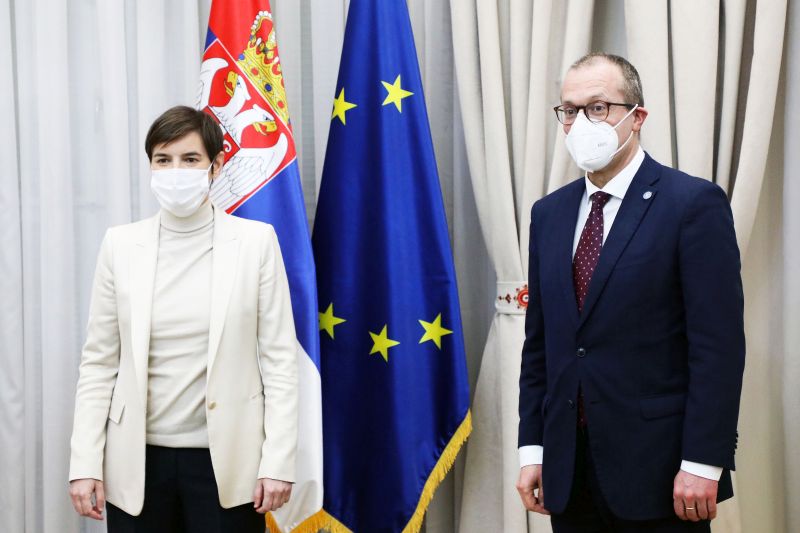
Brnabic expressed gratitude for the cooperation in the fight against the pandemic, technical assistance and expertise, emphasising that the support of this organisation is very important for our country.
She informed the WHO Regional Director for Europe about the course of immunisation of citizens in Serbia, expressing her belief that, thanks to the large number of vaccinated people, we will be able to create collective immunity and return to normal life.
Kluge assessed the immunisation process in Serbia as impressive, and added that Serbia has made a good decision to offer citizens all available vaccines used in the fight against coronavirus.
Expressing concern over the emergence of new strains of the virus, he stressed the need to speed up the immunisation process and show mutual solidarity.
The WHO Regional Director for Europe praised Serbia for the humanity it has shown by donating vaccines to the countries of the region and enabling vaccination for those who do not have a sufficient number of vaccines for their citizens.
The Prime Minister said that Serbia will continue to cooperate with the countries of the region and help in accordance with its capabilities.
When it comes to the project "Roadmap for Health in the Western Balkans 2021-2025", it was stated that, if epidemiological conditions allow, a regional meeting will be held in Belgrade at the end of the year, important for future improvement of cooperation between countries in the field of health challenges.
Source: www.srbija.gov.rs
Photo: www.srbija.gov.rs |
|
|
| Selakovic: Political extremism of Albanians in Kosovo and Metohija is becoming stronger |
|
13 April 2021
Minister of Foreign Affairs of Serbia Nikola Selakovic warned, at the United Nations Security Council meeting, that the political extremism among Albanians in Kosovo and Metohija was not decreasing, but on the contrary, was becoming stronger.
At the meeting discussing the Report of the UN Secretary-General on the work of UNMIK, Minister Selakovic recalled that the obligation to form the Community of Serb Municipalities remained unfulfilled for 2,917 days now and that, in fact, 19 April marked eight full years since the agreement was reached in Brussels, while Pristina still refused to follow up on its commitment and enable the formation of the Community of Serb Municipalities.
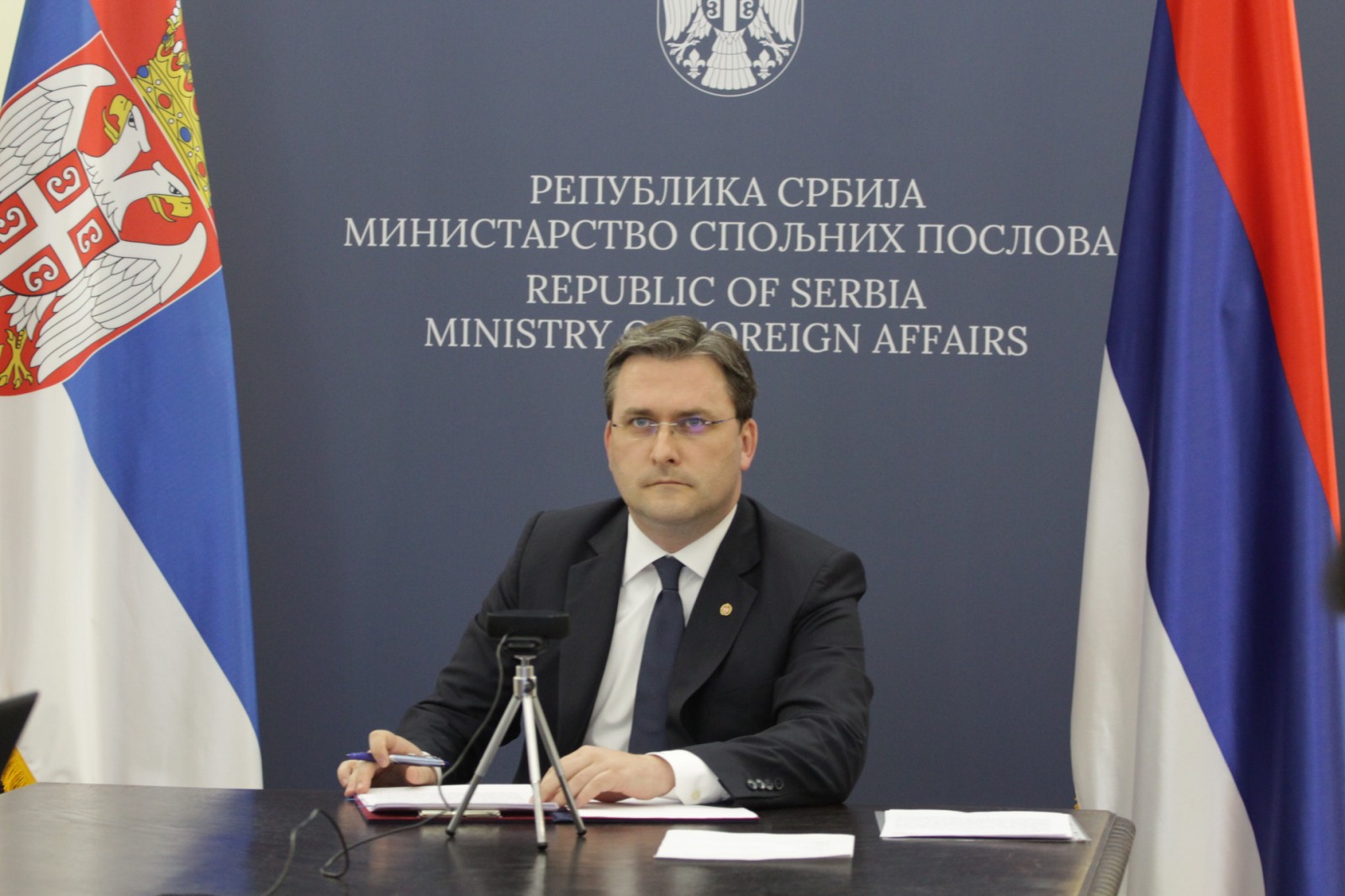
The Minister reminded that the current Prime Minister of the provisional institutions of self-government in Pristina repeatedly threatened to unite the self-proclaimed Kosovo and Albania, and that he also stated that the dialogue with Belgrade was low on the list of his priorities.
Minister Selakovic pointed out that it was high time for Albanian leaders in Pristina to show responsibility in fulfilling their commitments, but also a sincere commitment to reaching a compromise solution and building mutual trust.
"Serbia is determined and will not give up on identifying a compromise solution, which will be sustainable for future generations as well. The only way to build lasting peace and stability in our region is by working to build trust and insisting on positive political agendas", Selakovic concluded.
According to the Minister, lasting peace and stability can only be achieved if none of the participants in the dialogue pursued maximalist demands and insisted on the complete humiliation of the other.
He pointed out that the Serbian and Albanian peoples, as the two most numerous peoples in the Western Balkans, needed to find a way to reach reconciliation and a basis for cooperation, both in terms of the economy and in achieving shared prospects for membership of the European Union.
"Belgrade has made sincere steps in that direction, by being one of the initiators of the idea of relaxing the flow of people, goods, capital and services, popularly referred to as "mini-Schengen", the Minister underlined.
Pointing out that Serbia had time and time again demonstrated its commitment to dialogue as the only way towards a peaceful, political solution to the problem in Kosovo and Metohija, Selakovic underscored that the recent elections in the Province confirmed that political extremism among Albanians in Kosovo and Metohija was not decreasing, but on the contrary, was becoming stronger, which could be seen during the recent pre-election process.
Minister stressed that political pressures on Serbs continued even after the election process was completed, by denying Serbs fair representation in provisional institutions as the new so-called government in Pristina decided to assign only one ministry to the Serb community.
"Serb returnees represent a particularly vulnerable category, who spend their every day in fear of being attacked. I remind you that the southern Serbian province is still an area with the lowest return rate of displaced persons in the world", the Minister said and emphasized that, in the last year alone, more than 80 attacks and incidents took place in our southern province, targeting Serbs, their property and religious sites.
It is particularly worrying for the Serbian people in Kosovo and Metohija, Selakovic noted, that in the previous period, and especially in March this year, there were frequent physical attacks on the property of the Serbian Orthodox Church.
"A striking example of the disrespectful attitude towards Serbian cultural and religious monuments in the Province, whose exceptional universal value UNESCO confirmed by inscribing them on the World Heritage List, is the case of the Visoki Decani Monastery", the Minister underlined.
Furthermore, the Serbian Foreign Minister assessed as concerning the breaking into the Health Center in Strpce by police inspectors and officers, in January this year, who conducted a search aiming to discover Covid-19 vaccines there, originating from central Serbia.
"Although we consider this to be an intrusion into a health care institution, our reaction was restrained this time as well. We did not want our decisions to cause escalation and politicization of activities that are solely aimed at protecting public health. We organized the vaccination of citizens from Kosovo and Metohija at three locations in central Serbia and thus clearly demonstrated that people's lives are the top priority to us", the Minister stressed.
Minister Selakovic stated that Serbia highly valued the activities of UNMIK mission in Kosovo and Metohija and that it supported it in carrying out its work as efficiently as possible and undiminished in scope, aiming to build and preserve security in the Province.
Selakovic said that the international missions in Kosovo and Metohija - UNMIK, KFOR, EULEX and the OSCE mission, under the administration of the United Nations and in line with UNSC Resolution 1244, played a key role in the preservation of peace and protection of the population.
"We support and respect their engagement and efforts made in the framework of their mandates, with the common goal of creating conditions for a peaceful and safe coexistence of the inhabitants of Kosovo and Metohija. The Serb and other non-Albanian population in Kosovo and Metohija have the utmost confidence in the international presence and consider it a guarantor of security and a barrier against the arbitrariness of the provisional institutions in Pristina", the Minister emphasized.
He said that this demonstrated the need that international missions remain engaged in an undiminished scope, in order to consistently implement UNSC Resolution 1244.
Selakovic further emphasized the importance of KFOR international forces and pointed out that any unilateral attempt to assign to someone else or that someone else assumes a part of KFOR's mandate and responsibilities constitutes a violation of UNSC Resolution 1244.
The Minister also noted as unacceptable the unilateral decisions on the formation of the Pristina "Ministry of Defence" and launching the process of transforming the so-called "Kosovo Security Forces" (KSF) into the so-called "Kosovo Army".
At the beginning of his statement, Minister Selakovic lodged a protest against the abuse of the video format of the session by the representative of Pristina as she had a flag of the self-proclaimed "Kosovo" placed behind her, and the representative of Russia did the same.
Below is an integral version of the speech of the Minister of Foreign Affairs Nikola Selakovic
Distinguished President of the Security Council,
Distinguished Special Representative,
Esteemed members of the Security Council,
At the outset, I have no choice but to lodge a protest against the abuse of the video format of this session on the part of the representatives of Pristina in order to promote the symbols of the so-called statehood of Kosovo. Despite the fact that the representatives of Pristina were warned on several occasions, including by the President of the Security Council at the previous session, that such abuses of Security Council sessions are absolutely unacceptable and constitute a flagrant violation of the Security Council rules on participation of representatives of the provisional institutions of self-government in Pristina, under Rule 39 of the UN Security Council Rules of Procedure, we are again faced with their reckless disregard for the rules of this distinguished body. Let me reiterate our call for the necessary steps to be taken to prevent such abuses.
It is my great pleasure to address this august body at the meeting on the work of the Mission of the United Nations in Kosovo and Metohija. At the outset, I would like to thank Secretary-General of the United Nations Mr. Guterres and Special Representative of the Secretary-General and Head of UNMIK Mr. Tanin for the report submitted and for their efforts made towards the implementation of the UNMIK mandate, and also to the members of the Security Council for the continued attention they have devoted to the issue of Kosovo and Metohija. The Republic of Serbia highly values the activities of the Mission of the United Nations in Kosovo and Metohija and supports it in carrying out its work as efficiently as possible and undiminished in scope, aiming to build and preserve security in the Province.
Mr. President,
In the previous period we have faced political instability in Kosovo and Metohija. We recently had elections in the Province, which unfortunately confirmed that political extremism among Albanians in Kosovo and Metohija is not decreasing, but on the contrary, is becoming stronger. We have witnessed Albanian leaders competing among themselves in efforts to find the best way to provoke an incident in Serb communities, in order to score political points of the Albanian electorate. Under the pretext of amending the voter list, a large number of Serbs in Kosovo and Metohija were deprived of one of their fundamental political rights - the opportunity to elect their political representatives. Out of approximately 140,000 of citizens of Kosovo and Metohija who were removed from the voter list in the latest election process, 85% are Serbs.
Despite numerous challenges and problems, the Serbian people in Kosovo and Metohija have shown, by high turnout and a convincing victory of the Serb List which won all ten seats reserved for Serbian representatives, that nothing can stop them from resolutely defending their position. Political pressures on Serbs continued even after the election process was completed, by denying Serbs fair representation in provisional institutions as the new so-called government in Pristina decided to assign only one ministry to the Serb community.
Distinguished members of the Security Council,
Unfortunately, it was not only during the election activities that we witnessed the unreasonable anti-Serb policy being pursued by the provisional institutions in Pristina. This goes to the length of breaking into the Health Center in Strpce, in the south of Kosovo and Metohija, by police inspectors and officers from Pristina, in January this year, who conducted a search aiming to discover Covid-19 vaccines there, originating from central Serbia, which they did not find. In doing so they demonstrated force and threatened to arrest the director of the Health Center, medical staff and doctors. At a time when the whole world is fighting the pandemic with vaccines being the only way to end this challenge, while Serbia is showing support and solidarity by donating vaccines and medical equipment to all in need in the region, Pristina wants to destroy vaccines only because they originate from central Serbia. As the whole world expresses gratitude to medical doctors, who have made great and heroic sacrifices in combating the virus, the provisional institutions in Pristina are attacking Serbian doctors for doing their job.
Although we believe that intrusions into health care institutions are inadmissible, our reaction was restrained this time as well. We did not want our decisions to cause escalation and politicization of activities that are solely aimed at protecting public health. We organized the vaccination of citizens from Kosovo and Metohija at three locations in central Serbia and thus clearly demonstrated that people's lives are the top priority to us. Serbia continues to be ready to help all in need of assistance, and we call for reason and responsibility, especially in such difficult times.
Mr. President,
Attacks targeting Serbs and their property have been on the rise. In the last year alone, more than 80 attacks and incidents took place in our southern province, targeting Serbs, their property and religious sites. According to the information provided by the OSCE Mission in Kosovo and Metohija, in the second half of last year, the number of incidents increased by more than 30% compared to 2019. Therefore, we cannot agree with the assessment that the "security situation in Kosovo remained stable, with a few incidents reported affecting non-majority communities". Last weekend, for example, an entirely unprovoked physical attack by a group of Albanians on two Serb young men took place in the northern part of Kosovska Mitrovica.
Serb returnees represent a particularly vulnerable category, who spend their every day in fear of being attacked. The fact that one family of returnees was the target of seven attacks clearly indicates the persistence of those who do not want Serbs in Kosovo and Metohija. There is absolutely no trace of political will in Pristina for 212,995 displaced Serbs who have been living outside Kosovo and Metohija for 22 years to return to their homes. Since 1999, the rate of sustainable return of internally displaced persons in Kosovo and Metohija has been only 1.9%, which according to the UN data is officially the lowest percentage of return of expelled population after a conflict anywhere in the world.
At the same time, while arresting internally displaced persons, Pristina authorities are exerting the strongest of pressures on the Specialist Chambers in The Hague. The aim is to completely prevent the further processing of a number of cases against members of the terrorist KLA, on charges of serious crimes committed during the conflict in Kosovo and Metohija against both Serbs and persons belonging to other nationalities. President of the Specialist Chambers Madam Trendafilova recently warned that, should the pressures continue, this would have very dramatic consequences to the trials in progress. President Trendafilova underlined as highly problematic the phenomenon of witness intimidation, who are key for conducting proceedings successfully and rendering a proper verdict.
Although the wait to raise indictments was far too long, we consider it commendable that efforts have finally been made to punish the perpetrators of numerous serious crimes which were committed during the armed conflicts a little over two decades ago, but also upon the arrival of the international forces to Kosovo and Metohija. For example, no one has been held accountable to this day for the killings and abductions of 17 journalists in Kosovo and Metohija, which is currently the largest number of unsolved cases of murdered and kidnapped journalists in Europe. Furthermore, the perpetrators of any of the mass crimes committed against Serb civilians after 1999 have not been brought to justice. I will remind you of only a few of these cases: 14 Serb farmers were killed in the village of Staro Gracko, 12 displaced Serbs were killed and 43 wounded in the attack on the "Niš Express" bus in Livadice near Podujevo, and in Gorazdevac near Pec unknown persons fired automatic weapons on children who were swimming in the Bistrica river. Two Serb children were killed then, and four were seriously injured.
We expect the EULEX Mission to continue to support the Specialist Chambers and the Specialist Prosecutor's Office, as well as its additional engagement in the field of the rule of law. Special attention needs to be devoted to witness protection, and determining the fate of missing persons.
International missions in Kosovo and Metohija - UNMIK, KFOR EULEX and OMIK are an integral part of the international civilian and security presence in our southern province, under the administration of the United Nations and in line with UNSC Resolution 1244 (1999), and play a key role and make an outstanding contribution to the preservation of peace and protection of the population. We support and respect their engagement and efforts made in the framework of their mandates, with the common goal of creating conditions for a peaceful and safe coexistence of the inhabitants of Kosovo and Metohija. The Serb and other non-Albanian population in Kosovo and Metohija have the utmost confidence in the international presence and consider it a guarantor of security and a barrier against the arbitrariness of the provisional institutions in Pristina. This further demonstrates the need that international missions remain engaged in an undiminished scope, in order to consistently implement UNSC Resolution 1244.
I would like to further emphasize the importance of KFOR international forces and point out that any unilateral attempt to assign to someone else or that someone else assumes a part of KFOR's mandate and responsibilities constitutes a violation of the UNSC Resolution 1244, while also being a potential source of instability and tensions. I will remind you that Pristina, contrary to international law and completely ignoring the interests and positions of the Serb community in the Province, would not abandon its plans to install a new security actor in the territory of Kosovo and Metohija. We consider the unilateral decisions on the formation of the "Ministry of Defence" and launching the process of transforming the so-called "Kosovo Security Forces" (KSF) into the so-called "Kosovo Army" to be unacceptable. I would like to reiterate that such unilateral moves on the part of Pristina constitute a gross violation of the UNSC Resolution 1244 and the Military Technical Agreement, according to which only the International Security Forces, that is KFOR, have the mandate for all military aspects of security in the territory of Kosovo and Metohija.
In this context, an additional reason for concern is the announcement of the construction of the largest base of the "Kosovo Security Forces" in the southern part of Kosovska Mitrovica, which Serbs in the north of Kosovo and Metohija perceive as the most open provocation and threat to their physical safety.
Distinguished members of the Security Council,
It is particularly worrying for the Serbian people in Kosovo and Metohija that in the previous period, and especially in March this year, there were frequent physical attacks on the property of the Serbian Orthodox Church. In just two weeks, as many as seven Orthodox landmarks in the province were targeted by vandals, at a time when we all remember the March 2004 pogrom against Serbs and Serbian holy sites in Kosovo and Metohija. The condition of the Serbian cultural and spiritual heritage in Kosovo and Metohija is humiliating, including the four monuments that are inscribed on the UNESCO List of World Heritage in Danger (Visoki Decani, Holy Virgin of Ljevisa, Gracanica and the Patriarchate of Pec). Numerous administrative and technical barriers are imposed on priestly and monastic communities, which makes it more difficult or even impossible for them to survive on church property.
A striking example of the disrespectful attitude towards Serbian cultural and religious monuments in the Province, whose exceptional universal value UNESCO confirmed by inscribing them on the World Heritage List, is the case of the Visoki Decani Monastery.
Distinguished members of the Security Council,
The reason for the nervous behaviour of Pristina is all too obvious, as the project of the so-called independence today fails to be recognized by more than a half of the United Nations Member States, including five members of the European Union. However, it is high time for Albanian leaders in Pristina to show responsibility in fulfilling their commitments, but also a sincere commitment to reaching a compromise solution and building mutual trust.
I will remind you that the current Prime Minister of the provisional institutions of self-government in Pristina has repeatedly threatened to unite the self-proclaimed Kosovo and Albania in the past. A member of his party publicly said last weekend that the self-proclaimed Kosovo and Albania would be united, I quote, "with rifle and gunpowder, or referendum boxes".
I need not explain why such dangerous ideas constitute a direct threat to peace and stability. They violate Resolution 1244, while continuously destabilizing not only our southern province, but the entire region as well, and in no way contribute to the dialogue process, but instead hamper it again.
We have demonstrated time and time again our commitment to dialogue as the only way towards a peaceful, political solution to the problem in Kosovo and Metohija. Even today, after many years of negotiations, but also failure to fulfill what was agreed and constant unilateral moves and provocations on the part of the provisional institutions in Pristina, we are still ready to sit down at the table and talk.
We are ready for dialogue but not to be blackmailed and threatened and especially not for ultimatums recently presented by Prime Minister of the provisional institutions of self-government in Pristina. I will remind you of his statement that the dialogue will be low on the list of priorities of the Pristina authorities. It is bewildering how Pristina refers to ultimatums completely undermining any chance of dialogue, as the European Union also pointed out, as "principles" and how it persistently insists that Belgrade should recognize the unilaterally declared independence of "Kosovo", upon which, they believe, all else would be resolved. What is the purpose of the dialogue then, if Belgrade is only expected to recognize the so-called Kosovo? Does the dialogue imply that one side should give up everything only for the other to win it all? And does the dialogue, in Pristina's opinion, imply that what was agreed should not be fulfilled?
I will remind you that Pristina still refuses to follow up on its obligations arising from the agreements reached so far and does not agree to discuss their implementation within the dialogue. And the situation is quite simple - in April 2013, the first agreement was signed in Brussels, which envisaged four obligations: one for Pristina and three for Belgrade. Belgrade has fulfilled all obligations, while the only obligation that the provisional institutions in Pristina had - to form the Community of Serb Municipalities - has remained unfulfilled for 2,917 days now. In fact, 19 April marks eight full years since the agreement was reached in Brussels, and of Pristina's failure to fulfill the obligation to form the Community of Serb Municipalities.
Distinguished Mr. President,
Regardless of the discouraging messages heard from Pristina and the fact that the dialogue has been in progress for many years, Serbia is determined and will not give up on identifying a compromise solution, which will be sustainable for future generations as well. Lasting peace and stability can only be achieved if none of the participants in the dialogue pursues maximalist demands and insists on the complete humiliation of the other. The Serbian and Albanian peoples, as the two most numerous peoples in the Western Balkans, need to find a way to reach reconciliation and a basis for cooperation, both in terms of the economy and in achieving shared prospects for membership to the European Union.
Belgrade has made sincere steps in that direction, by being one of the initiators of the idea of relaxing the flow of people, goods, capital and services, popularly referred to as "mini-Schengen".
As far as Serbia is concerned, we are convinced that the only way to build lasting peace and stability in our region is by working to build trust and insisting on positive political agendas. The inhabitants of Kosovo and Metohija, of any nationality, whether they are Serbs or Albanians, do not deserve anything less.
Thank you for your attention. |
|
|
| Selakovic: Pristina persists in its campaign of hatred against the Serbian people |
|
13 April 2021
Minister of Foreign Affairs of Serbia Nikola Selakovic stated today that Pristina further persisted in its campaign of hatred against the Serbian people, which was most drastically seen in the unfounded accusations of mass rapes and genocide.
At the UN Security Council meeting discussing the Report of the UN Secretary-General on the work of UNMIK, Selakovic emphasized that the efforts of the provisional institutions in Kosovo and Metohija to create a narrative about mass rapes of Albanian women were obvious, and that propaganda methods and lies were used for that purpose.
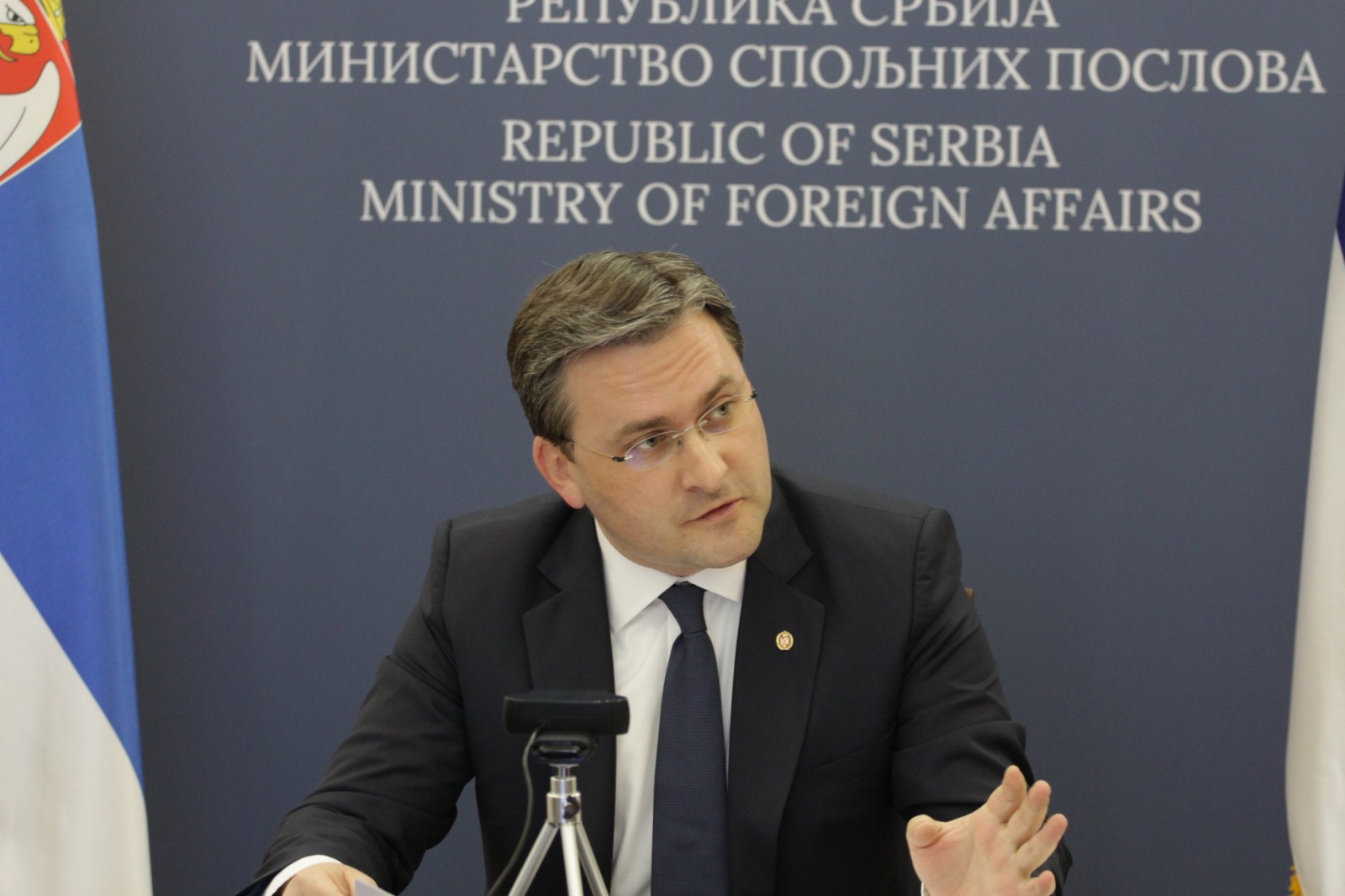
"It is clear that there were victims on all sides in the conflict, as well as that our side has evidence of numerous Serb victims. But the precondition for ensuring the protection of rights that belong to each individual victim is a rational and well-argued approach", Selakovic said responding to the slander of the Pristina representative.
Selakovic underlined that, contrary to the claims of politicians from Pristina about 20,000 raped Albanian women, the information provided by the Commission for the Verification and Recognition of Sexual Violence Victim Status indicates 912 raped persons, however, failing to include in this number the Serb women who were victims of violence.
"Let me emphasize that Serbia condemns every act of sexual violence in conflicts and is committed to achieving justice for all victims. The number of victims certainly does not diminish the horrific effect of this type of violence on each victim individually, but also, speculating on numbers does not contribute to justice being served and leads to politicization and slowing down the reconciliation process", Selakovic said.
Regarding the genocide accusations, Minister Selakovic stated that they only went to prove that Pristina further persisted in its campaign of hatred, propaganda and open hostility towards the Serbian people.
"Through statements given on a daily basis, they attempt to paint a picture that Serbia is to blame for everything and that genocide was committed against Albanians, all in order to hide their own responsibility for the committed crimes", the Serbian Foreign Minister said.
He underlined that anyone who knew what the definition of genocide implied would understand that it was not Serbia that committed something, but that the Serbian people was instead a victim of the "state-building" project of the Kosovo Albanians, based on the dangerous idea of ethnically clean territories, as evidenced by more than 200,000 expelled Serbs from Kosovo and Metohija.
"We are convinced that the civilized world will not agree to be their accomplice in concealing and covering up their crimes, and that a clear message will be sent to them that they must take responsibility for their actions", Selakovic said.
He reminded that until 1999, around 40,000 Serbs lived in Pristina, and that today there were only about twenty of them, that around 17,000 Serbs lived in Pec, and that today there were only the Serbian nuns in the Patriarchate of Pec, that around 12,000 Serbs lived in Prizren before the war, and that today only 17 families remained there, and that in Urosevac, out of 10,000 Serbs who lived there before the war, only the family of a Serbian priest remained. |
|
|
| Marking the Day of Remembrance of the victims of the NATO aggression |
|
24 March 2021
President of the Republic of Serbia Aleksandar Vucic made a statement on the occasion of marking the Day of Remembrance of the victims of the NATO aggression.
"Your Holiness, distinguished Chairman of the Presidency of Bosnia and Herzegovina, distinguished Speakers of the National Assemblies of the Republic of Serbia and the Republic of Srpska, distinguished Prime Ministers of the Republic of Serbia and the Republic of Srpska, distinguished Ministers of both Governments, dear guests and friends, representatives of the Serbian People from Montenegro, North Macedonia, Croatia, thank you for the fact that we are all together tonight and that the Serbian spirit is unbreakable and invincible. 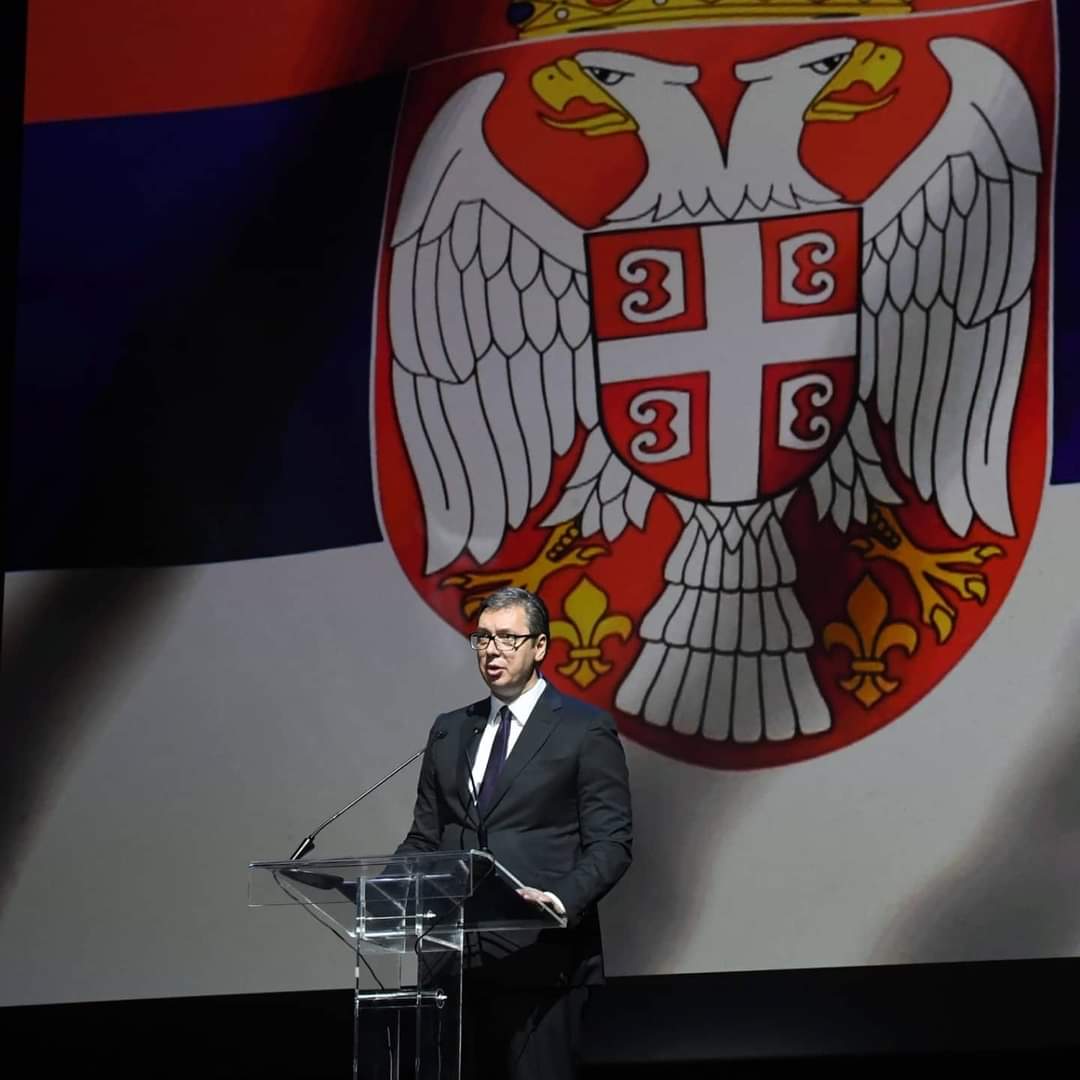
One child a day and a little more than that. That is the most difficult, sickening and painful number of the NATO aggression from 1999. Killed, stopped, guilty of nothing, having committed no sin, without the right to defence, without the right to justice and without the right to life.
No one has ever been held accountable for this crime, a crime greater than a crime. No one, for the 2,500 killed civilians, but also soldiers and policemen who were only guilty of guarding, protecting themselves and their homes. No one has ever been held accountable for more than 6,000 persons injured.
Even today, 22 years after the aggression, it is not possible to explain that, there is no universal justification, despite all the work done to that end, there is no reason, it makes no sense, and only names remain, as eternal as sin.
Miljana Milic, fifteen years old,
Vladimir Milic, twelve years old,
Miomir Mladenovic, fourteen years old,
Dragan Dimic, three years old,
Julijana Brudar, ten years,
Olivera Maksimovic, twelve years old,
Miroslav Knezevic, thirteen years old,
Dajana Pavlovic, five years old,
Stevan Pavlovic, eight years old,
Marko Simic, two years old,
Milica Rakic, three years old,
Ivan Ivancic, seven years old,
Marko Ivanovic, three years old...
And the list goes on, eighty nine names, not only Serbian ones...
The senselessness of sheer killing did not choose. Sixteen children, aged two to seventeen, from the Ahmetaj and Hasani families, were killed in a convoy returning home to Prizren.
In one headline in the West, this was simply explained as a "tragic mistake". The deaths of Marko Roglic, Milan Ignjatovic, Gordana Nikolic, Irena Mitic, Milica Stojanovic, Bojana Tosovic, Branimir Stanijanovic, our Sanja Milenkovic...could not expect or get even such an explanation.
Those deaths were not tragic, for those who caused them, much less a mistake. It was just an excuse, a miserable excuse.
They were a result of intent and a clear decision, as a severe judgment against one country, its people, its children.
And that is why today we will refrain from speculation in giving a name to everything that happened during the spring of 1999. Because a crime happened, a heinous and terrible one. And it was an aggression, not a bombing, not an intervention, not a campaign, not an operation. An aggression is what happened. An attack on a sovereign country, without a decision of the United Nations, without a sufficient reason that would justify attacking the then Yugoslavia or a neighbouring or NATO country.
No one was attacked by Serbia or the Federal Republic of Yugoslavia at that time. They attacked us, with one goal. To defeat us, to keep killing us, and in the end to take away a part of our territory.
And no matter how much we analyze things today, no matter how harsh and critical we are towards ourselves, our policy and leadership at the time, it is clear that the Federal Republic of Yugoslavia and Serbia were left with almost no choice then. The choice was horrible, either the loss of territory and people on the one hand, or the complete disappearance of the Serbian state, morals, honour, Serbian spirit, names and surnames. And we could not help but lose. Nineteen big ones attacked one small country, the Federal Republic of Yugoslavia. They attacked both Serbia and Montenegro. And even when they don't talk about it today, in one of the two independent countries, those are the facts. And that small country, and that small nation, to all nineteen of them so great and powerful, held a lesson in what matters most - honour, morals and love for freedom that a nation can have.
Yes, justice, lest we forget justice. All those nineteen great ones today still silently talk about their military success, avoid answering questions, while - can you imagine, one small, only numerically small Serbian people, that small but magnificent nation, with sadness, tears in their eyes, proudly remembers their resistance and struggle against the nineteen cruel and arrogant ones.
We lost a lot, we lost our fathers, brothers, spouses, children, but the honour and Serbian heart are still there, to protect Serbia, which is eternal and indestructible.
We lost children, we lost people, we lost control over a large part of the territory, we lost billions because of the destroyed infrastructure and economy.
And all that was left for us was the body of a tortured, destroyed country, a country in disintegration, mutilated, looted, wounded, deserted, and guilty, condemned for everything that happened not only in the 1990s, but throughout history.
A country that, even ten years after the aggression, did not have the strength to stand up, rise to its feet, and do anything but be silent, or bow its head and obediently apologize, for everything, even for its dead, even for its murdered children.
Today, it is no longer that failed, tortured, devastated, mutilated Serbia.
Today, it is Serbia, which has found its strength and its pride again.
Serbia, which calls things by their real names.
Serbia, which turned its back on war and defeats, and started working.
Serbia, which rose to stand on its own feet and has a voice of its own.
Serbia, which, even when they don't believe it, they listen to. Which is capable, which is growing, and is no longer part of the problem. Serbia, which is and will be, at least we will do our best to this end, the very solution that enables the entire region to live in peace and understanding.
And that Serbia, today, when there are still many more bombs in the world than vaccines, sends not bombs, but precisely those vaccines to the region. Today, it is ready to produce them as well, and in just a few months we will do just that, but not only for ourselves, but also for others, for the entire Balkans.
We are ready, and we are willing to help.
We are not ready to be and we will not be silent, nor be humiliated again.
We draw the right to that not only from the victims we had, but also from the fact that we stopped looking at others only a long time ago, and looking for fault and guilt only in them, and not sometimes in ourselves as well.
We looked at each other and admitted. Every loss, every defeat and every crime that someone committed in our name, every failure and every wrong policy.
And we are no longer doing anything that could endanger anyone.
We continue to work and work, and grow more and more, gaining strength with only one goal - to be the best in economy and education, health, in culture, science, sports...
And we want to be safe, on our own. We want our army to be much stronger than it was in 1999. So that we never again face a situation that someone is killing our children, destroying the country, or expelling our people.
We want to remain free, to decide our own destiny, and for no one to take everything away from us ever again, and give us nothing.
And that nothing today, and I will repeat it as much as necessary, is the idea of some great, powerful ones, but also those who serve them, the idea that "Kosovo" should recognize us, so that we could recognize "Kosovo".
We do not need that recognition. And Serbia will not allow you to walk over our victims, our history, our past, but also to walk over our future. You will get the answer of reasonable, kind and responsible people. We need a compromise. We need all the obligations that we and Pristina have assumed to be fulfilled, but only we have fulfilled them so far.
And this is not our whim. It is not a phantasmagoria about a Serbian world that we want to create.
Even today, when they threaten us with the formation of a Greater Albania, when they say that the Community of Serb Municipalities is not going to happen, it is ours to be calm, to take care of our people in Kosovo and Metohija, but to send a clear message to all those great, powerful ones that we are not as weak as we were, that we will be able to preserve what is our own, not touching anything that belongs to anyone else. After all, Serbia is not and will not be but a handful of oats that every crow from the whole wide world can eat. As for those who used the strength and power of the nineteen arrogant and cruel ones, I only ask them not to threaten us. Please, please, don't threaten us. They should not think that Serbia is broken and that it will not have the strength to respond. Please, please, our Albanian neighbours, do not threaten us. And we ask all others, who have demonstrated their cruelty towards Serbia, not to help you in that. That is all we are asking and nothing more.
And we will respond to calls for peace, calls for compromise, and always with good will, because we do not want to have children killed again. And we do not want the children of others to suffer again. But do not underestimate Serbia, and do not look at Serbia with the same eyes as you did in 1999.
Today, Serbia is much stronger, much more powerful. Today, Serbia is a united country of togetherness, not a divided one. Today, Serbia is incomparably stronger and better in every aspect than it was in 1999, from the economy to our army. And we will never threaten anyone, we just ask you and request from you to respect us and nothing more.
Today, we are building roads that will connect us, among ourselves, with the region and with the world. Until the end of the year, we will work on eight motorways, on eight routes in the entire Balkans, not only Serbia, eight roads of peace and cooperation.
Only a crazy person would trade this for war, for dead children, for demolition and new loss. And yes, we want to have the closest relations with everyone who took part in the aggression against our beautiful Serbia, we have forgiven a long time ago, but no, we will never forget. And don't ask us to. That one day, every year, we will remind both ourselves and you. The nineteen of you, the most powerful, strongest, greatest in terms of might and force, but not so much when it comes to honour and morality. We will keep remind you and ourselves, just so it would never happen again. Not to us only, but to none other freedom-loving people in the world.
And if we have an offer, today it reads as follows: we are ready to make the whole Balkans a winner, for everyone to win, as long as no one tries to make Serbs the only losers.
And the path to this goal is not difficult at all.
We just need to respect and understand each other and not try to humiliate each other.
And not to touch into what everyone paid the highest and bloodies price for. Freedom.And we, Serbs, know the price of freedom.
Into our right to have it, to keep it and to remember all the victims who are part of it.
And our defeats, our lives and our children are built into ours. And the lives of our heroic pilots, and our giants from Kosare and Pastrik, and our children, innocent, completely innocent, and only guilty of living in Serbia.
This is too high a price to be quiet about it.
Because that would mean that we are ready for another defeat, for another humiliation.
And we are not.
And when all go quiet, we will keep repeating.
A child a day, and a little more. This was how much you killed us. In an aggression that even you did not understand why you carried it out.
And we will keep repeating this, just so it does not happen to us again.
With special reverence, we are fulfilling our obligation to pay tribute to all innocent Serbian victims who laid their lives on the altar of the homeland, both civilians and our heroic soldiers and policemen, the heroes of Kosare, Prizren, Mitrovica.
Today, for us Serbs, life in Kosovo and Metohija is like Via Dolorosa, using their last strength on the road to Golgotha, but we would not be Serbs if we were not capable to "exist in a terrible place".
And today, tonight, I can conclude with one important sentence. On the soil of Europe, there was, and today is stronger than ever, an indomitable, unwavering, unconquerable and never conquered Serbia.
May eternal glory be to all the victims of the NATO aggression and let us all exclaim together - long live free and proud Serbia", President Vucic said.
Source:www.predsednik.rs
Photo:www.predsednik.rs |
|
|
| Selakovic: Serbia is helping the fiscal consolidation of Drvar municipality |
|
18 March 2021
Minister of Foreign Affairs Nikola Selaković met today in Drvar with mayors of Glamoc, Bosansko Grahovo, Drvar and Istocni Drvar municipalities, as well as with the President of the Municipal Assembly of Bosanski Petrovac, with whom he discussed resolving capital and everyday problems of citizens.
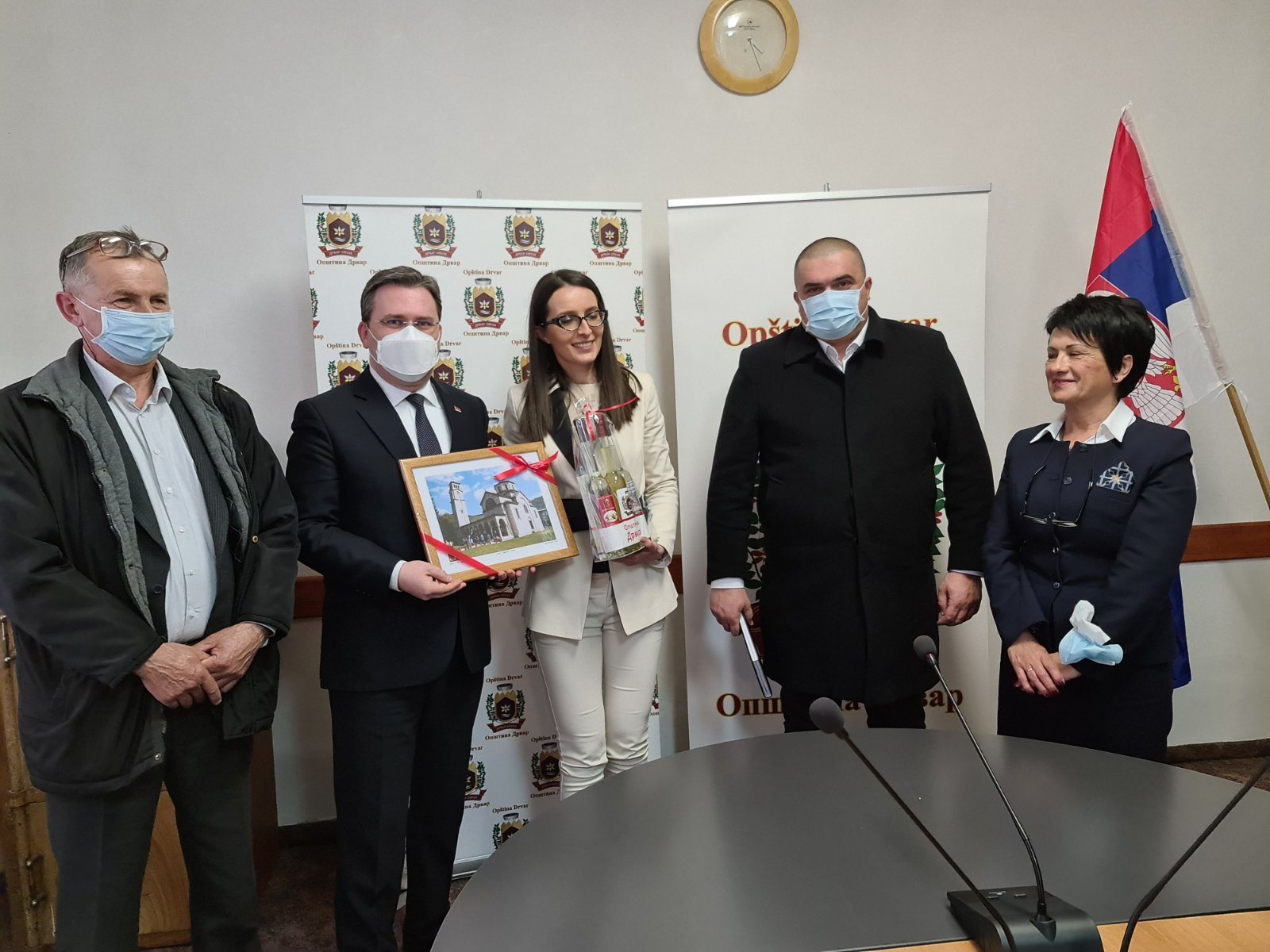
On that occasion, the Head of Serbian diplomacy pointed out that the Republic of Serbia would help the budget, that is, fiscal consolidation of the municipality of Drvar with EUR 530,000, and that these assets would be used for a specific purpose.
"That is good news, especially for people who live in Drvar. In this way, we have demonstrated once again that today, when the economically strengthened Serbia has and earns more, it is ready to share with those who need it the most, and especially with members of our Serbian people, in those territories where life is hard, where it is not easy to survive and where every help is more than appreciated, but also more than apparent as it arrives", the Minister said and pointed out that Serbia would continue to help its people.
Selakovic pointed out that our country was in a position to help owing to serious and difficult austerity and fiscal consolidation measures, which it started to implement in 2014, when President Vucic became Prime Minister, and continued to do so in 2017, when he came at the helm of the Republic as President, and that Serbia, especially in the previous three years, was in a position to help Serbian returnee municipalities more extensively.
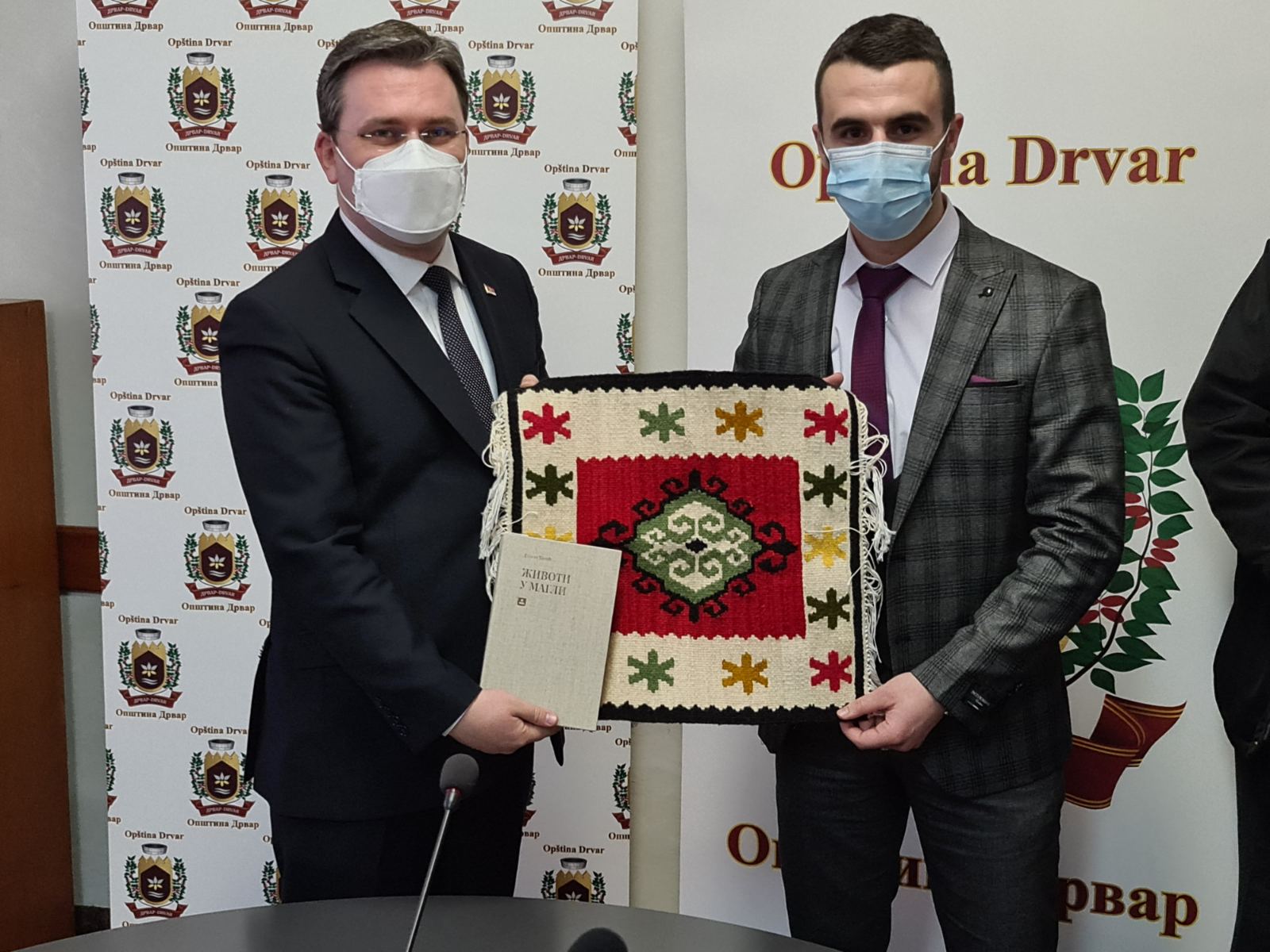
The Minister explained that the assistance concerned, on the one hand, the financing of capital projects, that Serbia participated in the co-financing or full financing of various projects such as the renovation of schools, cultural centers, outpatient clinics, as well as the construction of kindergartens and hospitals. What Serbia did for almost every municipality in the Republic of Srpska, the Minister pointed out, it tried to do in the same way in majority Serb municipalities in the Federation of BiH as well.
Minister Selakovic also emphasized that there was talk of connecting Istocni Drvar and Drvar by building a proper asphalt road which is something a large number of people circulating between the two municipalities missed, which were once part of the single municipality of Drvar.
"Today, I had the opportunity to hear greetings and expressions of gratitude to President Vucic and Serbia for what has been done so far. For example, in Bosansko Grahovo, the elementary school "Gavrilo Princip" was renovated. A serious reconstruction has begun of the Cultural Centre in the downtown area, which has been in ruins for a quarter of a century - 25 years. The construction of a memorial home in the birthplace of Gavrilo Princip, in Obljaj, is also planned", Selaković said and added that the reconstruction of the Cultural Centre in Glamoc was completed, as was the city's public lighting, and that investments would continue in the construction of a sports hall, which will enable carrying out altitude sports preparations there, as was possible some thirty years ago.
Furthermore, the Minister pointed out that they discussed specific assistance that would be earmarked for people who are engaged in agriculture in the municipality of Bosanski Petrovac, as well as the renovation of schools and school infrastructure in the territory of that large western Bosnian municipality.
Selakovic also said that the interest in specific investments had grown, such as the opening of a "Yumco" company plant, which was inaugurated by President Vucic and Serbian Member of the Presidency Dodik, and that there were specific proposals from other municipalities, where they believed that the Republic of Serbia could help.
Selakovic underlined that a joint meeting of representatives of Serbia and Srpska with representatives of chambers of commerce was planned for the end of the month. The Minister pointed out that at that meeting, to be held in Drvar, they would discuss concrete interventions when it comes to the economic development of those municipalities and that all possibilities would be considered as to how Serbia and Srpska could help, by joining forces with their chambers of commerce, the Serb returnees stay there and persevere.
"We will continue these efforts and I am convinced that in the future you will be able to meet with the Director of the Office for Cooperation with the Diaspora and Serbs in the Region much more often here and that through specific projects in preschool, school education and cultural activities, we will be able to, as the Office for Diaspora of the Ministry of Foreign Affairs, provide assistance in a much more specific and extensive way than it was the case so far", the Minister underscored.
The Mayor of the municipality of Drvar Dusica Runic pointed out that the EUR 530,000 assistance provided by the Republic of Serbia would secure financing for the public kindergarten, founded by the municipality.
"It was agreed that Serbia continues to help the municipality of Drvar. This time, it is not about specific infrastructure projects, but about the consolidation of the budget of the municipality of Drvar, which supports a large number of public institutions and kindergartens. Salaries for the staff of "Majka Hrabrost" public kindergarten will be covered owing to the help of the Republic of Serbia", Runic said.
Selekovic pays respects to the victims of the Defense Patriotic War 1991-1995
By visiting Drvar, Minister of Foreign Affairs Nikola Selakovic brought to an end his official two-day visit to Bosnia and Herzegovina.ž
Having met with mayors of the municipalities of Drvar, Glamoc, Bosansko Grahovo and Istocni Drvar and the President of the Municipal Assembly of Bosanski Petrovac, Minister Selakovic visited the Memorial to those killed in the Defense Patriotic War of 1991-1995. Selakovic laid a wreath at the memorial monument in the shape of an Orthodox cross, on which the names of 300 fallen fighters and civilian victims of the war in the municipality of Drvar were engraved, thus paying tribute to the victims of the patriotic war.
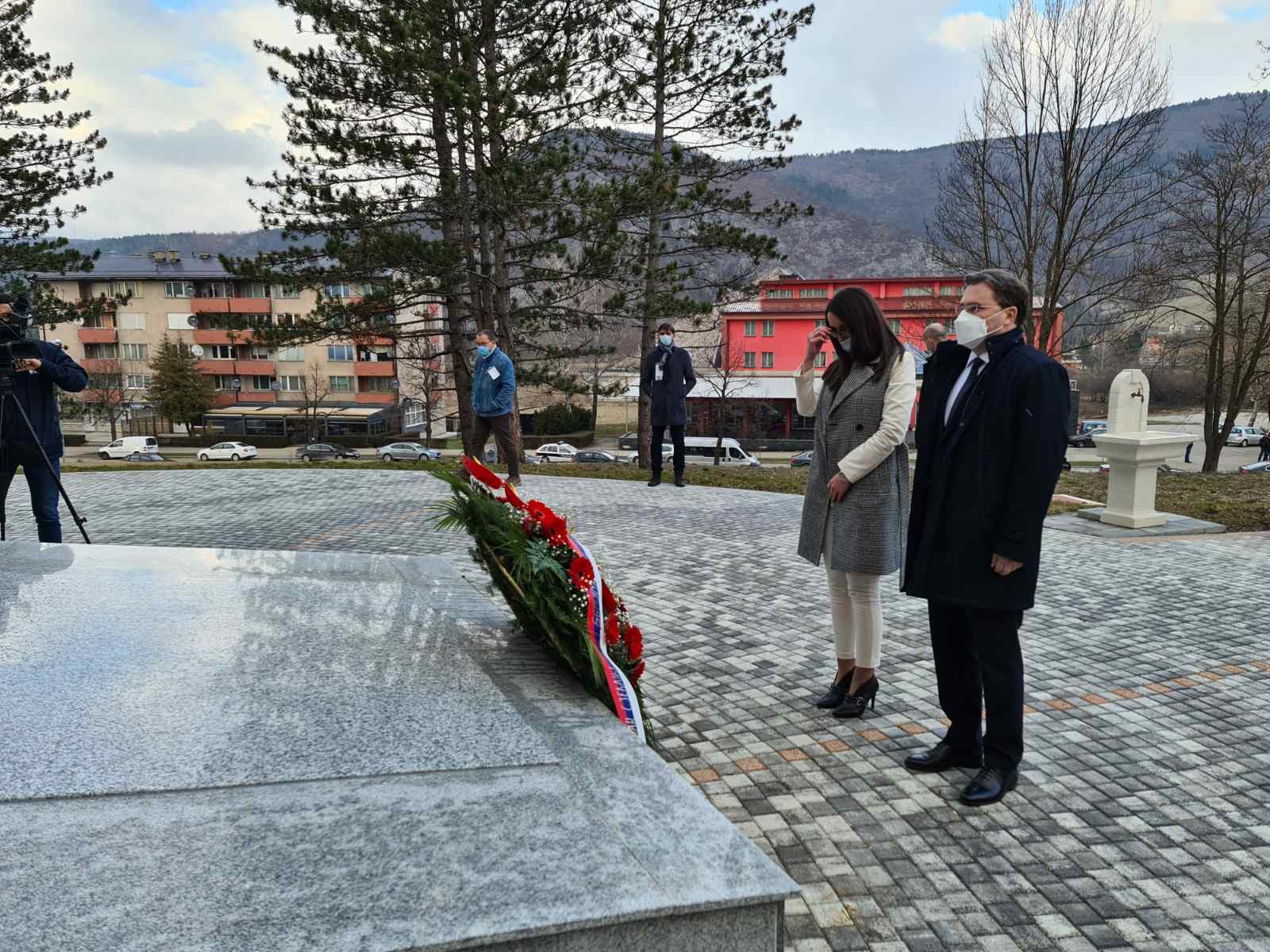
In Drvar, the Serbian Foreign Minister also visited the reconstructed premises of the Emergency Ward of the Health Center, for which the Serbian Government provided about EUR 230,000.
The rooms and the heating system were reconstructed in the Emergency Ward, full emergency room equipment was procured, including a digital x-ray machine.
On the first day of his visit to Bosnia and Herzegovina, Selakovic met with his BiH counterpart Bisera Turkovic, BiH Council of Ministers Chairman Zoran Tegeltija, RCC Secretary General Majlinda Bregu and President of the Republic of Srpska Zeljka Cvijanovic.
Yesterday, he visited the Old Orthodox Church in Sarajevo and met with Metropolitan Hrizostom of Dabar-Bosnia, while this morning he visited the Serbian cemetery in that city and laid a wreath in at the Vidovdan Heroes Chapel where the remains of Gavrilo Princip are kept.
On the second day of the visit, Selakovic also met with Members of the Presidency of Bosnia and Herzegovina - Milorad Dodik, Zeljko Komsic and Sefik Dzaferovic.
Source: Tanjug |
|
|
| Minister Selakovic and BiH Presidency Members discuss the intensification of bilateral cooperation |
|
18 March 2021
Minister of Foreign Affairs of Serbia Nikola Selakovic met today in Sarajevo with the Members of the Presidency of Bosnia and Herzegovina (BiH).
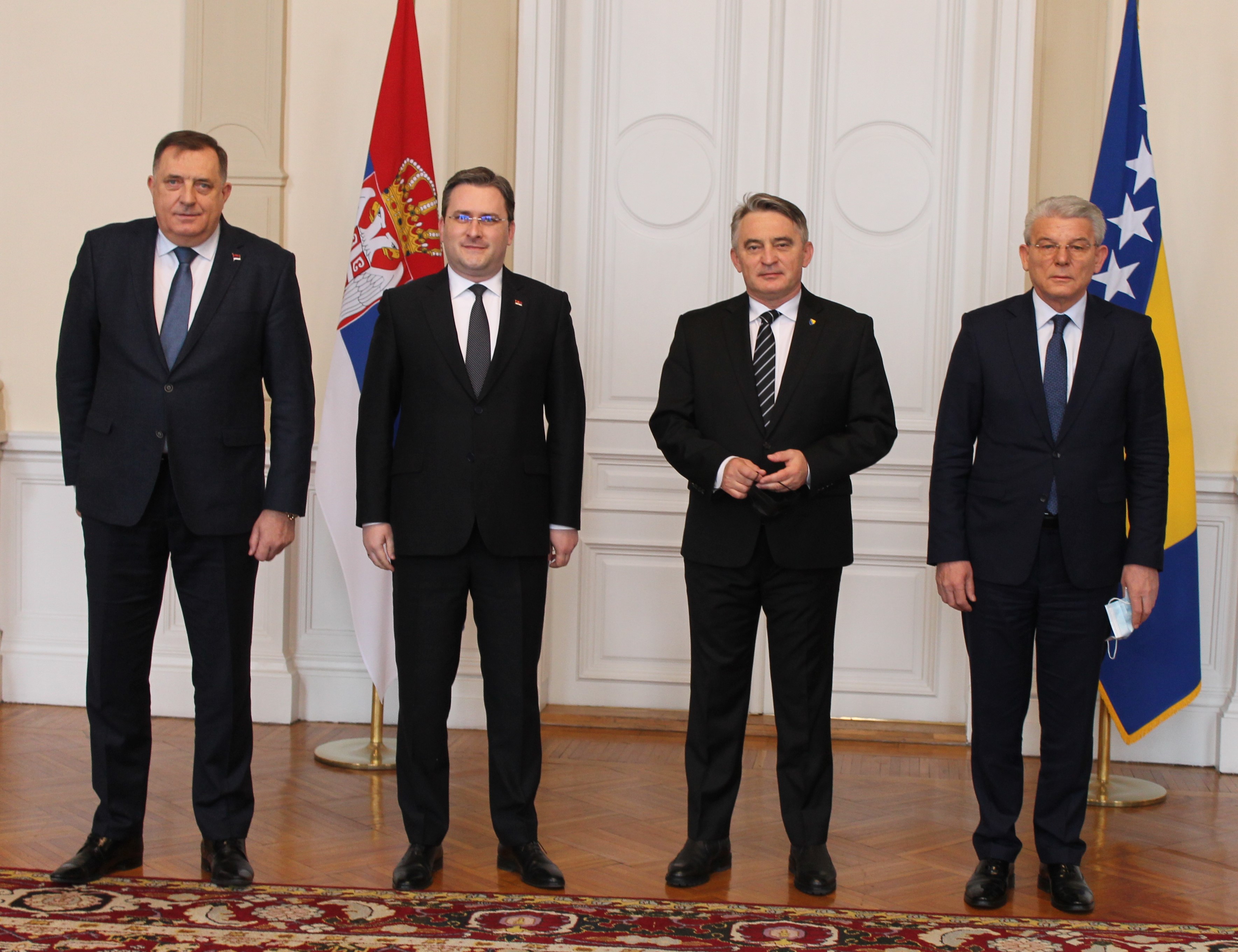
It was noted at the meeting that the relations between the two countries improved over the past few years, and Members of the BiH Presidency expressed gratitude to Serbia and President Aleksandar Vucic for their solidarity in the fight against the pandemic and for the Covid-19 vaccines donation.
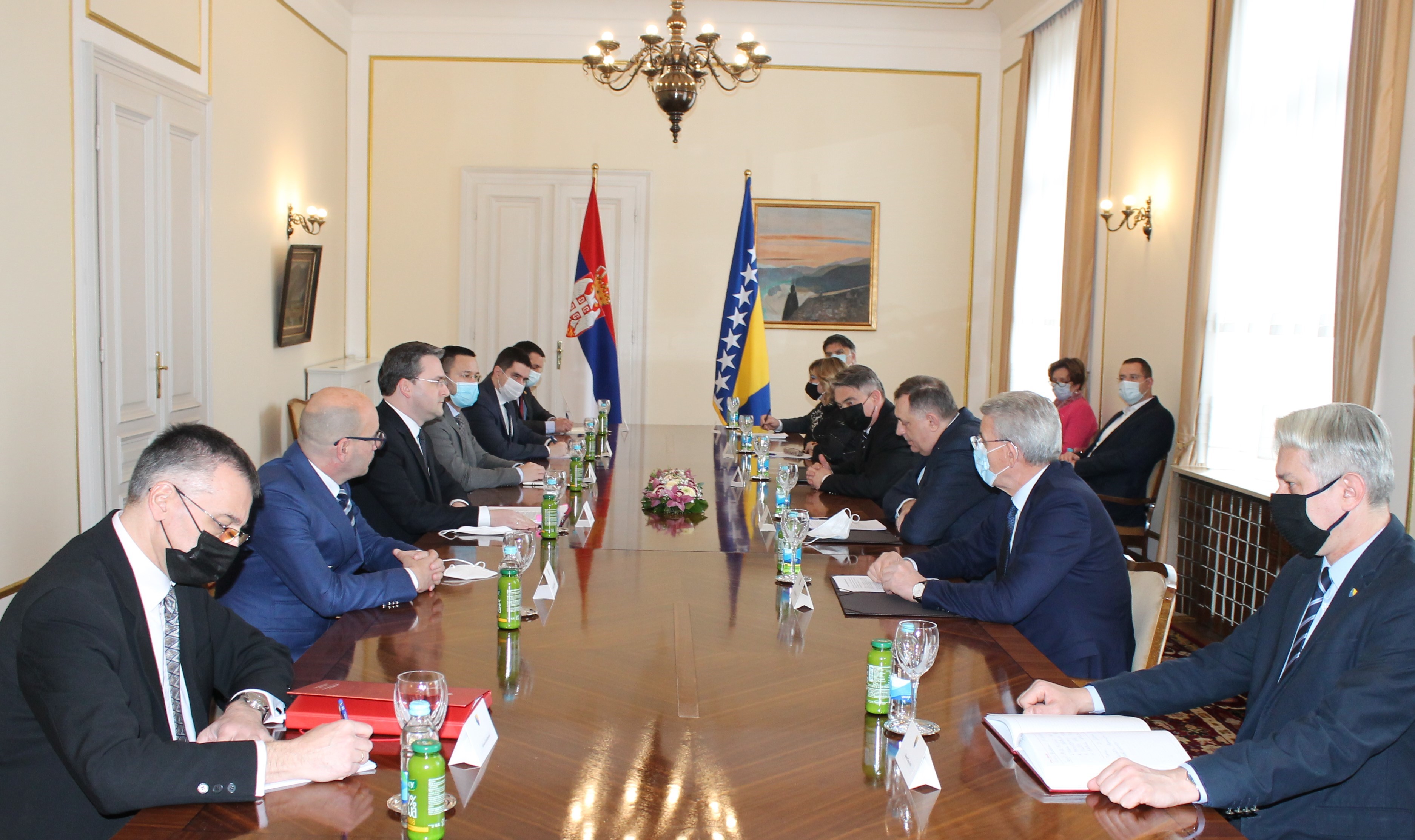
The interlocutors stressed the importance of intensifying bilateral relations and resolving open issues through a sincere direct dialogue, without the participation of third parties.
Minister Selakovic stated that Serbia was interested in preserving peace and stability in the region, and especially in Bosnia and Herzegovina and that it was committed to preserving the integrity of BiH as well as the Dayton Peace Accords, which envisaged the existence of two entities and three constituent peoples.
Selakovic added that Serbia was grateful to BiH for its principled and clear position concerning non-recognition of the unilaterally declared independence of the so-called Kosovo and for its support to Serbia in international organizations regarding Pristina's requests for membership.
The importance of strengthening economic cooperation was emphasized at the meeting, which, as it was stated, can lead to a relaxation of the political atmosphere in the region and, in this context, the "mini-Schengen" initiative was assessed as a good idea and a path towards connecting countries and peoples in the Western Balkans, the free flow of people, goods, services and capital, and joint participation in third markets.
The interlocutors expressed support to the initiative of President Vucic to hold a Serbia-BiH economic forum in Belgrade.
The importance of the realization of infrastructure projects was also discussed at the meeting, underlining the Belgrade-Sarajevo motorway as a priority, and in the period ahead, considering the reconstruction of railway connections as well. |
|
|
| Selakovic: Serbian Orthodox Church is a pillar of survival of the Serbian people |
|
17 March 2021
Minister of Foreign Affairs Nikola Selakovic visited in Sarajevo Metropolitan Hrizostom of Dabar-Bosnia, with whom he discussed the position of the Serbian Orthodox people.

The Head of Serbian diplomacy emphasized that the Serbian Orthodox Church had been a pillar of the Serbian people's survival through the centuries, that it existed even before the Serbian state, and that it preserved national consciousness and faith among the people.
"Even today, among the few Serbs here in the Federal part of Sarajevo, but also in East Sarajevo, Foca, Romania, Sokolac, Pale and other areas, His Eminence the Metropolitan serves God and its people and perseveres, and to us as officials of the Republic of Serbia and myself as Minister of Foreign Affairs of a country that cares for Serbs outside Serbia, it is a pleasure to be able to meet with him every time and hear his thoughts on how we can help and promote the position of our Serbian Orthodox people, but also of our church", the Minister said.

The Minister added that he was convinced that more action would be taken to this end in the future, but also that the Metropolitanate of Dabar-Bosnia was facing problems for decades that cannot be resolved in a day.
"But when we act by joint forces, when we fight for something together, there is a much greater probability that we will succeed", Selaković said and thanked the Metropolitan for his wonderful hospitality.
Furthermore, the Minister thanked Metropolitan Hrizostom for fighting that, as he pointed out, the ancient Metropolitanate of Dabar-Bosnia, founded among the first within the Serbian Orthodox Church, still to this day survives in those areas both in the territory of the Federation and in the territory of the Republic of Srpska.

Metropolitan Hrizostom said that he exchanged ideas and thoughts with the Serbian Foreign Minister on the position of Serbs in Sarajevo and in the entire Metropolitanate.
"I am glad that we are able to welcome the Minister of Foreign Affairs in our Metropolitanate, and thank him for everything he does for the Serbian people, the church, and above all for Serbia, but also for the good relations that we need to develop as Serbia and Bosnia and Herzegovina, for the good of the Serbian, Bosniak and Croatian peoples", said the Metropolitan.

He welcomed the visit of the Minister and pointed out that Selakovic originated from that Metropolitanate.
"This is his home as much as mine. All who once belonged to the Metropolitanate of Dabar-Bosnia will always be the children of this home. I am glad that you are here with us today and that you honoured us with your visit, I would like to thank you and wish you to feel joyful and comfortable", Metropolitan Hrizostom said.
After the meeting with the Metropolitan, Minister Selakovic visited the Old Church of the Holy Archangels Michael and Gabriel in Sarajevo, which, according to tradition and archaeological data, dates back to the Middle Ages.
On that occasion, the Minister wrote the following in the visitors’ book:
"As a witness to the longevity of Serbian Orthodox Christian spirituality, the times of glory and suffering, it stands there like the Cross of the Lord and attracts those who find salvation in prayer - our old Serbian church in Bascarsija, showing everyone the indestructibility of our faith, our spirit and people." |
|
|
| LA REPUBLIQUE DE SERBIE AU MOIS DE LA FRANCOPHONIE |
|
La République de Serbie en qualité de membre associé à l'OIF, de concert avec toute la communauté francophone dans le monde entier, célèbre le Mois de la Francophonie. Pour tous les amateurs de la culture serbe et de la langue française, le Ministère de la Culture et de l'Information de la République de Serbie a préparé un vaste programme et le Consulat Général de la République de Serbie à Herceg Novi vous invite à découvrir la diversité et la richesse de la culture serbe en français.
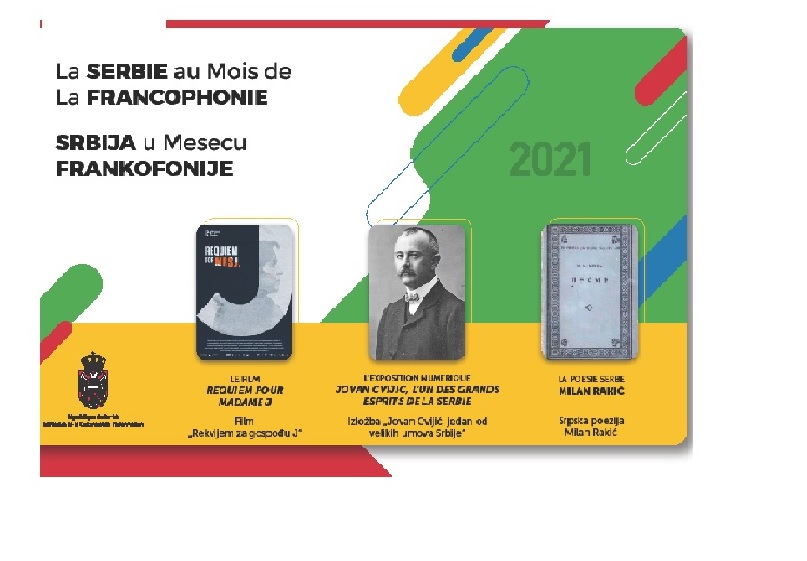 |
|
|
| Selakovic: Very important good-neighborly relations between Serbia and Bosnia and Herzegovina |
|
17 March 2021
Minister of Foreign Affairs Nikola Selakovic met today in Sarajevo with Minister of Foreign Affairs of Bosnia and Herzegovina Bisera Turkovic.
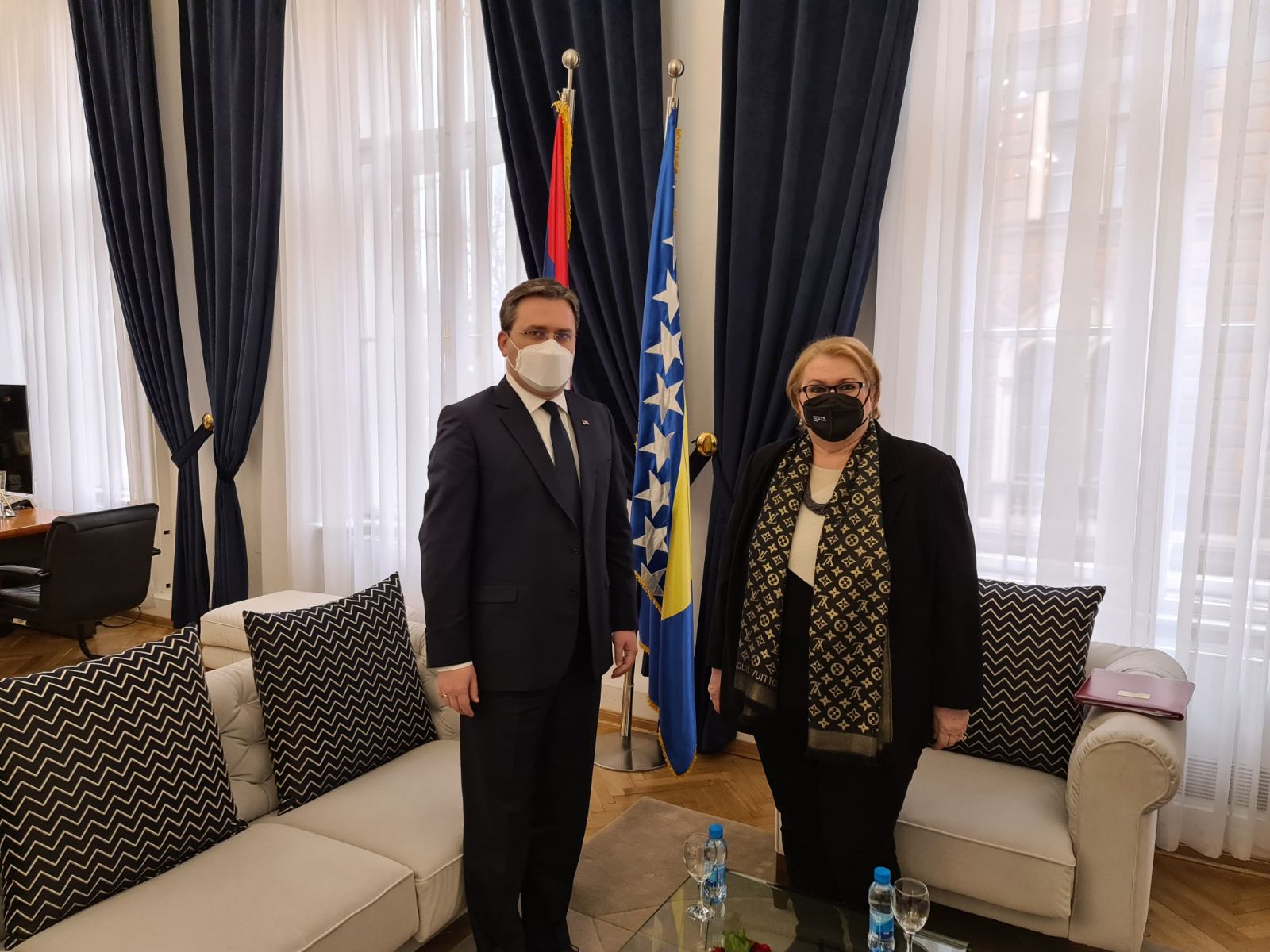
On that occasion, Selakovic, who is on a two-day official visit to Bosnia and Herzegovina, pointed out that good-neighbourly relations between Serbia and Bosnia and Herzegovina (BiH) were very important and that the cooperation between the two countries was the most fruitful in the field of trade and economy.
The Head of Serbian diplomacy underlined that our country was a major foreign trade partner of BiH, but that BiH was also a major foreign trade partner of Serbia.
"Our trade in goods amounted to more than EUR 1.74 billion in previous year, the year of Covid when there was a decline in both exports from Serbia and exports from BiH, but the exchange was maintained at an extremely high level", Selakovic emphasized.
Furthermore, the Minister pointed out that the economic cooperation between Serbia and BiH was also reflected in investments, according to which, as he explained, Serbia ranked third among the countries that invested in BiH.
"These are the essential reasons for Serbia's interest in stability, not only in BiH, but in the entire region", Selakovic noted and added that the economy was the strongest link.
He explained that the region, if it takes the same position, could achieve much more on the EU market, since us in the Western Balkans region individually represented "absolutely nothing" for the EU market of close to half a billion people, and that our products and economies alone cannot be competitive in the Union.
The Serbian Foreign Minister underlined that he was glad to hear that BiH was interested in and that it supported the continuation of all regional initiatives, such as the "mini- Schengen", stressing that it would be very important for BiH to join Serbia, Albania and North Macedonia in that initiative, despite the serious and numerous problems that we "inherited from the past and that we are certainly working to resolve".
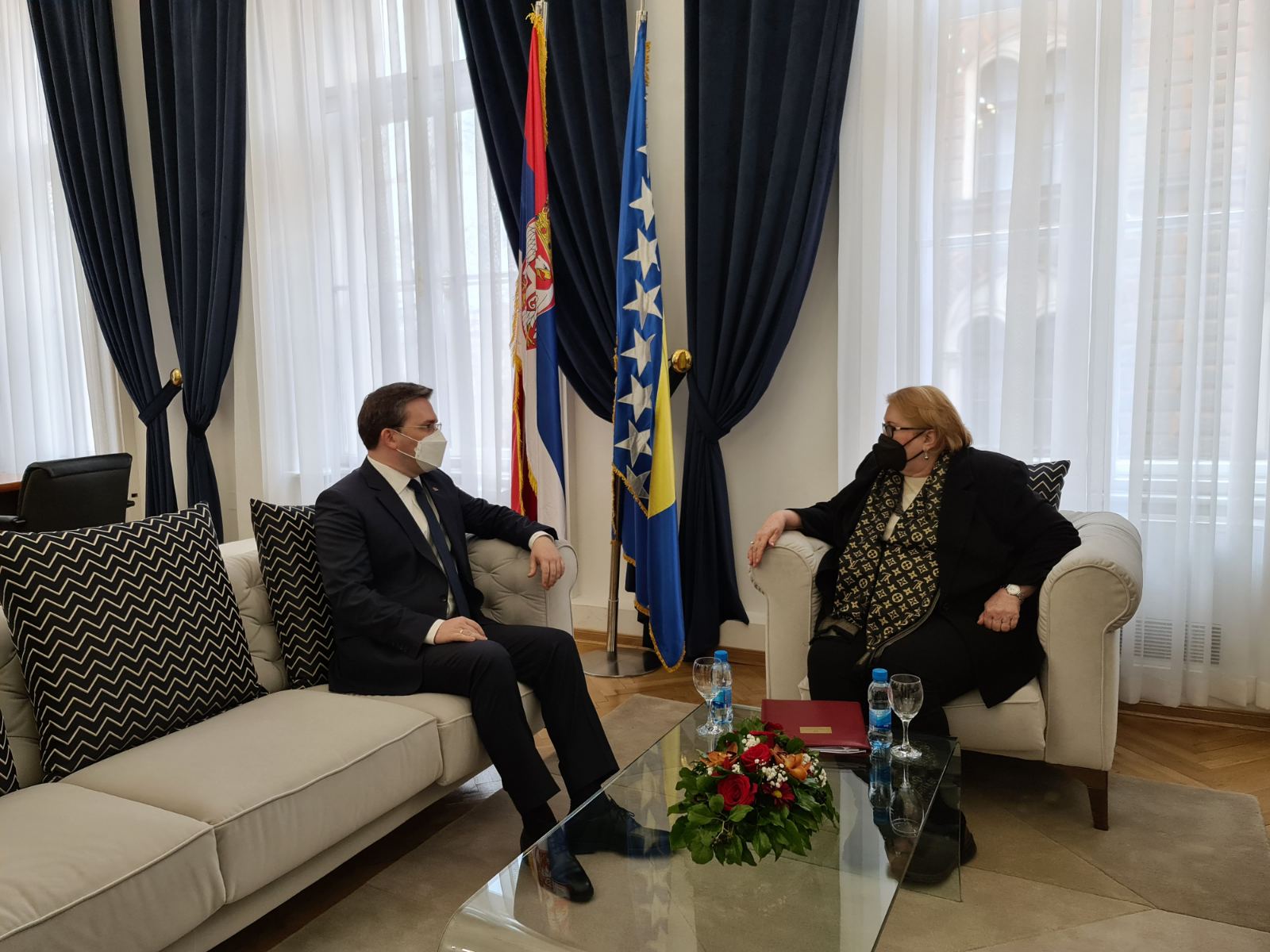
Minister Selakovic also said that Serbia respected the territorial integrity of BiH, its structure of government on the basis of the Dayton Peace Accords, and that, as a state signatory and guarantor of that agreement, it had an interest in stability and peace in the region.
"Serbia has respected and will respect every agreement that exists at the level of BiH between both entities and all three constituent peoples - the Federation as well as the Republic of Srpska with which, in accordance with the Dayton Peace Accords, Serbia fosters special relations", Selakovic said.
The Minister emphasized that Serbia was equally willing to develop cooperation with the Republic of Srpska and the Federation, but also with BiH itself, and that his visit to Sarajevo demonstrated the desire to intensify our political dialogue.
Relations between Serbia and BiH are not only maintained in bilateral formats, Minister Selakovic said stressing that the agreement from Antalya was being implemented in the trilateral format of Serbia, BiH and Turkey, which envisaged that the joint trade office in Istanbul would start functioning in full capacity in May this year.
Selakovic said that he discussed with Minister Turkovic the matter of joint investment in the construction of a hydroelectric power plant on the Drina River, and that the meeting in its essence demonstrated how important were the good-neighbourly relations between Serbia and BiH.
Minister of Foreign Affairs of Bosnia and Herzegovina Bisera Turkovic pointed out that Bosnia and Herzegovina was committed to strengthening the good-neighborly relations and working together to connect the entire region.
"This is in the interest of both Serbia and BiH, as well as the entire region, and today's meeting demonstrated the commitment to improving relations", Turkovic said.
She welcomed the decision of Serbia to give its consent for the opening of the BiH consulate in Novi Pazar and assessed that this was another step towards good-neighbourly cooperation.
In addition, Minister Turkovic thanked Serbia for the assistance in the fight against the coronavirus and reminded that BiH, to the extent of its capabilities, had provided help to Serbia in Novi Pazar when it needed it most. |
|
|
| Selakovic: Special relations fostered between Serbia and Srpska |
|
17 March 2021
Minister of Foreign Affairs Nikola Selakovic met today in East Sarajevo with President of the Republic of Srpska Zeljka Cvijanovic.
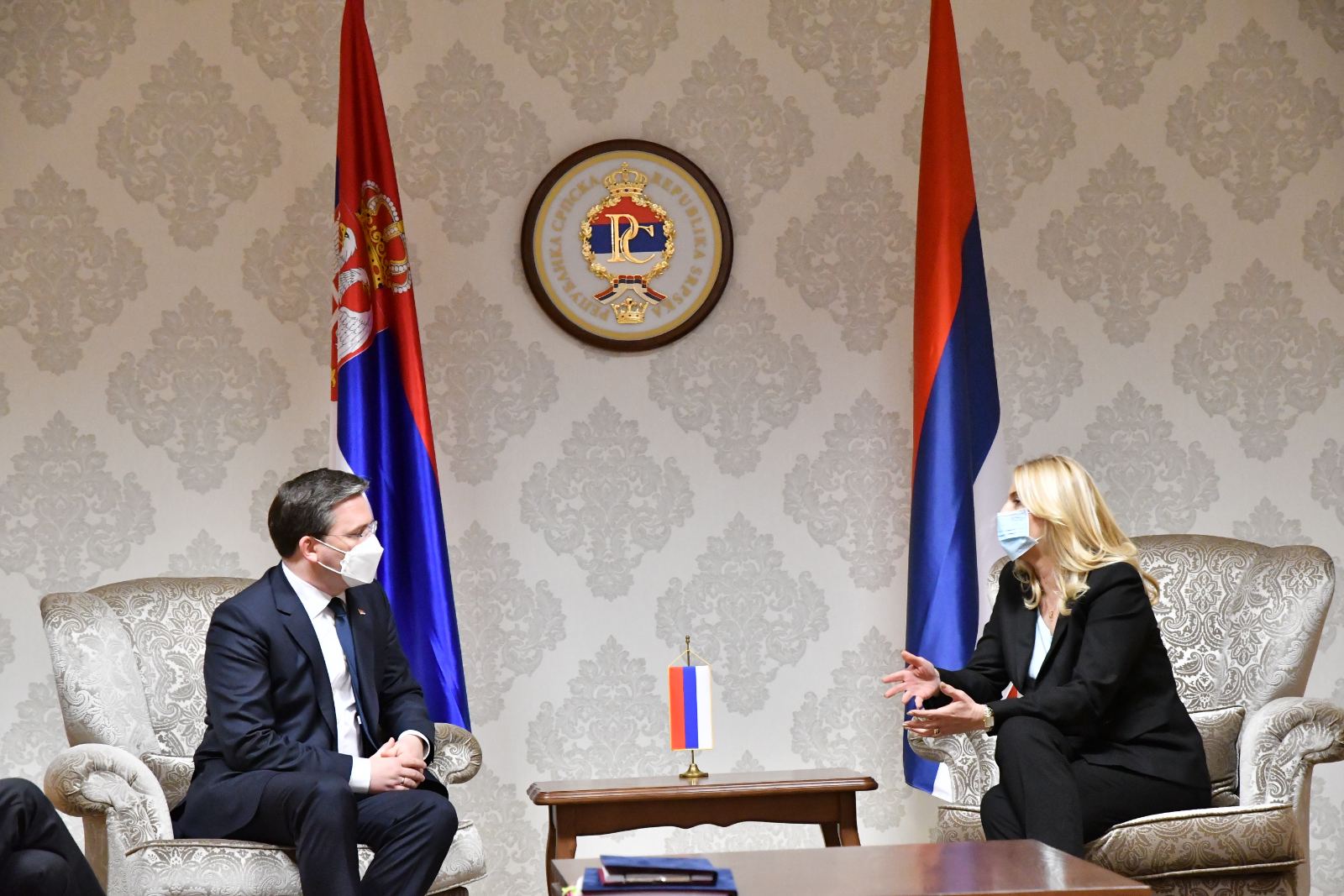
On that occasion, the Head of Serbian diplomacy emphasized that the Republic of Serbia was essentially interested in a stable and peaceful region, because in the period of peace and stability it focused its activities primarily on economic development and good relations, aiming to establish the closest possible economic cooperation in the entire region.
Selakovic said that Serbia, as a guarantor and one of the signatories of the Dayton Accords, respected the state of Bosnia and Herzegovina (BiH) and its territorial integrity, but also that Serbia had an Agreement on special and parallel ties and relations with the Republic of Srpska, as a Serbian entity within BiH, while fostering special relations with the Serbian people in Srpska, but also in parts of the Federation of BiH.
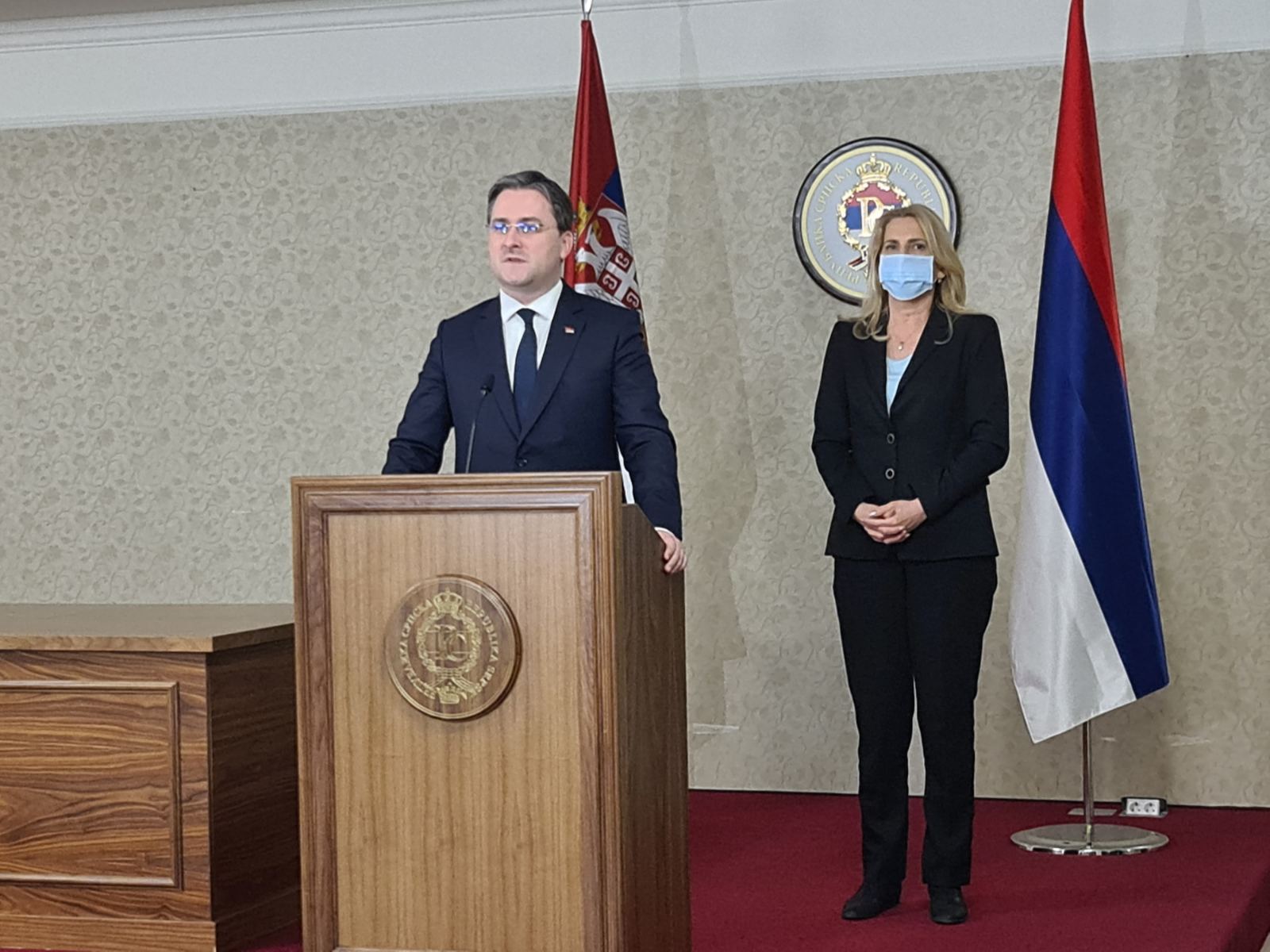
"Along with a wise state policy, which has been promoted and implemented by Aleksandar Vucic, both as Prime Minister and today as President of the Republic, having serious collaborators and interlocutors here and in the Serb member of the Presidency of BiH Dodik and President of Srpska Mrs. Cvijanović, we focused the activity of Serbia primarily on our economic development, the reforms that have brought us the opportunity to have significantly lower public debt, lower unemployment rate and considerably higher average income, but also to be as Serbia the champion in terms of foreign direct investment level, even in the pandemic year, and to promote exactly that - a positive, good agenda, a good relationship", Selakovic said.
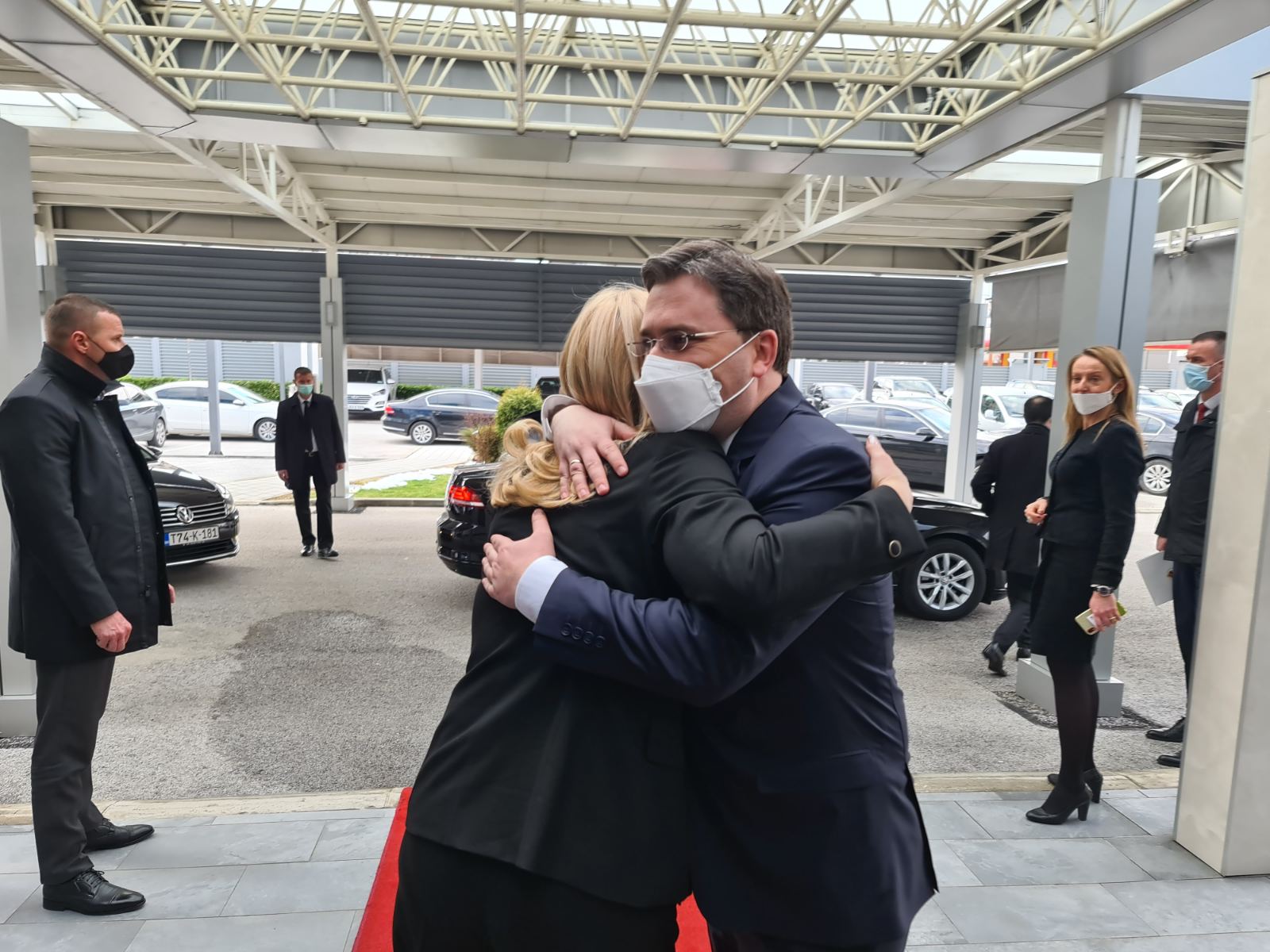
The Minister emphasized that Serbia would continue to behave in such a responsible way towards the entire region in the future as well, to appreciate and respect all its neighbours, striving for normal and principled cooperation with everyone, but also that it loved the Serbian people as its own, wherever they lived.
"We respect BiH in the same way, but the Republic of Srpska we love and we will continue to cooperate in this way with Srpska and the Serbian people in those municipalities of the Federation of BiH where they are a majority population. Until recently, it relied only on Srpska, and as of recent it can rely on both Srpska and Serbia, and in that way we show how by joint forces, efforts and energy we can achieve much, much more", Selakovic said.
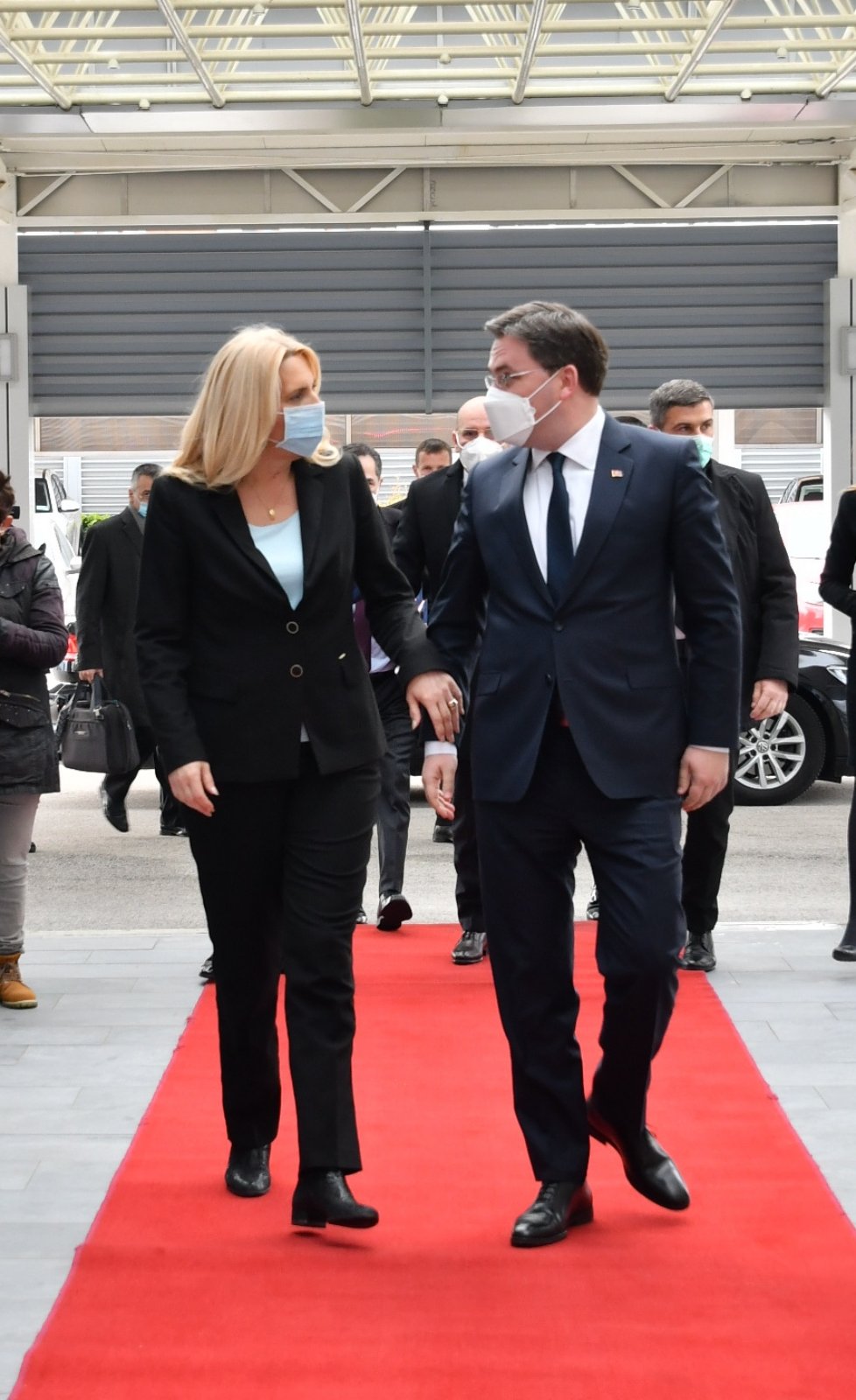
Discussing the joint investment projects of Serbia and Srpska, the Minister expressed hope that this year it would finally be possible to go from Ljubovija to Bratunac over the new bridge "Bratoljub", to cross the border over a single border crossing but, as he pointed out, it was also necessary to embark on the next phase, namely the realization of common economic zones.
As he explained, one such zone was planned to be near the "Bratoljub" bridge, and these were projects, the Minister underlined, which would contribute to a more serious economic development of regions in Serbia and Srpska, which were so far completely neglected, unattended to and underdeveloped.
The Minister pointed out that there were many fields of cooperation, primarily in accordance with the Agreement on special and parallel relations between Serbia and Srpska, as well as under agreements from which Serbia and the entire BiH reap considerable benefits and advantages.
"Those who travel to Belgrade via Bijeljina can already see the first contours of the bridge being built in Sremska Rača, I am convinced that we will soon be able to see the route of the motorway under construction, but I would also like to say that this year, in fact, by mid-December and St. Nicholas Day, we expect to see in Serbia a finished section of the motorway that now goes from Belgrade to Preljina, that is to Cacak, and that it be extended to Pozega and thus closer to our western border, Uzice, Kotroman, Visegrad and the route of the future motorway that will lead to Sarajevo from that part of the country", the Head of Serbian diplomacy said.
Selakovic emphasized that he discussed with President Cvijanovic joint cooperation in the field of strengthening the Serbian diaspora, noting that Serbia was interested in protecting cultural identity and tradition wherever its compatriots, people of Serbian identity and consciousness lived, outside Serbia and outside the former Yugoslavia, while offering a number of opportunities to them, their children and families.
Furthermore, the Minister stressed, Serbia provided support to the Serbian Orthodox Church, which was working on the same task that would be jointly carried out in the future.
Minister Selakovic said that he was pleased to have met with the President of Srpska in the East Sarajevo administrative center, that he visited for the first time, and wished that each subsequent meeting be dedicated not only to plans for the future, but to first include a segment on what was realized, so that people would believe even more that everything that was said and done for a fact had realistic basis and a serious perspective.
President of the Republic of Srpska Zeljka Cvijanovic underscored that she was grateful to Serbia for its support to the Republic of Srpska in previous years, which, as she stated, included large donations that left a mark in each municipality, and particularly emphasized the invaluable help extended by means of a vaccines donation in the difficult period of Covid-19 crisis.
"In the period ahead, we will see how best to realize projects of importance to our citizens. I would like to thank Minister Selakovic for the visit, as we had a very constructive and successful meeting. The Minister has a very balanced attitude towards everyone living in Bosnia and Herzegovina, as well as towards their needs. He is always a welcome guest in the Republic of Srpska, this has been the case and will remain so", Cvijanovic said. |
|
|
| Selakovic, Bregu: Economic cooperation is the key to the development of the region |
|
17 March 2021
Minister of Foreign Affairs of Serbia Nikola Selakovic met today in Sarajevo with Secretary General of the Regional Cooperation Council (RCC) Majlinda Bregu.
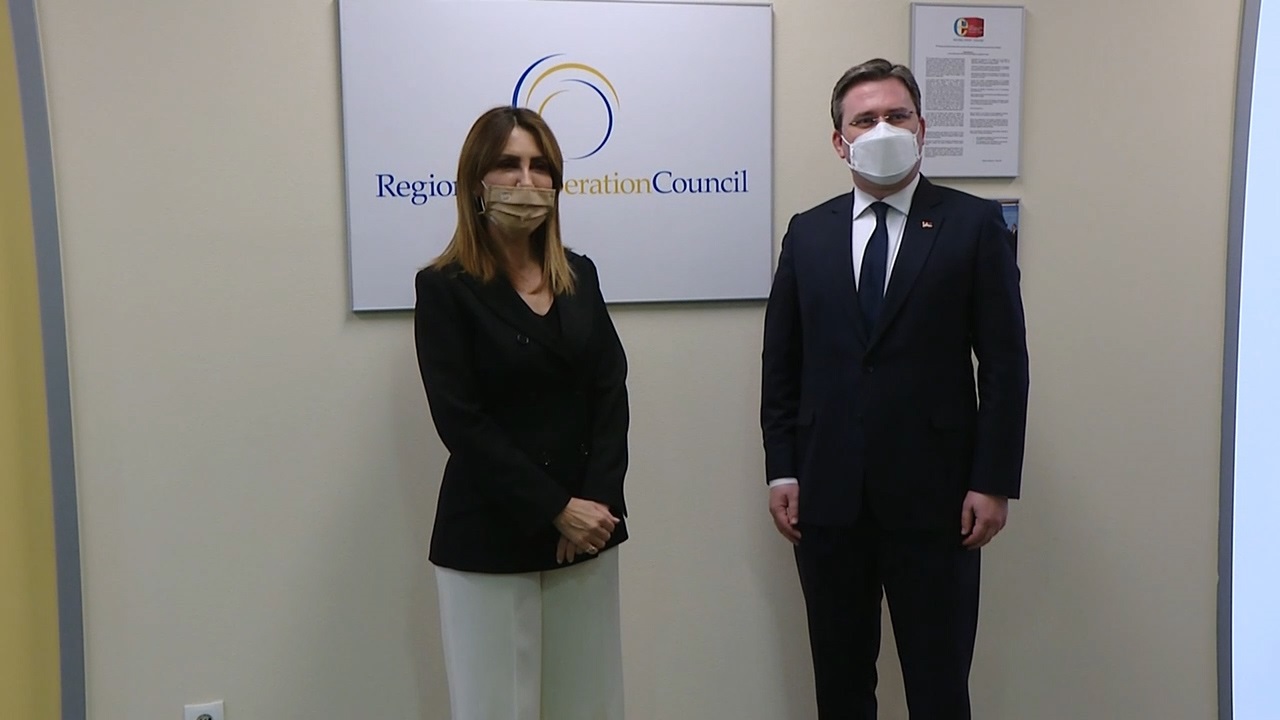
In was noted in the talks that strong regional economic cooperation and free flow of goods, people, services and capital were key for the development and strengthening of the entire region of the Western Balkans.
Selakovic and Bregu discussed, among other things, establishing a more efficient regional health cooperation with the goal of immunizing citizens against the coronavirus as effectively as possible.
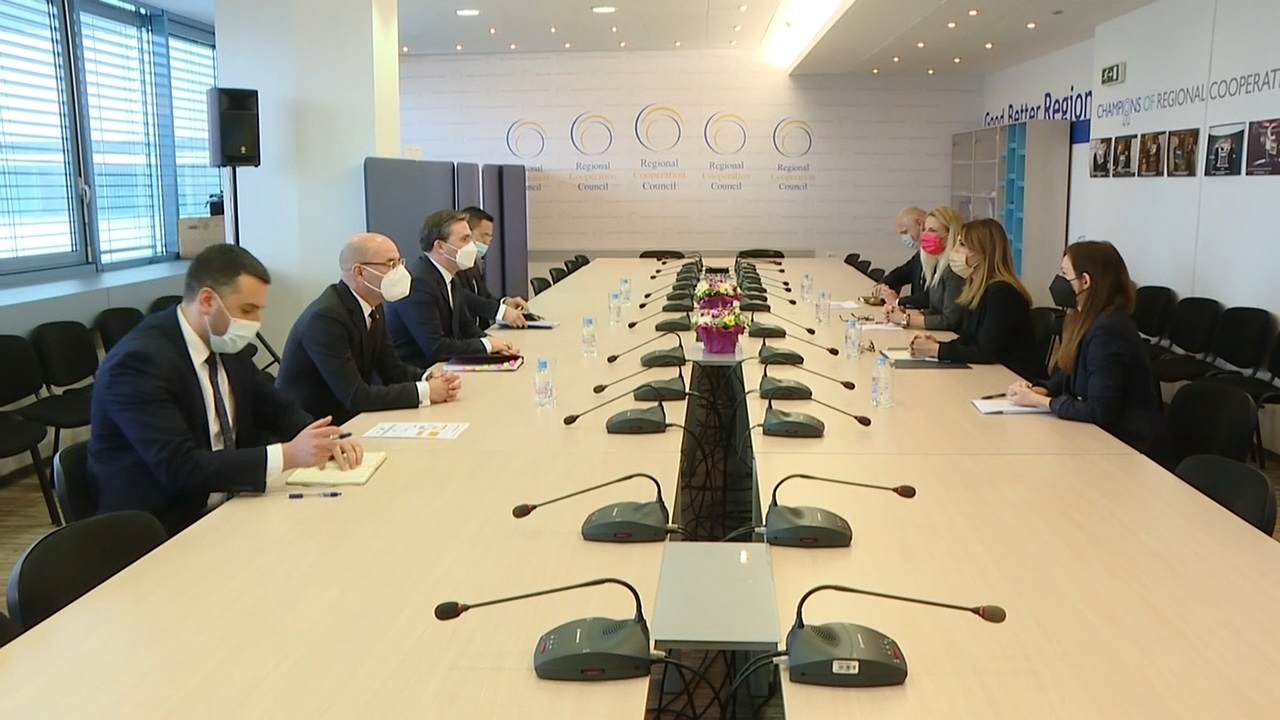
The meeting was also attended by Deputy Secretary General Tanja Miscevic, RCC Head of Political Department Amer Kapetanovic and Head of Programme Department Maja Handjiska Trendafilova.
Minister Selaković is on a two-day official visit to Bosnia and Herzegovina. |
|
|
| Commemorating Remembrance Day of 17 March 2004 - Pogrom in Kosovo and Metohija |
|
President of the Republic of Serbia Aleksandar Vucic participated today in the commemoration of the Remembrance Day of 17 March 2004 - Pogrom in Kosovo and Metohija. He said that exactly 17 years ago, a pogrom took place in Kosovo and Metohija, and that pogrom surpassed all other crimes.
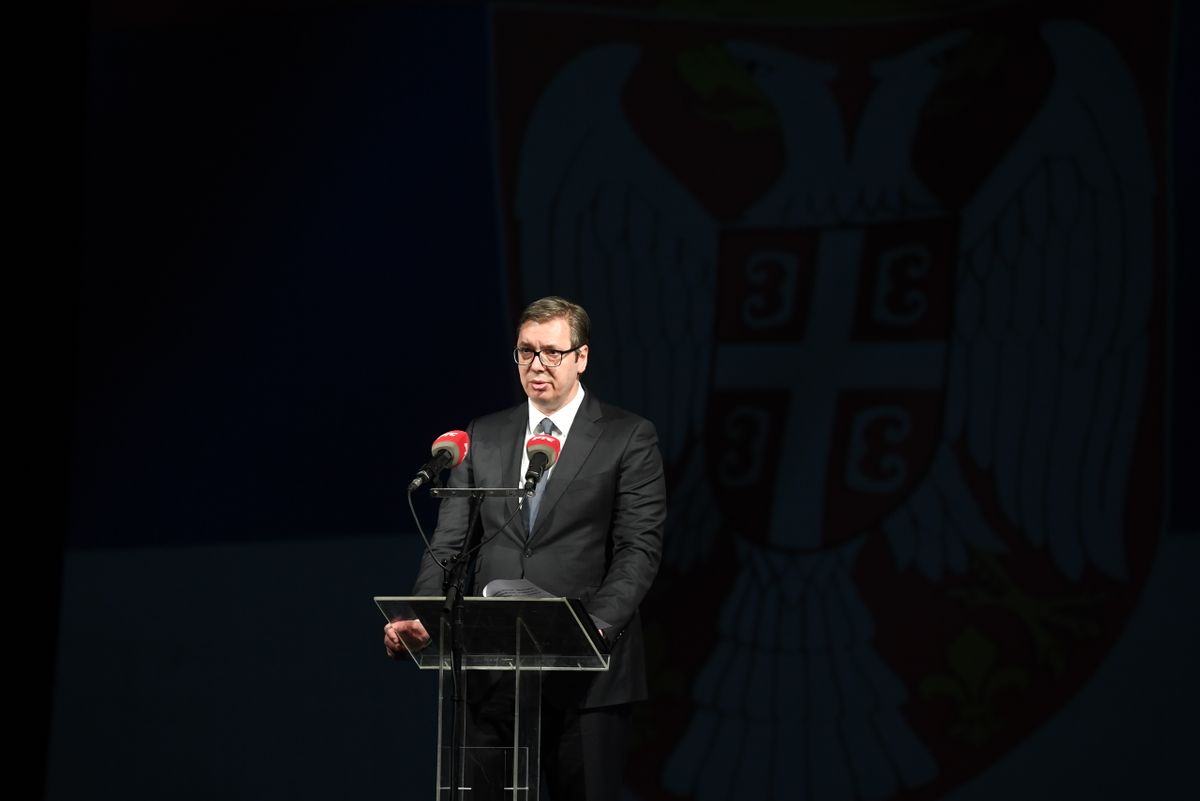
"There may be times when we are powerless to prevent injustice, but there must never be a time when we fail to protest, these words of Elie Wiesel, a camp survivor and Nobel laureate, make it forever incumbent upon us not to remain silent against crime, regardless of who and for what reason committed it", President Vucic stated and added that we remembered and learned every lesson in which we were losers, each one in which we were silent to our own victims, and each one when we were ready to forget.
"Serbia is no longer weak today, nor is it a country of losers, it does not threaten, but it does not forget either, it is ready for talks, but not for humiliation. Serbia, just like everyone else, has the right to take care of its people, their safety and well-being. The right to life is a fundamental human right and we will always defend it", President Vucic said.
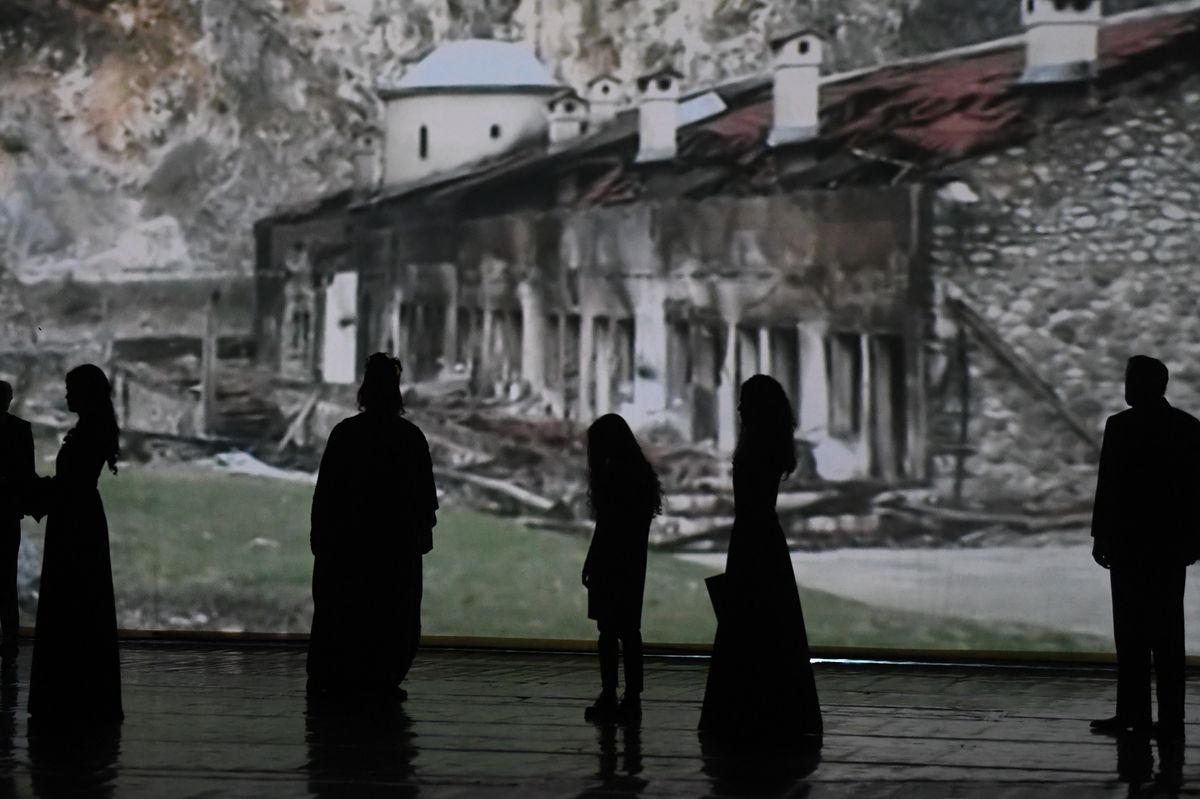
President Vucic said that pogrom surpasses all other crimes, because it is not only an act, but an intention, a policy, a premediated attempt to forcibly cleanse persons belonging to other peoples and faiths from a region or a country.
"We have no right to remain silent to that", said the President of Serbia, emphasizing that we have an obligation to be winners without blood spilled and war, to be the best in the economy, healthcare, sports, education and everything else that implies development and progress.
"We also wish others to work on themselves and be successful, because we are aware that crime is a tool for losers that winners do not need, as they remember, but forgive and move on, while the losers keep spinning in the same vicious circle. We Serbs do not want to be that anymore, we want a future in which we will remember, but from which we will not return. We know what happened and we call it by its real name", President Vucic concluded. |
|
|
| Selakovic and Tegeltija discuss bilateral cooperation between Serbia and Bosnia and Herzegovina |
|
17 March 2021
Minister of Foreign Affairs of Serbia Nikola Selakovic met today in Sarajevo with the Chairman of the Council of Ministers of Bosnia and Herzegovina (BiH) Zoran Tegeltija to discuss bilateral cooperation between the two countries.
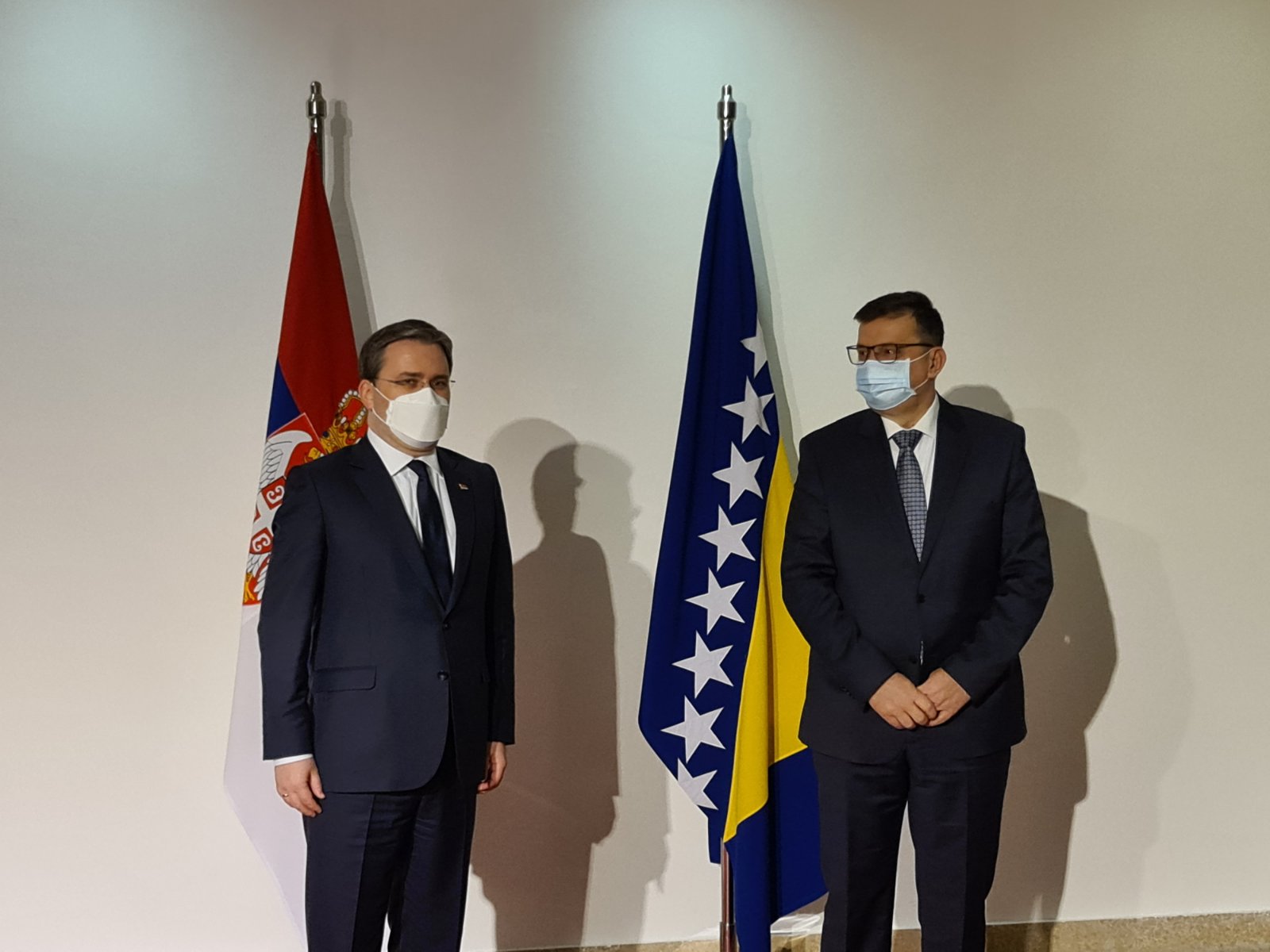
At the meeting, readiness was expressed to promote and intensify the political dialogue.
The collocutors agreed that the economic relations between Serbia and BiH were very good, but that there was room for enhancing cooperation and joint participation on third markets.
As it was stated at the meeting, Serbia and BiH were among each other's most important economic partners.
Minister Selakovic emphasized that joint infrastructure projects were important for developing cooperation and connecting the two countries and all their citizens, and he underlined the motorway to connect Belgrade and Sarajevo as a priority.
According to the Minister, having in mind the situation during the fight against the coronavirus and the vaccination process, the "mini-Schengen" initiative had become particularly important, given the great potential benefits for all countries in the Western Balkans and savings on customs and border procedures.
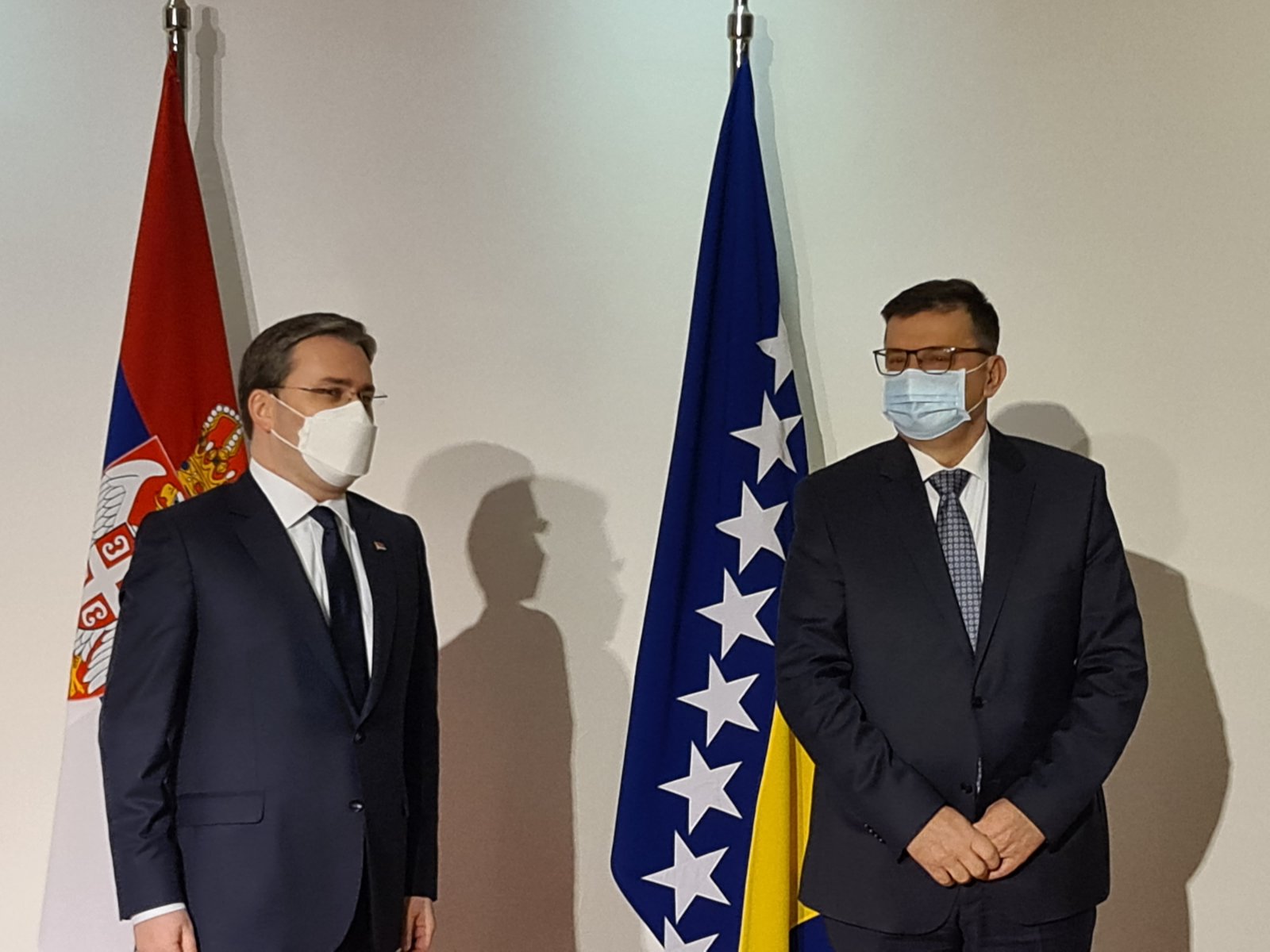
Selakovic emphasized that BiH had an open invitation to consider joining the "mini-Schengen" initiative, which, as he reminded, aimed to facilitate the movement of people, goods, services and capital in the region.
Minister Selakovic and Tegeltija also discussed cooperation in the fight against the coronavirus pandemic, and the Chairman of the BiH Council of Ministers congratulated Serbia on the successful vaccination process and expressed gratitude for the support and assistance to all citizens of Bosnia and Herzegovina during the pandemic.
The Serbian Foreign Minister thanked for the principled position of BiH concerning the issue of respect for the territorial integrity and sovereignty of Serbia and with regard to Pristina's requests for membership in international organizations.
Minister Selakovic said that Serbia had an essential interest in the stability of BiH and that, as a guarantor of the Dayton Accords, it supported every agreement reached by the two entities and the three constituent peoples. |
|
|
| Selakovic: Fight against all forms of crime is a priority of the Serbian Government |
|
Minister of Foreign Affairs of Serbia Nikola Selakovic said today that the fight against all forms of crime was a top priority of the Serbian Government and an integral part of the EU accession process.
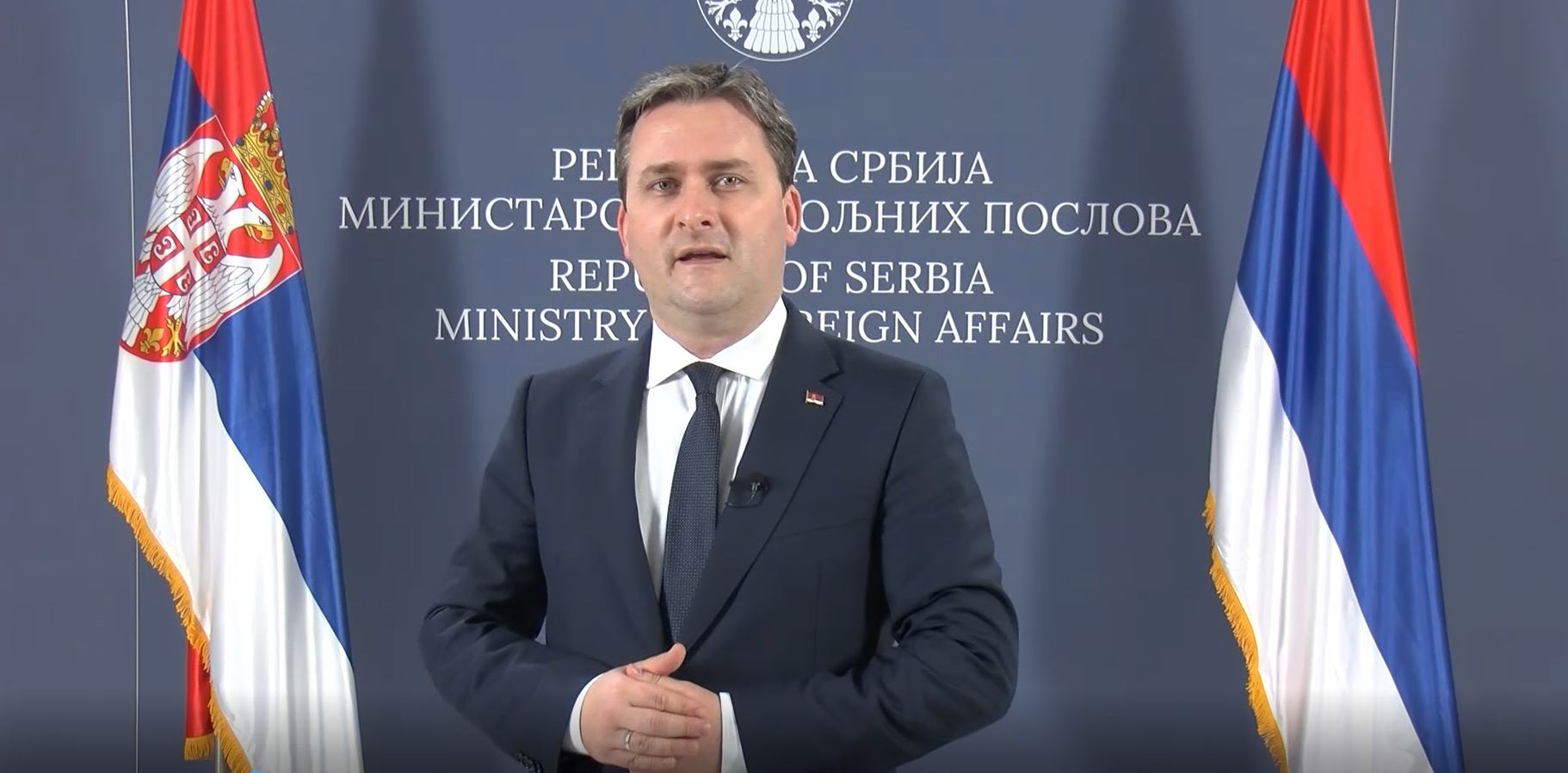
"It is also our moral duty, in order to leave a better world for the generations to come", Selakovic said participating via video-link at the 14th UN Congress on Crime Prevention and Criminal Justice, held in Kyoto.
Minister Selakovic emphasized that Serbia, in its Second Serious and Organized Crime Threat Assessment from 2019, identified as its goal to eliminate cybercrime, human trafficking, terrorism and irregular migration.
The Serbian Foreign Minister pointed out that our country had established in a timely manner a normative and institutional framework that regulates prevention of abuse in this area, as well as that the Office of the Special Prosecutor for Cybercrime, a special court department and a special police unit were established.
The Minister underlined that, in the field of the fight against corruption, Serbia was guided by the postulates set out in the UN Convention against Transnational Organized Crime and the UN Convention against Corruption.
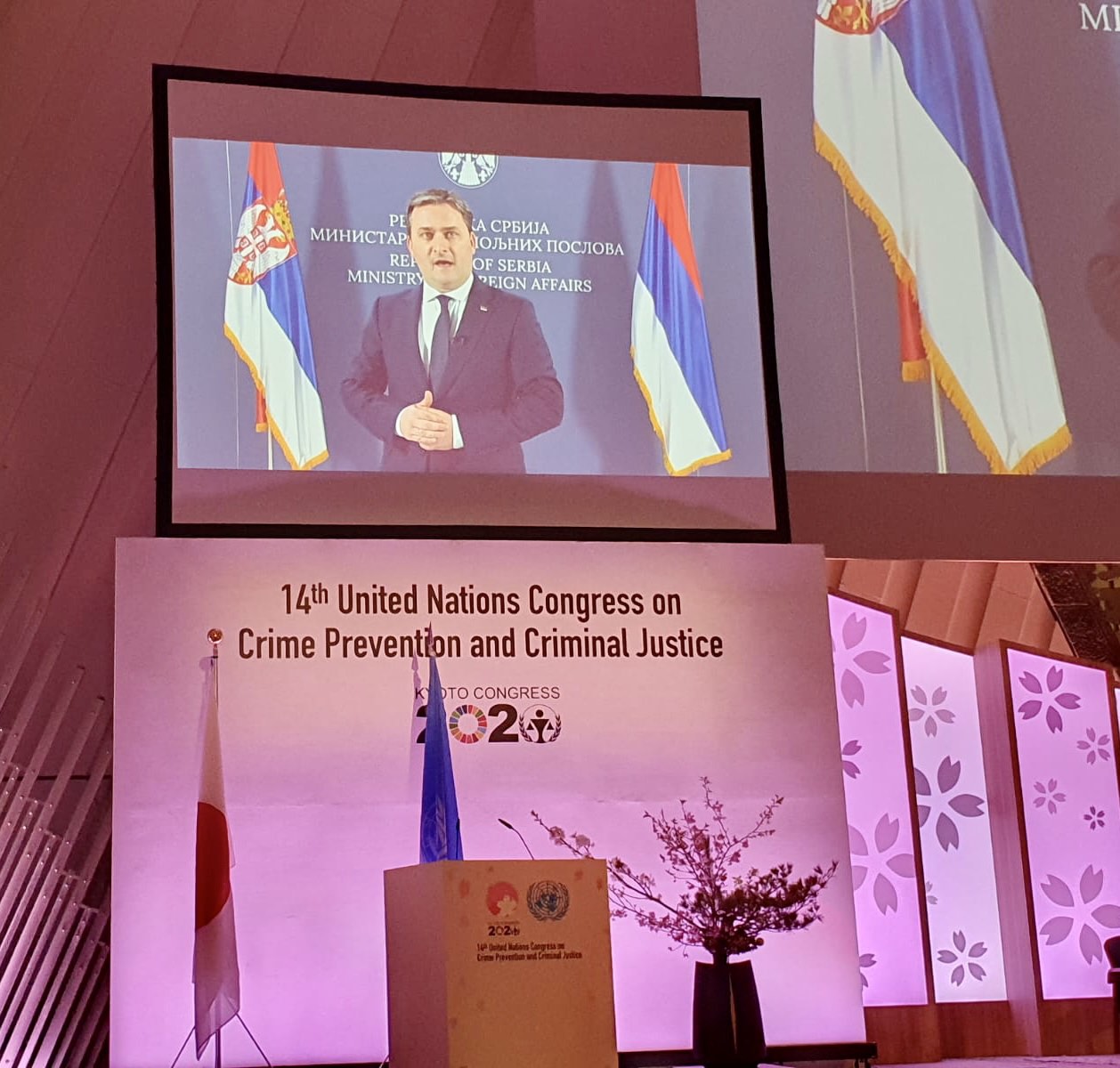
Selakovic pointed out the efforts made by the Anti-Corruption Agency, as an independent state body, to protect the public interest, build individual and institutional integrity, strengthen transparency and accountability of the public administration.
"We strongly condemn all forms of terrorism, including extremism and radicalism, and call for them to be fully eradicated, while implementing the relevant UN resolutions and conventions and the UN Global Counter-Terrorism Strategy", the Head of Serbian diplomacy underscored.
In order to combat these complex phenomena efficiently and successfully, Selakovic said, it was of vital importance to build capacities of our societies and states, while exchanging experiences at the regional and global levels.
Minister Selakovic thanked Japanese Ambassador Hikihara for the skill he showed in conducting the talks on harmonizing and adopting the Kyoto Declaration, which, as he stressed, was an important indicator of the commitment to creating and maintaining the institutional framework for crime prevention as one of the main preconditions for promoting sustainable development goals.
"Back in 1970 when Japan hosted this event for the first time, we demonstrated strong political will to draw attention to the problem. Today, it is incumbent upon us to reaffirm this willingness and resolve and translate it into concrete steps", the Serbian Foreign Minister said. |
|
|
| President Vucic handed over the donation of vaccines to the Chairman and Members of the Presidency of Bosnia and Herzegovina |
|
2 March 2021
President of the Republic of Serbia Aleksandar Vucic handed over a batch of AstraZeneca vaccines at the airport in Sarajevo, which the Republic of Serbia is donating to Bosnia and Herzegovina, and said that we should speak with one voice in the region because then we are stronger and able to make progress faster.
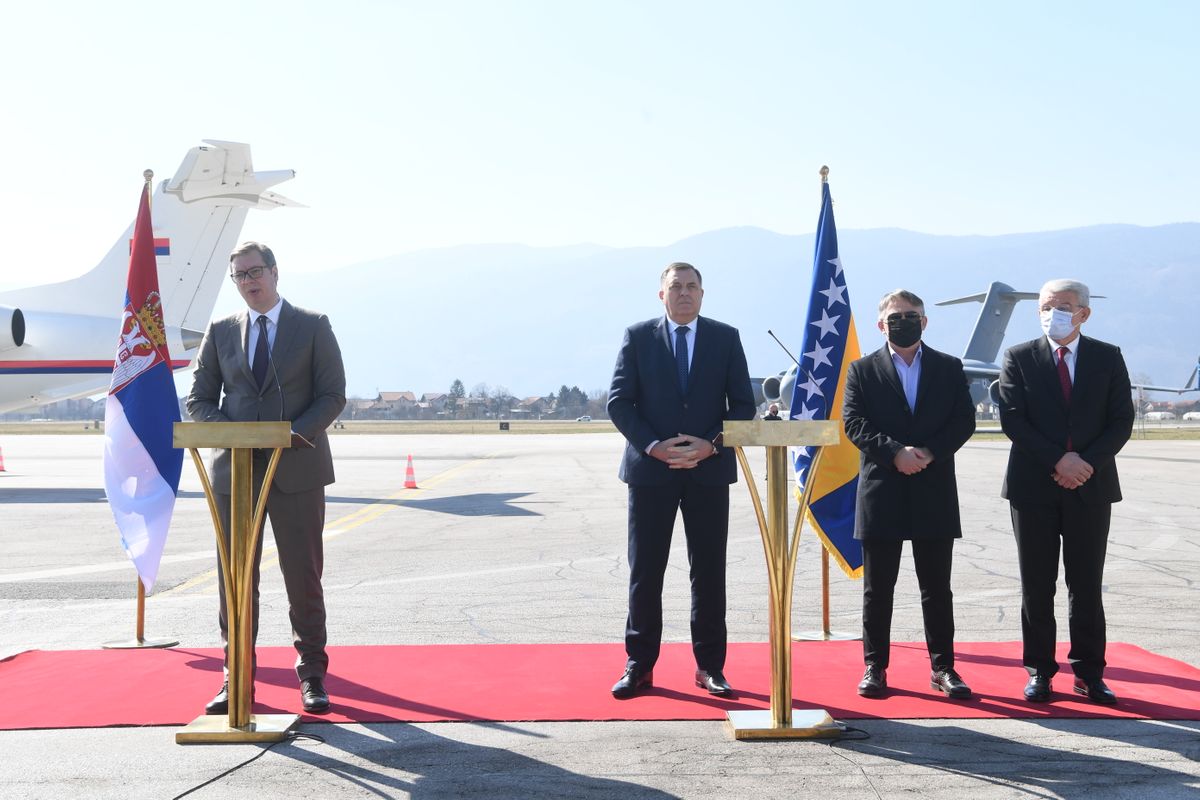
President Vucic stated that at the meeting with the members of the Presidency of Bosnia and Herzegovina, he proposed that a large Summit between Serbia and Bosnia and Herzegovina be held in Belgrade, which would gather all levels of government, but also businesspersons from both countries.
"It would be the biggest summit we have made, a summit of trust and openness. To see how to open our borders wider to each other in the future, and to increase the trade in goods, so that we could increase the salaries and pensions of our citizens more", President Vucic said. He added that he would insist that the Balkan nations can help each other best, and pointed out that the donation of vaccines was important not only because of the vaccines, but also because of the matter of mutual trust.
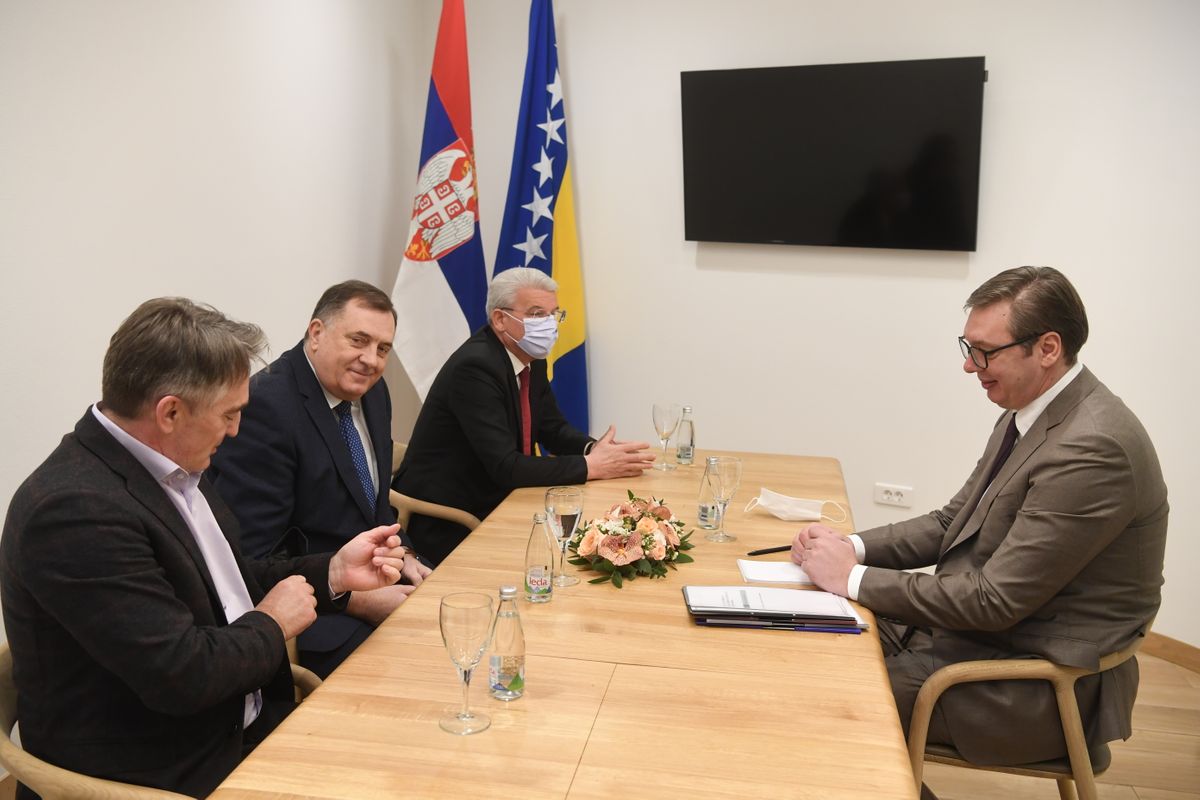
"I am happy if we save five, ten or twenty lives with this. That is an important and big thing. Because we live with each other and next to each other, and there is no one closer to us. Today as well, when we all expected help from someone much more powerful, we rely on each other. We are stronger when we have one voice towards Brussels, the world, when we point out problems together. It is important that we cooperate! Together we can move forward much faster, if we fight together and trust each other. When we ourselves understand that we are a force, we will have the highest growth rate in Europe. That has been and will be the policy of Serbia", President Vucic emphasized.
Chairman of the Presidency of Bosnia and Herzegovina Milorad Dodik thanked President Vucic for the support in the fight against the corona virus pandemic in the form of vaccines, reminding that owing to the Serbian leadership, medical workers from the Republic of Srpska were able to get vaccinated in Serbia, and the Federation of BiH was donated a batch of vaccines.
Member of the Presidency of Bosnia and Herzegovina Zeljko Komsic underlined that he hoped that today's meeting would mark a new step forward in the relations between Bosnia and Herzegovina and Serbia.
"Thank you for this kind of help, especially amid these circumstances of undefined relations in terms of Covax and the procurement of vaccines", Komsic underscored.
Member of the Presidency of Bosnia and Herzegovina Sefik Dzaferovic thanked Serbia and President Vucic for their solidarity.
"Solidarity, respect, appreciation, resolving open issues through agreement and applying international law when an agreement is not possible - these are the principles on which we want to build our relationship", Dzaferovic explained.
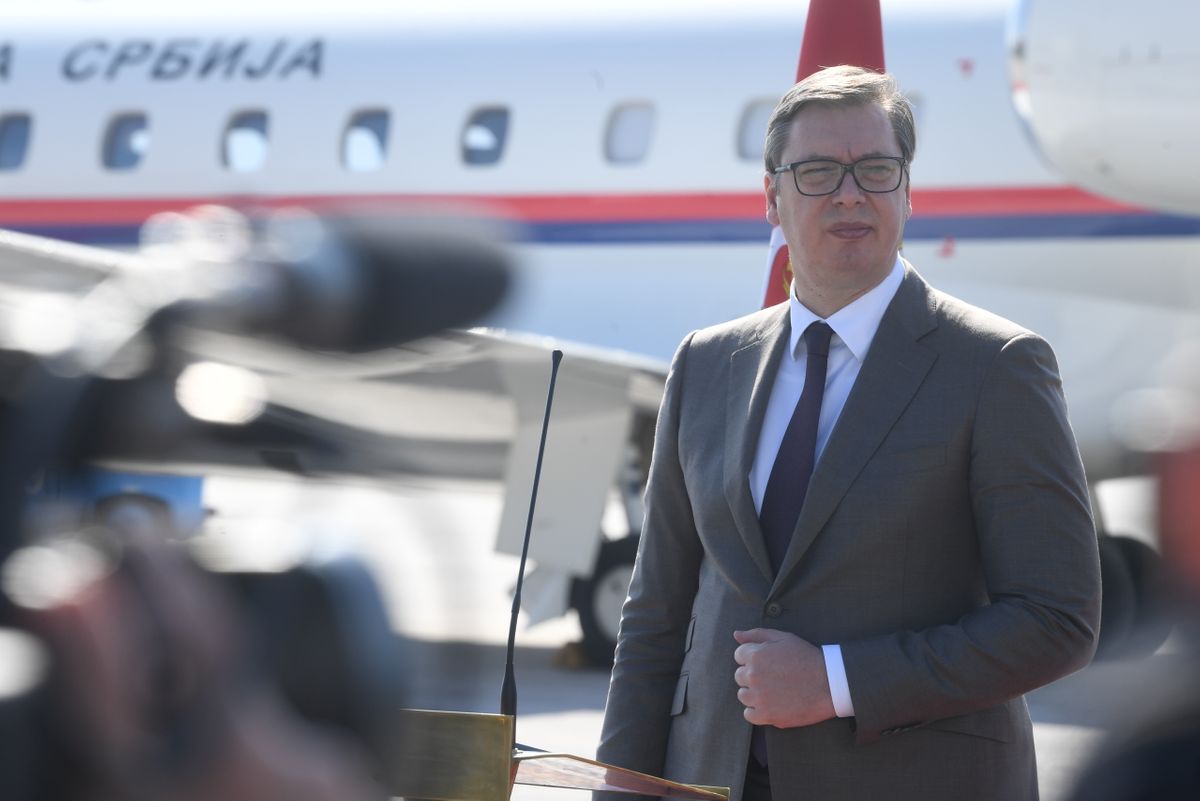 |
|
|
| Selakovic: Serbia has sincere love for Srpska and will continue to help it |
|
28 February 2021
Serbia respects the territorial integrity of Bosnia and Herzegovina, with which it builds best possible relations, but it sincerely loves the Republic of Srpska and will continue to help its people west of the Drina River, doing harm to none of the others, Minister of Foreign Affairs Nikola Selakovicn said today.
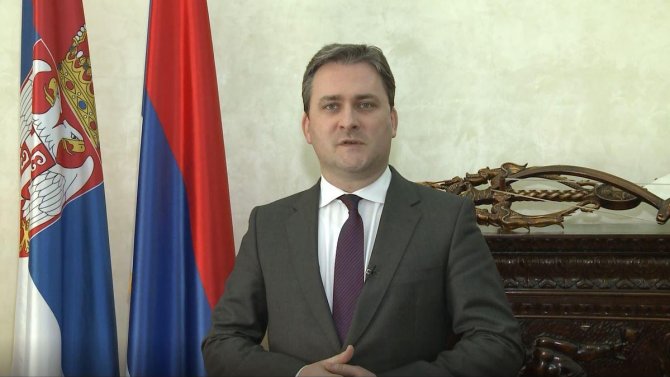
"The political situation is such that we live in two different countries, but both in the Republic of Srpska and in Serbia, our Serbian people makes up the majority population. When you ask me how important cooperation is, it is as if you asked me if it is good for brothers to cooperate, for brothers to speak to each other and if it is good for them to live in brotherly love. Of course it is", Selakovic said for RTRS on the occasion of the anniversary of proclamation of the first Republic of Srpska constitution.
The Head of Serbian diplomacy pointed out that Serbia and Srpska, much like they jointly marked Sretenje - the Statehood Day of Serbia, also observed the Constitution Day of the Republic of Srpska together, because in that way the Republic of Srpska continued to foster the heritage of state-building awareness of the importance of law and legal system established by Milos the Great back in 1835, as well as, as he added, all of the later Serbian rulers who passed Constitutions important for the Serbian state and history.
"It is greatly important that, at one point, the then Prime Minister, and today's President of the Republic Aleksandar Vucic and the then President of the Republic of Srpska, and today's Chairman of the Presidency of Bosnia and Herzegovina and the Serb member of the Presidency Milorad Dodik initiated a joint celebration of the dates that point to events and personalities from our history that are a truly important element of our national identity, national consciousness and culture of remembrance, which is extremely important and seriously participates in the development of modern Serbian identity and patriotism ", Selakovic said.
He is convinced that Serbia and Srpska would continue to jointly celebrate important holidays in the future as well, and thus show that they are one - a single people, wherever and in whichever state system they lived. To be aware that we are Serbs. We do not insult others or do anyone harm, but we love and respect our people, because without that self-respect we will not have the opportunity to show respect to anyone else, the Serbian Foreign Minister concluded.
Source: Tanjug |
|
|
| Metropolitan Porfirije of Zagreb and Ljubljana elected as the new Patriarch of Serbia |
|
18 February 2021
The Holy Assembly of Bishops of the Serbian Orthodox Church elected His Eminence Metropolitan Porfirije of Zagreb-Ljubljana, PhD, as the new Serbian Patriarch, in its convocation in Memorial Cathedral of Saint Sava in Belgrade on 18 February 2021.
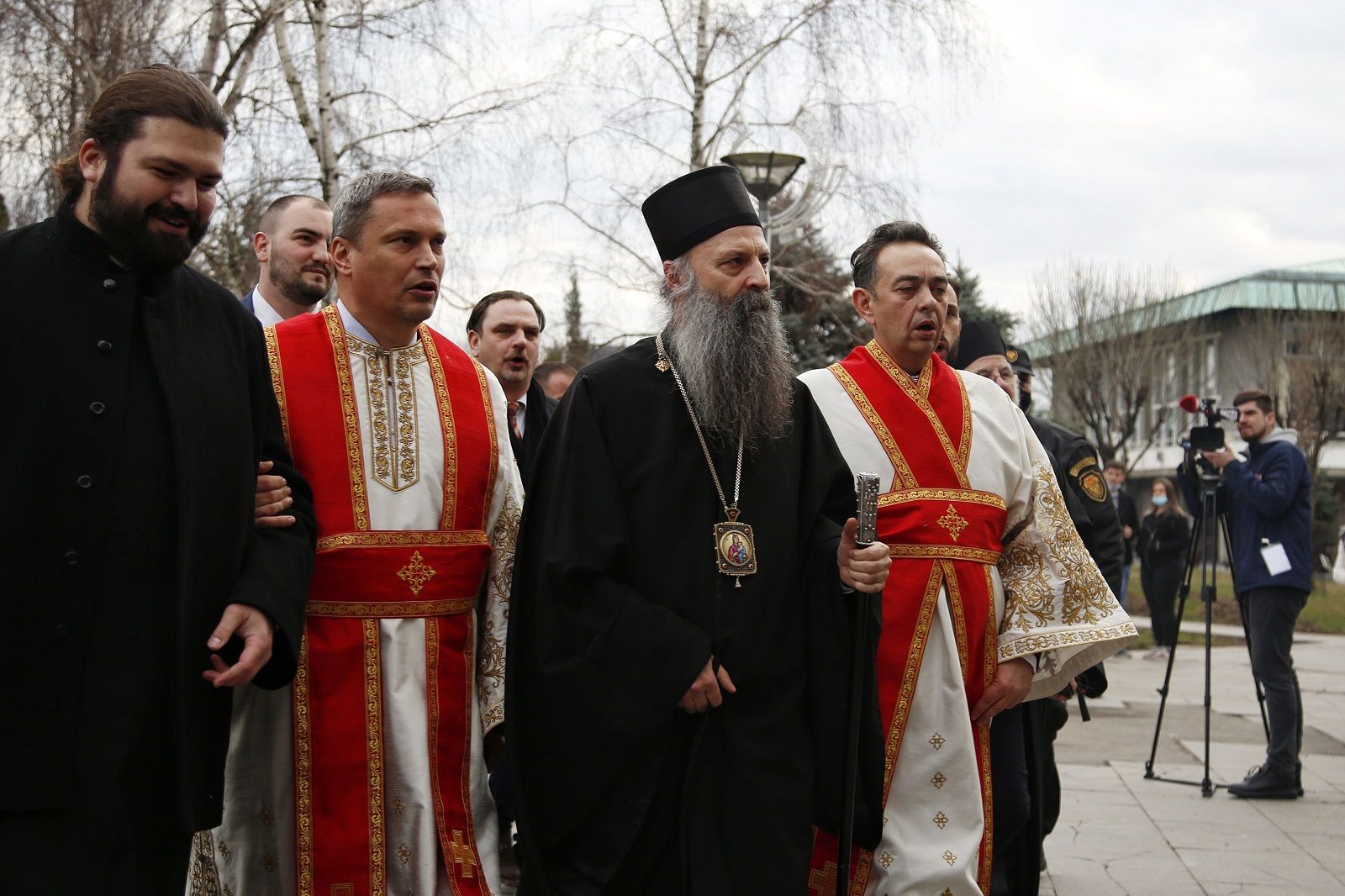
Immediately after the election a thanksgiving service was officiated and Many Years was chanted to the Archbishop of Pec, Metropolitan of Belgrade-Karlovci and Serbian Patriarch Porfirije. Bells at Saint Sava Cathedral in the Vracar district of Belgrade rang a few minutes before 4:00 pm indicating that the 46th Patriarch of Serbia was elected.
Newly-elected Archbishop of Pec, Metropolitan of Belgrade-Karlovci and Serbian Patriarch Porfirije (Peric) was born on 22 July 1961 in Becej, to father Radivoje and Mother Radojka. He was baptized as Prvoslav. He finished primary school in Curug, and the “Jovan Jovanovic Zmaj” Grammar School in Novi Sad. He was ordained a monk according to the rite of small schime by his spiritual father, then hieromonk Dr. Irinej (Bulovic), at Decani Monastery on Sunday of St. Thomas in 1985.
He graduated from the Faculty of Orthodox Theology in Belgrade in 1986, when the then Bishop of Raska-Prizren Diocese, future Serbian Patriarch Pavle of blessed memory, ordained him a hierodeacon at the monastery of Holy Trinity in Musutiste.
He attended postgraduate studies in Athens from 1986 until 1990. That year, upon the blessing of Bishop Dr. Irinej of Backa, he joined the monastery of Holy Archangels in Kovilj, where he was ordained as hieromonk and became its abbot.
Many young monks and novices came to the monastery following him. These were the years when the Kovilj Monastery became a spiritual center for many young people: intellectuals, artists, popular actors and rock musicians, especially from Novi Sad and Belgrade. Since then abbot Porfirije has particularly dealt with drug-addicted patients. In 2005, he formed for this purpose a therapeutic community called “The Land of the Living”, which is recognized as the most successful drug-addiction therapy project and, under the leadership of Bishop Porfirije, it has more than a hundred residents in camps throughout Serbia today.
During the ordinary meeting of the Holy Assembly of Bishops of the Serbian Orthodox Church in Belgrade on 14 May 1999 he was elected as Bishop of Jegar, Vicar of the Diocese of Backa.
He defended his PhD thesis Possibility of knowability of God in St. Paul’s understanding according to the interpretation of Saint John Chrysostom at the Faculty of Theology of the University of Athens in 2004.
He became a lecturer at the Faculty of Orthodox Theology - Department of Pastoral Psychology - succeeding famous psychiatrist, academician Dr. Vladeta Jerotic. His lectures have been attended not only by students of the Faculty of Orthodox Theology, but other Belgrade faculties as well.
Together with a group of experts: psychologists, doctors, criminologists, sociologists, Bishop Porfirije founded a civic association that deals with the resocialization of victims of destructive religious sects and cults.
Bishop Porfirije has not been just president of the Steering Board for a decade, but a real spiritus movens of the Humanitarian Fund “Privrednik”, which has provided scholarships for a great number of gifted, but poor pupils and students, regardless of their nationality or religious affiliation.
In 2005, the National Assembly elected him as representative of all Churches and religious communities, to be a member of the Council of the Republic Broadcasting Agency, and in 2008 the RBA elected him its president. As President of the Council of the Republic Broadcasting Agency, Bishop Porfirije supported the long-term interests of society and citizens, unaffected by political influences.
Since then, church radio stations have been heard in the broadcasting spectrum of Serbia. He has made a key contribution to launching of a series of radio and television shows dealing with religious topics.
In 2010, The Holy Assembly of Bishops entrusted him to establish military chaplaincy in the Serbian Armed Forces. The fruits of his labour in that field include not only the suitable legal regulations, but also the selection of military chaplains, the organization and equipping of churches at barracks and performance of the first religious services.
His expert theological works Bishop Porfirije published in magazines both in Serbia and abroad. He participated in a large number of scientific conferences and symposia across the globe.
Bishop Porfirije, as one of the most prominent contemporary Serbian clergymen and intellectuals, has an extremely wide circle of friends, not only in the Homeland, and he fosters personal friendship and close cooperation with priests and representatives of other Churches and religious communities.
He speaks Greek, English, German and uses the Russian language, while his style of communication is always adapted to his interlocutors.
He was enthroned as the Metropolitan of Zagreb and Ljubljana on 13 July 2014 in the Cathedral Church of the Transfiguration of the Lord in Zagreb. The solemn Hierarchal Liturgy was served by Serbian Patriarch Irinej, accompanied by a large number of archbishops of the Serbian Church and other sister Churches, as well as priests and monks, and pious people.
Source: SPC/Serbian Orthodox Church |
|
|
| Minister Selakovic: Serbia attaches special attention to relations with Bosnia and Herzegovina |
|
Minister of Foreign Affairs of the Republic of Serbia Nikola Selakovic met today with Ambassador of Bosnia and Herzegovina to Serbia Aida Smajic.
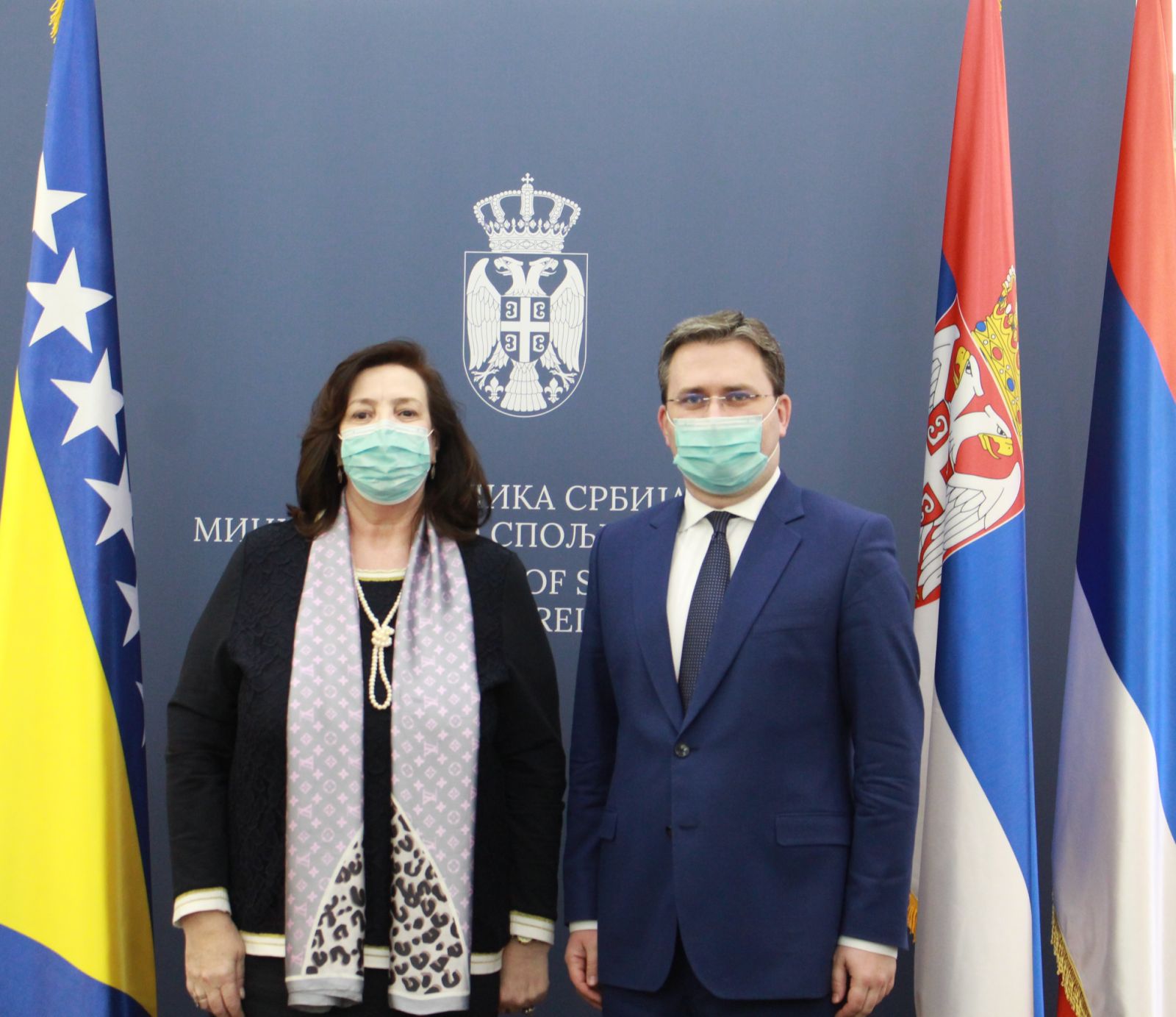
Minister Selakovic emphasized that in the period ahead, the political cooperation between Serbia and Bosnia-Herzegovina could be intensified thus reaching the optimal level in all fields, despite the ongoing coronavirus pandemic.
Selakovic said that Serbia attached special importance to the development of economic relations, both in terms of the volume of trade and the level of investments, given that Bosnia and Herzegovina was one of the most important economic partners of Serbia.
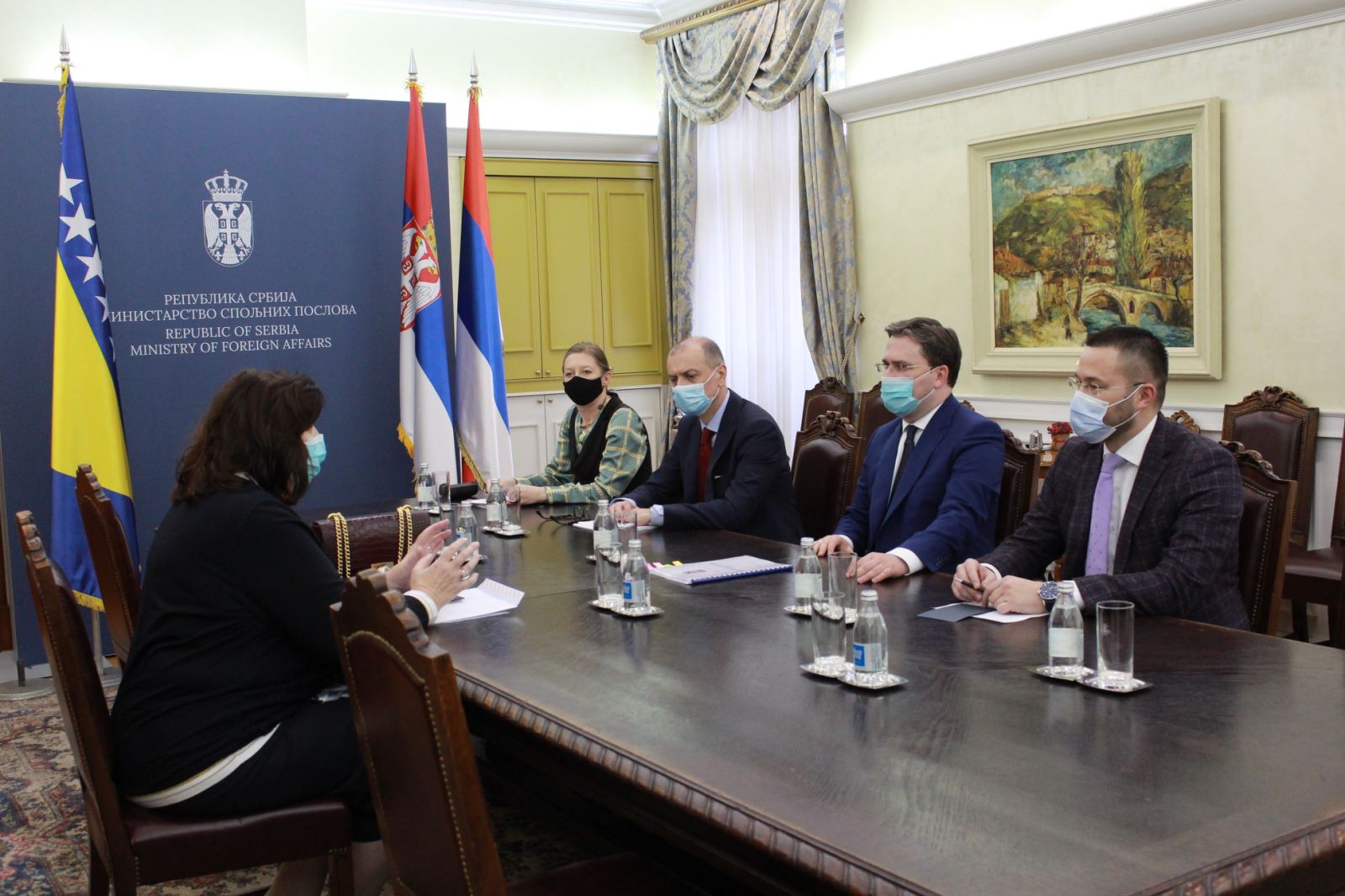
Furthermore, Selakovic pointed out that there was mutual interest in the revitalization of roads and railways connecting the two countries, and highlighted the importance of building infrastructure, further working on energy projects on the Drina River, as well as of joint participation on third markets.
The Serbian Foreign Minister added that he hoped that cooperation would continue through the holding of joint sessions of the Government of Serbia and the Council of Ministers of Bosnia and Herzegovina.
Minister Selakovic emphasized that Serbia was very interested in continuing and further intensifying cooperation through the trilateral format with Turkey, which was already running smoothly, and that it was ready at the same time for cooperation within regional and multilateral initiatives.
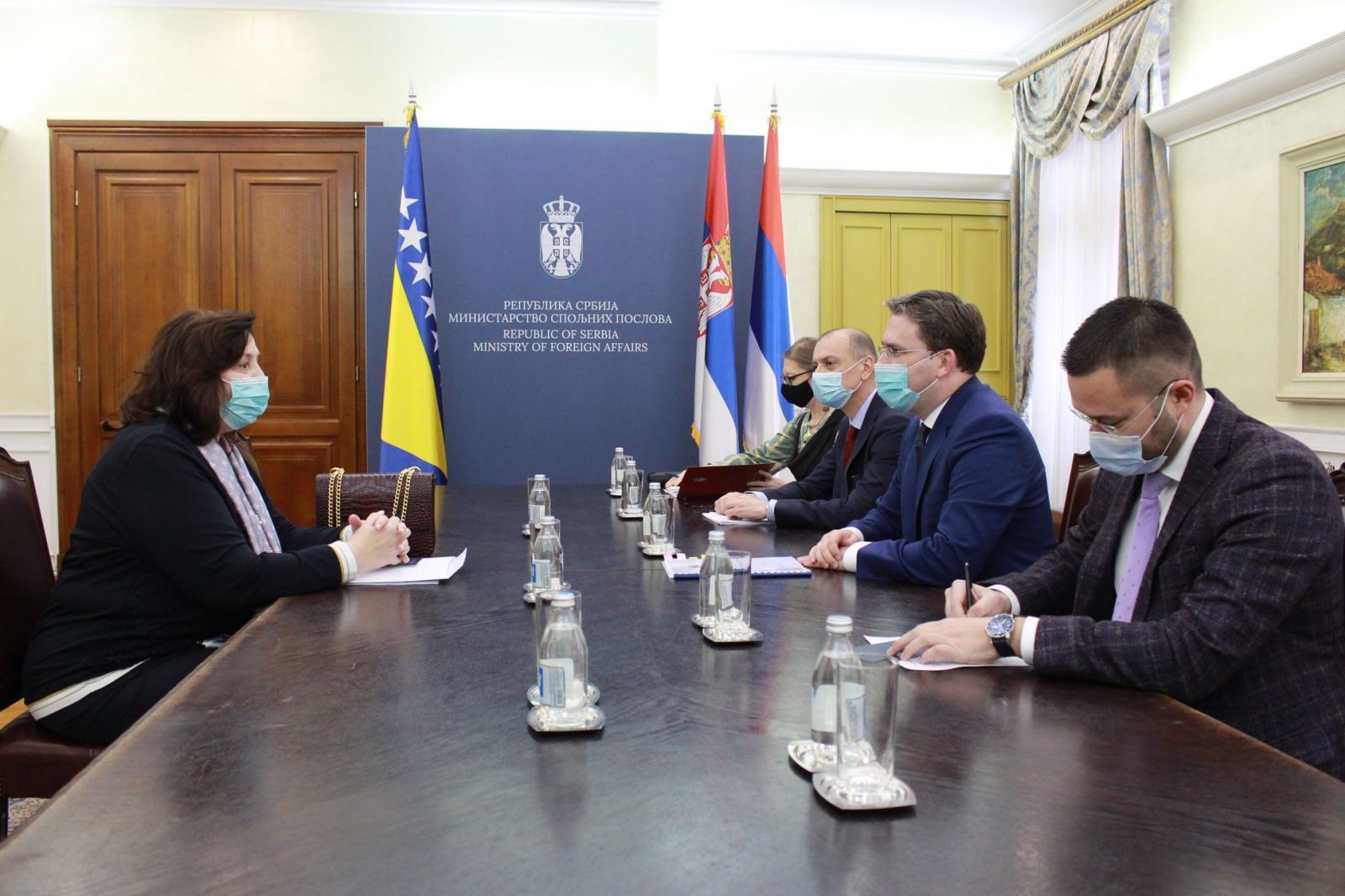
The Minister said that Serbia was committed to maintaining good political relations, that it supported the territorial integrity of Bosnia and Herzegovina, in line with the Dayton Accords, being a guarantor, and strived for active cooperation with both central and entity authorities.
According to him, Serbia had an essential interest for the stability of Bosnia and Herzegovina, it supported any agreement reached by the two entities and the three constituent peoples, but was explicitly against imposing solutions that were not the result of consensus, and believed that such moves pose a threat to the stability of both Bosnia and Herzegovina and the wider region, Selakovic said.
Minister Selakovic pointed out that Serbia was grateful to Bosnia and Herzegovina for its principled position on the issue of Kosovo and Metohija and respect for the territorial integrity and sovereignty of Serbia.
Belgrade, 9 February 2021 |
|
|
| President Vucic: Serbia is ready for dialogue on Kosovo and Metohija, but will refuse being humiliated |
|
President of the Republic and Supreme Commander of the Serbian Army Aleksandar Vucic attended a demonstration of capabilities of one part of Serbian Army units in the "Rastko Nemanjić" barracks in Pancevo. On this occasion, President Vucic stated that Serbia was ready to continue the EU-facilitated dialogue with Pristina at any point, while respecting also the position of the United States as well as the positions of Russia and China.
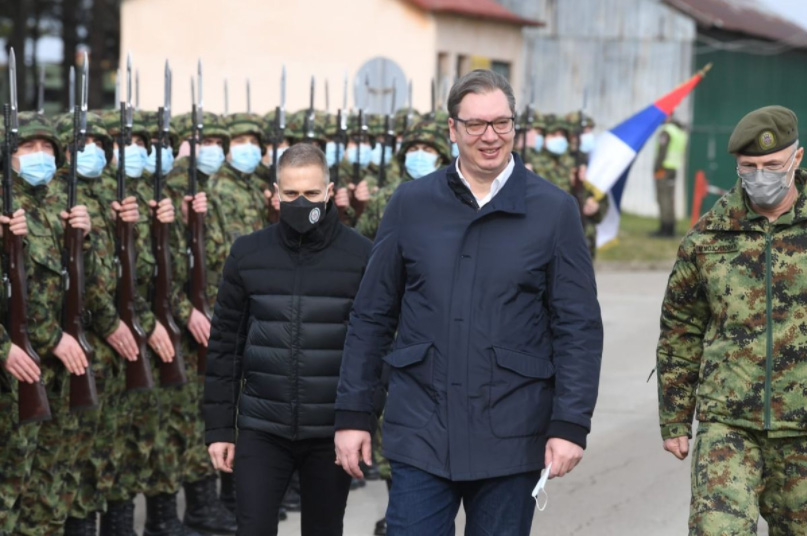
The President said that he would rather put his "head on the chopping block" than sign any document with a recognition and reminded that he had already once refused to do so in Washington, where there were two versions of the agreement.
He stated that he immediately had his delegation leave the meeting, that he told the U.S. delegation that Serbia would not sign such an agreement, while conveying that Serbia would always endeavour to hold peaceful talks in order to preserve peace, but that it would not take any humiliation.
The Serbian President thanked the U.S. President Joe Biden for the letter of congratulations on the occasion of the upcoming Statehood Day, in which, in addition to the usual emphasis on commitment to promoting economic cooperation, regional stability and democratic values, he unequivocally called for mutual recognition of Serbia and "Kosovo" as a result.
Mutual recognition between Serbia and "Kosovo" is not part of any act of any world organization, the President pointed out and reiterated that Serbia was ready to continue the EU-facilitated dialogue with Pristina at any point, while respecting also the position of the United States as well as the positions of Russia and China.
According to the president, the situation is difficult and will only be increasingly difficult.
"As I told you three days ago, I can see it and I expect it, I can see the situation slowly tightening, because the conflicts between them at the global level have been increasing and intensifying, and then we have to pay the price", the President said.
President Vucic said that said that it was up to our state to continue strengthening the country in the economic sense.
The President added that the role of the army was very important in the highly complex security and political conditions of the modern world, and that was why Serbia needed to do everything it could to deter any potential aggressor and attacks on citizens and the country.
"The policy of strengthening the armed forces will continue at a faster pace", the President emphasized, adding that the goal was for the Serbian Army to play a stabilizing role with regard to the political developments in the region.
According to him, it should be clear to everyone that Serbia was not a punching bag and that not everyone could attack and threaten it like it was the case in the past.
Vucic said that he was pleased with what he saw and that a lot had been done in the previous period, pointing out that the salaries of military personnel would be significantly increased as of April.
President Vucic also stated that investments in the Serbian Army would continue, whom he told that he expected the Army to continue to be the guardian of our country, its integrity and freedom.
"We expect you to be the guardians of our country, its integrity and freedom, the defenders of our people, the guardians of the homeland, the protectors of the interests of the state of Serbia and to be a deterrent factor for every aggressor and anyone who might consider attacking Serbia", Vucic said.
The military exercise called "Spearhead" demostrated the capabilities of the 72nd Special Operations Brigade, and the event, which the President of Serbia and the Supreme Commander of the Serbian Army assessed as very good, was also attended by Deputy Prime Minister and Minister of Defence Nebojsa Stefanovic and Chief of General Staff of the Serbian Armed Forces, General Milan Mojsilovic.
Photo: Presidency of Serbia / Dimitrije Goll
Belgrade,
7 February 2021 |
|
|
| Minister Selakovic: We do not respond to provocations, we want peace in the region |
|
Minister of Foreign Affairs Nikola Selakovic stated today that the position of Serbia was not to respond to the provocations of certain politicians from the region, because, he pointed out, it was determined to remain the factor of peace and stability in the region. Asked by the journalist to comment on Serbia's relations with other countries in the region in the context of more and more frequently heard provocative statements about our country, Minister Selakovic said that Serbia did not want to respond to provocations but to be the protagonist of all good initiatives bringing development to the region.
"Serbia's position in the region, politically speaking, is anything but simple, but what we will not give up on and in which we are completely determined is that Serbia is, will be and should remain the factor of stability in the region", Selakovic said.
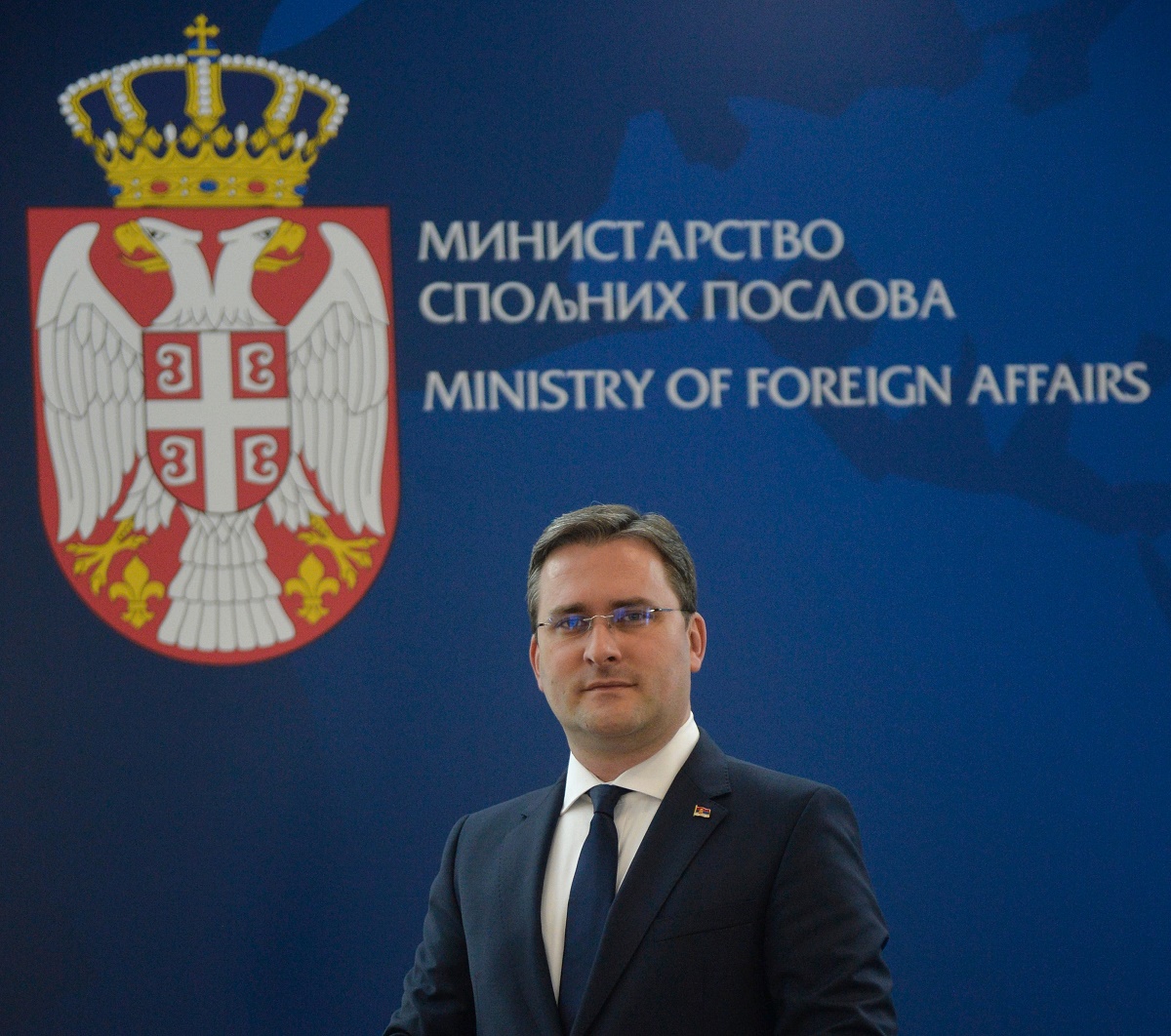
He pointed out that the state demonstrated its role as a "factor of stability in the region" in several ways, including by refraining from commenting on and responding to provocations.
"There have been constant provocations, and as you are well aware, in previous decades, it was a kind of a hobby or regular activity to call out Serbia during the election campaigns in the region", Selakovic stated. He added that the state leadership never reacted to those provocations in a way that could be detrimental to our country as well as to others.
"On the other hand, we demonstrate our resolve to remain the factor of stability in the region, aiming to preserve political stability and peace, through our initiatives", Minister Selakovic pointed out, adding that "mini-Schengen" was one of these initiatives.
He recalled that the initiative advocated a tight market connectivity in the region and also that it was an opportunity for the entire region to strengthen its infrastructure and economy. Furthemore, the initiative implied the freedoms on which the EU is based upon - free flow of goods, people, capital and ideas, Selakovic said.
"This is the kind of initiatives Serbia has been presenting to its partners in the region, as the protagonist of those ideas", Selakovic underlined. He emphasized that in the period ahead, the focus would be on having other countries in the Western Balkans join "mini-Schengen".
Source: Tanjug |
|
|
| Minister Selaković: Serbia is committed to the values of the Adriatic and Ionian Initiative |
|
Serbia is committed to the values of the Adriatic and Ionian Initiative and its corresponding Strategy, as a framework within which we conduct activities that strengthen the European path of our country, all the while creating an even better place to live in together with the participating EU Member States, Minister of Foreign Affairs Nikola Selaković said at the video-conference of the Fifth Forum of the EU Strategy for the Adriatic and Ionian Region.
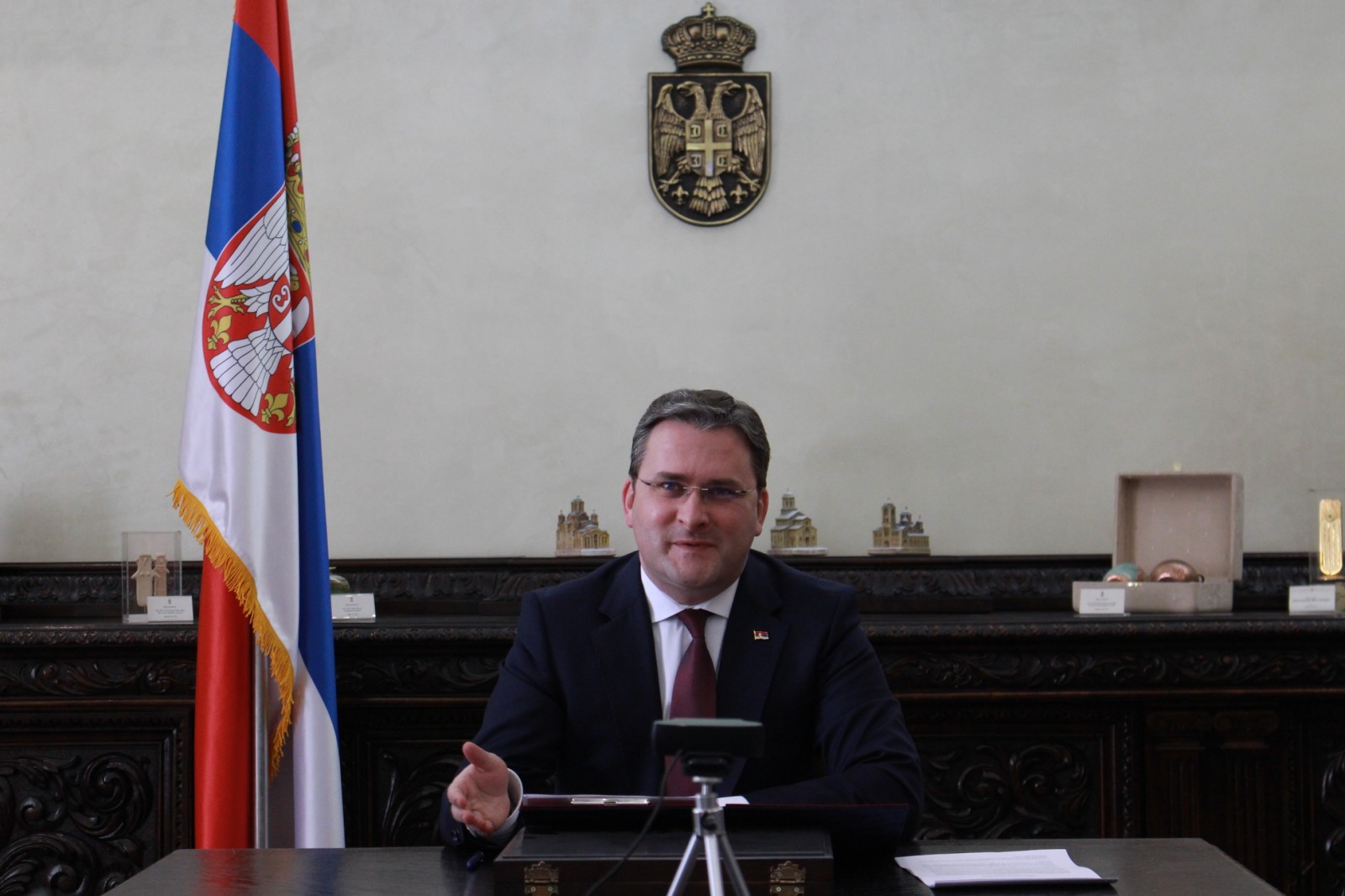
"Despite the difficult challenges faced amid the coronavirus pandemic, during its Chairmanship of the Adriatic and Ionian Initiative, Serbia succeeded in maintaining continuity in the implementation of the fundamental values adopted by signing the Ancona Declaration", Minister Selaković stated today.
The Serbian Foreign Minister said that our country was committed to the values of the Adriatic and Ionian Initiative (AII) and that when its assumed its yearlong Presidency of the Initiative and Chairmanship of the EU Strategy for the Adriatic and Ionian Region, it had ambitious plans - first and foremost, Serbia had planned to continue to deepen cooperation in the framework of the Adriatic and Ionian region
The Minister explained that, through joint efforts, concurrently with the traditional activities, Serbia managed to continue pursuing the so-called new activities launched during the previous chairmanship.
"The process aimed at expanding AII participation demonstrated in last year’s Budva Declaration, and the admission of North Macedonia and of San Marino to membership of the Initiative successfully continued during the chairmanship of the Republic of Serbia too", Selaković said.
Minister Selaković pointed out that, during its AII Presidency, Serbia built on the experiences of previous chairs and that it closely cooperated with the incoming Slovenian Chairmanship, counting on the support and expertise of the Permanent Secretariat of the Adriatic and Ionian Initiative seated in Ancona. The Minister thanked the AII Secretariat, on behalf of our country, for evaluating Serbia’s Chairmanship-in-Office in this report as “successful and dynamic”.
"We planned to bring the Serbian AII Presidency/EUSAIR Chairmanship to an end at the 5th Annual Forum and due to generous support of the European Commission and the extremely constructive approach of the current Chair – Slovenia, we are having the 5th Forum these very days", Selaković said.
The Minister pointed out that the pandemic had grown into an unprecedented threat to all of the participating countries of the Adriatic and Ionian Initiative and to the Adriatic and Ionian region as a whole, which is why they were all forced to impose protective measures, at the time when Serbia, fully supported by the AII Secretariat, had already carried out 17 out of the 35 activities envisaged in the chairmanship Calendar of Events.
"The pandemic happened just as the Chamber of Commerce and Industry of Serbia, having become a regular member of the Forum of the Adriatic and Ionian Chambers of Commerce at the beginning of Serbian chairmanship, was ready to organize a number of events aimed at the solidification of our mutual cooperation", the Serbian Foreign Minister underlined.
Minister Selaković concluded his statement by expressing unequivocal readiness for further cooperation with all participating countries of the Adriatic and Ionian Initiative and wishing the Slovenian colleagues a lot of success in implementing the tasks envisaged during their current Chairmanship. Belgrade, 28 January 2021 |
|
|
| Minister Selakovic speaks for Politika: The year of rejuvenation of Serbian diplomacy |
|
26 January 2021
Serbia's foreign policy positions are naturally being adjusted to the new developments at the international level, but our foreign policy priorities have not changed in a long time. Our top and most important interest is to preserve good-neighbourly relations and stability and peace in the region and, in the same context, to find a peaceful and just solution to the problems in Kosovo and Metohija, Serbian Foreign Minister Nikola Selakovic said in an interview with Politika daily.
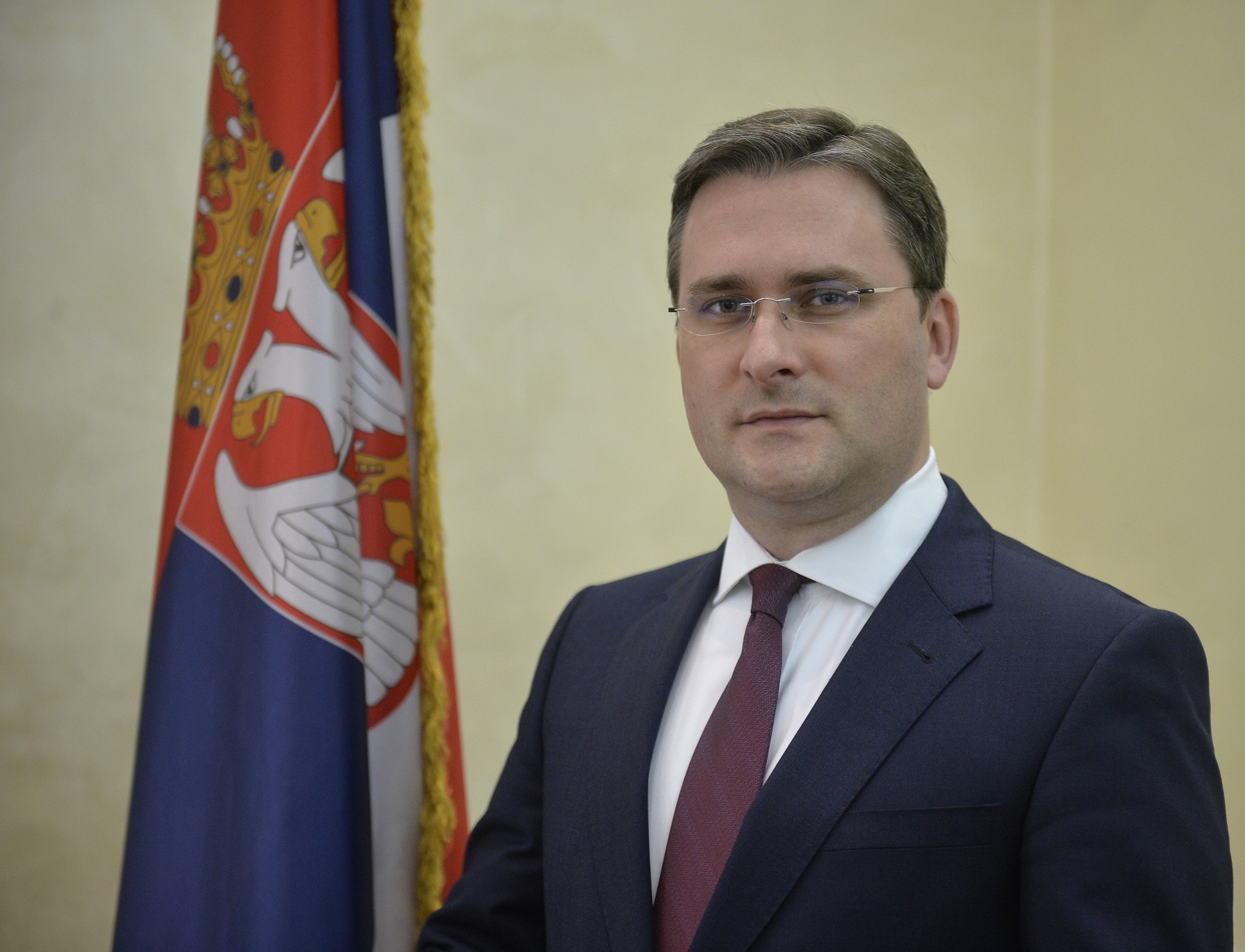
Another lasting interest of ours is full membership of the European Union, because this is the type of society we strive for. At the bilateral level, our goal is to strengthen ties with traditional friends, the Russian Federation and the People's Republic of China, but also to build new partner relations with the United States. One of the most important tasks of our foreign policy is to improve the position and protect the rights and identity of our people in the region, as well as to provide various types of support to Serbs in the diaspora. All these are very important and more often than not complementary goals, Nikola Selakovic pointed out.
What kind of relations do you expect Serbia to have with the new U.S. administration?
It is too early to speculate about this in public. The new presidential administration in Washington is currently preoccupied with internal issues and this will be the case for some time. There are people in the team of President Joseph Biden who have dealt with our region, and it is likely that the Balkans and Serbia will be the focus of the U.S. foreign policy at some point. I will remind you that President Vucic and President Biden not so long ago had very substantive talks in Belgrade, after which our President stated that he had the opportunity to talk to someone extremely well acquainted with the situation in this part of the world and an extraordinarily prepared interlocutor. Taking their personal relationship into account, but also the importance of enhancing the ties between Serbia and the United States, we have reason to expect that a meeting between the two presidents will be organized in the foreseeable future. I am sure that the nature and dynamics of the relations between Serbia and the United States will be influenced by the fact that Ambassador Marko Djuric now represents us in Washington, whose presence at President Biden's inauguration ceremony is an important signal and, I believe, a harbinger of positive developments in bilateral relations between our two countries.
How would you describe our country's relations with Moscow, Brussels and Beijing?
Russia is our traditional friend and that friendship goes beyond merely political ties. These are deep spiritual, cultural and civilizational bonds, and it is only natural that we have a mutual interest in improving those ties, even though they are at a very high level. We have a relationship with the People's Republic of China which is, in addition to the sincere iron-clad friendship between our peoples and high political representatives, based on deep trust and mutual support. Full membership of the European Union is Serbia's strategic orientation that all our friends are aware of, but our country does not forget its friendships, but strengthens and promotes them instead, and approaches all with honesty and no ulterior motives. In this context, we do not seek any preferential treatment, but only the right to freely and independently make decisions about our future and relations with all who respect us.
Could Serbia pursue a different foreign policy than the one it is pursuing at the moment?
It is always possible to have a different policy, just look at the foreign policy of Serbia ten, twenty or thirty years ago, examine the results at that time and you will realize how irretrievably expensive that policy turned out to be. Whether a policy is right, at either foreign or domestic level, is measured through its results and effect on the lives of citizens and the fate of the entire state. Our foreign policy priorities are not being defined on a whim, but are instead the result of a serious and deep examination of our complex position and strategic thinking about ways to improve it. Today, Serbia has a better international reputation and credibility than two decades ago, and the main reason for that is that our results have shown how serious and responsible we are as a country. That kind of credibility is not achieved by trickery, but only by hard and well-thought-out work on oneself. And I need to emphasize on this occasion as well that the main inspiration for such an attitude towards politics, the state and its future comes from none other than President Aleksandar Vucic. As Minister of Foreign Affairs, I have the opportunity on a daily basis to see the level of appreciation and respect President Vucic enjoys beyond the borders of our country.
When can we expect the vacant posts of Serbian ambassadors and consuls across the globe to be filled?
That is one of the main tasks for 2021. This will be a year of reinvigoration and I believe also rejuvenation of Serbian diplomacy. Our country, given its size, has a fairly extensive diplomatic network, which provides it with great opportunities for deepening political and economic relations with countries in all parts of the world. But we need more fresh and energetic staff, people who will be the most honourable representatives of a modern and dynamic Serbia. There are such people in Serbia, and we do need a serious rejuvenation, in order to avoid wide generation gaps in our personnel, and to lay the foundations of a modern career diplomacy.
How would you describe your relationship with Serbian President Aleksandar Vucic?
President Vucic and I are, in addition to having close and friendly relations, by virtue of the work we do and our constitutional competencies, the closest collaborators in the realization of Serbia's foreign policy goals. This allows me to talk to him often, and on many occasions learn a lot of new and important things. President Vucic is a man who inspires people around him with his strategic and visionary approach to politics, and I am proud to have had the opportunity to be part of his closest team of associates over the years, and to have had him as a kind of political mentor. In any case, his vision of Serbia as a modern, progressive and prosperous state, which independently and on its own will decides on its destiny, is my wish as well and key motivation for political engagement. For only such Serbia is a country that its own citizens, as well as Serbs beyond our borders, can confidently rely on, while also being an inspiration to the entire region.
Source: Politika |
|
|
| President Vucic: Serbia is the first in Europe in terms of growth |
|
Serbian President Aleksandar Vucic pointed out that Serbia is the first in Europe in terms of economic growth, which will be officially confirmed at the end of March, and that this was possible owing to the reform measures taken since 2014 and the rapid opening of the country after the first wave of corona virus.
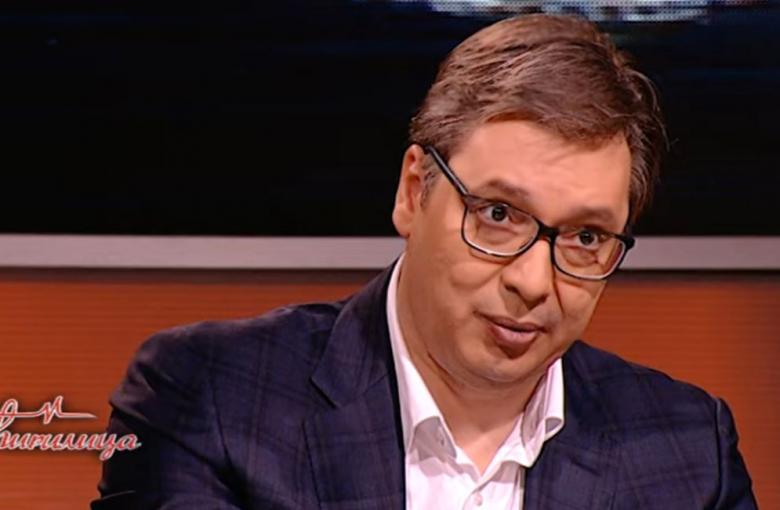
The President pointed out that Serbia had a growth of 5.2 percent in the first quarter, while the Eurozone was at minus 3.2 percent, in the second quarter Serbia had a growth of minus 6.3 percent, while the Eurozone was at minus 14.7 percent, and in the third quarter, when the Eurozone was at minus 4.3 percent, Serbia's figure was only minus 1.4 percent.
Vucic stated that Montenegro, for example, recorded as much as 26 percent minus in the third quarter.
Furthermore, the President emphasized that hospitals were built and renovated in our country, and that two hospitals were built from the ground up in just four months.
He said that the state made significant efforts to procure respirators, masks, gloves, protective suits, medicines, everything that was needed, and pointed out that work was being done on 10 general hospitals throughout Serbia, adding that all these were major achievements that were only possible owing to the success of the 2014 reforms, the enactment of the Labor Law, which yielded excellent results, and also through fiscal consolidation measures.
"These are unprecedented results for Serbia. Was Serbia ever before the first in Europe in terms of growth rate? We will get the results on 31 March that will confirm that Serbia is number one in Europe. All that was possible thanks to people who believed in difficult changes", Vucic said.
According to the President, this year, as many as six highways will be built in Serbia at the same time, and in this regard, he noted that Bulgaria has announced that the highway from our border to Sofia will be completed by the end of the year, after which it will be possible to use motorway to travel to Istanbul, which is very important to ensure that our country is on a transport route.
President Vucic emphasized that in 2020, the so-called year of corona, our country had a net inflow of foreign direct investment amounting to EUR 2.9 billion net, and three billion gross, which means that many foreign companies such as Toyota Tires, Boysen, ZTF and Brose have invested in Serbia even in this year of crisis.
The President said that Serbia has the highest average wages in the region, amounting to 511 or 512 euros, and that in February, due to the January increase, the average wage will be 535 or 536 euros, and that only in Belgrade in the last seven years the average wage increased by 180 euros or 40 percent.
That President said that Serbia was fourth in the region in terms of salaries before, and that today we are officially the first, and that the difference in relation to other countries will only increase faster. He also pointed out that the employment rate is growing in Serbia as well as that our public debt increased less than in most European countries. This is illustrated by the data that in Italy the public debt surged to 156 percent, in Germany to 87 percent, in France to 114 percent, in Croatia to 88 percent, while in Serbia it is at 57 percent.
The Serbian President announced that by Sretenje, 15 February, an additional package of assistance to the economy will be earmarked, and as he explained, it will be a new capital injection for companies, the trade, entrepreneurs, small, medium and large enterprises which, as he said, concerns 1,052,000 people within that system.
Vucic specified that it will most likely be help in the form of two or three payments amounting to half a minimum wage each, and that there will also be sectoral aid for tourism, hotel owners, travel agencies, guides, for bus carriers, through another half minimum wage payment.
The President added that efforts will be made to extend the guarantee schemes as well, which proved to be excellent, amounting to 1.5 billion, and this time, through the same system, two more portions amounting to 500 million each could be provided.
Vucic said that the first agreements with DFC worth 300 to 400 million dollars are expected in seven days.
He also stated that the state will endeavour to help pensioners further, in addition to increasing pensions by 5.9 percent in January, which will be reflected in their first checks in February, and added that pensioners should by March receive symbolic aid in the form of packages with vitamin C, D and zinc, which, as the President said, are small things, but they reflect the state's care and efforts made to protect health.
The President announced that negotiations on the procurement of the Chinese vaccine would be completed in the next seven to eight days, after the first quantities of the Pfizer and Sputnik V vaccines have arrived in Serbia, and pointed out that the Chinese vaccine was of exceptional quality, but probably the most expensive, which is why he wrote to the Chinese President and asked for a discount for our country.
Vucic thanked the Americans for deciding to sell the vaccine to our country and noted that no one in the region other than Serbia has received it, except for the small quantity that Albania got.
He pointed out that our state relied on itself and its own capacities, and that our state leadership anticipated that vaccines within the European COVAX plan would arrive late.
The President rejected the claims about bad results of Serbia in the fight against the corona virus and stated that our country has recorded the lowest corona virus mortality rate in the region.
He presented statistical information indicating that Slovenia had 144 deaths per 100,000 inhabitants, North Macedonia 126, Bosnia and Herzegovina 123, Bulgaria 115, Montenegro 115, Hungary 110, Croatia 107, Romania 85, and Serbia 51.
"The mortality rate in the region is as follows: Bulgaria 3.9, Bosnia and Herzegovina 3.7, Hungary 3.11, North Macedonia 3.03, Romania 2.48. Slovenia 2.15, Croatia 1.99, Montenegro 1.4, and Serbia 1.0. This can be seen in the graphs and is no fabrication", the President stressed.
He said that the state will fight for vaccines, and that only Serbia, in the Western Balkans, received significant quantities of vaccines, other than a smaller quantity that Albania received, and added that in one day since the registration for vaccination opened, as many as 63,000 persons have registered.
President Vucic expressed his belief that the year ahead will be better than the previous one as well as that the corona virus will be defeated through vaccination of citizens.
Belgrade, 12 January 2021 |
|
|
| Selakovic: It is Serbia's duty to take care of Srpska |
|
9 January 2021
Serbia loves, respects and supports the Republic of Srpska, it is bound to do so not only by a prevailing opinion of its citizens, but also by international law and the Dayton Peace Agreement, and as result it is Serbia's duty to take care of the Republic of Srpska, Serbian Foreign Minister Nikola Selakovic said this evening.
"The Serbian people in the Republic of Srpska should be proud of what they have created. The Republic of Srpska can be dismantled and diluted only by the one who created it, because it is a historical and political factor and an unchangeable fact", Minister Selakovic said in a video message at the ceremony held in Banja Luka on the occasion of the Day of the Republic of Srpska.
The Serbian Foreign Minister pointed out that Serbia today still respects the territorial integrity of Bosnia and Herzegovina, like it did in the past, while "proudly safekeeping its special and parallel ties with the Republic of Srpska and the Serbian people there", and stressed that, in addition, Serbia strives and will strive to build good and quality relations with the Federation of Bosnia and Herzegovina and with the other two constituent peoples.
"Serbia wants to help our entire region, to become the engine of economic development, which will have the labels of conflicts and difficult past replaced with the attributes of joint and successful progress and a future worth working hard and dedicatedly for", Selakovic said.
He stated that the common goal should be to catch up to the developed world, those who progressed in all fields, while the peoples of this region were dealing with difficult and bloody conflicts, facing with the horrors of war and all the challenges they generated.
Minister Selakovic said that the aspiration towards a society of European values comes, among other things, as a result of the desire to make up for all consequences of those difficult times and that what we need are development ideas and opportunities "which we will not wait for, but create them ourselves", as well as energetic and vigorous, competent business people and investments - what we need to do is keep up with the rest of the world in terms of technology.
The Minister said that Serbia has shown that this is possible and that he is sure that the Republic of Srpska wants to fight to achieve the same, adding that he is also sure that this fight will be significantly easier for all in the future if we are aware that we are in it side by side.
"At no point on its path of development has Serbia given up on its values and its unique features. The Republic of Srpska should not do that either. And economic development is not an end in itself and a supreme good but a clear path to make the societies we live in better and more prosperous, so that our children do not go abroad in search of happiness, but remain among their own, in an environment that encourages values such as talent, innovation and wit", Selakovic said.
The top interest of the Serbian people in the period ahead, the Serbian Foreign Minister emphasized, is the fight to preserve peace and stability, and that, as he noted, needs to be our national project that we build as a nation. Serbia and the Republic of Srpska need to remain united in this endeavour, even when confronted in these efforts with those for whom those goals are not a priority.
"There is only one Serbian people and it is indivisible in terms of values, we are bound by our language, culture, history and tradition, St. Sava's legacy, heroic past, common ethics, love for freedom and our red-blue-white flag, and it is within these values that we need to identify the interest of the Serbian people in the years ahead", Minister Selakovic said.
He asked if you should be united just to clash with others, as some others have often done, or instead to show that it is possible to do good when you do it not only for your own sake, but also for the sake of everyone around you.
It is the latter, Selakovic points out, that was the guiding idea of generations of our ancestors who always saw fighting the good fight as the fight for the benefit of all around them, not just themselves, and that we as a nation demonstrated how important it is for us to protect the dignity of ancestors while fighting for the future in which our descendants will live.
"Globally speaking, we are not a large nation in terms of population, but just as Nikola Pasic once remarked - there is hardly a greater and more important people than ours all the way from Vienna to Constantinople. This is why we remain a significant regional factor, and our responsibility for the future is very important and substantial", Selakovic pointed out.
Looking back at the year of "great temptations and problems" behind us, Selakovic emphasized that it showed that we could only fight the pandemic by supporting each other and by fighting together, while not having offended, humiliated or done anyone wrong.
Selakovic wished the citizens of the Republic of Srpska that the years ahead for them be years of progress and success and victories, whose significance will be "measured by kilometers of highways, new schools, hospitals, factories".
He pointed out that Serbia and the Republic of Srpska should continue to live in harmony and love, and that no one should dare set up barriers and obstacles between us, where bridges and extended hands of brotherhood should stand.
"Dear brothers and sisters, esteemed citizens of the Republic of Srpska, as I congratulate you on the Republic Day, I wish you that this day, 9 January, every year ahead be the day when we summarize how much we have helped Srpska, all its citizens and all our people. May every year this summary be better and a matter of pride to all of us. I wish you a happy Republic Day! Long live Serbia! Long live Srpska!", Minister Selakovic said.
Source: Tanjug |
|
|
| Congratulatory message on the occasion of the Day of the Republic of Srpska |
|
President of the Republic of Serbia Aleksandar Vucic sent a message of congratulations to President of the Republic of Srpska Zeljka Cvijanovic. The message reads as follows:
"On behalf of the citizens of the Republic of Serbia and on my own behalf, I extend to you heartiest congratulations on the occasion of the Day of the Republic of Srpska, and best wishes for good health, happiness and prosperity in every respect.
The year behind us was burdened by numerous challenges. No matter how difficult they were, at the same time they strengthened us, turned us towards each other and showed that the preservation of the highest human and spiritual values is based on mutual understanding and solidarity.
More than ever before, today we need faith, unity and strength to overcome all the consequences of the vicious disease that shook the whole world to the core, but also even more energy, hope and self-confidence to continue on the path of development and building a stable future. Preservation of peace and stability in the Republic of Srpska, as a part of Bosnia and Herzegovina, is the greatest motivation for the continuation of our firm and fruitful cooperation and economic, cultural and all other ties.
Therefore, Serbia will remain a reliable anchor to the Republic of Srpska in all good efforts aimed at peace, general well-being and a better life for all. Let me once again wish you all the best. Long live Srpska! Long live Serbia!", reads the congratulatory message from President Vucic.
Belgrade, 8 January 2021 |
|
|
| Minister Selakovic: Serbia and the Republic of Srpska will be inextricably linked, peace is the most important |
|
9 January 2021
Minister of Foreign Affairs of the Republic of Serbia Nikola Selakovic stated that Serbia and the Republic of Srpska have been and will remain inextricably linked in the coming years, and that he expects them to cooperate intensively and dedicatedly in building a more stable and more prosperous region.
On the occasion of marking the Day of the Republic of Srpska, Selakovic said for Srna news agency that preserving peace and stability is the greatest interest of the Serbian people, both in Serbia and any of the countries in the neighbourhood where the Serbian people live.
The Serbian Foreign Minister pointed out that Serbs, as the largest nation in the Western Balkans, want to develop and share their success with everyone in the region, which, as he explained, needs to finally stop being labelled as a turbulent and unstable area and become a zone of sustainable and predictable development.
"The Serbian people has its legitimate national interests, but the top interest, which is common to Serbs wherever they live, is peace, stability and development, in order to be able to make up as efficiently as possible for the years spent regressing and stagnating and catch up with the richest and most advanced European societies", Selakovic said in a statement for RTRS.
According to the Minister, no one should be afraid of Serbian success, because this generation also wants to, just as their ancestors did, achieve success for the benefit of the entire region and everyone in the area.
"We hope that the other two constituent peoples in Bosnia and Herzegovina will show readiness to cooperate with Serbia and the entire Serbian people in achieving that goal, because Serbia, as the center of stability in the region, sincerely wishes that its economic and social success benefits all peoples in the region", Selakovic said.
The Minister stated that Serbia respects all its neighbors and the territorial integrity of all neighboring countries. "But for the Republic of Srpska and the Serbian people we feel love, and we will always help them and be with them", Selakovic said. Congratulating the citizens of the Republic of Srpska their holiday, Selakovic pointed out that Serbia, when it comes to its special parallel ties with Srpska, is bound by the Dayton Accords, but also by the sentiment and brotherly love of the vast majority of its citizens towards compatriots on the other side of the Drina.
"I would like to wish the citizens of the Republic of Srpska a peaceful, stable and prosperous future, and on that path, they will have the brotherly support and help of Serbia, like they did so far", Minister Selakovic pointed out.
Source: Tanjug |
|
|
| Every Serb in the diaspora is potentially a lobbyist |
|
3 January 2021
Our compatriots living abroad are one of the great potentials that the state has not recognized in the right way so far, which is why a different approach is needed to the issue of how to strengthen our diaspora and use the good will of people who are potential lobbyists for the interests of Serbia and the Serbian people, Foreign Minister Nikola Selakovic said.
"When it comes to Serbs in the diaspora, and especially in the region, this issue has been a kind of an unattended crop which requires a lot of work, and even when a lot is done at once this is not apparent immediately ", Minister Selakovic stated in an interview with Tanjug.
He emphasized that the appointment of the Director of the Office for Cooperation with the Diaspora and Serbs in the Region for the first time after almost seven years since this body was formed within the Ministry of Foreign Affairs, shows that it is one of the priorities of the Ministry he is at the helm of.
Selaković notes that intensive efforts have been long underway on forming a plan to make the diaspora more visible both outside the borders of Serbia and in the mother country itself.
"Every person in the diaspora is a potential lobbyist for the interests of our country and people, and we need to find the right way to use that", he said.
That much can be done in that regar Selakovic illustrates with the fact that only in Switzerland, in 24 cities, there are Serbian cultural and artistic associations which amounts to more than 3,000 young people who get together in order to preserve our tradition, culture, the Serbian language and history.
"If they were able to set up such associations in 24 cities, it speaks volumes about the enthusiasm of these people. There is so much enthusiasm, energy and love in these people. We need to explore ways to help them and use their good will and potential", the Minister points out.
He also cites the example of an emigrant family in Canada, the Varaklic family from southwestern Serbia, who sends Christmas packages for children in the Raska region every year. He adds that they have so far donated hundreds of thousands of dollars to non-governmental organizations for those needs alone, but he says that we do not see that here.
"The state does not recognize this, and these are people who gained success as entrepreneurs working in a distant country, who can be serious lobbyists for Serbia, for Serbian interests, someone who represents us in the best possible way", Minister Selakovic said.
Minister Selakovic also pointed out that Arnaud Gouillon has been appointed as head of the Office for Cooperation with the Diaspora and Serbs in the Region and described him as a man of extraordinary energy, great love for the Serbian people, which he showed in his engagement towards Serbs in Kosovo and Metohija, where they were seriously endangered.
"By doing so, he showed and set an example to many of our compatriots of what an individual can do. And when one such individual focuses energy, enthusiasm and love for people, on work done within the state administration system, I think that the preconditions have been created for such activities to yield good results", Minister Selakovic said.
Source: Tanjug |
|
|
| Minister Selakovic sent a telegram of condolences following the tragedy in Posusje |
|
2 January 2021
There is no greater sadness and sorrow for citizens of a country than when a tragic event results in loss of young lives.
The demise of eight young men and women in Posusje filled with sadness the New Year holidays in Serbia as well, for every time we lose a young person we lose a part of our joint future as well.
May I ask you to convey the expressions of my deepest and most sincere condolences to the citizens of Bosnia and Herzegovina and to the bereaved families.
Minister of Foreign Affairs of the Republic of Serbia Nikola Selakovic. |
|
|
| Minister Selakovic: New ambassadors will be appointed this year, but the goals remain the same |
|
2 January 2021
This year, Serbia could finally have Ambassadors and Consuls General appointed to about a third of the currently vacant positions in the country's diplomatic and consular missions in the world, and Minister of Foreign Affairs Nikola Selakovic is convinced that most of these positions will be filled, as he points out, by the best possible people.
"In the next year, I am convinced that the majority of these vacancies will be filled", Selakovic told Tanjug, emphasizing that the work is being done gradually, because the state wants to show that is has a quality staff who will represent Serbia's interests in the best possible way.
The Head of Serbian diplomacy reminded that in a number of diplomatic missions, the four-year mandate of Ambassadors and Consuls General has already expired, so that the procedure for appointing new ones will follow, after their recall.
One of the "vacant" spots is the post of the Serbian Ambassador to China.
"We are working hard to find the best possible solution for our new Ambassador to China and as we appointed one of the best people in the state system as Ambassador to the United States, who, I am sure, will perform his duties in the best possible way, I am convinced that it will be the same for the Ambassador in Beijing", Selakovic said.
The Minister, who took over the foreign policy sector in the Government a little over two months ago, points out that circumstances in the world, as well as Serbia's position in it, have changed, but that Serbia's foreign policy goals do not change: the country remains strategically committed to European integration and, while pursuing the EU path, it will also strengthen traditional friendships with Russia and China, as well as promote and strengthen new partner relations with the United States.
"Relations in the region, good-neighborly relations, regional cooperation are also important for Serbia, because this fits into the set of requirements on the European path. But, even regardless of the European path, it is always important who you live next to, who you live with, what your neighbors are like and what the relations are like in the neighborhood", Minister Selakovic said.
He also points out that the issue of Kosovo and Metohija is of inestimable importance, it being the main national and state issue for Serbia and the Serbian people.
"When I say that circumstances are changing, but not the goals - the EU and European integration was our goal seven years ago as well, but look at what our room for maneuver was then, in terms of economic aspects, and look at it today. Circumstances changed, and then you adjust your actions to these changed circumstances, to the best extent possible", Minister Selakovic said.
He reminds that foreign policy priorities for 2021 were also outlined by the President of the Republic, and that maintaining peace and stability in the region is the absolute priority.
"Only in a peaceful and stable region of the Western Balkans and Southeast Europe can Serbia thrive economically, culturally and scientifically - in every respect. Peace and stability in the region are “sine qua non” without which there is no development and progress. Serbia has acted, is acting and will act as a factor that stabilizes the entire region and maintains peace in the region, showing that it is the region that benefits everyone the most", Minister Selakovic said.
Relations in the region have always been complex, and the region, Minister Selakovic noted, is to our great regret, burdened with issues that we cannot have a bearing on, and which concern the past.
Serbia's approach is to seek room to influence what is happening today and what will happen happen in the future. In this context, he states that the so-called "mini-Schengen" initiative for market unification of the region, which originated from Aleksandar Vucic and was met with a positive response from the Prime Ministers of Albania and North Macedonia, is one of the opportunities to do much more for the region.
"To show how much more we can do if we act together and if we seek our common denominators, and not what separates and divides us ", Selakovic points out.
When it comes to relations with the United States, Selakovic said that one should not expect the great powers to change their positions the way we would like, want or imagine, but that it is important that the Ambassador in Washington, Marko Djuric, also emphasized that his task, among other things, will be to make efforts to change the climate in bilateral relations with the United States - the most important country in the world, as our lacking communication with them in the past seriously affected the position of the Serbian people and Serbia.
"I am convinced that Djuric will work seriously on that, together with President Vucic, Prime Minister Brnabic and the Ministry of Foreign Affairs, and contribute to a large extent to changing that climate", Minister Selakovic said. He points out that it is extremely important for Serbia to promote its partner relations with the United States to a higher level. "This is a country with which we cooperate closely in many areas and a country with which we must strive, and not give up in doing so, to find what we have in common, our common ground and good examples of our cooperation in the past, and to create space for such cooperation in the future as well", Minister Selakovic concluded.
Source: Tanjug |
|
|
| President Vucic: Serbia to remain on the course of a winning policy of stability |
|
Preservation of peace, taking care of the health and better living standard are key for Serbia in 2021, underlined President of the Republic Aleksandar Vucic, convinced that even though the completion of this ambitious and by no means easy task will be anything but straightforward, best results can be achieved by working in concert with the Government, while ensuring security and a future of certainty for the citizens.
The President said that Serbia has set for itself great and ambitious goals for the next year, notwithstanding the complex international and regional circumstances, and that it will endeavour to fully preserve peace and stability in the region and the country, while safeguarding the vital national and state interests.
"Serbia will remain on the course of a winning policy - the policy of stability", President Vucic said and stressed that our country remains on the European integration path and that it will carefully foster its friendship with Russia and China, while building a friendship with the United States as well.
According to the President, Serbia will continue to pursue a winning policy, with the country itself as a top priority, i.e., a policy that will enable Serbia to continue being one of the top three countries in Europe in terms of growth rate in the next two years.
A precondition for that, the President noted, is to crack down on criminal groups, but also to ensure even bigger investments in the police and army forces.
"Serbia is the country that recorded the highest growth in Europe in 2020", the President pointed out at the annual press conference and added that he expects to conclude a new arrangement with the IMF, as well as that Serbia, by the end of next year or early 2022, will raise its credit rating to an "investment" one, which will put our country's rating on par with the most developed EU countries.
As the greatest success in 2020, Vucic noted that Serbia will end the year with the highest growth rate in Europe, which, as he said, is expected to be from minus 0.75 percent to minus one.
"I am proud to be the President of a country that is the European champion in terms of GDP", Vucic pointed out and added that German Chancellor Angela Merkel was also pleased with Serbia's success.
According to President Vucic, this result will encourage Serbia to accelerate its European path, while continuing friendships with those who did not turn their backs on Serbia when it was at its darkest hour, namely Russia and China.
The President pointed out that the activities to attract foreign investors will continue, then that work will be done on investments in agriculture, primarily the food industry, new machinery, and digitalization of agriculture. President Vucic also emphasized that the goal is for salaries in the public sector to average between 560 and 570 euros by the end of the year. Only in Belgrade, the average salary would be around 700 euros.
President Vucic reminded that the salaries of health care workers will increase by five percent from January 1, while the salaries of others in the public sector will increase by 3.5 percent and an additional 1.5 percent as of April 1, while corporal, private first class and non-commissioned officer army ranks will get an increase of an additional 10 percent. He noted that the minimum wage will be increased by 6.6 percent and so will pensions from January 1, by 5.9 percent, with the plan that the average pension amounts to 270 euros by the end of 2021. The President especially pointed out investments in health care, reminding that two new covid hospitals have been opened and that the renovation and construction of health facilities continues throughout Serbia, while stressing that Serbia is by far the first in the region in terms of hospitalized persons per 100,000 citizens, which is why it has recorded a low mortality rate , and also that Serbia this year has been among the top three countries in the region according to the number of PCR tests performed.
Speaking about tourism, the President said that, next year, efforts will be made on the development of the Danube basin region, from Apatin to Kladovo, that the Ovcar-Kablar Gorge will be developed, as well as our mountain centers.
Discussing the field of culture and information, President Vucic said that the implementation of the media strategy and the completion of the reconstruction of the National Theater in Subotica are important for next year, and he announced investments in museums, especially emphasizing the relocation of the History Museum to the train station building. He also stated that the floor heating in the Church of Saint Sava will be completed next year.
He pointed out that the state will continue to take care of our citizens in Kosovo and Metohija, that no one can forbid Serbia to help its people, and that Serbia will not give up on helping our people.
As he emphasized, Serbia is ready to send medicines and vaccines to the Albanian population as well, and pointed out that in the upcoming period our country will pursue a policy of peace in the region and will endeavour to cooperate with Zagreb, Sarajevo, Podgorica and others. |
|
|
| Serbian Prime Minister the first PM in Europe to receive a Covid-19 vaccine |
|
Prime Minister of the Republic of Serbia Ana Brnabic received today the first vaccine against the coronavirus made by Pfizer company, at the Torlak Institute of Virology, Vaccines and Sera.
Brnabic, who is the first European Prime Minister to receive the vaccine, pointed out that this day may be the first since 6 March that we have a reason for a smile on our faces as it marks the beginning of the end of the coronavirus pandemic in Serbia, but also in Europe and the world.
As Prime Minister and as someone who leads the COVID-19 Crisis Response Team, I felt obliged to be the first to receive the vaccine, to show that we believe in it, as well as in our institutions - the Medicines and Medical Devices Agency of Serbia and experts who worked round the clock to test the vaccine, she said.
Underlining that it was an honour to do this for her country and be the first to pave the way for all citizens, the Prime Minister said that she agreed with President of the Republic Aleksandar Vucic that the two of them receive different vaccines, so he will most likely receive the next one that arrives, most probably the one produced by China.
At the moment we have the Pfizer-BioNTech consortium vaccine, and the vaccines from the Chinese Sinopharm are expected in the near future, as well as certain quantities of the Russian vaccine Sputnik V.
She expressed her belief that at the end of the first quarter or the beginning of the second quarter of next year we will have the vaccine of the company AstraZeneca, and after that the vaccine manufactured by Moderna.
As we promised, all vaccines licensed in their countries and approved by relevant international agencies will be available to our citizens, and of course they will be tested by all of our agencies and institutes as well, the Prime Minister pointed out.
She said that prior to the vaccination of health care workers, Minister of Health Zlatibor Loncar will also receive a vaccine shot as we endeavour to serve as an example and show how confident we are in the vaccines and institutions.
Brnabic pointed out that Serbia, not counting Great Britain, is the first country in Europe to receive the Pfizer-BioNTech vaccine, and the third to start a mass immunization and campaign for giving the vaccine - after Great Britain and Switzerland.
We achieved something very important and we will not stop even for a moment until the immunization of the population is completed, the Prime Minister said.
She specified that our country will receive another 16,000 doses of Pfizer-BioNTech vaccine in January, as well as that together with other vaccines we will have a total of one million doses in January, and a total of approximately two million doses during the first quarter of next year.
There is a dynamic on which Pfizer delivers vaccines and it varies depending on the production, and this is the case with deliveries to both Serbia and all other countries worldwide. We expected to receive 10,000 doses from Pfizer-BioNTech in December, however 4,807 doses arrived, the Prime Minister explained.
Serbia demonstrated that it is able to fight and succeed if we all work as a team, Brnabic said and called on all not to see the beginning of vaccination as the end of the fight already, but to continue to apply all measures instead.
This is to be certain and to be able to help our health care workers, and once the immunity is acquired we will be able to slowly start taking off the masks in 2021, but until then we should not see this as a victory but as the beginning of the end, the Prime Minister concluded.
After the Prime Minister, vaccine shots were also administered to the Minister of Labour, Employment, Veteran and Social Affairs and a member of the COVID-19 Crisis Response Team Darija Kisic Tepavcevic and to Predrag Kon who is also on the COVID-19 Crisis Response Team.
Furthermore, vaccine shots were also given to Head of the MMA Department for the Prevention and Control of Nosocomial Infections prof. Dr. Vesna Suljagic and academician Predrag Pesko, professor of Belgrade and Heidelberg universities and full member of the Serbian Academy of Sciences and Arts.
The first quantities of the vaccine arrived in Serbia on 22 December, and today they will be administered to patrons of nursing homes in Belgrade and Novi Sad.
Serbia is the first country in the region to receive a shipment of Pfizer-BioNTech vaccine.
In addition to procuring the vaccine among the first countries in the world, even before EU countries, Serbia is one of the rare countries that managed to build and open two covid hospitals in record time. The hospitals with 930 beds in Batajnica and 500 beds in Krusevac are a major contribution to the expansion of capacities and strengthening the health care system in the fight against coronavirus and, as President Vucic said, represent a monument of the future, that will talk about the accomplishments the state made in a short time.
Also, we recall that investments in health infrastructure have been large in Serbia, and since 2016, 80 health centers and clinics have been renovated, and works are underway on six large health centers. This way more than EUR 200 million was invested in the reconstruction, construction and equipping of hospitals and more than 300 million in the renovation of clinics and specialized hospitals, and many have already been completed, such as the University Children's Hospital Tiršova, and KBC Zemun nad KBC "Dragiša Mišović" hospitals.
The absolute priority of the Serbian Government is the successful completion of health infrastructure projects that are underway, but great attention is also paid to health workers, whose salaries have, by 2020, been increased by 56.8% for specialist doctors, and 66.9% for nurses, while significant funding is invested in the education of health professionals, as well as in equipment and working conditions.
Like other countries, Serbia has faced great challenges this year, most notably health challenges, and all factors in the state were focused on preventing the spread of the virus and safeguarding the lives and health of citizens. Serbia has faced these challenges better than many wealthier and more developed countries in Europe and the world.
Belgrade, 24 December 2020 |
|
|
| Minister Selakovic: Someone in the region has an issue with economically strong Serbia |
|
Minister of Foreign Affairs Nikola Selakovic said that it was unacceptable to talk about the elimination of the Republic of Srpska as one of the entities in Bosnia and Herzegovina, stressing that Serbia maintained that the Dayton Accords cannot be amended unless all three constituent peoples and both entities agreed.
The Minister said for RTS that Serbia is a guarantor of the Dayton Accords and that it respects the territorial integrity of Bosnia and Herzegovina, but that no-one can prevent it from having love and caring for the Serbian people living there, in a way all other countries take care about their own people. He noted that Serbia and Russia share similar positions on the Dayton Accords, which is important for the stability of the region.
Minister Selakovic said that the Dayton Accords are a complex political and military mechanism which established peace after a bloody conflict in the territory of Europe and that, as such, it contains a number of details whose amending can cause chain reactions.
Referring to the articles from the Croatian media stating, among others, that the only solution for the region is to break Serbia's back, Minister Selakovic said that he found it interesting that three influential media houses in Croatia on the same day issued three articles against Serbia, out of the blue, attacking the policy pursued by Serbia and its strategic activity as well as its right to care about Serbs in Kosovska Mitrovica, Montenegro and the Republic of Srpska.
"Breaking one's back, an axis, these words bring back the talk and narratives from the previous periods...", Minister Selakovic said.
He said that the approach of the Serbian President Aleksandar Vucic is absolutely opposite one and that he keeps saying that it will be good in Serbia when everyone around it is good as well, which is the key of his foreign policy initiatives in the region.
The Minister said that someone has an issue with the fact that Serbia will surpass the neighboring Croatia in terms of GDP next year, and that it can borrow, should it be so inclined, at three times lower interest rates than Montenegro.
"Someone has an issue with this. An economically strong Serbia is a factor of stability in the region and this part of Europe", Selakovic said.
He also said that it is not normal that "someone can think that its normal" to compare a political representative of the Serbian people in the neighbouring country with Nazi leaders, adding that the international community would react differently if something similar was said about other peoples by someone from Serbia.
Source: Tanjug |
|
|
| Meeting with the Chairman of the Presidency of Bosnia and Herzegovina |
|
President of the Republic of Serbia Aleksandar Vučić met today with the Chairman of the Presidency of Bosnia and Herzegovina, Milorad Dodik, who informed him about the political attacks on the Republic of Srpska, as well as the attempts of its contravention, and made clear demands and requests to the Republic of Serbia.
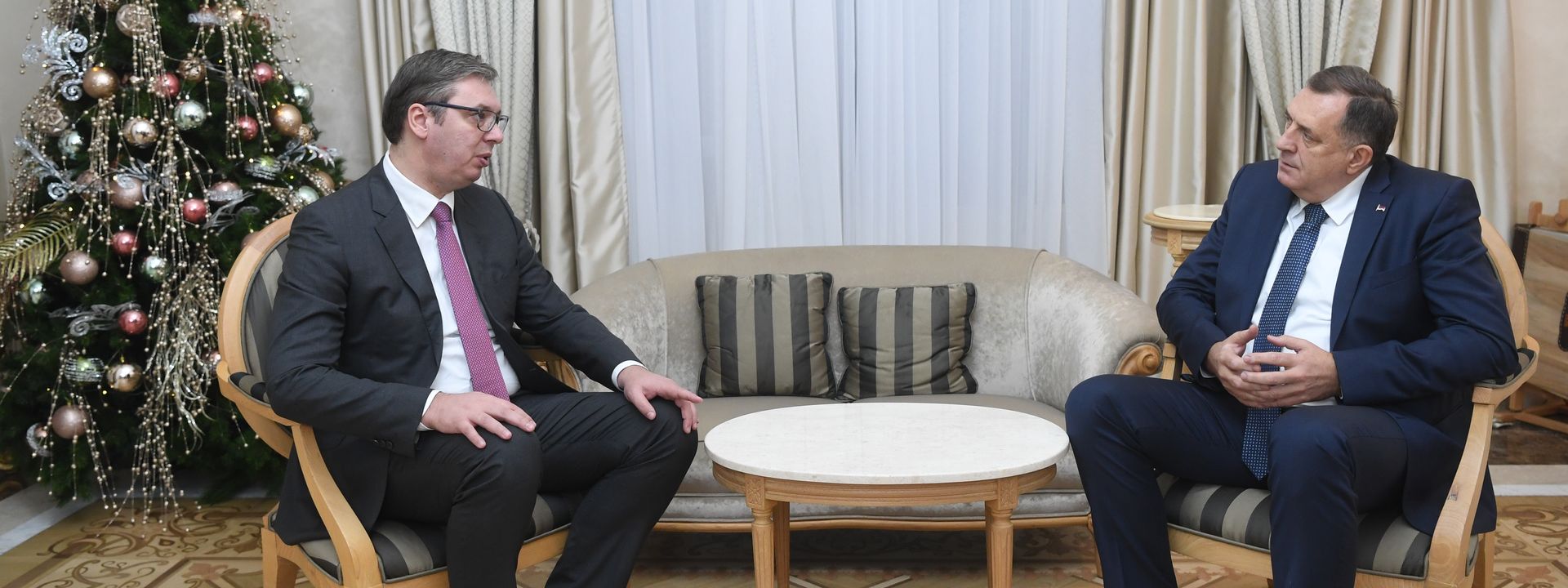
President of the Republic of Serbia Aleksandar Vučić heard the Chairman of the Presidency of Bosnia and Herzegovina Milorad Dodik and asked him to complete his demands in the days and weeks ahead, which the President of Serbia considers legitimate. The President defined the position of the Republic of Serbia towards Bosnia and Herzegovina in the following way:
1. President Vučić concluded that the Republic of Serbia believes that the relations between Serbia and Bosnia and Herzegovina can and must be improved, primarily through significant economic integration, connecting people and a view that is focused on the future, not the past.
2. In his answer to the Chairman of the Presidency of Bosnia and Herzegovina Milorad Dodik, President Vučić pointed out that Serbia will not close the border for people from the Republic of Srpska in any way, irrespective of the epidemiological situation in the Republic of Serbia and the Republic of Srpska.
3. President Vučić emphasised that Serbia has helped the Republic of Srpska with significant financial resources - the last time in the amount of 20 million euros (40 million convertible marks) and that it will continue to provide all kinds of economic and financial support to our people in the Republic of Srpska;
4. The Republic of Serbia believes that the Dayton Agreement can be changed only with the consent of all three constituent peoples and the two entities, also considering the fact that the Republic of Serbia recognises the territorial integrity of Bosnia and Herzegovina and in no way violates it; Serbia, however, demands an end to threats of abolition and the disappearance of the Republic of Srpska, because the Republic of Srpska is a constitutional category of Bosnia and Herzegovina, derived from the peace treaty of the three constituent peoples and confirmed in Dayton.
President of the Republic of Serbia Aleksandar Vučić and the Chairman of the Presidency of Bosnia and Herzegovina Milorad Dodik discussed and agreed on concrete actions regarding the construction of the Jasenovac - Donja Gradina complex on the territory of the Republic of Srpska.
Belgrade, 14th December 2020 |
|
|
| STATEMENT BY THE MINISTRY OF FOREIGN AFFAIRS |
|
On the occasion of 10 December, the international Human Rights Day, the Ministry of Foreign Affairs of the Republic of Serbia reaffirms its commitment to the principles and values of the Universal Declaration of Human Rights, adopted on this day in 1948.
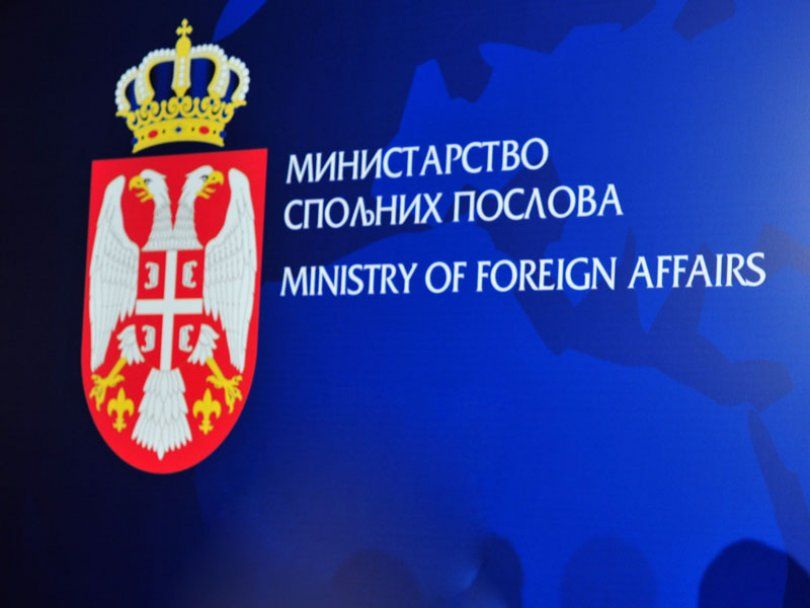
The principles enshrined in the Universal Declaration of Human Rights have been the foundation for the development of international law in this field, and of the international system for the promotion and protection of human rights, as a unique achievement of modern civilization. It is incumbent upon us today to safeguard and strengthen the international system ensuring respect for human rights, to develop human rights standards, control the implementation of commitments, and also to continue cooperating with international and regional institutions on the protection of human rights.
Serbia is fully committed to the universal values of human rights and implementing in practice the international legal instruments relating to human rights. Our continued cooperation with the Human Rights Council mechanisms in the framework of the United Nations, with the Council of Europe and the mechanisms of the OSCE human dimension, represents an important segment of activities carried out by all state authorities, thus demonstrating our consistent commitment to the implementation of international human rights standards.
The international Human Rights Day is an opportunity to point out once again that Serb and other non-Albanian population is being deprived of its rights in Kosovo and Metohija and to call again on the international community to ensure the respect for the guaranteed international human rights norms and contribute to creating conditions for the return of internally displaced persons and giving them back their usurped property. |
|
|
| President meets the ambassadors of the EU member states accredited to Serbia and the head of the European Union Delegation |
|
The President of the Republic of Serbia Aleksandar Vučić met today the ambassadors of EU Member States accredited to Serbia and the Head of the EU Delegation Sem Fabrizi in the Palace of Serbia, to talk to them about topics such as dynamics of the accession negotiations between Serbia and EU, stability in the region, regional projects, as well as the Economic and Investment Plan presented by the European Commission together with the Enlargement package. President Vučić once again confirmed that cooperation with the European Union and fully-fledged membership of Serbia remain one of the key foreign policy priorities of our country. He particularly emphasised that in this respect Serbia is honestly dedicated to further and deeper reforms, approaching them with responsibility and seriousness, and that it tries to adopt and apply the best practice through cooperation with institutions of the EU and its member states.
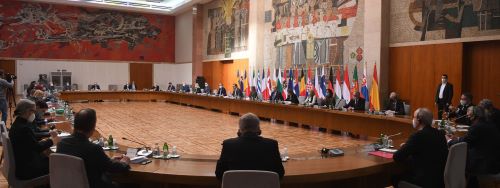
"Serbia will continue being dedicated to the promotion of peace and stability in the region, by improving bilateral relations with neighbours, and by strengthening regional cooperation while respecting all concluded agreements", President Vučić stated, adding that the European future of the Western Balkans is of utmost importance for both stability of the entire region and security and further prosperity of the EU.
Ambassadors pointed out that declarations on the common regional market and the Western Balkans green agenda, which were signed by Serbia and all leaders of the region, received a warm welcome in Brussels and EU Member Stated, and that good and solid connectivity and integration of the region largely facilitates the cooperation of the very Union with the Western Balkans in all areas of joint interest.
"As much as 70% of foreign investments come from the countries whose representatives are sitting here today", Head of the EU Delegation to Serbia Sem Fabrizi said, adding that Serbia can rest assured the EU will continue supporting and investing in the Serbian economy. While Covid-19 has put all economies under stress, Serbian economy has resisted and proved its resilience. With the Economic and Investment Plan for the Western Balkans, the EU will remain Serbia's strongest partner for economic recovery which will support infrastructures, green and digital transition. We welcome the announced reforms in the areas of rule of law, including judiciary reforms and media freedom. This is precisely the base for acceleration of the accession process and we encourage the new government to keep working and implementing in this direction", Fabrizi said.
President Vučić pointed out that Serbia highly appreciates that the EU, despite numerous challenges it is facing has managed to preserve the enlargement issue on its agenda, especially through the recent adoption of a new, changed methodology of the negotiation process.
"In this respect, we expect from the EU that Serbia's accession negotiation dynamics follows and values our reform efforts", President Vučić said pointing out that Serbia is ready to continue working with its European partners on implementation of the reforms and numerous joint projects.
President Vučić particularly noted that Serbia welcomes the Economic and investment plan presented by the EC together with the Enlargement package, and expressed our country's readiness to continue working with the partners in the region on the implementation of this Plan so as to improve the economic potential of the region and achieve better infrastructure connection, which would bring us closer to the single European market.
"In this context, we hope the Multiannual financial framework 2021-2027 will be adopted soon, because that will mean a possibility to use funds designed for reform implementation in Serbia and in the region", President Vučić said, reiterating that Serbia remains on its European path with an honest faith in cooperation with the European partners.
"2020 has been an extremely difficult year for all, especially the impact of COVID–19. When I look at new Government's commitment to implement reforms, the Economic and Investment Plan of the EU, the new methodology and increased cooperation to fight COVID-19, I see 2021 with a much more favourable perspective for progressing the enlargement", Fabrizi concluded.
President Vučić also pointed out that Serbia is prepared to work intensively with the EU Member States on finding an adequate response to the new challenges, such as COVID-19 pandemic. Belgrade, 8th December 2020 |
|
|
| CORONA VIRUS: RECOMMENDATION TO SERBIAN CITIZENS ABROAD |
|
In accordance with the measures taken by the Government of the Republic of Serbia to prevent the spread and control of infectious disease COVID-19, the Ministry of Foreign Affairs recommends that citizens of the Republic of Serbia staying abroad should postpone any travel to the Republic of Serbia that is not necessary, especially if they are planning to come from countries or areas with intense COVID-19 disease transmission.
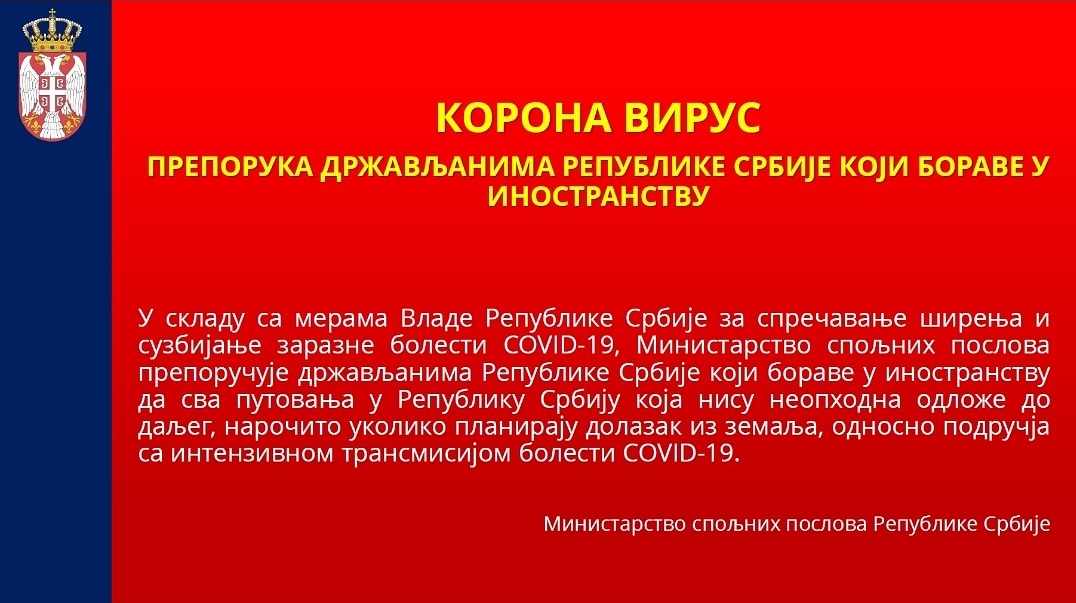 |
|
|
| CORONA VIRUS - IMPORTANT NOTICE |
|
Due to the Corona virus epidemic, reception of visa applications is limited to special cases in accordance with the Decision of the Government of the Republic of Serbia amending the Decision on the declaration of COVID - 19 disease caused by SARS - CoV-2 infectious disease. |
|
|
| CORONA VIRUS - MEASURES TO PREVENT THE EXTENSION OF EPIDEMIA |
|
The President of the Republic of Serbia, Aleksandar Vucic, the Prime Minister of the Republic of Serbia, Ana Brnabic, and the President of the National Assembly of the Republic of Serbia, Maja Gojkovic, adopted on March 15, 2020, in accordance with the Constitution, a Decision on the introduction of a state of emergency.
Borders of the Republic of Serbia are closed to all foreign citizens, with the exception of diplomats accredited in Serbia and foreigners with a residence permit in Serbia.
All citizens of the Republic of Serbia, as well as accredited diplomats and foreign nationals residing in the Republic of Serbia, who enter the Republic of Serbia, are obliged to be in self-isolation for at least 14 days, under criminal responsibility. This measure will be strictly controlled and its violation will be most severely sanctioned.
In the case of citizens of the Republic of Serbia and foreign nationals residing in the Republic of Serbia who come from highly infected areas, isolation is determined for 28 days.
All information on high-risk countries and changes in the regime of entry into the Republic of Serbia can be downloaded on the Government of the Republic of Serbia website - www.srbija.gov.rs, in the News section.
The mode of operation of border crossings has been changed - information can be downloaded on the website of the Ministry of Interior of the Republic of Serbia - www.mup.gov.rs
Information on measures against the spread of Corona virus can be downloaded on the website of the Ministry of Health of the Republic of Serbia - www.covid19.rs |
|
|
|
|
|